




























































This major annual conference and exhibition features a range of expert speakers who will talk about their digital transformation journey. The future design and delivery of our public services is being revolutionised. Register now and join leaders from across Northern Ireland’s public sector for a day of discussion and networking.







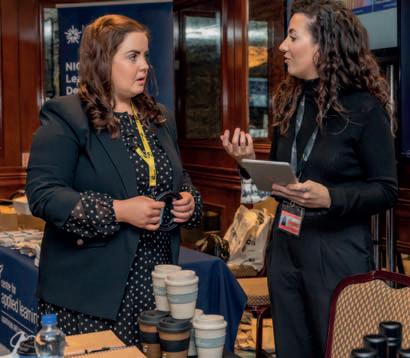

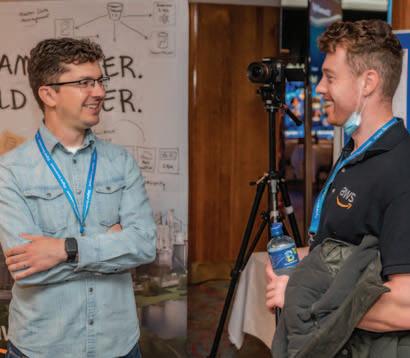
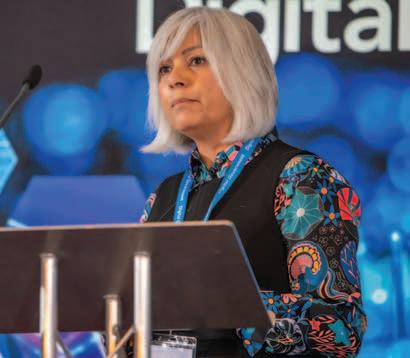
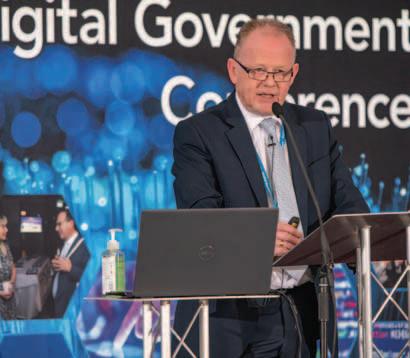
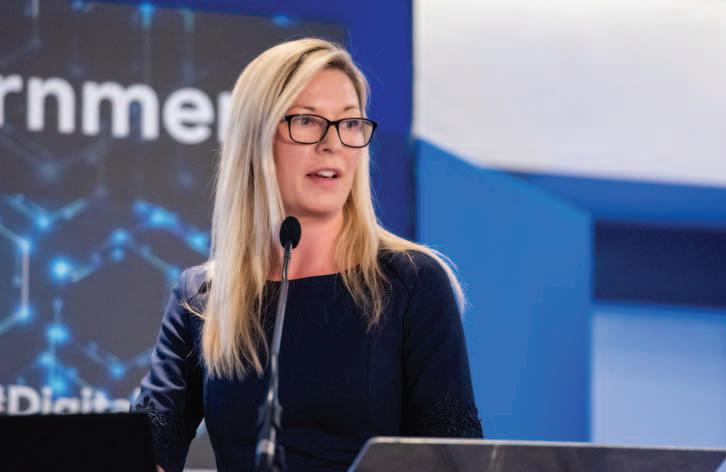































There
























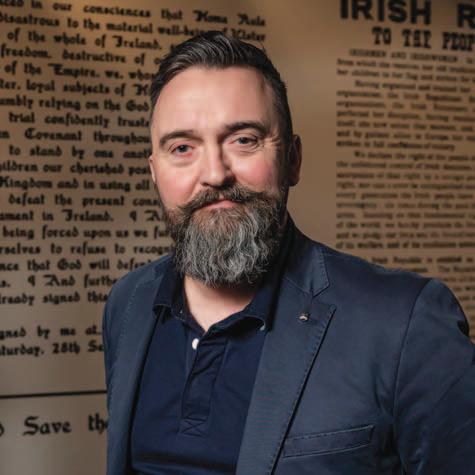
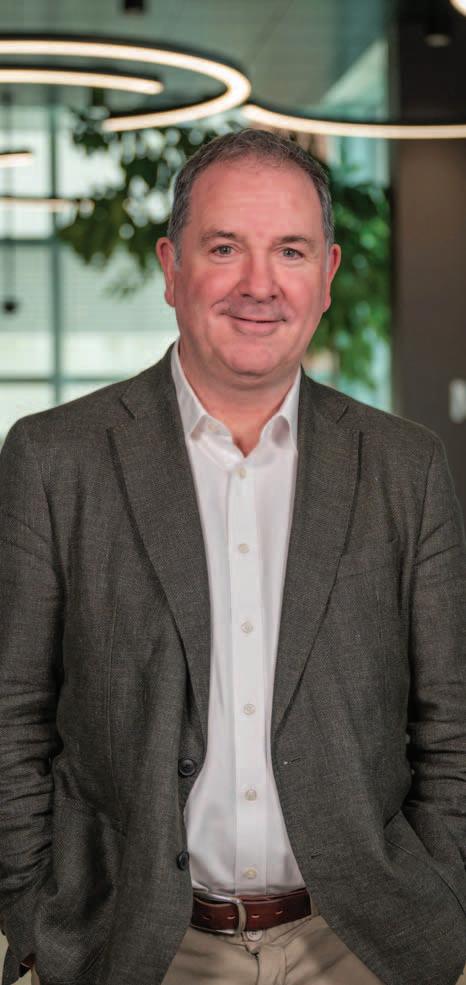
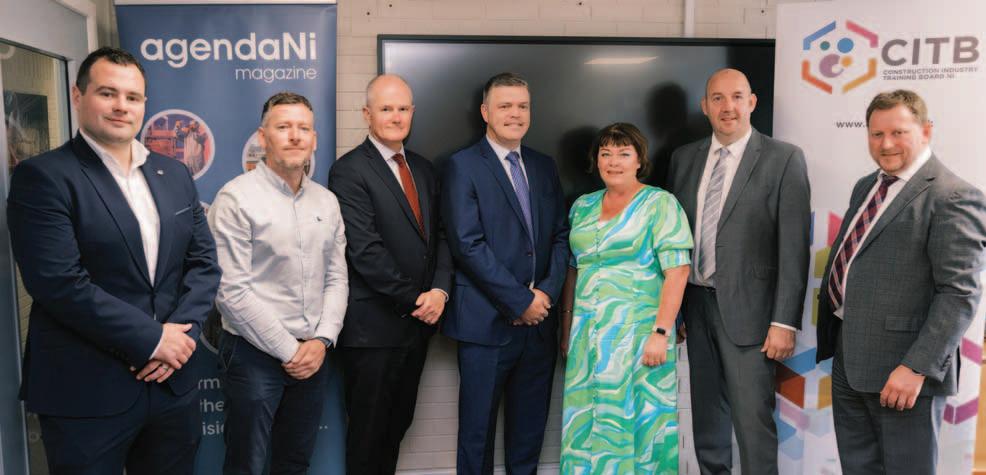
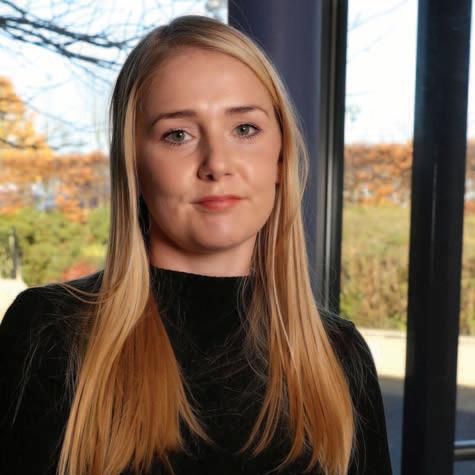






Northern Ireland’s major annual energy conference...
Wednesday 15 November •
The Northern Ireland Energy Forum, now in its 22nd year, has firmly established itself as the annual conference for Northern Ireland’s energy sector and is a not-to-be missed event for anyone with an interest in the local energy industry.

• Policy priorities for Northern Ireland energy sector



• Regulatory outlook for energy sector



• Developing offshore wind resources

• Decarbonising the gas network with biomethane and hydrogen


• The economic opportunity in developing net zero technologies

• Developing the biomethane sector in Northern Ireland



• The role of energy storage systems

• Challenges and opportunities in decarbonising the energy system
Speakers include:
There are still a number of sponsorship opportunities available at this conference. This is an excellent way for organisations to raise their profile with a key audience of senior decision makers from across Northern Ireland’s energy sector. For further information on the packages remaining and speaking opportunities at the event call Jillian Wallace on +44 (0)28 9261 9933.
Sep/Oct 2023
Viewed through a short-term lens, Northern Ireland’s recent economic story is positive. The region has recovered from the economic impact of the pandemic quicker than expected, and the latest headline figures boast growth outstripping that across the UK for the beginning of 2023.
However, such a positive framing of economic performance fails to account for the reality that Q1 2023 was the first time the economy has returned to pre-2007 financial crisis levels.
Take, for example, recent figures which put Northern Ireland’s GDP at 6.3 per cent above pre-pandemic levels, a relatively positive performance until compared with the Republic where GDP is up 27.4 per cent in the same period.
Meanwhile, short-term economic growth outstripping the UK must be viewed in the context that Northern Ireland has more employee jobs with earnings below the real living wage than all other regions.
What was once described as a ‘lost decade’ – the period when neighbouring economies quickly returned to economic growth –has dragged on, fuelled by several long-standing structural problems.
In productivity, Northern Ireland is a UK laggard, some 17 per cent below the UK average. The productivity gap between the Republic of Ireland and Northern Ireland was recently estimated at around 40 per cent.
In this issue of agendaNi, the annual economy report identifies many of the long-standing headwinds inhibiting economic performance, but also assesses the policy actions being taken to address these. Alongside an interview with the Department for the Economy’s Permanent Secretary, Mike Brennan, our cover story with BT’s Paul Murnaghan also looks at the investment potential of Northern Ireland and the opportunity for transformation of the region.
Preparing for an economy of the future is the focus of this issue’s round table discussion with the Construction Industry Training Board (CITB), who along with stakeholders are seeking to build a skilled and competent construction industry.
Other highlights include an outline of progress from the Education Permanent Secretary Mark Browne and as always, a packed current and public affairs agenda.
David WhelanEditorial
David Whelan, Editor david.whelan@agendani.com
Fiona McCarthy fiona.mccarthy@agendani.com
Ciarán Galway ciaran.galway@agendani.com
Odrán Waldron odran.waldron@agendani.com
Joshua Murray joshua.murray@agendani.com
Circulation and Marketing
Lynda Millar lynda.millar@agendani.com
Events
Jillian Wallace jillian.wallace@agendani.com
Advertising
Gail Kinkead gail.kinkead@agendani.com
Design
Gareth Duffy, Head of Design gareth.duffy@agendani.com
Jamie Hogan jamie.hogan@agendani.com
Subscriptions
Sharon Morrison Email: subscriptions@agendani.com Online: www.agendani.com
agendaNi
Owen McQuade, Publisher owen.mcquade@agendani.com bmf Business Services

19a Maghaberry Road Maghaberry, Co Antrim, BT67 0JE Tel: +44 (0) 28 9261 9933
X: @agendani
Web: www.agendani.com
Printed by: GPS Colour Graphics
Department for Infrastructure Permanent Secretary Julie Harrison has been named as the new Permanent Secretary to the Northern Ireland Office (NIO), succeeding Madeleine Alessandri, who left the post in July 2023 in order to become the Chair of the Joint Intelligence Committee and Head of the Joint Intelligence Unit. Harrison is expected to take up her new post in September 2023.
Harrison holds a PhD in psychology from Queen’s University Belfast and prior to her posting in the Department for Infrastructure, she held the role of director of the Safer Communities programme within the Department of Justice. She has also been the chair of the National Lottery Community Fund in Northern Ireland and a strategic adviser for the Strategic Investment Board.
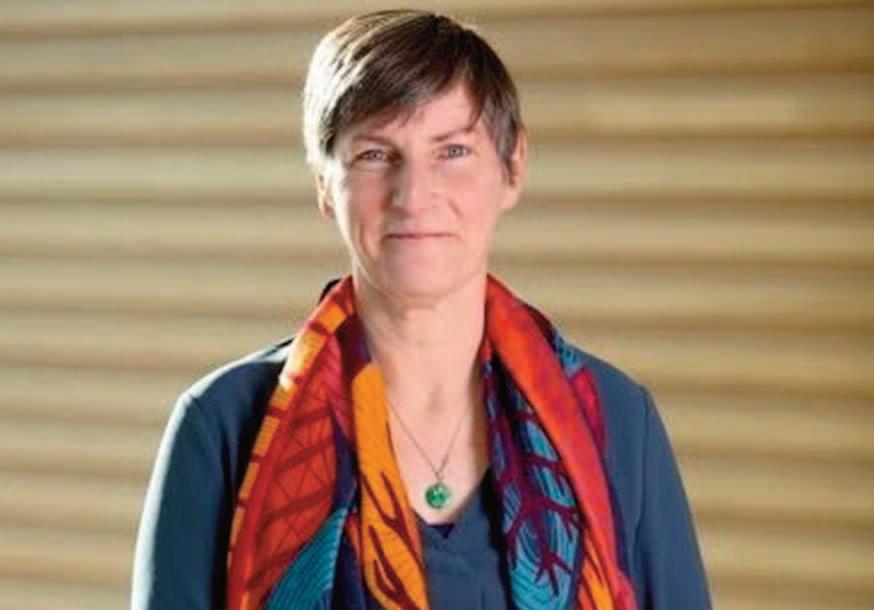
Commenting on her appointment, Harrison said: “I am looking forward to working with the Secretary of State, the team in the NIO and a wide range of community, business, and political voices to create solutions that enable Northern Ireland and the people who live here to prosper.”
Replacing Harrison at the Department for Infrastructure will be career civil servant Denis McMahon, who will leave his current post as Permanent Secretary at the Executive Office. McMahon has previously been Permanent Secretary in the Department of Agriculture, Environment and Rural Affairs, and held roles in the Department for Communities, the Department of Culture, Arts and Leisure, and the Office of the First Minister and Deputy First Minister.
Only one of the 10 actions recommended in the Review of General Surgery report published in June 2022 has been completed, a Department of Health progress report published on 31 August 2023 has said. Of the remaining nine actions, six remain on target for delivery, while three have been given an amber rating, meaning there is “some anticipated delay to delivery”.
Implementation of the standards recommended in the report will “ensure that people across Northern Ireland who require general surgery receive the highest quality care in the most appropriate environment”, the Department says.

Two key recommendations within the report were the establishment of elective overnight stay centres (EOSCs) and post-anaesthetic care units (PACUs). EOSCs are “centres for intermediate complexity surgery that will

sometimes, but not always, require an overnight stay in hospital” that will “provide a range of specialities including general surgery, urology, gynaecology, and ENT”. The Mater Hospital in Belfast was announced as the first EOSC in June 2022, and subsequent EOSCs have been announced at Daisy Hill and South West Acute Hospital. All three are “being taken forward on a phased approach with lists already underway at all sites”.
PACUs “provide an intermediate level of care where a higher degree of observation, monitoring and interventions can be provided for than in a general ward”. PACUs are now operational across four hospitals: Belfast City, Royal Victoria, Ulster, and Craigavon Area, the latter of which opened in August 2023. It is “anticipated” that the remaining PACUs at Antrim and Altnagelvin will be operational before the end of 2023.
The lack of a locally made and allocated budget and the collapse of the Northern Ireland Executive are having an adverse effect on construction activity in Northern Ireland, according to 2023’s second quarterly report on construction by the Royal Institute of Chartered Surveyors (RICS).

The RICS indicates that workloads fell in the second quarter of 2023, with the biggest falls in sectors dependent on public spending.
The survey suggests some wider economic challenges are easing, but the lack of a functioning Executive is the one challenge that is not improving.
Northern Ireland’s housing market remains distinct from that of the rest of the UK, and of the Republic of Ireland. Whilst figures released by the RICS indicate that house prices are falling in the UK at the highest rate since 2009, Northern Ireland is the only part of the UK to post a positive net balance for the house price gauge, albeit this softened from an increase of 34 per cent to an increase of 16 per cent in the latest results.
RICS chief economist Simon Rubinsohn says that whilst infrastructure construction numbers “remain solid”, the survey “provides further evidence of the challenges in delivering residential developments at the current time”.
The Northern Ireland Statistics and Research Agency (NISRA) has launched a consultation on reducing its output. The aim of these changes is to address the financial constraints imposed by the budget settlement for 2023/24 on NISRA.

NISRA states that the consultation seeks views from users and stakeholders on a range of proposed changes to their statistical outputs. This consultation includes statistical outputs which it proposes will be: suspended until further notice; scaled back in frequency or in their content; and/or delayed from their planned publication dates.
The consultation is asking users to indicate the use of NISRA’s statistical services, including the death register, quarterly ports traffic, and trade between Great Britain and Northern Ireland. The apparent outcome of the consultation will be less statistics about aspects of the Northern Ireland economy and society, making it more difficult for researchers and decision-makers to monitor success of public policy.
Summary findings from the consultation will be published on the NISRA website on or before 10 November 2023. The consultation period runs from 23 August 2023 until 15 October 2023.

In June 2023, Gavin Robinson MP was elected as the new deputy leader of the Democratic Unionist Party (DUP).


The Belfast East MP fended off competition from Upper Bann MLA Jonathan Buckley. The DUP has not indicated what the vote tally was, choosing to conduct the process away from the public eye with memories of the debacle surrounding Edwin Poots’s leadership election seemingly still fresh in many memories.
Robinson assumes the role following the resignation of former deputy leader Paula Bradley, a former MLA for Belfast North and a member of Antrim and Newtownabbey Borough Council, who resigned as an MLA for personal reasons in 2022, having been elected party deputy leader in 2021.
The election of Robinson, widely seen as a relatively moderate figure in the party, is a boost for leader Jeffrey Donaldson MP as he continues to grapple with the prospect of a return to Stormont, despite protestations from senior figures on the right of the party.
Following the election, Robinson said: “A new generation of unionists are stepping forward to serve at every level within our party and in service to Northern Ireland.” He added that he looked forward to playing his part in “building and promoting the pro-union cause as well as working to deliver on our plan for Northern Ireland”.
David Marshall, best known for his role in directing Census 2021 as a senior civil servant in the Northern Ireland Statistics and Research Agency, has been appointed as the new Chief Electoral Officer.

Marshall succeeds the outgoing Sarah Ling in the £84,674 role and will serve for five years. Ling had served as temporary Chief Electoral Officer in 2023 following the resignation of Virginia McVea, who had been Chief Electoral Officer since 2017 and left to become the head of the UK Maritime and Coastguard Agency in 2023.
The Electoral Office has faced some controversies this year, including the rejection of over 5,000 postal votes in the local elections in 2023, as well as a row over the
display of union flags in a polling station in the Botanic DEA Marshall’s predecessor stated that flags should only be removed from polling stations if considered “excessive”.
The Electoral Office has since stated that it will carry out a review of its policy on the display of flags in polling stations.
Northern Ireland Secretary of State Chris Heaton-Harris MP said on Marshall’s appointment: “The important work of the Chief Electoral Officer and his office will continue to underpin the delivery of efficient elections for all the people of Northern Ireland.”
“If police believe that journalists have information that may assist them then there are agreed ways of working to obtain that information, but accessing the phone records of journalists isn’t one of them and amounts to an attack on press freedoms.”






“I believe the only hope for the NHS is reunification.”
Pat Cullen, General Secretary of the Royal College of Nurses
Matthew O’Toole MLA, SDLP
“I do not doubt for one minute the DUP's commitment to unionism, but I do say that they have made a series of strategic errors for which unionism is paying a huge price.”
Reg Empey, UUP member of the House of Lords
“The era of global warming has ended. The era of global boiling has arrived.”
United Nations Secretary General António Guterres
A public consultation has opened on Northern Ireland’s frst three carbon budgets. However, a planned new Climate Action Plan has been delayed until at least the end of 2023.
The consultation on the legally binding limits of the amount of greenhouse gases that Northern Ireland can emit for three consecutive fve-year periods also seeks to set emission reduction targets for 2030 and 2040.
An effort to set proposed carbon budgets for the periods 2023-2027, 2028-2032, and 2033-2037 comes following the publication of an advice report carried out by the UK’s Climate Change Committee (CCC).

Plans to also consult on Northern Ireland’s frst draft Climate Action Plan (2023-2027) have been delayed. The Department of Agriculture, Environment and Rural Affairs (DAERA) says that the requirement for detailed modelling, analysis, and policy development across government
departments, “coupled with an extremely diffcult budgetary position and the challenges associated with developing, in the absence of ministers, the new policies and programmes required to meet the carbon reduction targets”, means that it will be later in 2023 before the plan is completed.

The creation of emission reduction targets, including the production of a system of carbon budgeting and the setting of 2030 and 2040 targets, was mandated by the passing of Northern Ireland’s Climate Change Act in June 2022. The Act also established the overarching goal of net zero emissions by 2050, despite previous advice from the CCC that an 83 per cent reduction of greenhouse gas emissions would be a realistic ambition, and feed into the UK’s net zero ambitions.
The signifcance of the ambitions being set out in the proposed carbon budgets to reach net zero can be seen by the fact that the CCC has described achieving the 83 per cent reduction target as “extremely challenging”. This pathway, which includes the decarbonisation of electricity generation, all new car and van sales being zero-emissions in the frst half of the 2030s, all properties off the gas grid, a reduction of livestock numbers by one third, and a signifcant increase in peatland restoration and afforestation, would still see Northern Ireland fall well short of net zero emissions, and require radical action to meet the 2050 target. A ‘stretch ambition’ pathway, which would include the actions above, as well as “radical” steps to increase afforestation rates to reach 3,100 hectares by 2035 and
4,100 hectares by 2039, a reduction of cattle and sheep by around 18 per cent by 2030, and signifcant investment and infrastructure development to provide engineered GhG removals from solid biomass and anaerobic digestion of wastes, would only close the emission gap to 93 per cent.
‘Speculative options’, which the CCC says one or more of which could possibly close the remaining gap to reach net zero include further engineered removals using direct air carbon capture technologies and transporting the CO2 to be stored elsewhere, the halving of livestock numbers by 2050 plus other speculative actions, for which reliance is not currently “credible”.
The Climate Change Act requires the setting of targets for the years 2030 and 2040, that are in line with the 2050 target, to be completed by June 2024. The CCC’s advice is a 48 per cent emissions reduction, against the baseline fgure, by 2030, a target already outlined in the Act. It further recommends a 77 per cent reduction by 2040 as the target.
The nature of a carbon budget, limiting the maximum total amount of greenhouse gas emissions which should not be exceeded for a defned budgetary period, means that carbon budgets will be set at a Northern Ireland level, rather than a sectoral level. As all Northern Ireland departments are required under the Act to ensure a carbon budget is achieved, climate action plans will be the delivery vehicle for sectoral limits.
The frst three carbon budgets for Northern Ireland must be set by the end of December 2023 and each subsequent carbon budget must be set a minimum of 12 years in advance of the budgetary period commencing.
The CCC has recommended that the frst carbon budget should be set at a 33 per cent average annual reduction, the second carbon budget at a 48 per cent average annual reduction, and the third carbon budget at a 62 per cent average annual reduction.
The Department says that following the completion of the consultation process,
2030: 48% emissions reduction
2040: 77% emissions reduction
2023-2027: 33% average annual reduction
2028-2032: 48% average annual reduction
2033-2037: 62% average annual reduction

views will be considered to help inform decisions on the appropriate emissions reduction targets for 2030 and 2040, and the level of the frst three carbon budgets. Once published, each Climate Action Plan will be accompanied by the relevant impact assessments, which will provide more detail on the expected impacts of the policies and proposals.
The Department says that it anticipates that the draft Climate Action Plan 2023-
2027 will be issued for consultation as soon as possible after Executive consideration. Targets and carbon budgets must be set through regulations which need to be agreed by the Northern Ireland Executive before being laid in the Assembly for debate and approval.
The 16-week consultation runs from 21 June to 11 October 2023.

Paul Murnaghan, Regional Director for BT in Northern Ireland, talks to David Whelan about the organisation’s transition from telco to techco, and its ambition to help transform the local economy.


Murnaghan is steadfast in his opinion that not only is BT good for Northern Ireland’s economy, but Northern Ireland’s economy is good for BT.
A global company with a local focus, Murnaghan explains that BT puts the needs of the public and private sector in Northern Ireland at the heart of its work, while offering the fastest and most reliable connectivity.

Speaking from the newly refurbished Riverside Tower in Belfast, one of the strategic locations across the UK chosen by BT Group as part of its large workplace and consolidation scheme, the Regional Director explains that the multi-million pound investment is a reaffirmation of the company’s commitment to Northern Ireland.
Home to around 2,000 staff from BT Group – which includes EE, BT Business, and Openreach – the building has been radically modernised while retaining its legacy as a dominant feature in the Belfast skyline over the past two and a half decades.
“We are very proud of our legacy as a long-term private sector investor in Northern Ireland, even in times when there were very few. I think that legacy is recognised and continues to serve us well today,” explains Murnaghan.
“Whether it is helping to transform communities through our public sector contracts, connecting businesses of all shapes and sizes, or installing the latest mobile technology for the future, we are at the core of Northern Ireland’s digital future and infrastructure.
“BT has been good for Northern Ireland, but Northern Ireland has also been good for BT. Everyone who lives and works here reaps the social and economic benefits of being at the forefront of the digital revolution.”
The impact of the UK’s largest telecommunications company on Northern Ireland’s economy is evident. A recent report by the consultancy firm Hatch estimated that BT contributed an estimated £420 million to Northern Ireland’s economy during the 2021/22 financial year, rising to £690 million when employee and supply chain spending was factored in.
Highlighting the company’s broad range of activities across the UK, supported by 7,340 jobs in Northern Ireland, Murnaghan explains that over half of BT Group employees here are sustained by work outside of Northern Ireland. This reinforces BT’s commitment to the region as a good place to do business in, but also to do business from.
Commenting on how BT has been able to retain such a large market share of private and public sector clients in Northern Ireland, Murnaghan points to the organisation’s ambitions to constantly evolve to ensure it is meeting not only the needs of its customers, but also those of its customers’ customers.
Underpinning the organisation’s solutions-led transition from a telco to a techco, he states, is record investment in next generation networks, such as full fibre broadband via Openreach and 5G via its mobile network EE.
Openreach’s investment in full fibre rollout in Northern Ireland means that over 85 per cent of premises in the region have now been passed, and Murnaghan says that upgrades to Northern Ireland’s digital infrastructure “will support the region's economic growth ambitions and ensure Northern Ireland's businesses and public sector organisations are able to take full advantage of the latest technologies and digital possibilities”.

That Northern Ireland “punches well above its weight” in relation to underpinning connectivity is the basis for the Regional Director’s outlook that the Northern Ireland has been, and can continue to be, the ‘Goldilocks’ region for BT’s ambitions.
Explaining the turn of phrase, he says: “As a region of just under two million people, Northern Ireland is small enough 4
“As a region of just under two million people, Northern Ireland is small enough to ensure speed and agility, whilst also large enough to scale, and with a trusted maturity of engagement with our customers, it gives us the flexibility to test new solutions in a safe and accelerated way.”Paul Murnaghan, Regional Director for BT in Northern Ireland.
to ensure speed and agility, whilst also large enough to scale, and with a trusted maturity of engagement with our customers, it gives us the flexibility to test new solutions in a safe and accelerated way.”

One such example of this is BT Group’s decision to place Northern Ireland as one of the earliest regions for switching customers to their new digital (Voice) home phone service. While Murnaghan explains that most business customers in Northern Ireland have already been switched, the wider rollout in Northern Ireland will ensure the long-term connectivity needs of consumers are met through future-proof digital technology and full fibre networks.
Expanding further on the use of Northern Ireland as a sandbox for trialling BT’s advanced solutions, the Regional Director also highlights an ongoing partnership between BT and Belfast Harbour which will deliver a series of 5Gled innovations to accelerate Belfast Harbour’s digital transformation and help deliver its smart port strategic ambitions.
Working as the Harbour’s technology partner, the Regional Director says that BT is building 5G-led innovations to unlock the productivity benefits for the port and contribute to the region’s green recovery ambitions.
“Our UK-and-Ireland-first 5G trial with Belfast Harbour in 2019 was a powerful illustration of how 5G-led technology can transform the port’s operations, propel the success of local businesses, and drive economic growth. The collaboration with Belfast Harbour will make these benefits a reality, with the creation of a sophisticated digital ecosystem comprising of 5G as well as other emerging technologies such as AI, IoT and connected vehicles. This digital fabric will act as a springboard for Belfast Harbour to achieve its ambition to be the world’s best regional smart port and a leading innovation hub for the region,” says Murnaghan.
In January 2023, Belfast Harbour announced that, along with BT and a consortium of partners, it is set to deliver one of the first fully driverless transport systems anywhere in the UK. The automated passenger shuttle service, providing last mile connectivity in the Harbour Estate from the Titanic Quarter railway station to Thompson Dock on Queen’s Island. Murnaghan outlines how the project is a prime example of how BT’s connectivity expertise is being leveraged to drive solution-led advancements across various sectors.
Elaborating on how BT’s reach extends far beyond connectivity of fixed, mobile, and broadband connectivity, the
Regional Director points to influence in other areas ranging from the public sector in the form of transport and logistics, healthcare and education, through to identified key economic enabling sectors such as advanced manufacturing and agri-food, as examples of the size of BT’s economic footprint and transformative power.
Emphasising BT’s ambition to ‘Connect For Good’, becoming the world’s most trusted connecter of people, devices, and machines, Murnaghan highlights that BT has invested heavily in the healthcare market, recognising the need for transformation of the region’s healthcare system.
“There is a long-standing acknowledgement of the need for transformation across the NHS and specifically in the healthcare sector in Northern Ireland. Our belief is that that transformation can happen quicker and better if underpinned by the connectivity opportunities that we are advancing.
“Our aim is to supercharge anticipatory care, alleviate system pressures, improve efficiency and improve the experience of delivering for the people that look after our friends and family.”
Murnaghan explains that BT’s ambition is to work together with clinicians to build smarter, safer, and more efficient services for everyone. “Our ‘clinically led, digitally enabled’ strategy sees BT work closely with the NHS and other healthcare providers from the first conversation, right through to tests and trials and rolling transformative technology out across the front line.
“Utilising connectivity available at home and integrating technology into the patient journey can not only enable more care in the community and reduce hospital presentations, but can also be more effective in preventing healthcare emergencies and ultimately, reducing cost,” the Regional Director explains.
In a similar vein, BT connects all schools across Northern Ireland as part of its wider remit to provide industry leading telecommunications services to all public sector bodies across Northern Ireland,

through the Public Sector Shared Network (NI PSSN) contract. In May 2023, it was announced that the Education Authority had partnered with BT to bring state-of-the-art internet access to all schools across Northern Ireland under the Education Information Solutions Programme (EdIS).
Enhanced wireless connectivity throughout all teaching and learning areas with the installation of over 24,000 new wireless access points is IT supplier’s Cisco Meraki’s largest WiFi deployment in Europe.
Murnaghan explains that BT is very proud to be part of the project that will enable every child in Northern Ireland to have equal access to technology in the classroom regardless of geographical location or socio-economic background.
While BT is cognisant of the impact of its investment in Northern Ireland’s economic future, Murnaghan stresses that the organisation will not rest on its laurels. The BT Ireland Innovation Centre, a major project delivered in partnership with Invest NI and Ulster University is at the intersection of advancing artificial intelligence, the Internet of Things (IoT) and cyber security, for future secure connectivity solutions.
Meanwhile, Murnaghan says that collaboration between BT and Northern Ireland’s leading universities and further education colleges has been fruitful in ensuring not only strong progress in research and development, but a partnership approach to skills development and career creation.
BT in Northern Ireland is currently filling 55 roles for September 2023 with an intake of graduates and apprenticeships. Additionally, earlier this year the firm announced 100 new digital jobs as part of its expansion in the city, a figure Murnaghan believes can grow significantly if increased capacity becomes available across graduates, apprentices and experienced hires. Creating key career pathways will be critical as BT, like many other large organisations globally, constantly compete for talent. Describing how BT is
working to attract and retain talent in Northern Ireland, the Regional Director says that another major tool is BT’s focus on workforce diversity.
“In the last number of years, we as an organisation have acknowledged the existence of a more values-driven labour market. We recognise that if we want to attract the best talent to work for BT then having the right values in place is critically important. One of the key pillars of our focus has been creating a more diverse workforce, acknowledging that greater diversity generates a more challenging, and ultimately healthier, approach to our thinking and our output.”
Underpinning BT’s future ambitions as the trusted technology partner of both private and public sector innovators in Northern Ireland is security. In October 2022, BT officially opened its state-of-the art cyber Security Operations Centre (SOC) within the flagship Riverside Tower building.
The 40-seat centre of excellence will provide 24/7 management 365 days a year for ICT assets across the Northern Ireland Civil Service and support growth in BT’s UK customer base providing the highest levels of security classification.
“Each day, millions of people around the world rely on BT’s expertise in cybersecurity to ensure they can go about their lives and run their businesses safely,” explains Murnaghan.
“With the scale and complexity of cyberattacks constantly increasing, organisations of all types are looking to ensure they have the right protections in place. The SOC will leverage BT’s global security expertise and leading cyber technologies to defend public and private sector bodies against the latest threats.”

Discussing his vision for BT in the future Northern Ireland economy, the Regional Director says: “BT is vested in Northern Ireland because we see great opportunity here. We want to realise the progress that the ‘Goldilocks’ ambition provides because it is an exciting prospect for BT, for the region and for everyone who lives and does business here.
“To ensure we reach these ambitions, we must overcome several challenges, one of which is a lack of political and policy certainty, which is a barrier to attracting investment. Our second challenge, and one which we are striving to meet head on, is ensuring that we are constantly evolving to meet the needs of our customers beyond what we currently offer. This challenge is potentially the most exciting prospect because it is about attaining an intrinsic knowledge of the needs of our customers and of their customers.
“Given the scale and breadth of our customer base here in Northern Ireland and assessing the region’s goals and ambitions, I have no doubt that our future solutions can help bring transformative change to this region as a whole.”
Born in Dublin, Paul Murnaghan moved to Belfast in the 1970s before attending Queen’s University Belfast to study enhanced electrical and electronic engineering, followed by post-graduate degrees in both business and IT at Ulster University. He joined BT following the acquisition of BIC Systems in 2004 and has over 20 years’ experience in managing large enterprise and public sector customers.
He is a former President of the Northern Ireland Chamber of Commerce and Industry and board member of Helm Housing. He has earned over 70 caps representing and captaining Ireland at water polo and is still involved in the sport as Chair of Clonard Water Polo Club.

Dorinnia Carville said that in the absence of an identified outcome framework and appropriate measures to assess whether services are making a difference in terms of improving mental health, the Northern Ireland Audit Office (NIAO) was unable to conclude whether mental health services in Northern Ireland are providing value for money.
The NIAO’s critical report comes at a time of mental health crisis in Northern Ireland, where increased demand and spiralling waiting lists are being underserved by the absence of agreed Executive funding for a new 10-year Mental Health Strategy.
Planned actions for the strategy to 2031 were costed at an estimated £1.2 billion
but no Executive-agreed funding has ever been allocated. The first two successive annual delivery plans have delivered funding well short of what was originally outlined.
The Comptroller and Auditor General says that without dedicated long-term funding, the delivery of the strategy and achievement of its vision for mental health “remain at risk”.
Work done by the London School of Economics and the Mental Health Foundation in February 2022 put a conservative estimate of £3.4 billion in a given year on the overall cost of mental ill-health in Northern Ireland, recognising costs of not only the personal impact of mental ill-health and to those around
them, but also the wider societal impacts of costs of care, treatment, and lost production.

Perhaps most strikingly, despite the current and future expenditure needed to address the mental health crisis, the NIAO points to an incomplete picture of mental health provision, based on current data.
Highlighting a lack of regional standardisation and a fragmented information technology infrastructure, the NIAO pinpoints that available information is focused on health trust activity, but that no detail is available in relation to mental health services in primary care. Similarly, it states, there is a lack of information on services provided by the community and
Northern Ireland’s Comptroller and Auditor General is “unable” to say whether the £300 million being spent on mental health services in the region is providing value for money.
voluntary sector (other than as an integral part of Trust services, provided under contract).
Concluding that the Department and trusts remain “unsighted as to whether the services provided represent value for money”, one of the NIAO’s priority recommendations is for the production of a data strategy, including use of an appropriate outcomes measurement framework.
While an outcomes framework is being progressed by the Department, its implementation timeframe is tied to the information technology systems currently scheduled not to be fully brought into use until March 2025.

In the meantime, Northern Ireland continues to have the highest prevalence of mental health problems of any region of the UK, with the size of the gap emphasised by the fact that mental illhealth rates are around 25 per cent higher than in England. Despite this, planned expenditure on mental health
(£1.2 billion over 10 years as set out by the Mental Health Strategy funding plan) for Northern Ireland represents around 2 per cent of the Department of Health’s estimated £6 billion annual budget over the decade. Comparatively, England and Wales dedicate around 13 per cent of their annual health budget to mental health services.
The recently published Mental Health Strategy Delivery Plan for 2023/24 allocated £5.5 million to implementation of the Mental Health Strategy’s ambitions but acknowledged that the allocation “is less than the requirements”.
Recent figures released by the Department of Health showcase the extent of the service crisis in Northern Ireland. On 30 June 2023, there were 2,251 total waits for a Child and Adolescent Mental Health Service (CAMHS) assessment in Northern Ireland, of which more than half (1,205) were waiting more than the targeted nine weeks.
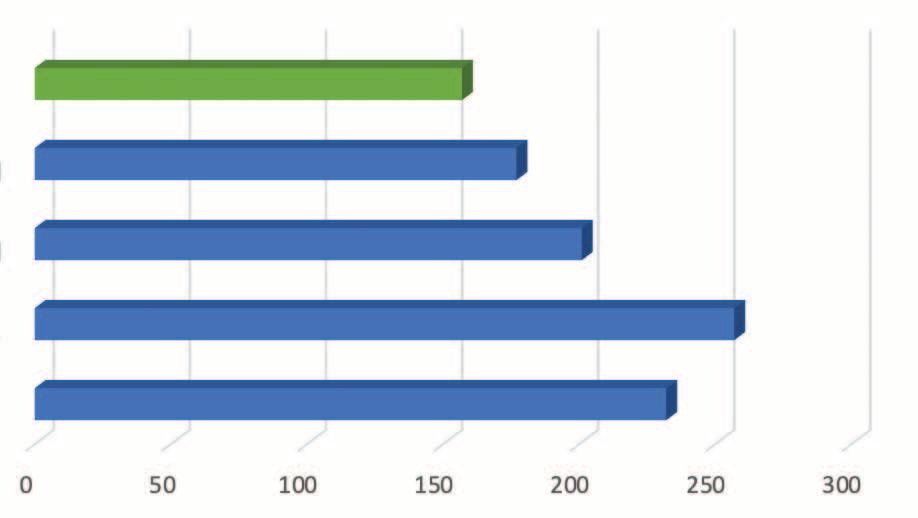
In her conclusions, the Comptroller and Auditor General says: “In the absence of
an identified outcome framework and appropriate measures to assess whether services are making a difference in terms of improving mental health, we are unable to conclude on whether mental health services in Northern Ireland are providing value for money.”
As well as recommendations for the creation and implementation of a data strategy, other recommendations issued by the NIAO include the needs to secure adequate and sustained funding for the implementation of the strategy over its lifetime, adding that failure to do so would “jeopardise the achievement of its longterm vision for mental health and run the risk that, like Bamford before it, necessary reform and improvement is curtailed or delayed as a result of a lack of commitment to prioritise and adequately fund implementation”.
Further to this, Carville says that aligning funding levels in Northern Ireland with those elsewhere will require the Department of Health to establish a longterm funding ambition for mental health services “together with stepped interim targets aimed towards its achievement”.
Like here in Northern Ireland, the grid and how it is operated needs to be fundamentally reimagined and upgraded to facilitate a different and more varied type of electricity generation which is weather dependent.
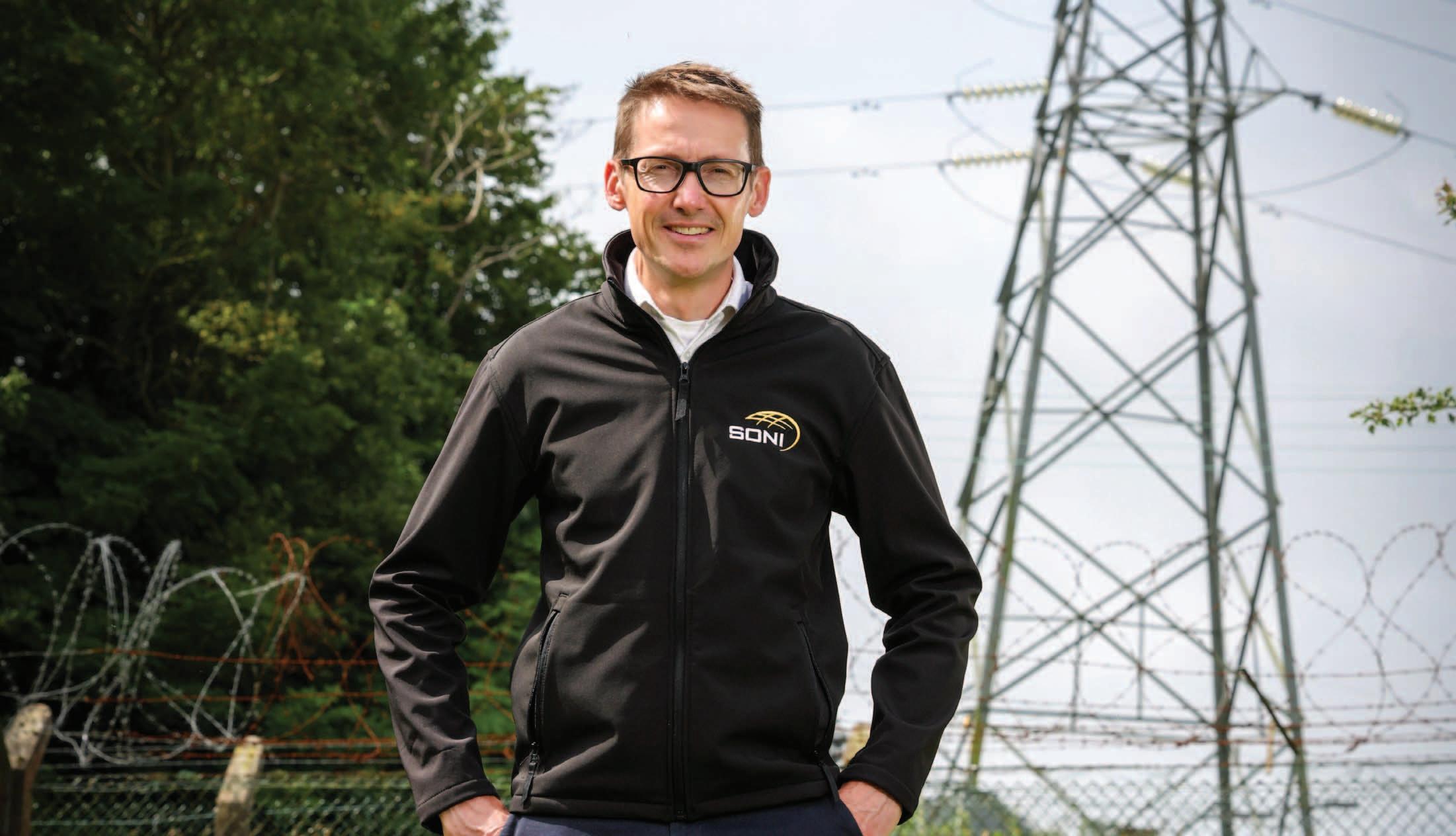
Earlier in summer 2023, Great Britain’s Electricity Networks Commissioner, Nick Winser, published the comprehensive report with a wide-ranging series of recommendations covering areas such as planning and regulation to community benefit and land access, all with the purpose of accelerating electricity transmission development.
Among the recommendations is the idea of a Strategic Spatial Energy Plan to better align government policy and network development plans. There are recommendations to allow national planning policy to be regularly updated to support the need for new electricity transmission infrastructure.
In the area of public acceptance, the report acknowledges the need to ensure rural communities are treated fairly and therefore recommends that compensation for accessing land should be set at a national level.
In June 2022, an Electricity Networks Commissioner (ENC) was appointed in Great Britain and tasked with providing advice to the UK Government on how to reduce the time it takes to deliver the crucial electricity grid upgrades needed to meet its renewable energy targets.Alan Campbell, Managing Director at SONI.
It notes the large difference in cost to consumers between overhead lines, underground cables, and offshore cables with underground options costing between five and 10 times more than the overhead alternatives. It concludes, therefore, that providing a community benefit for overhead lines is less costly than using an underground cable and will have a lower environmental impact.
A government-led national campaign is recommended to communicate the need for electricity infrastructure and how this can lead to positive social, environmental, and economic outcomes for people and the communities in which they live and work.
In the critical area of skills shortages, there is a recommendation to establish a working group which includes all the key players in the energy system, including supply chains, to create an action plan.
Here in Northern Ireland, our plan, in the form of the Northern Ireland Energy Strategy – Path to Net Zero Energy, is already delivering on many of the recommendations and looking at solutions specific to our part of the world.
We also have the benefit of a unique energy sector operating in a relatively small, self-contained island-based energy system. This has enabled the close collaboration which has led to the genuinely world-leading progress we have made so far in the onboarding of renewable energy into our power system – Northern Ireland being the first part of the world to have 75 per cent of its electricity on the grid coming from renewable sources at any moment in time.
But with less than 80 months until 2030, now is the time for a purposeful increase in the intensity of that collaboration and a refocusing of minds on the delivery the Energy Strategy. This injection of purposeful intensity needs to reflect the urgency of the existential challenge that climate change poses to our everyday lives.
There is no question that the 80 per cent target is a huge challenge, effectively doubling the progress of the last two decades in less than one.
For SONI’s part, we understand the unprecedented scale of transformation required on the grid to make these targets a reality. We also recognise the
urgency of the task at hand, and what it will take to make it happen.
In 2021, we published a roadmap Shaping Our Electricity Future, which sets out our plan to ready the power system and the electricity markets for a 70 per cent target. Earlier in summer 2023, we published a revised roadmap to account for the more challenging 80 per cent target set by the Climate Change Act 2022. We are also progressing a new Transmission Development Plan which sets out an unprecedented power system infrastructure investment programme.
At SONI, we are embarking on a new and exciting phase of our journey as an organisation.
We will soon be appointing new nonexecutive members to our board who will work closely with our partners across the energy sector, business, government and local communities to reaffirm our central mission to ready the power system to deliver a cleaner energy future. In doing so, we will further build the capacity and capability of our organisation and our people to meet the challenges and avail of the opportunities that lie ahead.
But we cannot do this alone and nor can any of our partners across the energy sector. Only a further and deeper intensification of the collaboration that has enabled our progress to date, coupled with a supportive, innovative, and agile policy environment, can realise this collective ambition.
As we move forward, we should
continue to be open-minded and agile about new ways of doing things and take inspiration from what is working elsewhere.
This means working together to overcome the challenges in areas such as planning with agility, using our small region credentials to be innovative in areas such as future investment and being responsive to the needs of businesses and investors.
We know from recent research published by the Consumer Council that we need to redouble our efforts with local communities and landowners to ensure they feel part of the energy transition. This means having the confidence to make the case for how this transition will tangibly benefit their lives, but also actively listening and being open to change.
We know what we need to do and now is the time to push on.
Alan Campbell is Managing Director at SONI, the Transmission System Operator for Northern IrelandT: +44 028 9079 4336
E: info@soni.ltd.uk
W: www.soni.ltd.uk
“With less than 80 months until 2030, now is the time for a purposeful increase in the intensity of that collaboration and a refocusing of minds on the delivery the Energy Strategy.”
The

The UK Covid-19 public inquiry has been running since June 2022 and aims to establish how many of the roughly 5,000 deaths attributed to Covid in Northern Ireland were avoidable and what lessons can be drawn in the event of a future pandemic.

So far, the inquiry has heard from senior fgures including then-First and deputy First Minister, Arlene Foster and Michelle O’Neill MLA, as well as the Chief Medical Offcer, Michael McBride.
Since January 2020, it is estimated that around 5,000 people have died from Covid-19 in Northern Ireland. For context, roughly 3,500 people died during ‘the Troubles’ over the span of around 30 years.
Of the fve jurisdictions in Britain and Ireland,
Northern Ireland had the lowest death rate from Covid-19, although it is possible this statistic is due to a difference in categorisation of deaths during the pandemic between the regions.
First Minister designate Michelle O’Neill MLA criticised the process which took place during the pandemic, saying that meetings between the Executive and the British Government were often “ad-hoc and tick-box meetings”.
“I found that meetings were called at short notice, documentation was not shared in advance and that would have been at the detriment of planning for the [health] minister,” O’Neill said.
collapse of the Northern Ireland Executive in the years prior to the Covid-19 had an “undoubted effect” on the region’s preparedness for the pandemic, Chief Medical Offcer Michael McBride has told a public inquiry.
O'Neill added that meetings that did take place were to “hand down” decisions that had already been taken by the UK Government.
The Sinn Féin vice-president also told the inquiry there was a distinct lack of resources to run the health and care system during her time as Minister for Health, explaining that health Departments “found it very diffcult to manage within the resource that they had particularly as a direct result of austerity”. She stated her belief that “austerity had been detrimental to all public services” and it “undermined the [health] department's ability to be resilient when faced with a pandemic”.
Chief Medical Offcer Michael McBride stated his belief to the committee that, in the event of any future pandemic, the United Kingdom and Ireland must cooperate with what he describes as a “fve nations, two islands” approach.
McBride was questioned during the committee as to why Northern Ireland’s 2013 Pandemic Preparedness and Response Guidance had not featured more cooperation and planning with the Republic of Ireland. He said the reasons related both to the scale of the response needed and also to constitutional matters.
“We beneft hugely from being integrated into the UK system in terms of pandemic preparedness at all levels,” McBride said. “We are a very small department, and we simply could not replicate the expertise that exists or the scale of work within the other jurisdictions.
“We are depending on that at all sorts of levels, for example scientifc advice from SAGE [Scientifc Advisory Group for Emergencies], and from the point of view of response in terms of clinical countermeasures.”
McBride also said preparations for dealing with the consequences of a nodeal Brexit had diverted resources away from pandemic preparedness. “Resources were diverted to EU-exit planning,” said McBride.
“The work was incidentally picked up again in January 2020, but of course then events overtook us and, in the end, further work was carried out in February

[2020] and we did have surge plans in place for the frst wave of the pandemic.”
Former First Minister and DUP leader Arlene Foster told the inquiry of her belief that the Executive was left “without ministerial cover” in the three years prior to the pandemic that the Executive was not sitting.
The Executive had been collapsed since January 2017 following the resignation of Martin McGuinness amid the initial revelation of the RHI scandal and Foster’s refusal to temporarily step aside during an investigation into her role in the scandal. The Executive was re-established in January 2020 following the New Decade, New Approach agreement, with Foster reassuming the role of First Minister and O’Neill – who had been Health Minister in the previous Executive – assuming the role of deputy First Minister.
On this ministerial gap, Foster told the committee: “I think when you look at the fact that the Northern Ireland Offce took a policy decision not to intervene at that time but instead leave Northern Ireland without any ministerial cover was something that I feel I need to comment on.
“The Westminster Government is sovereign at all times and if there is a defciency in the Northern Ireland administration then those people in Westminster with responsibility for Northern Ireland have a responsibility; that is true whether it is in relation to female reproductive rights or indeed resilience and emergency planning.”
Foster also stated that, with the beneft of hindsight, that there was not enough consideration of the potential non-health related effects of lockdowns.
“It was felt there was a need to lockdown in a particular way,” Foster said. “I do not think that enough consideration was given to the impact, the non-health impact, and there were many health impacts as well that were not foreseen.
“The devastating impact that Covid had on so many families in Northern Ireland stays with me because it was a devastating impact, many people lost loved ones in devastating circumstances that have been set out by the bereaved families’ statement.”
These committee hearings have helped provide a signifcant insight into the decision-making process which was guiding the Executive at the time. However, the conficting recommendations for tackling future pandemics could challenge health offcials in Northern Ireland.
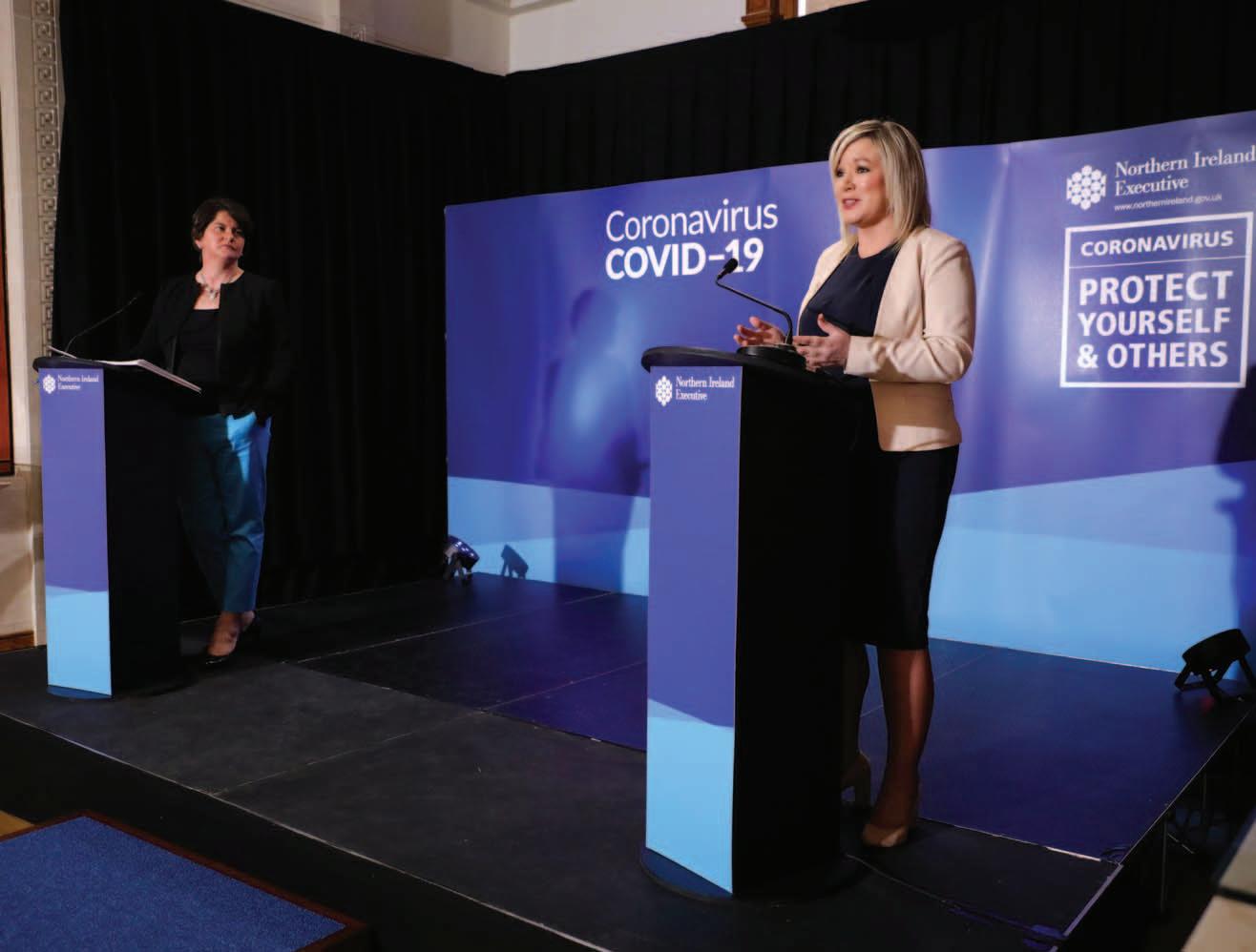
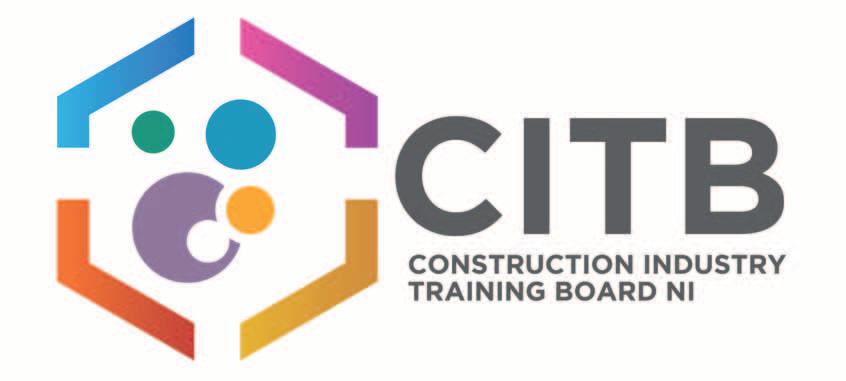
How prepared is Northern Ireland’s construction industry to meet the ambitions of 2050 and beyond?
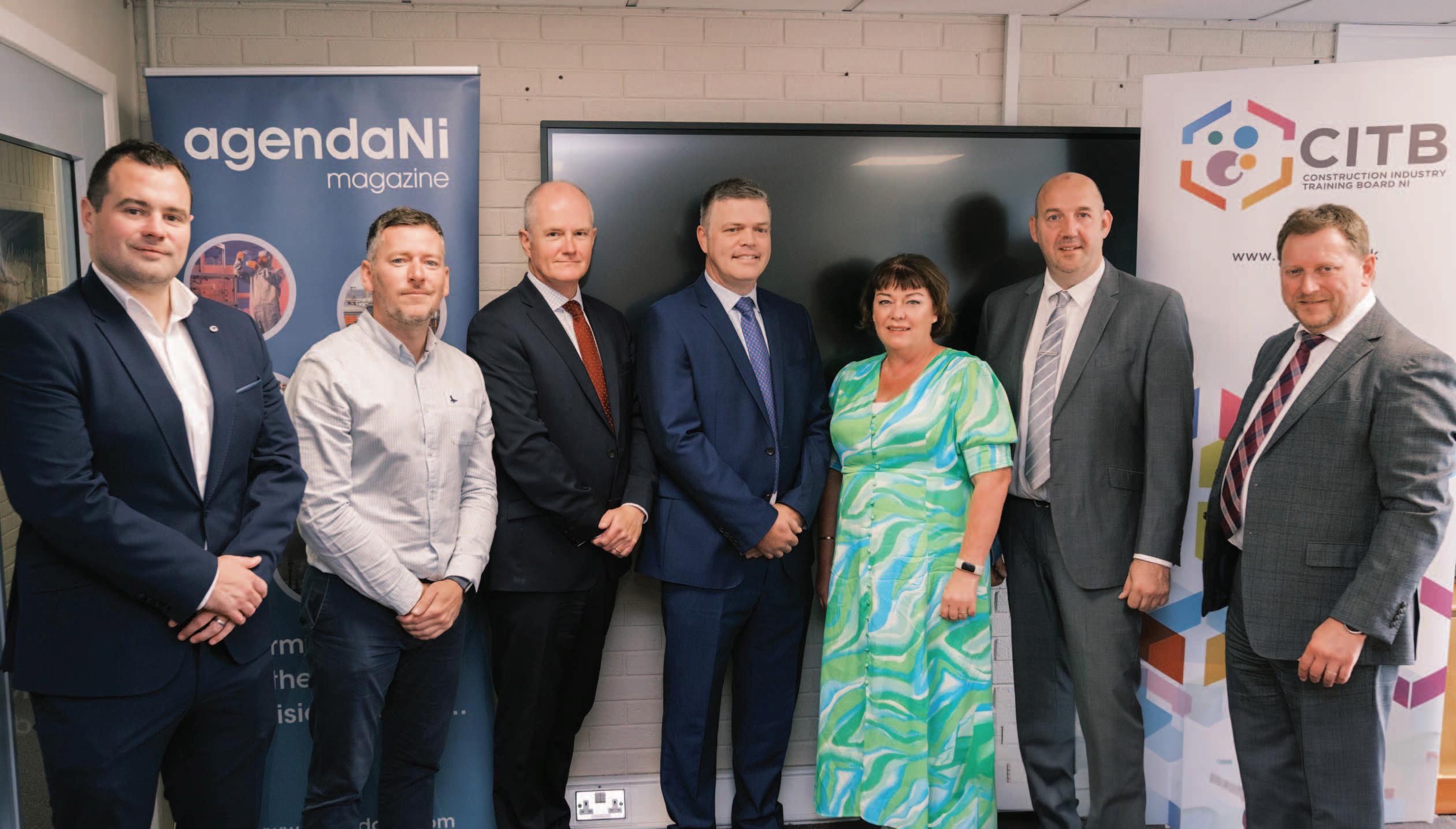 Mark Spence
Mark Spence
Undoubtedly, 2050 is a weighty date in all of our minds when considering ambitions for carbon neutrality. Progress towards net zero is still in the early stages and being planned in the challenging context of a lack of political direction and the lack of an investment strategy. For the construction industry to be prepared to meet future challenges, we need a project pipeline that will bring confidence to the market. Without that, we will not address the challenges of a skills shortage, an ageing workforce, and difficulties attracting young people. Government investment and support for
the construction industry must underpin efforts to demonstrate that construction is a viable career.
Lynn CarvillPeople are the most important asset of any industry and that is where focus is required. We need to make the industry attractive to younger people, but we also need a recognition that we are in competition for skills with a range of other industries. I think there is a greater need for strategic oversight to ensure the construction industry is an attractive and viable career option, if we are going to meet the demands of the future.
Barry NeilsonThe past 20 years are evidence that the shape of the industry 20 years from now is unpredictable. However, through much change and flux, what is evident is that





the construction industry has always risen to the challenges, whether that is around skills, new construction methods, or project management changes. Is the industry prepared for what we will meet in 2050? No, but can it be prepared to deliver on the demands? Absolutely. However, to do so there is a need for structural changes around how we bring people into the industry and how we train people to improve it.
Gavin
McGuireOne of the biggest challenges is getting the balance between short-term delivery and that strategic outlook of what the future holds. While the construction industry in Northern Ireland has demonstrated its resilience, it has done so through firefighting on a regular basis and operating with very short project pipelines of between three to six months. When you consider challenges like rising costs, staff shortages, and regulation changes, there is little room for long-term considerations. A clear long-term vision for the industry would be very welcome.
Padraig VenneySkills shortages in the construction industry have been longstanding and it is evident that part of the solution is making
The Construction Industry Training Board (CITB) Northern Ireland hosted a round table discussion with key stakeholders in the construction sector to discuss the opportunities and challenges of skills development.
the sector more attractive to younger members of society. A lot of government departments feed into the industry, but much of the work is siloed. If we are to meet future demands then it requires a joined-up approach with an overarching commitment to create an industry that is attractive for younger people.
Don Burns
In my experience, the challenge is more nuanced and centres more on retaining young people in the industry rather than that initial attraction. The attraction exists. A major government arm’s length body recently had over 480 applications to a call for six electrician apprenticeships. However, when we get young people into the industry, it can take between three to five years for them to qualify and earn an attractive wage. The reality is that in that timeframe, other industries and sectors can appear more appealing. If we want to have an industry that can deliver on future challenges, we need to improve the attractiveness of not only entering the industry, but the longterm benefits of staying there.
What transformative tools will best ensure the construction industry workforce is adequately skilled to deliver on future demands?




Barry Neilson


We have to change how we educate and recruit the construction workforce. Construction is one of the very few industries which can bring people in with low or no qualifications and develop them to build a career, yet we consistently put up barriers for entry to the sector. We need to move away from a focus on just qualifying for the core skills and look at how we upskill and reskill people for the multitude of different jobs that are available within the industry. Take digital for example, if we can integrate digital into our teaching methods, we will make huge strides in ensuring that new entrants are digital ready for a future workplace.
Padraig Venney
There is a need to transform how we manage and utilise apprenticeships. Currently, apprentices are expected to go far too long before realising a proper pay packet and that needs to change if we are going to attract the right people. Additionally, in Northern Ireland, we have an age barrier of 24, which does not exist in England. A young person at the age of 22 or 23 may decide that they want to go
Don Burns has been the construction centre manager for People 1st since 2020, having previously served as its employment coordinator since joining the organisation in 2014. People 1st is an employment and learning organisation, offering a range of government funded training programmes, employment support initiatives, and corporate training solutions.
Lynn Carvill is the CEO of WOMEN’STEC, a social enterprise headquartered in Belfast which specialises in trades skills training and the promotion of careers for women and girls in male-dominated sectors. She is also a founding member and Chairperson of the Northern Ireland Women’s Budget Group.

Barry Neilson joined CITB Northern Ireland as Chief Executive in 2010, having previously worked as Cognent’s Skills Director for Scotland and Northern Ireland. He began his career as an apprentice draughtsman and developed his career to become a Chartered Civil Engineer. He has held positions as deputy Director for NHBC in Scotland and Director for the Chartered Institute of Building.
Mark Spence is the Chief Executive of the Construction Employers Federation, the certified representative body for Northern Ireland’s construction businesses. He is the Northern Ireland appointee to the UK Construction Leadership Council and is industry representative on the Northern Ireland Procurement Board.




Padraig Venney joined the National House Building Council in 2004, working in London from 2010 to 2017, then relocating back home to Northern Ireland to take up the Regional Director role. Padraig is responsible for the customer relationship management activity with NHBC’s new and existing builder customers and stakeholders in Northern Ireland. Padraig is passionate about improving housebuilding quality throughout Northern Ireland for the benefit of developers and homeowners.

into construction but are presented with a barrier when they hit the age of 25. In NHBC, we are running an apprenticeship programme across a number of regions in the UK which fast tracks qualifications for a range of specialties. I believe there is a role for a similar approach in Northern Ireland.
Don
 Burns
Burns
The length of time it takes to do an apprenticeship and achieve qualification is too long and that is a barrier. A further barrier is a requirement for academic qualification to gain an apprenticeship. There are young people out there who could have the best hand skills and have a real passion for a particular trade but are hindered by a lack of academic qualifications. What those young people often opt to do is to go and work in an unskilled job for similar money to an apprenticeship. If we can make apprenticeships more accessible, then we can make transformative changes to encourage these people into the industry and to build a skilled career.
Mark
SpencePolicy has a transformative role. In 2022,


the Construction Employers Federation set up Construction Industry Futures alongside Unite and GMB trade unions and commissioned EY to review the local construction market and bring forward a series of recommendations for talent intervention locally. The recommendations highlighted the need for a skills forum, where a variety of stakeholders can meet together and tease out issues. By way of example, we have already addressed a finding that the average rate being paid to a young apprentice was well below what the same person would earn working in a filling station. It was a small but important step. At the launch of the joint Industry Skills Review, Alliance MLA Kellie Armstrong proposed the idea that we establish a ‘prospectus’ for the construction industry, allowing parents and school leavers to adequately assess the options and routes in the industry in full. It is an idea that I think could be transformative for attracting more young people and greater diversity to the sector.
Lynn CarvillBringing in more women to the industry would be a transformative change. Currently, 99 per cent of construction apprentices are male. We have put in place a number of interventions to encourage young females into the sector but there are still major barriers around retention, because the training and workplace environments are maleorientated. If we want to create a better-
skilled workforce, in the context of skills shortages, then greater diversity is a nobrainer. However, a lot needs to change, and more resources are required to make this happen.

Barry
NeilsonWe need to foster the enthusiasm that exists naturally in young children for construction and building into a clearly defined career path. That may sound ambiguous but we have recently ran a pilot construction bootcamp for schools onsite here at CITB NI and the enthusiasm and excitement of the children, both boys and girls, is clear to see. Somewhere after those early years, children are losing that enthusiasm which comes naturally to them and I think it is incumbent upon all of us to try to ensure that they do not disengage with the construction and built environment sectors too early. There are up to 3,000 career paths within the construction industry and while promoting each one can be difficult, the general idea of coming into the construction industry and creating a career that suits your talents is an easy sell.
Gavin McGuire
The construction industry is worth around £3 billion per annum to Northern Ireland plc but the value of the sector is not promoted to the extent that it could be. In particular, I feel strongly that we do not put enough emphasis on apprenticeships and their value to both the sector and the wider community. The current education system educates for unemployment in many cases, pushing people towards university degrees when we have a sector able and willing to train and develop people with skills to keep them employed for a lifetime. However, that proposition must be made more attractive.



Gavin McGuire
Mental health is a big problem for the industry. It is a stressful sector to be involved in and the industry has not prioritised the wellbeing of its workforce. To help with this, we are developing mentoring programmes to help individuals who are starting out in their construction careers to ensure that safeguards are put in place. If the support networks exist, then we can dispel the legacy perception of construction as a
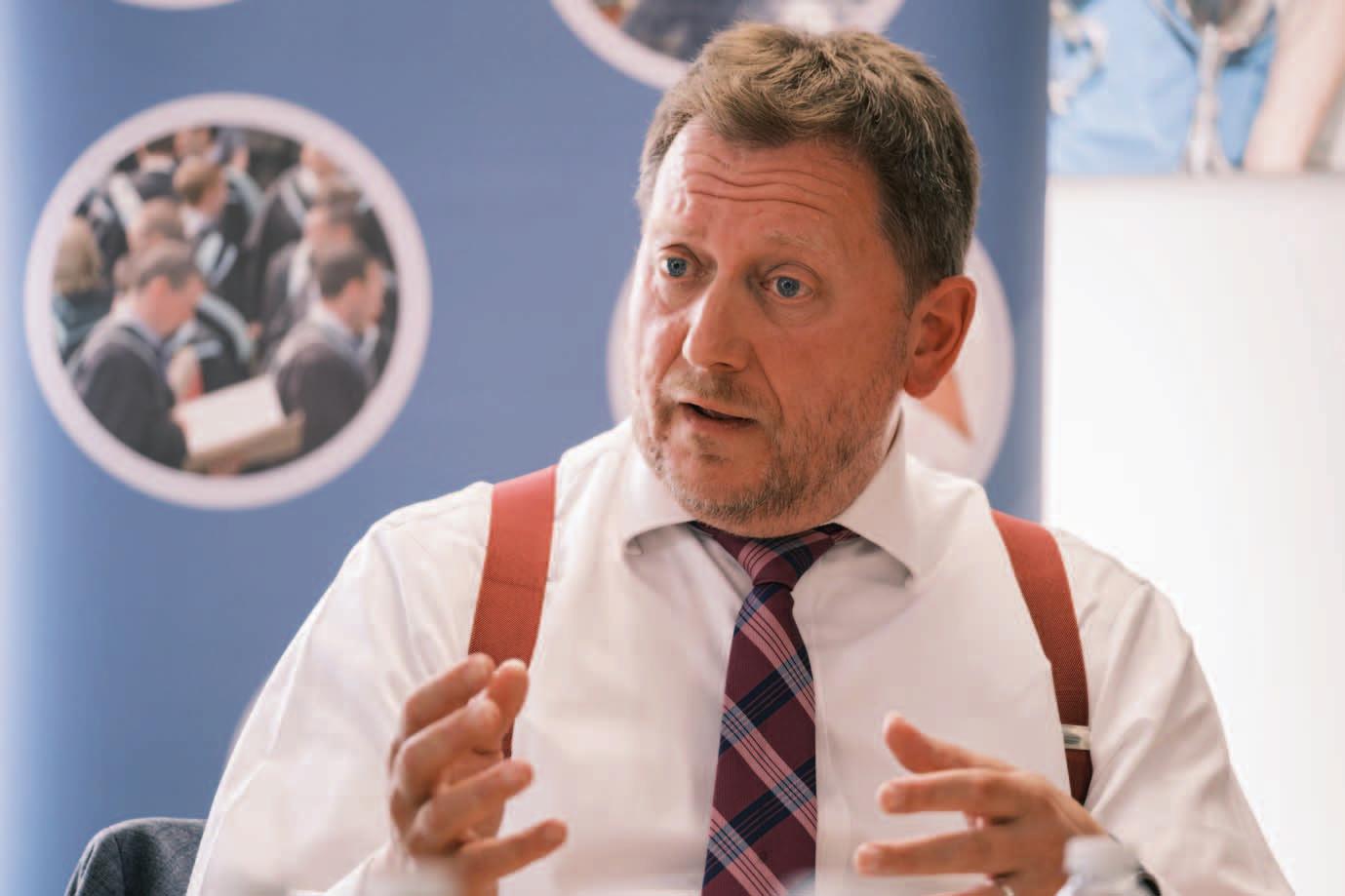
“There is a need for structural changes around how we bring people into the industry and how we train people to improve it.” Barry Neilson
volatile industry and make it a more attractive career choice.
Padraig Venney
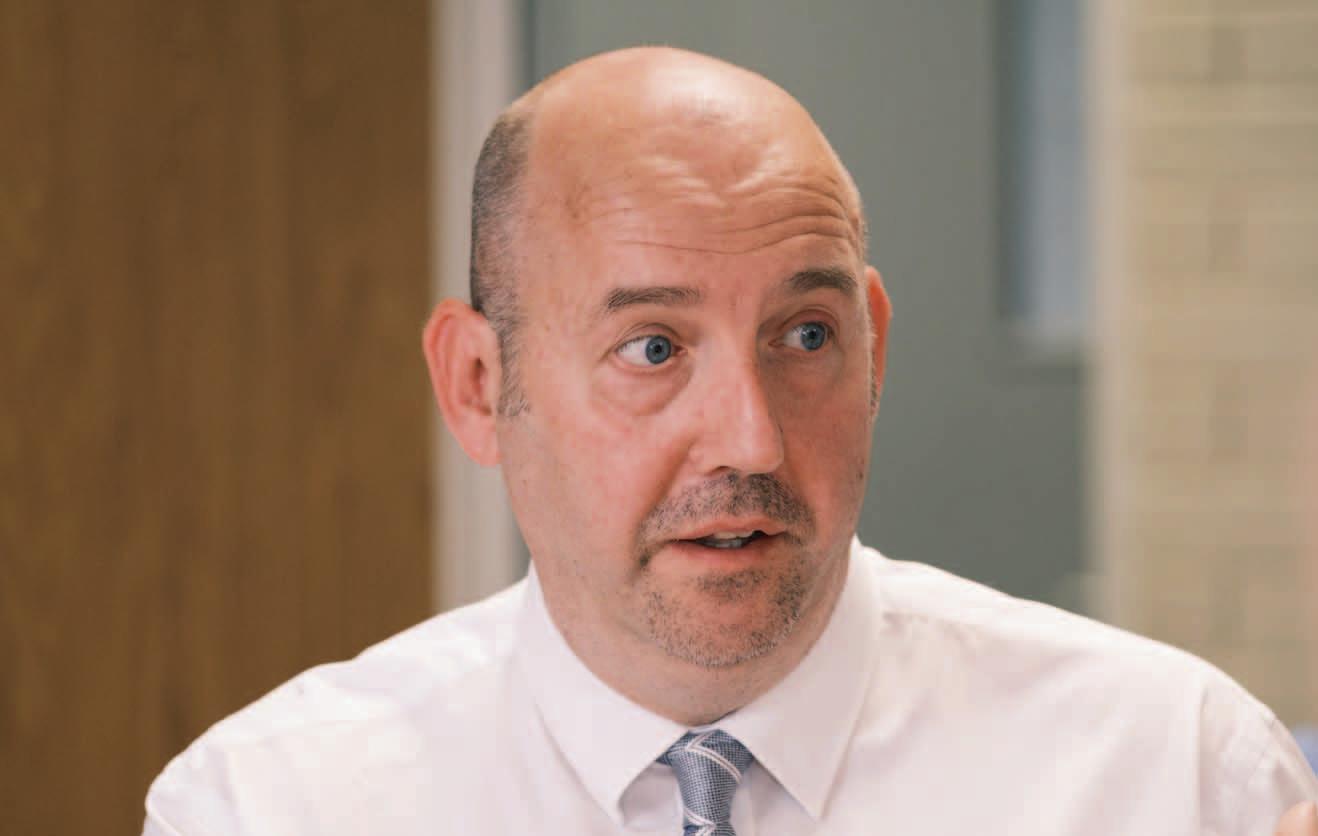
I would put skilled trade in Northern Ireland up against anything I have seen across the UK, but where I think that is being let down is in relation to safety and the working environment on site. Some rural housing developments in Northern Ireland are still being built on sites that resemble the 1980s for safe working environments. It would not be acceptable elsewhere and there needs to be recognition that this needs to change if we want to encourage people to pursue an attractive career in construction in Northern Ireland.
Don Burns
One of the main challenges is perception. A lot of young people are leaving school and are ill-equipped for the construction workforce, or at least what they perceive the construction industry and the culture to be like. Employers and schools have a role, working collaboratively, to set out what the industry is and the opportunity it presents. If the perception is normalised then it becomes more attractive to the workers of the future.
Barry Neilson
I would like to change the language slightly and say that what we want is for the industry and education sector to combine to deliver a fully competent
workforce, as opposed to a fully qualified workforce. Qualification does not necessarily represent quality delivery and so industry has a large part to play in the education of our future workforce. One of the greatest challenges to the attraction of the construction sector is that people often view the construction sector of the past and not of the future. The challenge is presenting the construction industry as the innovative and exciting industry it is.
Lynn Carvill
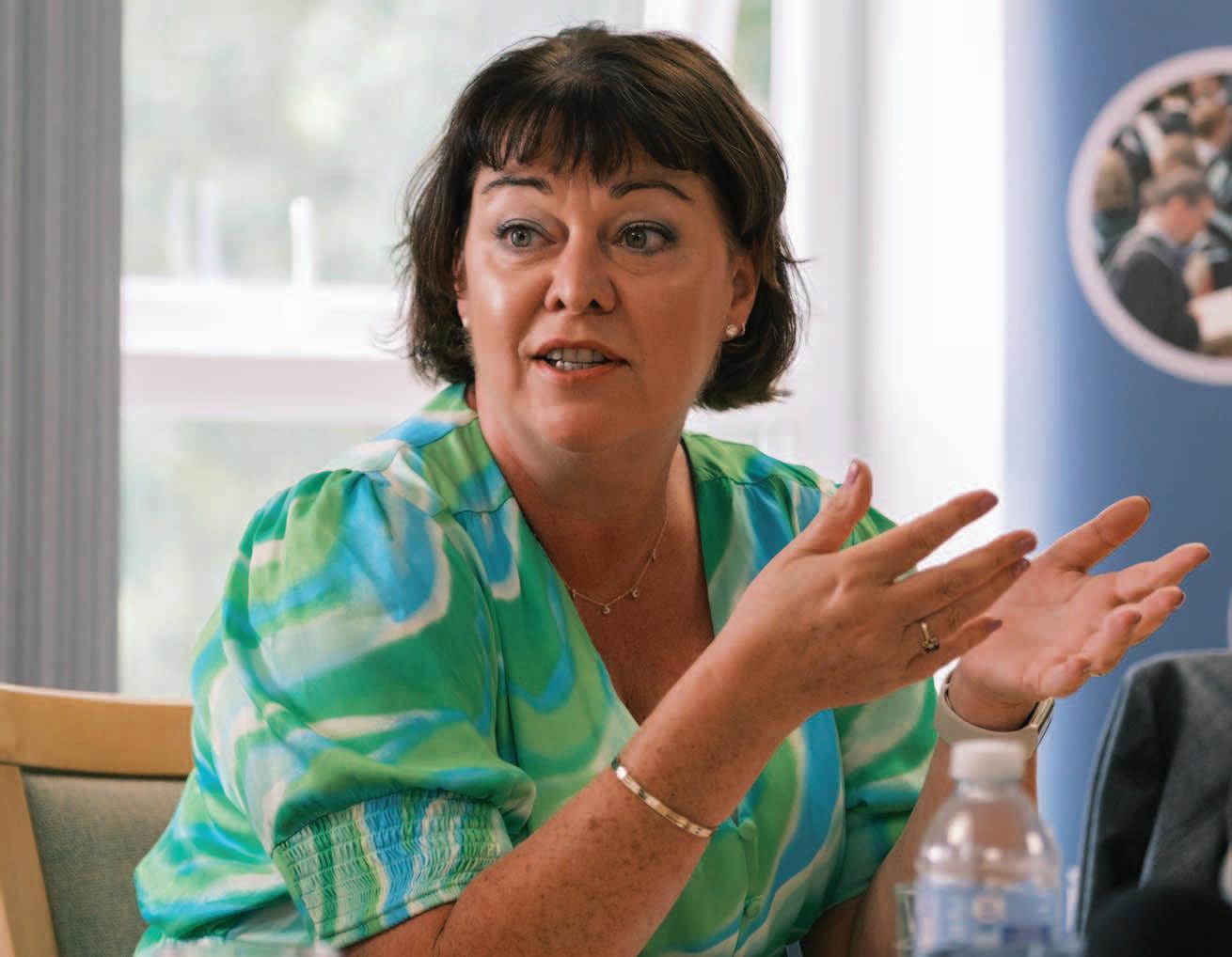
If you want to raise the standards of an industry, a good starting point is increased diversity. Today, we still see issues around standards, facilities, and health and safety. If the working environment is sculpted to accommodate everyone, then invariably standards rise for everyone and ultimately wellbeing outcomes are increased. It is also worth stating that today’s young people are different from the past generation. They have different standards and they have different needs, and the industry needs to recognise and adapt to that.
Mark Spence
That adaptation is key, if we do not address these needs then we will not get young people into the industry in the volume that we need. It is about recognition of competence and marking progression points so that you can show the parents of today’s young people and young people themselves the career progression potential. We need to change the mindset that construction is the area you go to if you do not get any qualifications. Improved safety is key to changing that mindset. We have made massive strides in Northern Ireland but we need to maintain enforcement and constantly encourage leadership around site safety.
Barry Neilson
I would add that we need more support around the transition points of career development. In the past, there was a sink-or-swim attitude to promotion or transition in the industry but that is rightly





“If we want to create a better-skilled workforce, in the context of skills shortages, then greater diversity is a no-brainer.” Lynn Carvill
“A pipeline of projects allows companies to train and develop skilled workers accordingly.”
Gavin McGuire
changing. There is a significant change from delivering a trade to a technical or managerial role but that shift does not need to be dramatic if we can provide bitesize bits of learning to enable people to make that transition.

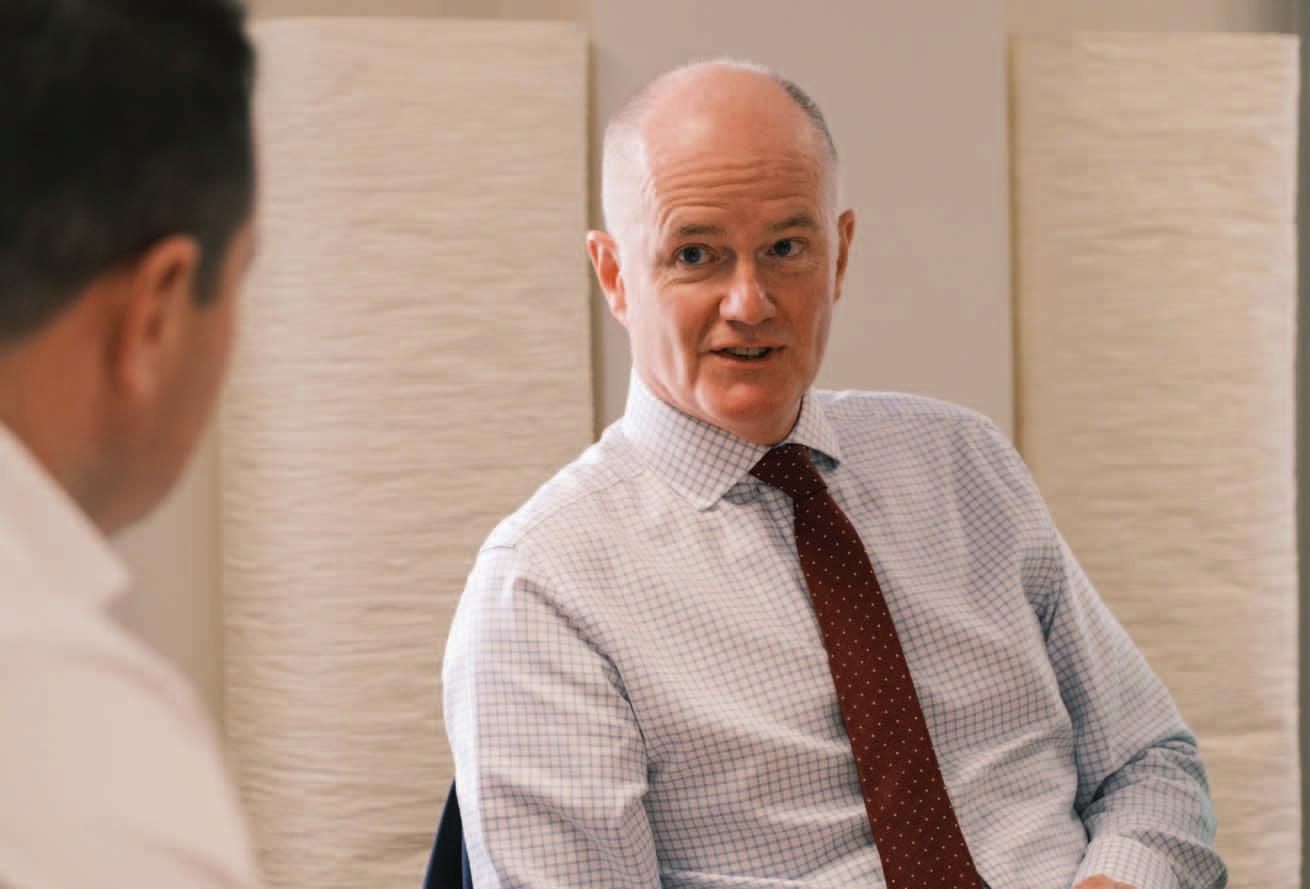


 Gavin McGuire
Gavin McGuire
When we talk to colleagues on the supply side, they are facing the same challenges to attract talent because we are fishing from the same pool. Similarly, there is an industry-wide acknowledgement of the need to meet future ambitions, such as net zero. I think developing a strong pipeline of work is the underpinning enabler. A pipeline of projects allows companies to train and develop skilled workers accordingly. In the aftermath of the 2008 recession, this industry lost around 30,000 people and people have long memories. If we want to attract people to the industry then we need to prove that it has a solid future.
Mark SpenceA trend over the last two decades is that large contractors no longer employ skilled tradespeople directly and are instead reliant upon their supply chain to provide labour. The challenge with that is that these are often small businesses that do not have the capacity or resources to

upskill or reskill their staff. I think the pandemic helped reinforce to large contractors the need to support their supply chain. In Great Britain, the Construction Leadership Council Skills Plan sets out to mandate those companies tendering for public works to directly employ almost all of their staff, but the reality is that Northern Ireland does not have a large and consistent enough pipeline for that to be successful.
Don BurnsFinancial incentives for employers to bring in apprenticeships work. It was proven during Covid-19 recovery, when a



rise in apprenticeships correlated with a rise in incentives. Subsequently, the volume of availability has fallen as the supports are withdrawn. We have discussed making the proposition for young people, but we also need to make it attractive to employers.
Padraig
Above the construction industry, I think there needs to be ownership from government in providing that pipeline. A good starting point would be long-term budgets, which have been discussed but never materialised. A clear pipeline of projects would not only offer clarity for the
“I think the pandemic helped reinforce to large contractors the need to support their supply chain.” Mark Spence
“We need to improve the attractiveness of not only entering the industry, but the longterm benefits of staying there.” Don Burns
public sector but also make Northern Ireland a viable investment option for the private sector. Part of creating that pipeline would be solutions to clear structural problems such as planning delays and land availability.
Barry NeilsonAround 10 years ago, CITB NI ran a scheme where we directly employed apprentices, replicating a successful scheme in England. The scheme failed here in Northern Ireland, and I think the reason it failed was that it was ahead of its time and employers were not ready for it yet. I genuinely believe there may be scope for a similar scheme now that organisations are more accepting of the value of implementing social clauses. We work on a constant basis with the industry to highlight the value of bringing through apprenticeships, and now provide financial support to employers for over 900 apprentices per year. One of the challenges we face is that many smaller organisations fail to see the bigger picture and are risk-adverse to putting resources into an apprentice who may move elsewhere when qualified. The point that I raise with these people is that there is a circular element to industry improvement and that it is a mobile workforce, where the training of an individual is to the benefit of the whole industry.

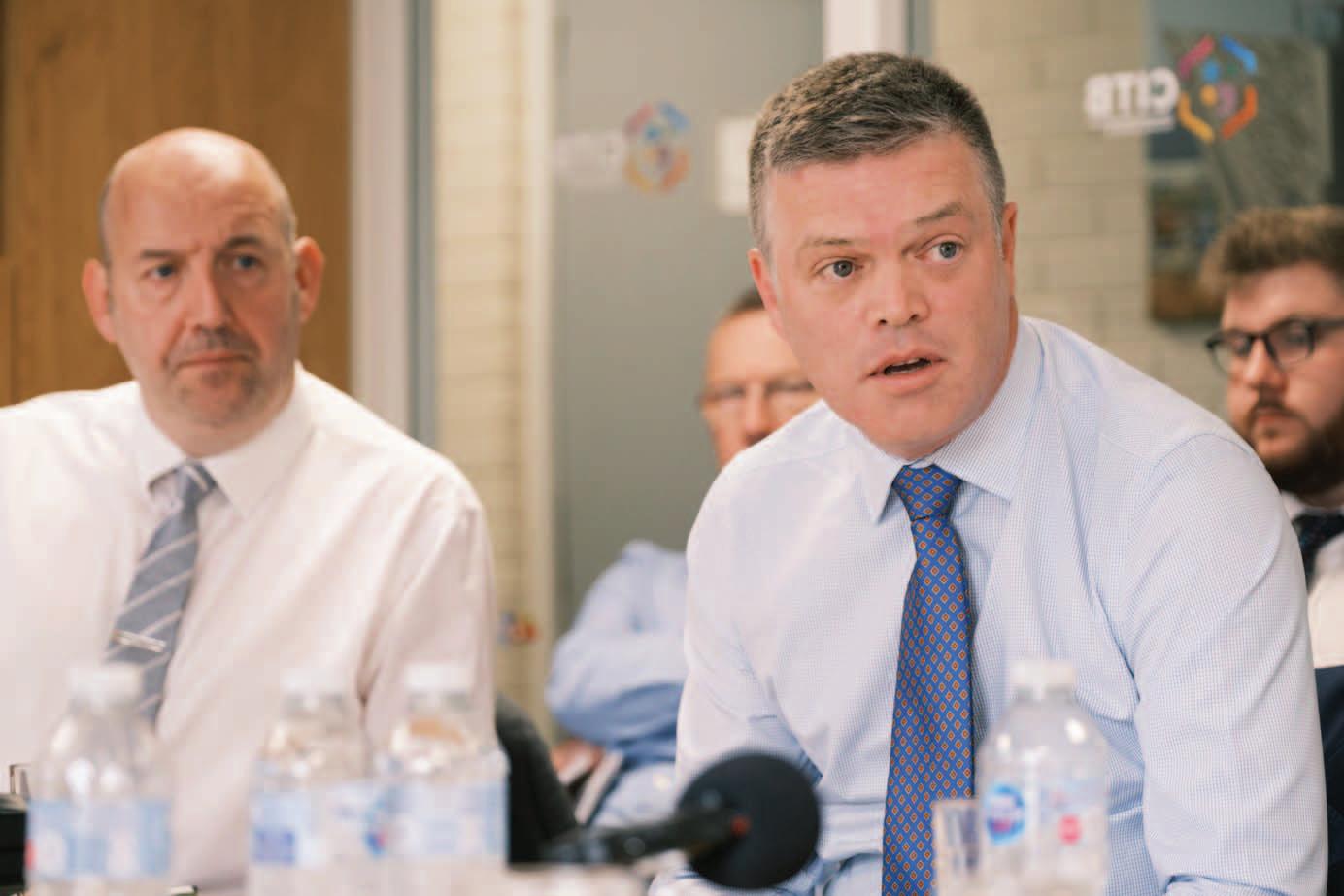




Don
BurnsFor me, it is around financial support. If we are going to change the culture and direction of the industry then we need focused investment, which will be to the benefit of employers, learners, and educators. Young people are the future of the construction industry, but if we do not make it financially attractive to them, we will not produce the workforce needed.
Padraig Venney
We need a complete overhaul of apprenticeships. There is a need to remove the current age barrier and develop a system that fast tracks qualification and significantly reduces the timeframe. Broadening the accessibility of skilled trade will improve the productivity of the sector.
Gavin
McGuireToo many sections of the industry are too lightly regulated. Anyone can call themselves a builder regardless of competence or professionalism. The FMB is campaigning for a licensing scheme for the building industry as a whole, like the one that is in place for the gas and electrical trades. Companies would need to show a minimum level of competence to be able to trade. We believe that it would help increase quality and standards, improve professionalism, help improve health and safety compliance, and improve the image of the sector, which is key if we are to attract new talent.
Barry
NeilsonI find it frustrating when I hear politicians and officials talk about priority sectors, those high-value sectors to attract inward investment, and not discuss the role of construction. The built environment is the bedrock of our economy, and the construction industry builds the world in which all other sectors operate. I would like to see a recognition of the construction industry as an enabler for those priority sectors.
Lynn CarvillCurrent careers delivery, be that through government, through schools, or within

the sector, is fragmented. There needs to be a greater focus on an overarching curriculum for attraction and retention in the industry, starting from an early age. In terms of policy, the introduction of mandatory social value scoring to public procurement contracts since June 2022 has landed with difficulties for both the industry and for the community and voluntary sector. Social value can be a very useful tool for the industry but I think there is a need for a review of how that policy is being implemented.
How the apprenticeship levy is being handled in Northern Ireland is deeply frustrating. The contractors of this region can ill afford to pay it, and get nothing in return. We hear from local politicians that it is out of their control and is being led by the Treasury in Westminster, but the reality is the money comes back in the block grant. Our MLAs need to step up, identify that money within the block grant and allocate the finances to where they should be spent.
“There is a need to remove the current age barrier and develop a system that fast tracks qualification and significantly reduces the timeframe.”
Padraig Venney

whether between Great Britain and Northern Ireland, or between Northern Ireland and Ireland (and the EU as a whole), remains their number one concern,” the report says.
Therefore, the committee has called on the UK Government to create and maintain an up-to-date record of regulatory divergence and its impact on Northern Ireland.
Currently, the UK Government is pushing a trade agenda which aims to realign British trade away from the EU, with entry into the Comprehensive and Progressive Agreement for Trans-Pacific Partnership (CPTPP), a trade agreement between countries in the Americas, Oceania, and Southeast Asia, seemingly a first step. However, the European Union accounted for 54.3 per cent of total UK exports in 2021, exemplifying the scale of the challenge of trade realignment for the UK Government.
Overall, the sub-committee reports that business representatives and other stakeholders have welcomed the Windsor Framework, and that there is positivity among this group over the potential that this resolution provides for problems that may arise in the future to be resolved in a collaborative manner.
In terms of day-to-day business for organisations, the committee promotes the upsides of the provisions of the Windsor Framework as including the movement of goods from Great Britain to Northern Ireland via the green lane of retail goods, agrifood produce including chilled meats, parcels, pets, and human medicines. However, the committee acknowledges that some of the

processes of the Windsor Framework will be more burdensome than those under the Protocol as it was able to operate with grace periods and easements.
“While the green lane will benefit large retailers in particular, some retailers, and some other sectors, may have to use the red lane,” the report states.
The committee report also finds that there is an “underlying fear” that Northern Ireland will find itself in a “no man’s land” between Great Britain and the EU, placing the competitiveness of Northern Ireland businesses and their supply chains in jeopardy.
“Business representatives stressed to the Committee that regulatory divergence,
Whilst the UK continues with its “going global” trade agenda, ESRI data shows that trade between Northern Ireland and the Republic has “grown substantially”, with the terms of the UK’s exit from the European Union necessitating a more cohesive cross-border approach to trade. Therefore, it remains unclear whether trade developments being pushed by the UK will have a significant impact on the Northern Ireland economy.
Committee chair Michael Hastings Jay, a crossbench peer and a former senior official in the Foreign and Commonwealth Office, said upon release of the report: “The Windsor Framework is a distinct improvement on the original protocol. But it does not solve all the problems which the Protocol raises… The Government and the European Union need to remain closely in touch with each other. But they must also ensure that Northern Ireland stakeholders are closely engaged throughout.”
The Windsor Framework is an improvement on the Northern Ireland Protocol as originally negotiated, but problems remain, according to the House of Lords Protocol on Ireland/Northern Ireland Sub-Committee.Credit: UK Government
“This is my normal. Poverty is all I have ever known.” That is just one example of the testimony from unpaid carers that is published in the latest research from the Carer Poverty Commission Northern Ireland.

The Commission has spent the last six months speaking to those who provide unpaid care for sick or disabled family members and friends across the region, to better understand the financial circumstances they are living in. The result is a devastating insight into the hardship facing many local carers.
We found that one in four carers here are living in poverty, equating to 55,000 people, which is significantly more than the poverty rate among Northern Ireland’s non-carer population (16 per cent) and higher than the carer poverty rate in the rest of the UK (23 per cent). These numbers represent local carers living in despair every day, as they grapple with a combination of inescapable caring costs, barriers to work, and pitiful welfare support.
We have carers who are embarrassed to have family members visit, because the
pennies per hour they receive in Carer’s Allowance is not enough to put heating oil in an empty tank.
Carers borrowing money from loan sharks so they can clothe their children. Carers saying a prayer that their bank card is not declined every time they arrive at the supermarket till.
And carers who just cannot make their finances stretch far enough each month, despite relying on charity shops and cutting back on all the essentials they can.
Anxiety, chronic stress, and wider mental ill-health are the inevitable consequences.
Northern Ireland’s unpaid carer population is saving the public pursue billions of pounds each year, propping up our health and social care system and saving Stormont’s budget from total collapse. They should not be condemned to a life of hardship, hunger, and debt in return.
Our policymakers must do better, and it is particularly shameful that when unpaid carers are facing such dire poverty, they
cannot look to their government for help. The Stormont institutions must return urgently and make carers a priority, starting with reform of the support carers receive through the welfare system, as well as delivering the employment rights that carers need to be able to safely juggle paid employment with their caring role.
Businesses and wider society have important roles to play, too, by introducing the supportive practices and policies carers need to be able to go to work and utilise community services. The cost-of-living crisis has left very few families untouched, but too many of our carers were struggling to make ends meet even before the price of food, energy and other bills began to skyrocket.
We need political and civic leaders to deliver a future where carer poverty is never considered ‘normal’ again.
T: 028 9043 9843
E: povertycommission@carersni.org

W: www.carersuk.org/carerpovertyni

Northern Ireland’s unpaid carers are living in devastating poverty, and they need help from Stormont now, writes Carers NI’s Craig Harrison.Craig Harrison, public affairs and media manager, Carers NI.
Achieving our net zero goals will require us all to make significant behaviour change to reduce our carbon emissions. Most of us will need to change how we heat our homes, travel, shop, and perhaps even adapt our diets.
For some of us, these changes will not be affordable without help, for others, they may not be palatable, and for many of us, they will not be easy.
When the Consumer Council discusses the opportunities and challenges the energy transition presents with the people of Northern Ireland some themes consistently arise; the need for protection, honesty and assistance in the form of education, affordability, and simplicity.
In the second of a three-part series, Director of Infrastructure and Sustainability at the Consumer Council, Peter McClenaghan, discusses the organisation’s recent engagement with consumers which finds that people need assistance, honesty, and protection, in exchange for participating in the energy transition.

The Consumer Council is Northern Ireland’s consumer representative body and works to promote and protect the interests of consumers.

A key aspect of the Consumer Council’s role is to facilitate understanding of consumer attitudes amongst policy makers and businesses. We do so via annual consumer studies, daily interaction with consumers, and one-off engagement exercises like the
Consumer Forum on consumer protection during the energy transition, which we held in February 2023.
Research of this type deepens our collective understanding of consumers’ lived experience and attitudes to decarbonisation. Such understanding is essential if we are to put in place the necessary support structures needed to achieve Northern Ireland’s net zero target.
There is a responsibility on energy sector leaders, government, policy makers, regulators, energy suppliers and equipment installers, to empower consumers to make the necessary changes in our daily lives that enable us to reduce our household carbon emissions.
In the first part of this series (agendaNi issue 114), we outlined how consumers told us they need assistance in the form of knowledge, affordability, and simplicity to facilitate behaviour change.
This will necessitate education to close the knowledge gap. At the present time, consumers tell us they do not have sufficient information to help them make the informed decisions which are critically important during a period of significant change.
Measures to alleviate consumers’ cost concerns are also essential. Incentives, grants, and low-interest loans will play a crucial role in helping us all to make lifestyle changes.
Simplicity will be crucial. We must make lifestyle change easy through good infrastructure planning, straightforward
Peter McClenaghan, Director of Infrastructure and Sustainability, Consumer Council of Northern Ireland.customer interfaces, and providing smooth access to the tools and applications consumers need to support our decision making.
We are collectively learning that decarbonisation may come at a cost to our finances and the way of life we are used to.
Consumer Council research shows that many of us are willing to accept some cost but expect honesty in return. Consumers want energy transition leaders and decision-makers to be straight, open, and transparent with them about the tough choices that may have to be made.
Trust in the sector has been eroded by the energy price crisis, with consumers seeing companies generate record profits despite their bills rising.
If this is combined with demands for change upon individual householders or communities without adequate explanations that address people’s concerns, we will find that consumer behaviour becomes even more difficult to shift.
The overriding message coming from our Consumer Forum participants is that consumer protection is vital. During a facilitated discussion regarding the issues and demands upon individual households that may arise during the energy transition the participants highlighted their needs:
• Protection from mis-selling: This includes being sold technology that is, or quickly becomes obsolete, products that are not fit for purpose, and the upselling of unnecessary extras.
• Cost protections: Price caps on equipment and access to impartial guides to best value. A requirement on energy suppliers to offer tariffs that fit consumers’ needs and means.
• Installation: Supplier and installer certification and registration. Protections against damage and disruption during installation of new equipment.
• Plain language and numbers, particularly in the terms and conditions.
• An ultimate complaints arbiter.
The Northern Ireland Energy Strategy places consumers’ needs at the heart of its decarbonisation ambitions. It is essential that we build on this commitment by developing appropriate consumer education, regulatory protection, and financial support structures.
A fantastic starting point would be agreement on clear, honest, and straightforward messaging from the sector in order to build and sustain trust in the sector, in the likely providers of new technologies, heating systems, and fuel sources and to begin encouraging consumers to change their behaviour. This should be enhanced through coordination and the establishment of a single body to become the trusted voice to educate consumers about renewable technologies and guide and support them through their decarbonisation journeys.
Strong consumer protection already exists in parts of our consumer energy market, including standards of service regulations, critical care registers, product kite marks, installer registration, and established second-stage complaint bodies such as the Consumer Council. It
is important that we build upon these frameworks so that all energy consumers, regardless of fuel used, receive an appropriate standard of consumer protection. This should include meeting consumer demand for an ultimate complaints arbiter.
Consumers tell us adequate protection is their bottom line for involvement in the energy transition. Without adequate consumer protection we will not achieve our decarbonisation goals but protect consumers and their confidence will drive the new domestic market in renewable heat and power.
To read the Consumer Council’s latest report – Consumer attitudes to protection during energy decarbonisation visit: www.consumercouncil.org.uk
To read the first of this three-part series visit: www.agendani.com/guiding-theenergy-transition/
Contact the Consumer Council:
T: 028 9025 1600
E: contact@consumercouncil.org.uk
W: www.consumercouncil.org.uk
“Without adequate consumer protection we will not achieve our decarbonisation goals but protect consumers and their confidence will drive the new domestic market in renewable heat and power.”
Intended to inform policy the future strategy for the rail sector in Ireland – north and south – the inaugural All-Island Strategic Rail Review (AISRR) was jointly commissioned by Minister for Transport Eamon Ryan TD and then Minister for Infrastructure Nichola Mallon in April 2021. Subsequently produced by Arup, the Draft Report for Strategic Environmental Assessment Consultation was published in July 2023.
Approved by a steering group comprising the Department of Transport, the Department for Infrastructure, Iarnród Éireann, Translink, the Department of Housing, Local Government and Heritage, the National Transport Authority, and the Commission for Railway Regulation in April 2023, the draft report was published in July 2023 and presents the fnal fndings from the AISRR.
Focusing on how an enhanced rail network in Ireland could help decarbonise the transport systems, improve connectivity and accessibility between cities and regions, and support balanced regional development, the draft report is a framework to meet these aspirations. With 2,300km of existing public rail lines, the AISRR aims to increase this to 2,950km of faster and lower carbon lines.
While transport policy in both jurisdictions aims to increase the share of passenger journeys which are completed via sustainable modes (public transport and active travel) there are several challenges inhibiting rail from reaching its full potential. Currently, these include:
• significant gaps in network coverage;
• relative service infrequency and low speeds;
• the least electrified railway in Europe;
• failure to meet customer expectations in terms of quality of service;
• inconsistent station access;

• no existing rail connection to any major airport;
• inconsistent integration of cities and jurisdictions;
• demographics which are not conducive to a high density and frequency network; and
• constraints of Ireland’s natural assets.
To unlock the necessary investment, therefore, the review will act as a framework for delivery.
At the same time, the review has determined that costs of developing a new, fully segregated high-speed (300km/h) rail network would outweigh any benefts it would unlock.
To realise the opportunities and meet the ongoing challenges, the AISRR contains six overarching goals and 13 objectives under one vision: “An accessible, effcient, safe, and sustainable transport system that supports communities, households and businesses.”
The six goals are:
1. Contributing to decarbonisation: Reduces carbon emissions associated with rail construction, operation, and maintenance, while also doubling rail’s modal share (at the expense of private vehicles).
2. Improving all-island connectivity between major cities: Offers an attractive public transport option for
travel between Ireland’s seven largest cities (Dublin, Belfast, Cork, Limerick, Derry, Galway, and Waterford).
3. Enhancing regional accessibility: Providing people living in rural Ireland with enhanced access to economic opportunity and public services, thereby improving interregional accessibility.
4. Stimulating economic activity: Supporting compact growth through the integration of public transport with land use, enhancing the integration of rail with other transport modes, and minimising the impact on the environment.
5. Encouraging sustainable mobility: Making a contribution to balanced regional growth beyond the major urban centres and supporting the efficient movement of people between economic centres and international access points.
6. Achieving economic and financial feasibility: Planning financially feasible investment in rail, identifying potential funding, and ensuring investment aligns with AISRR objectives.
The review also divides its numerous potential rail solutions into four primary categories:

1. new lines;
2. enhancement of existing lines;
3. new stations; and
4. increased frequency.
In total, the review makes 30 recommendations, intended to provide a pathway to achieving the AISRR’s goals and objectives. However, the review emphasises that the recommendations do not constitute offcial policy in either jurisdiction in Ireland. “Ultimately, it will be for the Irish Government and the Northern Ireland Executive to consider which of the recommendations described in this report should be taken forward for further development. Each of the recommendations described in this report would be subject to separate appraisal and decision in line with applicable governance processes in each jurisdiction,” it says.
If implemented, the review’s recommendations are projected to deliver several benefts. Firstly, a transformational improvement of quality, speed, and frequency of rail services would signifcantly reduce journey times. Secondly, increased direct services between major cities would improve connectivity from the north-west of Ireland to the south-west.
Again, if fully implemented, the total capital expenditure is projected to be €36.8 billion as per 2023 costing, with the Republic spending €27.6 billion and the North spending €9.2 billion. This would equate to €1 billion per annum and €0.37 billion per annum respectively over a 25 year period. In the Republic, this would be comparable with the peak annual capital investment in the motorway network during the early 2000s. The review advise that more detailed work is required to prove the feasibility and affordability of many of the above recommendations, in order to inform capital investment decisions, north and south.
Decarbonise the rail network via electrifed intercity lines, alongside hybrid, hydrogen, and electric rolling stock.
Connect Belfast International Airport, Dublin Airport, and Shannon Airport to the railway network and improve all existing rail-to-airport connections.
Simultaneously, reduce waiting times on

city approaches by segregating longdistance/express services from local services.
Upgrade the primary intercity network between Dublin, Belfast, Cork, Limerick, Galway, and Waterford by increasing top speeds to 200km/h and ensuring that rail journeys are faster than the equivalent car journeys. Simultaneously, upgrade the cross-country network to dual-track or even four-track and increase the frequency to hourly services between intercity pairs.
Enhance rail connectivity to Ireland’s busiest ports, reduce track access charges for freight, and develop frst mile/last mile rail access to Dublin port.

Increase rural and regional speeds to a minimum of 120 km/h, reintroduce the Western Rail Corridor between Claremorris, County Mayo and Athenry, County Galway, extend existing lines into counties Tyrone and Donegal via Portadown, Dungannon, Omagh, Strabane, Derry, and Letterkenny, reintroduce the South Wexford Railway, and boost rail connectivity in the north midlands via Mullingar, Cavan town, Monaghan town, Armagh City, and Portadown.
Improve the quality of onboard experience by providing catering, a clock face
timetable, enhanced multimodality, and streamlined cross-border travel.
Implementation of the review is scheduled over phases. Firstly, short-term interventions from now to 2030, secondly, medium-term interventions from 2030 to 2040, and long-term inventions from 2040 to 2050. Implementation, therefore, aligns with the common goal of achieving carbon neutrality, both north and south, by 2050.
Anticipating the potential environmental impact of the development of rail infrastructure, the draft AISRR is accompanied by an Environmental Report, Natura Impact Statement, Appropriate Assessment Screening Report and Strategic Flood Risk Assessment Report. The Strategic Environmental Assessment (SEA) consultation period closes on 29 September 2023, and the relevant ministers in each jurisdiction will be required to approve the fnal review, including any changes which arise from the consultation. A “predominantly positive environmental effect” is forecast by the review in light of the proposed deliver of “a more effcient and more accessible rail network which will ultimately encourage a modal shift from private to public transport”.
Subject to approval, it is anticipated that the fnal review will be published at the end of 2023. The review, adds: “Should there continue to be an absence of Ministers in the Northern Ireland Executive, approval will be considered taking into account the relevant legislation in place at the time.”
If implemented, the recommendations of the AISRR would mean:
• 80% of train kms delivered by electric trains
• A rail passenger journey could have a carbon footprint 80% less than an equivalent EV journey
• 700,000 people living within 5km of a railway station
• An up to 50% reduction in rail journey times between major cities
• Hourly services between major cities
• Half-hourly services on the busiest routes
• 90% of aviation passengers can access airports by rail
• A €20 billion boost to the island’s economy
• 66% of freight tonnage would enter seaports with rail access
This year marks a significant milestone for McAdam as we celebrate 60 years in practice. During that time, with the support and encouragement of so many friends and clients, we have expanded from a small engineering consultancy into one of Northern Ireland’s largest multi-disciplinary practices providing services which include water and environmental consultancy, civil and structural engineering, architecture, project management and health and safety advice across a wide range of sectors and clients. Our success over the last seven decades has been built on the calibre of our staff, our client and community focus, and an unwavering commitment to provide the best possible service.
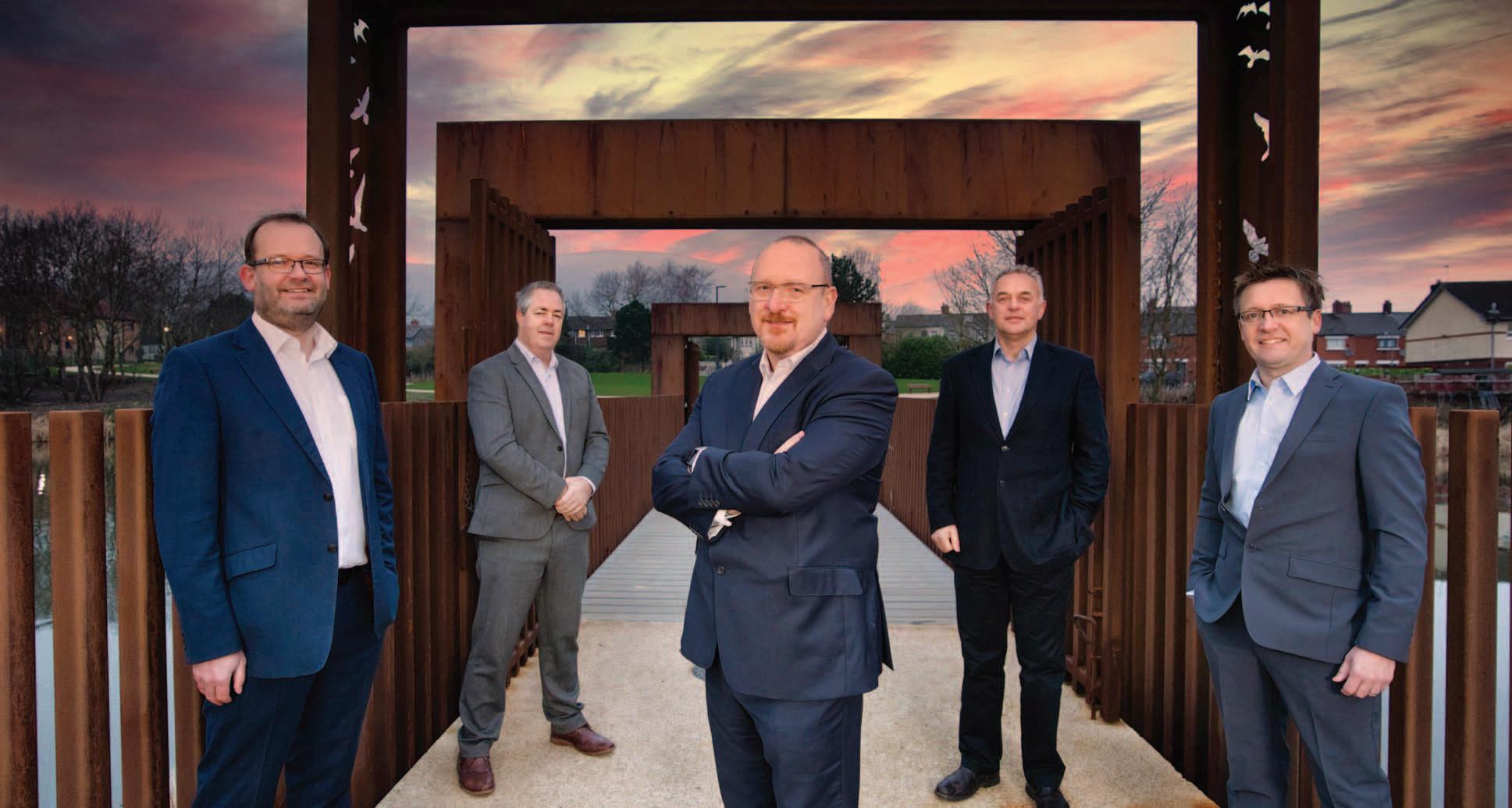
This approach was embedded from the inception of the company by our founder, Fred McAdam, who established FL McAdam Civil Engineers in Frances Street, Newtownards in 1963. Initially
the practice worked extensively for both Newtownards Borough Council and North Down Rural District Council on local infrastructure works.
In 1968, Fred invited Architect John Bell to join the practice. This was a bold and exciting development with both McAdam and Bell recognising the benefits of a locally based multi-disciplinary practice supported by other like-minded specialist sub-consultants. They recognised the benefits this could bring to McAdam Design’s expanding client base and this ‘partnering’ approach remains to this day.
Fred resigned in 1975 to pursue an illustrious career with the World Bank but such was the indelible mark he left on the company it still bears his name. After Fred McAdam’s departure, the company fell under the expert stewardship of John Bell and John Hearst. They registered McAdam Design
as a company in 1979 and it flourished in terms of staff numbers and scale of work, receiving national awards for water engineering and residential projects. Success continued and by the late 1980s McAdam Design were established as a key delivery partner for both the Northern Ireland Housing Executive and the Department of Environment water service.
In 1990, Bell and Hearst retired and a new Board of Directors was established, comprised of John Crothers, Jack McBride, Eddie Russell, and Alan Boyd. Significant operational improvements were implemented including CAD as a design tool, securing ISO 9001 Quality Assurance, and adding project management as a service.
McAdam Design were now well placed to support local clients as Northern Ireland finally received much needed investment in schools, healthcare, and water. Our growing reputation allowed the company to secure positions on key government frameworks whilst also enjoying project wins on many significant engineering and architectural schemes.
McBride and Russell resigned in 2000 and Alan Boyd was joined by Mark Oliver, Martin Hare and Reynold Anthony. The next eight years witnessed
McAdam’s original vision of partnership is enshrined in its evolution and expansion into one of Northern Ireland’s largest multi-disciplinary practices.McAdam’s new board of directors (L:R): Fergus Kerr, Neal Kerr, Martin Hare, John Findlay, and Stephen Harding.
substantial company growth with staff numbers increasing from 30 to over 80 professionals, however, the family feel of the business remained. This growth precipitated a relocation to larger offices in Belfast at Montgomery House on the Castlereagh Road which remains the company headquarters to this day.
During the 2000s our growth strategy continued to embrace Fred McAdam’s original vision of partnership, exemplified by key collaborations with internationally recognised designers such as Daniel Libeskind, Wilkinson Eyre, Fielden Clegg Bradley Studios, AFLS&P and WSP. Embracing these new collaborative delivery models, we delivered a range of challenging projects such as the North-West Gas Pipeline (Fingleton McAdam) and Northern Ireland’s largest Schools PFI. (Belfast Schools Partnership).
We were deeply shocked in June 2018 when our Managing Director Reynold Anthony died unexpectedly from a heart attack. He was a father figure to many and his passing was felt by both our company and across the wider industry. Whilst his loss resonated with the company it was a testament to the fortitude of McAdam’s senior staff that this catastrophe was overcome with minimal disruption to our project delivery.
In the aftermath of this tragedy and with Mark Oliver due for retirement a significant re-structure of the business was required. Maintaining continuity was important so Martin Hare remained on the board and was appointed Managing Director, whilst being joined by four new Board Directors in 2019. The new Directors, Fergus Kerr, John Findlay, Neal Kerr and Stephen Harding were all promoted from the existing senior management team thus ensuring the quality, culture and partnering values of the practice were retained whilst infusing the company with a new energy and direction.
After successfully navigating the Covid19 pandemic and a move to hybrid working in 2020, the new Board of Directors took time to reflect on both the history of McAdam Design and the coming challenges our clients and staff would face in the future.
To provide direction and focus we distilled our core purpose into one simple statement: “McAdam are committed to enhancing people’s lives and wellbeing through the design and delivery of innovative and environmentally aware projects which create a sense of place and leave a sustainable legacy for the next generation.
To deliver on the above our services extol and embed our core company values:
• to minimise the impact and maximise the benefits that our work has on the environment and people around us;
• to support our staff in developing their careers, provide equal opportunities and supporting educational and apprenticeship schemes; and
• to enhance the communities in which we work through delivering a legacy of sustainable projects.
Reflecting on the positive impact our work has on local communities, the new board decided to enhance our commitment through the creation of a new CSR fund. This fund has, to date, supported amazing organisations such as Water Aid, Live Here Love Here and the Lagan Dragons. By mixing direct funding and charitable donations with employee involvement schemes we are providing much needed support to our local communities and helping to instil a sense of civic pride. This has been enthusiastically embraced by all our staff.
With renewed energy and drive, combined with an updated brand, the
latest iteration of ‘McAdam’ has proved a success growing to 140+ staff, increasing our senior management team to 10 technical directors and 16 associates. We have secured BSi accreditations for H&S (ISO 45001) and BIM (ISO 19650) to add to our existing Integrated Management System (ISO9001/14001/18001).
Also, in recognition of our growing portfolio of work in the Republic of Ireland we have recently established McAdam Design (Ireland). In 2024 we are expanding our Board of Directors to include Chris Cheater to support our architectural service delivery.

Reflecting on the company journey and the projects delivered over the last 60 years we are extremely proud of a practice that with the help of nearly 550 fantastic employees has enhanced our local communities in so many ways whilst retaining the the core partnering values instilled by our founder Fred McAdam.

T: 028 9040 2000
E: admin@mcadamdesign.co.uk
W: www.mcadamdesign.co.uk
McAdam’s involvement in the award-winning Peace Bridge in Derry exemplifes its commitment to excellence and local community betterment.The Council of Europe (CoE) has said that more bilingual signage should be implemented in Northern Ireland in order to send the message that the “territory is shared”, but has warned that the naming of an Ulster Scots commissioner as “Ulster British” could “further contribute to the sectarianism surrounding cultural
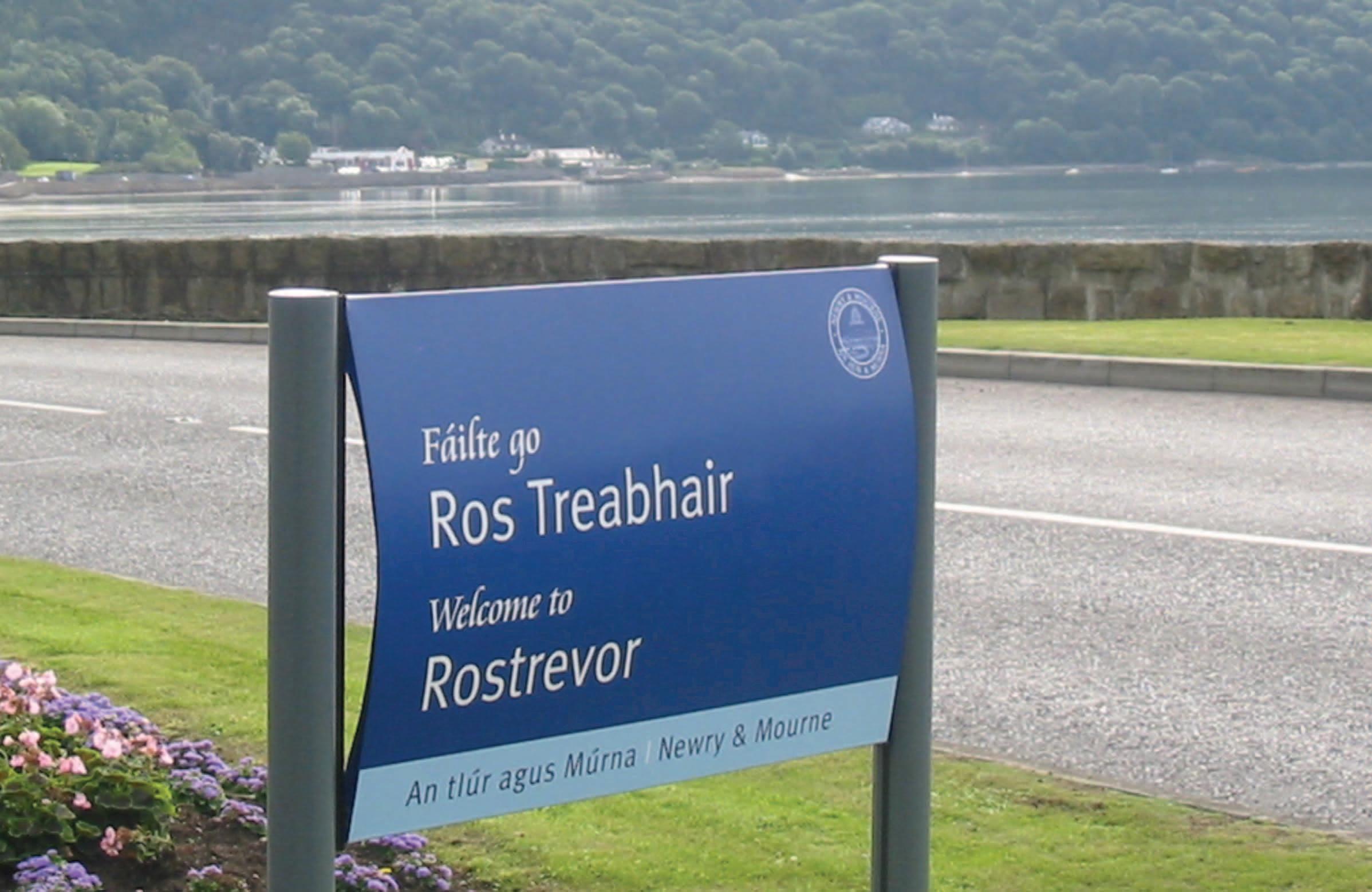
These comments were made in the CoE’s fifth monitoring report on the UK’s compliance with the Council’s convention for the protection of national minorities. The report investigated the status of national minorities and issues such as language and cultural rights, racism, integrated education, and the legacy of conflict within all four constituent members of the UK.
The report returned four main findings for Northern Ireland:
1. That the lack of an Executive over the report’s monitoring cycle is

“undoubtedly hindering the implementation of the Framework Convention and the situation is alarming for the Advisory Committee”. The absence of functioning Executive has “maintained the focus on postconflict issues which are entrenched along political divides – which overshadows the issues of any other minorities and paralyses issues relating to language and identity”.
2. That education remains split along religious lines and that there is “evidence that children growing up in
these contexts fear the prospect of integration” given the “weight of history” on society. The CoE also states that Brexit has been “felt in a particular way in Northern Ireland” and that there are “fears” that negotiations surrounding Brexit have “reignited tensions of the past”. Legacy proposals brought by the UK Government “purport to foster good relations but may threaten to destabilise the peace through the potential to grant conditional immunity from prosecution, and not pursuing any further prosecutions”.
questions”.
More bilingual signage needed to signal Northern Ireland is ‘shared’
These divisions, the Council says, call for “greater efforts to pursue integrated education through boosting the number of places available in integrated schools”. Among the CoE’s recommendations for immediate action is that authorities increase the share of pupils and students attending integrated schools and that they “seek to actively motivate parents and provide incentives for pupils and students studying in such schools, with a view to creating a fully integrated education system”.
3. Proposals relating to the Irish language and Ulster Scots that have been passed by the UK Parliament are “welcome”, but the Council warns that the proposals “further contribute to the sectarianism surrounding cultural questions”, with the appointment of a commissioner for Ulster Scots as being “for the Ulster Scots and the Ulster British tradition” conflating a minority identity with a distinct political one.
4. That the situation for people from Black, Asian, and minority ethnic backgrounds and Irish Travellers is “particularly alarming”, with Northern Ireland having the highest rates of hate crime in the UK per capita and Travellers being absent “from any form of representation or participation – even consultation by Government”. The lack of equality data collated in Northern Ireland “prevents concrete solutions being established”.

Among its main findings on language rights, the CoE states that there is a “good level” of language protection in Wales and England, but that “more could be done in Northern Ireland”. Further incentives for teachers of minority languages are said to be needed, particularly for Irish and Scottish Gaelic and it is said that, in general in the UK, a lack of permanent consultation fora with linguistic minorities prevents the raising of areas of concern on a regular basis with government and authorities.
In its recommendations for immediate action, the CoE “urges” the authorities to “intensify their efforts to develop and increase the offer and support to Irishmedium education in Northern Ireland, including for children with special educational needs”. The report’s further recommendations include the Advisory Committee calling on the authorities to ensure the implementation of the Identity and Language (Northern Ireland) Bill. With regard to the Bill, the recommendations also state that the authorities should “work with representatives of the Irish-speaking community to further develop Irish language policy in Northern Ireland” and “consider revising the Bill in consultation with the Ulster Scots minority representatives to address the conflation of Ulster Scots and Ulster British identities”. Representations from Ulster Scots speakers to the CoE are said to have “highlighted the insufficient state support for their language, the lack of action in diverse fields” and said that their “time and resources are mostly spent defending their interests from political debate”.
Reiterating its Framework Convention, the CoE states that “bilingualism in signposts should be promoted as it
conveys the message that a given territory is shared” and that it is “concerned that the lack of transparency as to [bilingual signage application] procedures in Northern Ireland”. It further stats that the “burdensome requirements for implementing minority language signage create a practical and disproportionate obstacle” to implementation. The two-thirds threshold utilised by many councils for the instalment of bilingual signage is described as “demonstrably prohibitive” and notes the Council is satisfied that this threshold has been lowered to 15 per cent of responses being positive and non-responses are no longer being counted as negative in Belfast. Representatives to the Council from the Irish language community stated their frustrations at variations between municipalities.
Considering these factors and related ones for Scottish Gaelic and Cornish, the Advisory Committee asks the authorities to “guarantee a transparent and consistent approach to the display of topographical indications in minority languages across England, Scotland and Northern Ireland, in conformity with Article 11(3) of the Framework Convention”, as is the UK Government’s responsibility as a member of the CoE.

Josephine Kelly took up the dynamic role of Director of Corporate Services at Newry, Mourne and Down District Council in October 2022. This was a step change into local government from a career spanning over 30 years, which has included senior management positions in public service organisations such as South East Regional College (SERC), Legal Services Commission, Agri-Food and Biosciences Institute (AFBI) and as the Director of Finance in NI Fire and Rescue Service (NIFRS).

Transitioning from public service into local government, she carries with her a passion for providing effective leadership, a firm belief in investing in a skilled workforce and the importance of understanding the opportunities and challenges that lie ahead.
Kelly qualified as a chartered accountant in 1994 and started her career with PwC, acquiring a solid foundation in financial and business acumen. Talking about her experience and what prompted her to take on a senior position at Newry, Mourne and Down District Council, she says: “The corporate services role is a natural progression for me and builds on my breadth and depth of experience of
delivering public services. It is a real privilege to now be working in local government for Newry, Mourne and Down and be part of a team providing council services and economic development in local communities.”
Most recently, she worked for AFBI as the Director of Finance and Corporate Affairs, including time as the acting Chief Executive.
“I think the proudest moment,” she recalls from her public career to date, “was working with the scientists at AFBI who usually provide analytical and diagnostic testing for animal health services. During the height of the pandemic, I helped to put in place the approvals and resources necessary to
create additional capacity within the AFBI team so that they could assist the Belfast Health and Social Care Trust in providing testing for Covid-19. This was in collaboration with Belfast Health Trust, QUB and UU under the auspices of the Department of Health’s Expert Advisory Group on Covid-19 testing. It was a real testament to what public services can deliver through partnership within a very short timeframe.”
This is the first time Kelly has worked directly with elected members across the political parties. Her involvement with the election count at Newry Leisure Centre in May during the local government elections was a standout moment during her first nine months inpost. “It was such a privilege to see local democracy in action and I am looking forward to working closely with elected members in a busy first year ahead of the new council term. On top of the to-do list for 2023/24 is the development of a new Digital and IT Strategy and looking at ways to improve the efficiency and sustainability of services as well as the delivery of our exciting capital projects.”
Kelly is well experienced in leading transformation projects and has led the restructuring of critical supporting services both in AFBI and NIFRS. In AFBI, she also developed the Finance Development Programme and secured vital investment in new systems and new ways of working.
She also recently acquired a master’s degree in executive leadership at Ulster University. With her new role taking her right into the political landscape of local government and spanning an ambitious remit leading skilled teams across a range of support functions including HR, finance, IT, communications, capital projects, and procurement, Kelly believes that leadership and communication is the common denominator in delivering at a senior level. “Leadership is all about people and that has not differed in any of my various leadership roles.”
Her priorities are two-fold: to create a team with vision and purpose. This focuses on keeping pace with the enhanced digital world to improve the efficiency and effectiveness of services. The Council has a combined revenue and capital budget of circa £60 million and over 1,000 employees. A key part of her work is to support the strategic management of the Council’s budget planning process, whilst also providing
leadership to ensure that robust financial procedures are implemented and maintained across all council services.
“Like many important services and organisations, we have had to adjust to accelerated change over the last number of years – especially since Covid-19. The Council is transitioning as an employer and as an organisation and seeking new ways of increasing efficiency and cutting expenditure. The pandemic showed us how quickly services could be transformed by using technology. Real steps forward were made digitally and remote working also proved largely successful. Going forward, corporate services will continue to improve, transform, and modernise ensuring that we deliver efficient and effective services for the benefit of our staff, customers, and communities.
“We are one of six local councils to secure the first ever billion-pound City Deal agreement and I look forward to working with our Belfast Region City Deal (BRCD) partners and stakeholders as our BRCD projects, which include the regeneration of Newry city centre, move from the development to the delivery phase.
“The delivery of our ambitious capital investment programme will ensure that Newry, Mourne and Down is a great place to live, study, work, visit, and invest in. The district has so much to offer. This is a special place, diverse in all aspects. It is home to the newest geopark in the world – the second in Northern Ireland – and an important economic corridor between Belfast and Dublin. I feel privileged to be part of the senior management team which supports the Council in its important development and stewardship role.”
T: 0330 137 4046
E: info@nmandd.org
W: www.newrymournedown.org
F: www.facebook.com/nmdcouncil
X: www.twitter.com/nmdcouncil
The number of complaint issues received by Health and Social Care (HSC) trusts has increased by over 25 per cent in the last five years, with each trust reporting an increase in the number of complaint issues received, and over one-fifth of complaint issues relating to quality of treatment and care.
From 2018/19 to 2022/23, the overall number of complaint issues received by HSC trusts increased from 6,049 to 7,671, a 26.8 per cent increase over a five-year period. Complaints have risen in each trust area in both years following 2020/21, which saw a decrease in every trust area. Given the trends both before and after 2020/21, it is likely that this decrease in total number of complaint issues was a result of less people interacting directly with health services due to Covid-19 lockdowns.
Complaint issues differ from complaints; where a complaint is defined as an “expression of dissatisfaction” received from or on behalf of people who have in some way interacted with the health service. In the case that a communication regarding such dissatisfaction contains more than one issue, each individual case is defined as a complaint issue, meaning that trusts will have more complaint issues than complaints. For example, 2022/23 saw 7,671 complaint issues arising from 5,033 complaints.
In 2022/23, over one-fifth (20.1 per cent) of complaint issues related to a patient’s quality of treatment of care, with over half (55.4 per cent) of complaint issue relating to the acute programme of care (POC), a rate that vastly outweighs that of the next POC, family and child care (9.1
per cent). The acute POC also saw the largest increase in complaint issues over the five-year period, 17.1 per cent. The highest percentage of complaint issues received (15.8 per cent) related to the accident and emergency speciality.

All six trust areas saw increases in the number of complaint issues received from 2018/19 to 2022/23, with the largest increase, 68.1 per cent, reported by the Southern Trust. Belfast Trust received almost one-third (32.1 per cent) of complaint issues in 2022/23, with the Northern Trust receiving the lowest share among the six trusts (12 per cent).
HSC policy requires a substantive response to the complainant to be issued within 20 working days of receipt of the complaint. Despite this, less than half (46 per cent) of complaints received a substantive response within 20 working days in 2022/23. The Western Trust had the highest proportion of responses within 20 working days (54 per cent), while the South Eastern Trust had the lowest (31.1 per cent).
26,474 compliments were received by HSC trusts in 2022/23, with quality of treatment and care also the largest source of compliments, accounting for 45.1 per cent.

workflows, CUBE enables efficient processes, while data-driven insights offer valuable information for informed decision-making.
Embracing innovation as an enabler for transformative change, the business also recognises that innovation without a clear direction and purpose may lead to a scattered approach which has limited impact. Therefore, as part of its overall transformation offerings, the company now works closely with its clients to develop a “digital innovation strategy.” –ensuring technology initiatives are aligned to corporate goals.
Based upon the recently introduced ISO 56002:2019 Standard for Innovation, the strategy compels organisations to embrace a strategic perspective, acknowledging innovation as a core priority rather than a series of ad-hoc projects. Through this shift, organisations gain the power to overcome traditional boundaries, revealing new and innovative solutions to seemingly impossible challenges.
Heading the new ITS organisation is Nigel Farr, who is returning to the business after a seven-year stint with local IT Services business Version 1.
2023 will be a year of transformation at ITS (formerly Equiniti-ICS). Acquired in December last year by the Constellation Software Group, one of the world’s largest software businesses, with annual revenues of over $6 billion and 15,000 employees, the business is set to capitalise on its extensive resources and expertise to drive significant change and transformation in its public sector clients. ITS has witnessed its fair share of transformation over the years. Over the course of six decades the company has navigated through different ownerships, industry shifts and, emerging technologies, adapting and evolving to meet the changing needs of its clients.
The recent acquisition by Constellation Group represents a transformative milestone for the business, marking a significant shift in its trajectory which will enable ITS to leverage the vast resources, expertise, and global reach of the Constellation Group.
Pivotal to this new direction will be the commitment to fostering innovation and gaining unparalleled access to expertise in new digital technologies. AI and data analytics are just some of the new technologies that the business is working with, leveraging them as a catalyst for positive change, to create a more connected, responsive, and citizen-centric government that can effectively address the needs of the future.
CUBE – the company’s new case management system is an example of this commitment to innovation. Developed as a result of extensive research and collaboration, CUBE embodies the cutting-edge technology and forward-thinking approach that ITS embraces.
By harnessing the power of automation, data analytics, and real-time collaboration, CUBE has the potential to revolutionise the way public sector clients operate. Through streamlined
Farr brings a wealth of experience and a deep understanding of the industry and his return to the business marks an exciting chapter in the company's journey.
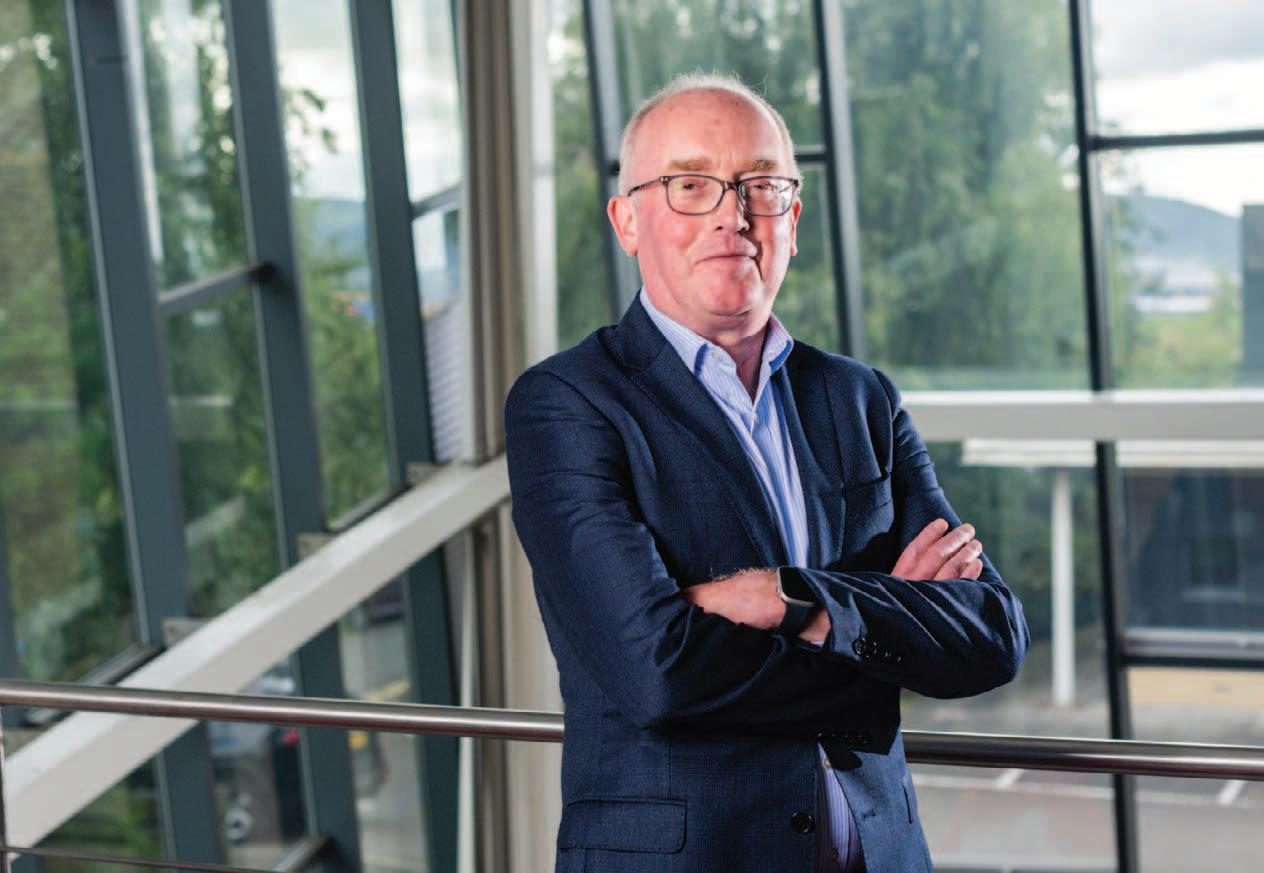
Speaking of the recent acquisition by Constellation, he says: “With Constellation’s support, we have the resources and expertise to accelerate innovation, break barriers, and make a lasting impact for our customers.”
The acquisition of ITS by Constellation marks a pivotal moment in the evolution of ITS enabling it to leverage enhanced resources, expertise, and partnerships, ensuring continued growth, innovation, and client satisfaction in the evolving digital landscape.
Following its acquisition by Constellation Software Group, ITS has the resources and expertise to accelerate innovation, break barriers, and make a lasting impact for customers.
Despite operating with a budget of more than £160 million in each of the last five years, research for the review into Invest NI, found that the organisation was having “little, if any bearing” on the crucial issue of productivity.

However, despite a number of serious criticisms of how the Department for the Economy’s sponsored arm’s length body operates, the review’s authors
conclude that Northern Ireland needs an economic development agency, that the agency should continue to be an arm’s length body, and that Invest NI has strengths to be built upon.
Last reviewed a decade ago by the Northern Ireland Audit Office (NIAO), transformational change recommended in the past has yet to be delivered, in the authors’ view.

An independent review into Northern Ireland’s economic development agency has described evidence that Invest NI is having an economic impact and providing true additionality as ‘limited’.
Amongst the key findings of the most recent review was that of a potentially “complacent” organisation, due to continued broad political support and a broadly positive reputation despite “unduly complicated” internal organisational structures.
Perhaps one of the most telling findings highlighting dysfunction in the organisation is the inability of the agency to detail the number of business support programmes it operated, due to sheer volume.
The independent review, first ordered by then Economy Minister Gordon Lyons MLA in January 2022, was carried out by a panel chaired by Michael Lyons, a former Chairman of the BBC.
As part of his assessment, Lyons outlines his belief that there is “considerable room for improvement in leadership, structure, operation, control, and public accountability” of the agency.
“Invest NI needs to be more outgoing and a better partner, especially in the context of subregional cooperation. It is a key part of the regional economic ecosystem and must be viewed as such. It can, once reformed and strongly led, make an important contribution to establishing a different trajectory for the Northern Ireland economy but only by working with the departments of the
Northern Ireland Executive and other stakeholders, including local councils, universities and colleges and, of course, the companies of Northern Ireland.”
The review acknowledges that Invest NI operates in a “unique economic entity”, emphasising that the limited monetary and fiscal powers highly restrict the ability of the region to drive economic growth and respond to economic and wider challenges.
It further emphasises that low productivity continues to be the “most deep-seated constraint on incomes and growth” adding that this position has been exacerbated by the 2007 financial crash and slow recovery when compared to the rest of the UK. Additional challenges include Brexit, political stalemate at Stormont, and the inflationary budget crisis.
Chief among the reports findings were failings in leadership, governance, and oversight. Identifying profound divisions at Board and senior leadership level in Invest NI, which it says are having a detrimental effect on the organisation, the report recommends the need for formal clarification and reinforcement of the roles and remit of the board, Chief Executive and Executive leadership team. Identifying a high level of ongoing or repeat, non-repayable support to a
4

“Considerable room for improvement in leadership, structure, operation, control, and public accountability.”
number of existing clients, the report suggests that Invest NI’s ‘client company model’ is “inflexible, the criteria are not widely understood by businesses, and it may lead to missed investment opportunities and/or ‘deadweight’”.

As well as recommending a strategic audit of all Invest NI programmes to take place on the back of a finding that the organisations portfolio of programmes is “too large and unwieldy”, even for the internal organisation to fully understand, the report says that Invest NI’s outward facing metrics are not demonstrative of the impact of its interventions.
Stressing that in some cases current metrics better reflect how clients perform rather than what difference financial assistance has made, the report says that the current emphasise of metrics unduly focuses on outputs, particularly job promotion rather than outcomes. It is recommended that metrics need widened to include higher productivity, job quality and innovation impacts.
Perhaps highlighting the significance of the need for a streamlining of programmes, the report authors looking at the green growth economic
opportunity state bluntly that “Invest NI had been slow to recognise the significance of the green economy and has been slow to respond to the development of new schemes to support the delivery of DfE’s Energy Strategy”.
Other key findings within the report include:
• an insufficient focus on the development of subregional economies;
• evidence of market failure in the provision of industrial land in a number of areas in Northern Ireland;
• a lack of clarity as to the organisation’s strategy on FDI and how it supports the 10X vision;
• no metric to demonstrate how the agency will increase the quality of new inward investment;
• the current organisational structure does not align with Invest NI’s strategic priorities and main function as a delivery body; and
• the absence of a strategic communications and engagement strategy that articulates the breadth of its activities or impact that these have.
Criticism is not solely reserved for Invest NI. In relation to the Department for the Economy’s governance role, the authors say that strategy, policy and guidance from the Department is unclear and not communicated to Invest NI in a manner that takes account of the business planning cycle.
Additionally, the report notes that the loss of EU funding has required Invest NI to consider significant budget reprioritisation. However, the extent to which DfE and DoF have resolved the immediate loss of ERDF funding “is also unclear”.
In response to the report’s 17 multifaceted recommendations, Invest NI says that it recognises the need to be more outgoing and better partner with the wider Northern Ireland public and private sector, adding its commitment to transformative change to be a more efficient, agile and outcomes focused organisation.
“We are determined to transform this organisation, building on its strengths and working in partnership with the Department and our stakeholders to build an ecosystem that delivers a growing economy that works for all.”
Accepting, in principle, all recommendations emanating from the review, the Department for the Economy said that it recognises that fundamental change is required to ensure Invest NI is strategically aligned with 10X policy objectives, and that the agency is operationally equipped to deliver outcomes and interventions to help transform the economy.

The Department has subsequently established a steering group made up of senior officials from the Department, Invest NI board members and the interim CEO to oversee and implement an action plan.
“The scale of the challenge is considerable, and it is therefore important that we take time to develop an Action Plan which will deliver the necessary change and ensure success. I anticipate that our Action Plan will be ready to announce in the autumn 2023.”

Wednesday
Host local authority
Antrim and Newtownabbey BOROUGH COUNCIL
An agendaNi event
The Northern Ireland Economic Conference, now in its 28th year, is Northern Ireland’s premier economic analysis event and is unique in being the only forum that takes a high-level look at the performance of, and prospects for the local economy. It is firmly established as the annual summit for Northern Ireland’s economic community, including policy makers and business leaders.
Speakers include:
Paul Grocott, Deputy Secretary, Economic Strategy Group, Department for the Economy

Chris Giles Economics Editor Financial Times

Helen Johnston, Senior Social Policy Analyst National Economic & Social Council


Gareth Hetherington, Director Ulster University Economic Policy Centre
Lisa Wilson, Senior Economist Nevin Economic Research Institute
David Jordan, Lecturer in Economics, Queen’s Management School and Research Associate The Productivity Institute
John Campbell, Economics and Business Editor BBC Northern Ireland
Janez Kren, Postdoctoral Research Fellow The Economic and Social Research Institute




a Growing the tourism sector
a Promoting innovation in the economy
a The economic opportunity of net zero carbon technologies
a Tackling economic inactivity
skills gaps in the local economy
There are still a small number of available sponsorship opportunities at this year’s conference. Sponsorship of the annual Northern Ireland Economic Conference is an excellent way for organisations to raise their profle with a key audience of economic decision-makers and senior business leaders. For further details or to discuss how your organisation can beneft from close association with Northern Ireland’s premier economic analysis event email Lynda.Millar@agendani.com
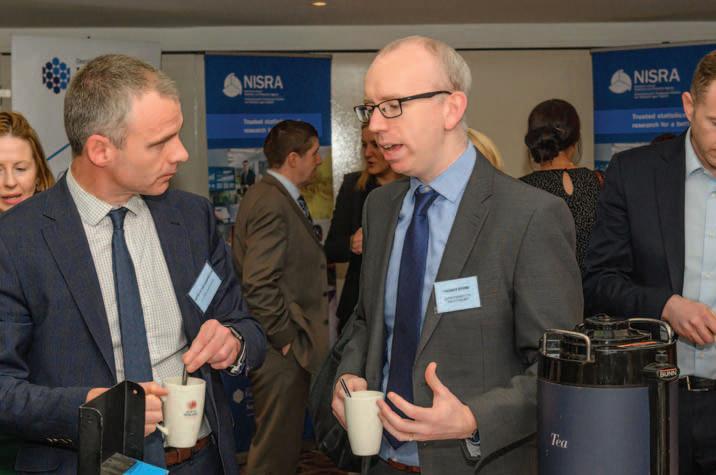









Secretary Mike Brennan talks to David Whelan about 10X prioritisation in a challenging budgetary climate.
In July 2023, the Department for the Economy published its 10X Delivery Plan 2023/2024, a first of its kind document, which sets out a core set of objectives that apply across the work of the entire department and its partner organisations.

While the document outlines ambitions for a ‘step-change’ in economic performance, there is also acknowledgement of the very difficult economic and political climate from which economic growth is expected to emerge.
In the absence of an Executive, responsibility for the delivery of the plan rests with the Department’s most senior civil servant, Mike Brennan, whose previous roles within the civil service include Public Spending Director in the Department of Finance and NICS Chief Economist.
That challenges facing Northern Ireland’s economy are not new, but in fact long-standing, dominates the context in which Brennan sets the discussion around future ambitions.
“The last six years have been increasingly challenging from an economic policy perspective,” he says, adding: “Seven years ago civil servants were confronted with the hugely complex and wide-ranging consequences of what Brexit meant and all of the analysis that was needed to accompany it. That was quickly followed by the Covid-19 pandemic and, subsequently, we now have a budget crisis. Overlay these challenges with the fact that we have had periods with and without strategic political direction, and the difficult climate for economic policy is evident.”

Brennan has also had to assume responsibility for the delivery of the Department’s 2023/24 budget allocation, which in essence means administering a wide variety of cuts, without political direction or accountability.
Describing delivery of a budget, which the Department’s calculations indicate represents a real spending power reduction of £130 million or 16 per cent, as “especially difficult”, Brennan acknowledges that the Department and its associated arm’s length bodies will all be impacted.
The Permanent Secretary registers his frustration that widespread cuts do not align with a vision for economic growth.
“The only way out of this budget crisis is to have an economy which is growing for the long-term, with stable funding for the public sector. If we want to grow the economy, then we must invest in it.”
Brennan is cognisant of how financial restraints on bodies such as Tourism NI, Invest NI, and NI Screen, which generate multiples of economic added value from their baseline funding, is a limitation on the economic growth potential of the region.
However, the Permanent Secretary believes the 10X “triple bottom line” of innovation, inclusive growth, and sustainability, presents an opportunity for prioritisation of investment in those areas with the potential to facilitate the greatest levels of economic growth.
Asked whether the financial settlement for the year ahead delivered by the Secretary of State is cause for a review of the 10X Economy vision, the Permanent Secretary says: “No, not in the near term because these early years will be about setting the basis for the delivery process. Perversely, there is something positive about the poor budget settlement in that it forces the Department to prioritise the delivery of 10X in our business plan and the business plan of our arm’s length bodies.
“What we are doing currently in the Department is assessing the extent to which each area we allocate budget to will positively impact on the 10X delivery plans. I believe years three and four are where we will need to see massive budgetary upscaling, particularly around the skills agenda.”
In March 2023, Brennan along with his Department of Finance counterpart, Permanent Secretary Neil Gibson, penned a letter to the UK Parliament’s Levelling Up Committee criticising how post-Brexit funds are being allocated in Northern Ireland and describing operation of the regional development plan as “highly sub optimal”.
Asked to elaborate on his concerns, Brennan says: “In the run up to Brexit, there was a
promise that EU funding would at the least be replicated. The reality is that this Department has suffered significant financial loss, particularly in relation to European Social Fund (ESF) funding. The ESF funding was relied upon by a wide range of organisations in the voluntary and community sector, which provide crucial interventions, but we have not seen anything from the levelling up agenda that comes anywhere close to replicating that funding.
“I think there is a lack of understanding around the value of these interventions provided. Interventions that, if not provided, have a long-term economic impact and generate significant longer-term costs for the justice, health, or housing systems, for example.”
Despite obvious challenges, Brennan says that there are positives to build upon. The endorsement of an energy strategy, The Path to Net Zero Energy, by the Executive prior to its collapse and the passing of climate change legislation, with legally binding targets, are both potentially economically transformational, if the right focus is applied.

The Department for the Economy recently published the Energy Action Plan for 2023, building on the overarching Energy Strategy published in late 2021.
“We are implementing the energy strategy as quickly as possible. There has been lots of positive progress, for example recent engagement with the US administration on developing a hydrogen economy and the

launch of a recent multimillion pound pilot project, GeoEnergy NI, exploring the potential for geothermal energy in Northern Ireland.
“However, while we are progressing the early framework, progress in these areas is future budget dependent, and we can move at a greater pace if the resources are available.”
As Brennan points out, in the 10X Delivery Plan, Northern Ireland’s economy remains a poor performer on several key measures. “We need a more productive and innovative economy, and this enhanced economic activity must be diffused throughout the region,” he states, calling for “dramatic change” on performance.

In relation to the transformative power of a net zero transition in energy, he says: “My concern is that some people are not able to join up the dots and recognise the value of a coherent energy strategy. Yes, there is great value in reducing costs to consumers and increasing security of supply through the generation of our own indigenous green energy, but there are broader advantages to go beyond this, including the generation of expertise in emerging industrial sectors.
“At the minute, we have a competitive edge in some key areas but if we do not hurry up, we will lose that and allow others to exploit it.”
Brennan’s assertion that Northern Ireland could be left behind in the competition with other regions is particularly pertinent when it comes to skills, an area which has been
identified by the Department as a policy priority.
Skills for a 10X Economy, Northern Ireland’s skills strategy, was published in March 2022 and Brennan explains that future focus must also be on prioritisation of key sectors and on younger people.

“The skills agenda is one that we must walk our way through carefully because, as a department, we have such a wide range of interventions across all levels of educational attainment. In the current budget environment we are having to instil a sense of prioritisation as to where our preferences lie.
“Our headline labour stats show an unemployment rate of 2.5 per cent and a trend of growing employment, but these positive figures are somewhat superficial. We have a large productivity problem, sitting almost 20 percentage points lower than the UK average, which is itself a laggard in comparative international terms. We also have over 200,000 people of working age who classify themselves as economically inactive, so there are fundamental policy problems.
“That is why our sense of prioritisation tends to be at lower-level qualification interventions and, in particular, trying to get young people active in the labour market. Work around apprenticeships, assured skills academies, and the work of further education colleges will really go to the heart of where we want to get to.
“If we look to the future, particularly a net zero economy, there is a raft of skills needed that we simply do not have. However, this is an opportunity to bring those economically
inactive people back into the labour market.”
Discussing whether Northern Ireland’s economy is capable of retaining and attracting the levels of talent needed to deliver a net zero economy, Brennan says: “If we get all of the pieces right in the form of an efficient economy, good health and education sectors, and good physical infrastructure, then this region can be an attractive place to live. I would add that we have identified a series of clusters where there are massive opportunities for job creation in high value-added sectors. These jobs are well paying jobs regardless of whether they are in health and life sciences, advanced manufacturing, or screen growth. They are attractive, but we need to invest in skills at the very start.”
In January 2023, an independent review of Invest NI, Northern Ireland’s economic development agency, commissioned by the previous Minister for the Economy, concluded that the agency needs profound change, which requires “reform and repurposing”. In addition, the review, focusing on the relationship between Invest NI and the Department, underlined the need for “a stronger relationship built on clear, public, performance targets, stronger joint working, more precise communications, along with tighter post hoc scrutiny”.

Commenting on the recommendations, Brennan says: “The review highlighted a number of dysfunctionalities within Invest NI, and in its relationship with the Department. We are now moving at pace to address those.
“Working with Invest NI, we have established a number of task-and-finish working groups, which the Invest NI board have been proactive in pushing forward. We are also on track to
have a series of action plans ready to announce in the autumn.”
Brennan concedes to being “unsurprised” by the review’s findings. Questioning the sustainability of operating over 100 support programmes in the current economic climate, the Permanent Secretary points to an opportunity to apply the 10X prioritisation lens to programme delivery.
“We believe Invest NI is going to be critical to our future economic growth, particularly in relation to actions within the energy strategy and rolling out projects within the City Deals. We as a Department are not skilled up and resourced to do all of that, however, there is a huge wealth of expertise within Invest NI that will be utilised.
“The fact that the Invest NI board is on the same page as the Department in relation to 10X delivery means it is a perfect marriage and perfect timing.”
Concluding, Brennan acknowledges that the Department, as well as beginning a prioritisation process around 10X, also has work to do promoting the concept of the delivery plan to business organisations and social partners.
For the year ahead, Brennan describes the existence of what he terms a “governance gap” around the current powers of Permanent Secretaries, and calls for greater clarity from the Secretary of State around existing powers to improve corporate governance across the public sector.
“In the longer term, we are not far from the autumn, which is when budget considerations would normally begin for 2024/25. Getting clarity as quickly as possible around the level of resources available, and not well into the next financial year, would help with planning for future investment.”
“At the minute, we have a competitive edge in some key areas but if we do not hurry up, we will lose that and allow others to exploit it.”
This knowledge has inspired the development of decentralised energy solutions including the likes of EV infrastructure, flexible generation, storage, heat, and electrical networks, which Sanders explains are “integral to the development of local energy systems which harness innovative renewable energy solutions including onsite behind the meter solar and battery, waste to energy technology, as well as clean traceable power from our large onshore and offshore projects”.
Explaining the concept further, he says: “If you try to decarbonise one element of your business, you will not effectively meet your needs to fully decarbonise. Whole-system thinking is the sum of all the individual parts of a journey to net zero for organisations and our clients. Our whole-system approach means we support in investment, build, and control of localised flexible energy assets, looking across energy, heat, and transport use.”
Two major elements of SSE’s decarbonisation approach are a decentralised energy landscape and greater levels of public-private collaboration.
head on, UK-listed energy infrastructure company SSE is behind some of the most innovative decentralised energy projects across the UK and Ireland.


Sanders believes that Northern Ireland represents a prime location for SSE’s whole systems thinking to help rapidly accelerate the ambition of a decarbonised region.
With a planned investment in the UK and Ireland of £18 billion by 2027, representing spend of almost £10 million a day on average in clean energy, to deliver its Net Zero Acceleration Programme to address climate change
Positioning SSE Energy Solutions as one of the only providers that take a wholesystem thinking approach to decarbonising energy, heat, and transport, delivering solutions for cities and regions, the Managing Director emphasises the organisation’s reach into all aspects of renewable energy ranging from generation to transmission, through to distribution, heat, and transport.
On a future energy system that is transitioning away from a centralised top-down approach to a more local, distributed system, Sanders says: “Our whole-system approach helps communities accelerate their transition to net zero by creating a more resilient and sustainable energy system by investing in, building and connecting localised flexible infrastructure, using technology and data analytics to drive the long-term performance of energy assets.”
On collaboration, the Managing Director envisages a transition in the way public and private sector organisations are working together to tackle the big-ticket climate issues. “Collaboration is key to delivering decarbonisation, ensuring that we are working with large energy users, with end users in the supply chain, and

Nathan Sanders, Managing Director of Distributed Energy at SSE Energy Solutions, discusses how the organisation’s whole system approach can aid Northern Ireland’s decarbonisation journey.
with competitors. We recognise that a siloed mentality will only help deliver one solution. So, for example, delivery of a heat network, without a suitable source of heat take-off, is not joining the system together. Instead, what we need is all partners working collaboratively with the interest of the wider region to explore where decarbonisation can provide a more effective solution.”
The SSE group already has a strong presence in Northern Ireland where its renewables business SSE Renewables owns and operates 117MW of onshore wind capacity across four generation sites. In Ireland, SSE Renewables owns and operates 692MW across 26 operational onshore wind farms including the country’s largest wind farm, the 174MW Galway Wind Park in Conamara, County Galway.

As one of the largest providers of renewable energy in the all-island Single Electricity Market, retail energy supplier SSE Airtricity provides greener electricity, natural gas, and essential services to over 300,000 homes and businesses across Northern Ireland.
Alongside the development of onshore (including wind, solar and battery) and offshore projects by SSE Renewables, a myriad of other solutions are also being delivered by SSE businesses including decarbonised solutions to domestic premises and SMEs, including solar.
Sanders explains that his division of SSE, SSE Energy Solutions, is aiming to bring decentralised energy projects, similar to those already being delivered in Great Britain, to Ireland.
Examples provided by the Managing Director include Royal Woolwich Arsenal in London where “we are retrofitting low carbon heating to our existing heat network, enabling the site’s expansion and helping to save 2,000 tonnes of carbon each year”.

Similarly, for Medway Council, Kent, SSE is partnering to deliver solutions that will see a 20 per cent reduction in carbon emissions and a 35 per cent cost saving across 11 major public buildings.

SSE has also completed the installation of a 3MW solar panel system on the rooftops of Sky Studios Elstree which will supply at least 40 per cent of the site’s annual energy consumption over
the year, with early data suggesting it is likely to be even more.
Following the launch of a 10-bay rapid EV charging hub at Gapton Hall Retail Park in Great Yarmouth, SSE is working with M7 Real Estate (M7) to deliver a further 50 charging stations.
Underpinning Sanders’ belief that those decarbonised solutions being deployed in Great Britain can be delivered in Northern Ireland is a plan by SSE Energy Solutions to build at least 30 ultra-rapid charging hubs on the island of Ireland over the next four years, the first of which will be a 10-bay ultra-rapid charging facility at Lough Sheever Corporate Park in Mullingar, Westmeath.
Quizzed on the opportunities that exist for Northern Ireland, Sanders says: “When it comes to distributed energy,
the opportunity I see for someone like SSE in Northern Ireland is to ‘market make’. In building a backbone of heat, transport, and energy decarbonisation, SSE is willing to do the hard yards and put risk capital at work, where we can identify solutions that will take people on a journey of decarbonisation.
“However, to do so, we have to partner with those key energy stakeholders, to ensure we incorporate that wholesystem thinking. We want to showcase our experience and become that trusted partner, working with the commerical, industrial and public sectors to deliver collective solutions together.”
“Whole-system thinking is the sum of all the individual parts of a journey to net zero for organisations and our clients.”
In February 2023, SSE Energy Solutions hosted a round table discussion with agendaNi, which brought together key stakeholders from across Northern Ireland’s energy sector to identify potential partnerships and pathways on the journey towards net zero decarbonisation.
Sanders explains that the vested interest in decarbonising the city of Belfast and the region as a whole, exhibited by all involved, was welcome.
Sanders believes that uptake in the drive to decarbonise in Northern Ireland cannot be attributed to recent energy price hikes alone.
“I think the recognisable drive to decarbonise is more complex than price alone. Undoubtedly, price fluctuations in the past two years have motivated the need for stable prices through indigenous renewable energy.
“However, the majority of users and the commercial world understand there is a need to decarbonise, because consumers are demanding it. There has been a mentality shift among the populace, and as a result, pressure is being applied to commercial outfits to ensure they are taking action to achieve net zero. The need and the want exist, but often the barrier comes when identifying the how, and that is where
SSE Energy Solutions can help by being that trusted partner and bringing stakeholders together.”
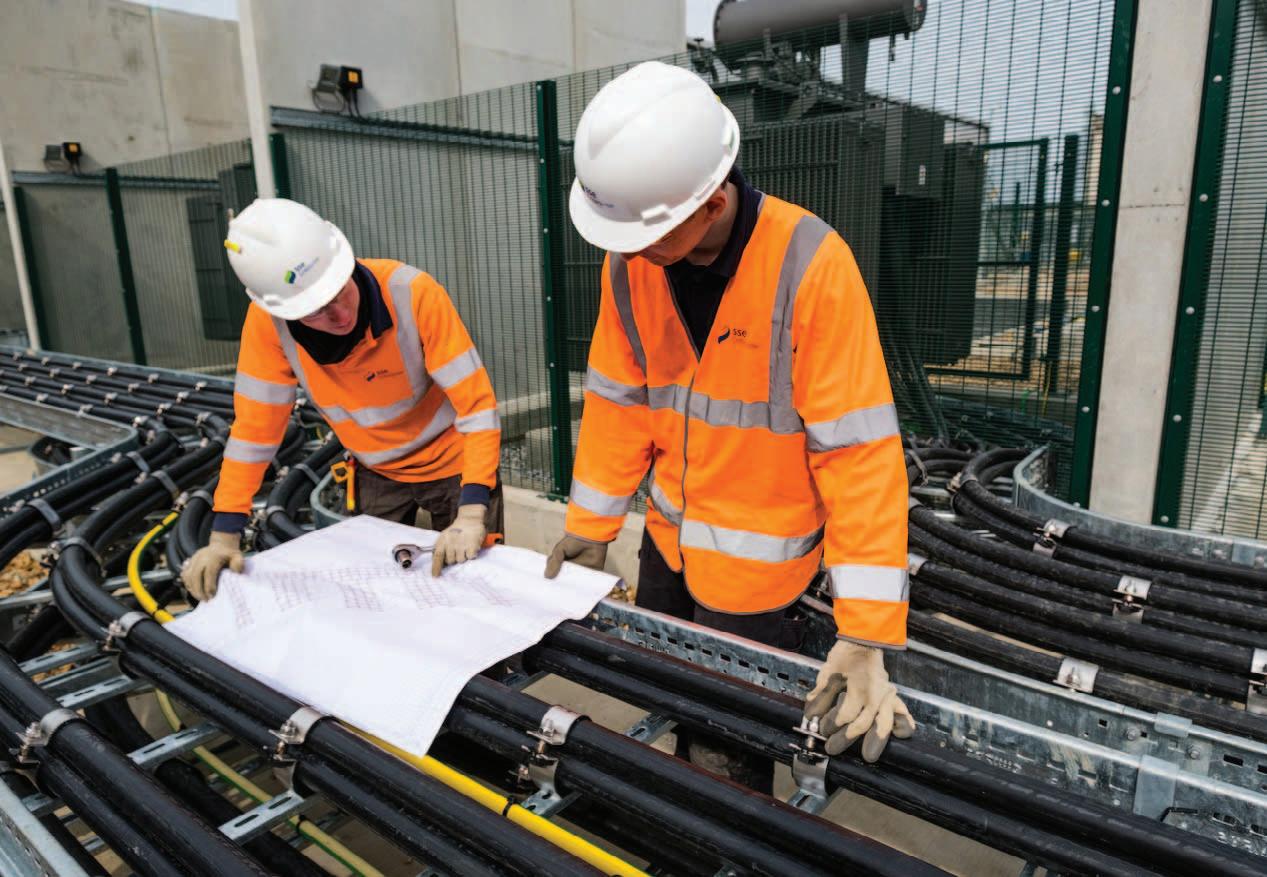
Sanders points to the publication of a Net-Zero Carbon Roadmap for Belfast and the ambition of Belfast Harbour to be a “truly sustainable, clean, Green Port”, as prime examples of how SSE’s success in other parts of the UK, such as delivery of a green port at the Port of Dover, can see it act as a trusted partner in delivering decarbonisation solutions for Northern Ireland.
“By investing in whole energy solutions for cities and regions, SSE can act as a trusted advisor to local government on their decarbonisation journeys, ensuring vital progress is made towards net zero and delivery of local climate change plans.”
Sanders is quick to point out that the benefits of a decentralised approach to decarbonisation go beyond a reduction of
carbon emissions. As part of SSE’s Net Zero Acceleration Programme, which will see an investment of up to £40 billion by 2032 in low carbon technologies, SSE is building career pathways to support the ongoing development of highly skilled jobs, with investment helping to regenerate communities and support reindustrialisation.
“By providing communities the solutions needed to decarbonise heat, energy, and transport, the opportunity also exists to provide greater opportunities to those communities. SSE prides itself on ensuring that through our investments we are increasing the skills within those communities, providing training and employment, while also aiming to improve outcomes in those areas of greatest disadvantage,” he states.
Concluding on the existing barriers to decarbonisation in Northern Ireland, Sanders says that “speed to change” is the greatest factor. “Businesses have knowledge and aspirations of the direction they need to travel, but lack of clear policy and regulation can hinder the speed at which companies get moving. By engaging with us, companies can move at pace, utilising our expertise on their journey to net zero.
“There is a danger that if organisations of any size continue to work too independently in silos, holding things in and not sharing, that we will not deliver net zero. It always impresses me how collaboration unlocks the speed at which we can travel on our journey to net zero. It is clear to me that collaboration will unlock the speed of the journey to net zero. That willingness to share can shape the future,” he concludes.
W: www.sseenergysolutions.co.uk
Nathan Sanders is the Managing Director of Distributed Energy for SSE Energy Solutions, having worked for SSE for almost 40 years. Having begun his career as an apprentice electrician for Southern Electric, Sanders has held various management positions. Prior to his current role, Sanders was Managing Director of Utilities in SSE’s Enterprise division.

North/south goods trade has grown “substantially” since Brexit, a report by the Economic and Social Research Institute (ESRI) has found, with the Republic now accounting for over half of Northern Ireland’s exports.
The substantial growth in the crossborder goods trade has seen the Republic of Ireland record €160.3 billion in goods exports and €99.8 billion in goods imports in 2021, while Northern Ireland recorded totals of €10.5 billion in goods exports and €7.6 billion in goods imports, with this figure not including imports from and exports to Britain, which is not classified as international trade.
Most notable within the findings is the reassertion of the importance of crossborder trade to both economies, especially that of Northern Ireland, in the wake of Brexit. In terms of total trade, the Republic accounted for 11.93 per cent of northern imports and 28.58 per cent of exports, making it the second most popular location as both a destination and origin of trade behind only Great Britain (65.49 per cent of imports and 46.38 per cent of exports).
When trade with Britain is excluded, the Republic accounted for 53 per cent (€5.6 billion) of Northern Ireland’s goods exports, and 35 per cent (€2.6 billion) of its goods imports, making it
Northern Ireland’s largest trading partner classified as international trade.
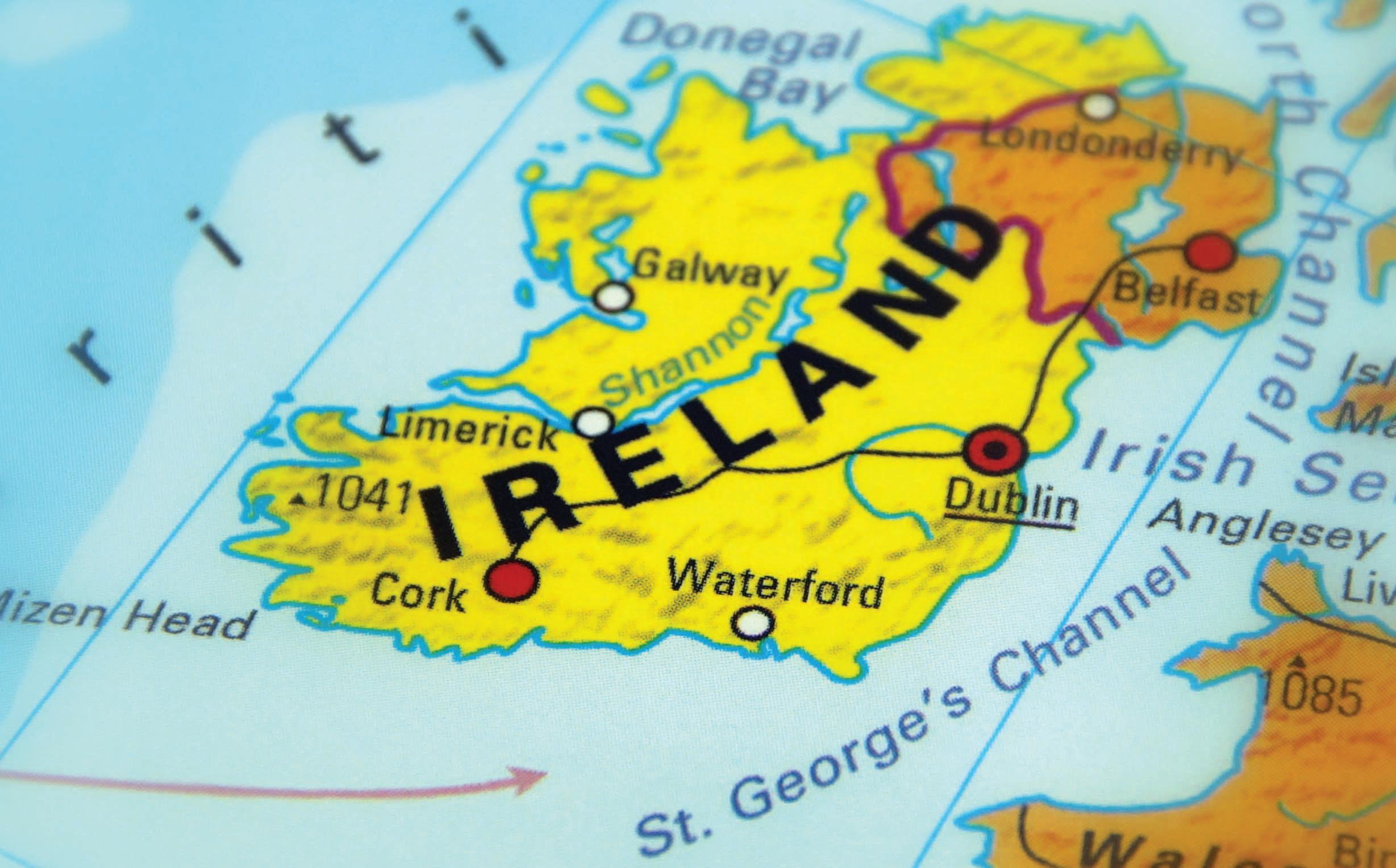
The “most striking difference” between the Republic and Northern Ireland, “and indeed to the rest of the EU” is the dominance of the US as both an import and export partner for the Republic.
The US accounts for 31 per cent of exports and 17.01 per cent of imports the Republic, with Britain second accounting for 14.15 per cent of imports and 8.84 per cent of exports, shares that “have reduced considerably in the aftermath of Brexit relative to the historic patterns of trade between the two countries”.
Having increased its share of the Republic’s imports from 1.5 per cent to 5 per cent in the first six months following Brexit, Northern Ireland accounts for 4.71 per cent of southern imports and 2.29 per cent of exports, “sizeable shares given the much smaller size of the Northern Ireland economy relative to the other top 10 partner countries”.
At the sectoral level, both states show a
reliance on the chemicals and pharmaceuticals sector, which accounts for 55.7 per cent of the Republic’s exports and 20.2 per cent of its imports, the second largest import sector just behind machinery and electrical (20.7 per cent). Chemicals and pharmaceuticals are also the largest export sector in Northern Ireland, accounting for 23.4 per cent, and the largest import sector, accounting for 11.8 per cent. These figures are not in keeping with either the UK or the rest of the EU: in the UK, chemicals and pharmaceuticals account for 6 per cent of imports and 9.1 per cent of exports; in the EU, they account for 9 per cent and 9.6 per cent.
With both economies firmly aimed at the development of export-heavy industries, the ESRI says that crossborder trade can “play a role as an accessible first step into broader exporting and, hence, a greater degree of information on these flows and on how they compare to trade with other markets may help in the development of such policies”.

‘Substantial’ north/south goods trade growth since Brexit
As Northern Ireland’s economy jostles its way out the other side of the Covid-pandemic shock, short-term growth is occurring in the long-term context of a slow return to pre-pandemic economic output, constrained by evident structural problems.
On the face of it, Northern Ireland’s economy is doing well, but the post-Protocol boost is masking long-term structural problems.
Figures for the beginning of 2023 show an annual growth rate of almost 2 per cent. In the first quarter of 2023, an output increase of 1.7 per cent for Northern Ireland compares favorably to growth of just 0.1 per cent for the UK and a decrease of 4.6 per cent for the Republic of Ireland.
However, such figures fail to accurately depict the extent of the long-term structural problems which have seen little to no significant progress on long-standing plans to transform the region’s economy.
Take for example the Republic of Ireland’s 0.3 per cent decline in GDP over the year compared to Northern Ireland’s 1.7 per cent increase. What these figures fail to depict is that the Republic of Ireland’s GDP is 27.4 per cent above pre-pandemic levels, compared to just 6.3 per cent in Northern Ireland.
Emerging from a technical recession in the second and third quarter of 2022, the NI Composite Economic Index (NICEI) shows that Northern Ireland’s economy has grown significantly faster than the UK economy in the early months of 2023, however, of note is the fact that Q1 2023 is the first time Northern Ireland’s economy has returned to, and risen above, the pre-financial crash high of Q3 2007.

By comparison, UK GDP in the first quarter of 2023 is estimated to be 14.6 per cent higher than its pre-economic downturn peak in quarter one of 2008.

Source: NISRA
Source: NISRA
One of the central planks of Northern Ireland’s poor economic performance in recent decades has been around productivity. The Northern Ireland Productivity Dashboard 2022 recently assessed a productivity gap of some 17 per cent between Northern Ireland and the UK average, placing Northern Ireland as the poorest performing UK region for productivity.
Of note is the fact that the UK itself is a productivity laggard when compared to major G7 economies such as France, Germany, and the US.
At the same time, research delivered by the ESRI estimates that since 2000, when productivity on the island of Ireland was largely similar, a productivity gap of almost 40 per cent has emerged – even after the exclusion of economic sectors with high concentrations of multinational companies which are recognised as having a distortionary impact.
Productivity is a recognised key driver of higher wages and living standards, and Northern Ireland’s long-standing challenge cannot be attributed to one problem alone. Multiple reasons offered include the evolution of the economy away from heavy industry to one with a high concentration of low productivity industries.

For example, one in five (23 per cent) private sector jobs in Northern Ireland are now in the ‘wholesale and retail trade; repair of motor vehicles’ industry.
The make-up of Northern Ireland’s private sector is also unique in that it is highly concentrated with smaller businesses than many of its neighbouring counterparts. Northern Ireland accounted for just 2.2 per cent of all UK businesses in 2020.
Just over one in 10 private sector businesses generated a turnover of £1 million or more and 90 per cent of private sector businesses have fewer than 10 employees. Northern Ireland also has one of the lowest shares of high-growth businesses at 3.8 per cent of the UK total, or just 285 businesses.
Recent analysis by the Ulster University Economic Policy Centre (UUEPC) points out that Northern Ireland has the lowest business birth and death rates,

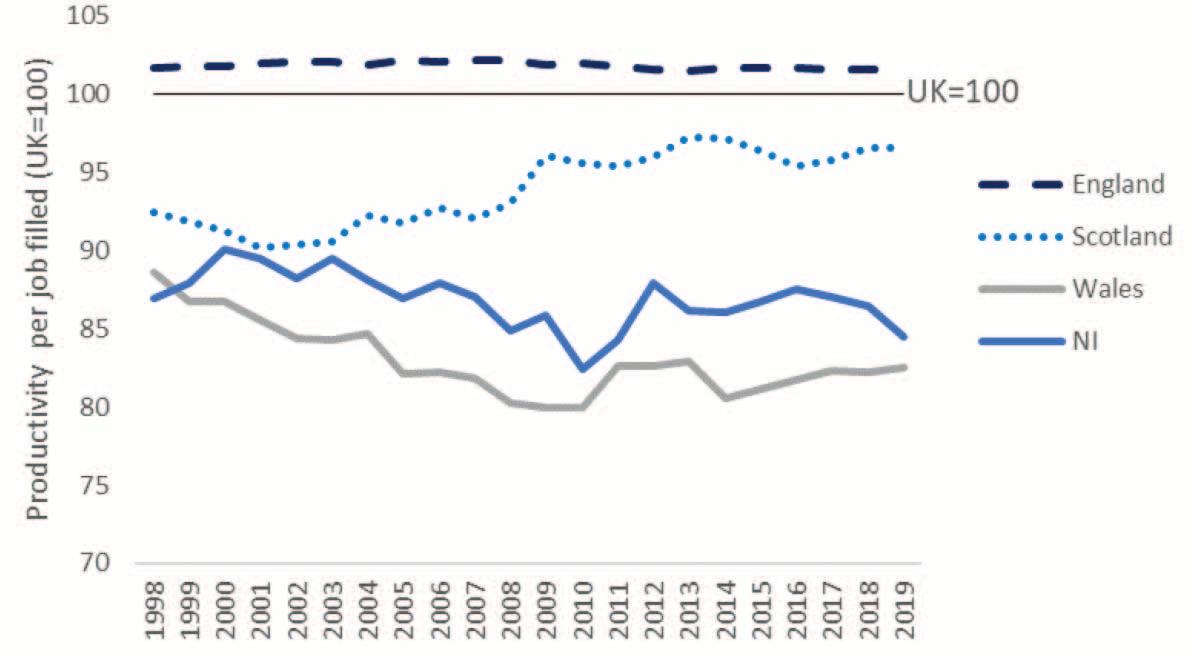
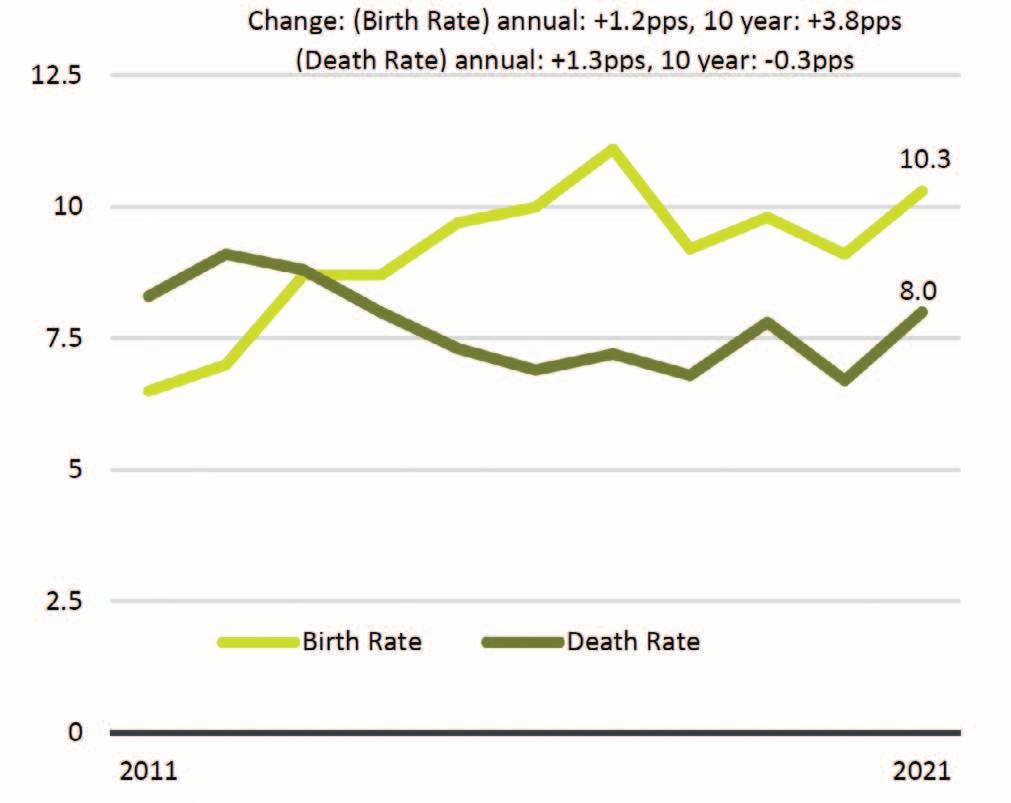
meaning that the business churn rate (birth rate plus death rate) at 18 per cent (2021) is the lowest in the UK.
“This low business churn rate indicates a less dynamic economy and potentially contributes to Northern Ireland’s lower level of productivity,” it highlights.
Another major pillar of productivity is expenditure in research and development, a key indicator of
Source: NISRA
Source: NISRA
innovation. Although Northern Ireland’s R&D spending had increased to £880.2 million in real terms in 2021 (up from £718.3 million in 2018), only around two in five businesses in Northern Ireland are classed as ‘innovation active’. Northern Ireland has held the position of having the lowest amount of innovation active businesses across the UK regions for the past decade.
Source: ONS 4

Since 2012, Northern Ireland’s unemployment rate has declined significantly and sits at 2.2 per cent. The furlough scheme introduced during the pandemic was highly successful in maintaining the connection between employee and employer, meaning that the number of working age adults in a job (72 per cent) in Q1 of 2023 is close to the pre-pandemic peak of 72.4 per cent.

An important productivity metric to measure is not just the levels of employment, but also the quality of the jobs being performed. Northern Ireland had the third highest proportion of lowpaid jobs of all regions in the UK in 2022, despite recording a domestic record low for the proportion of lowpaid jobs (13 per cent).
Historically, Northern Ireland has one of the lowest average wages of any UK region. In 2022, median gross weekly earnings for full-time employees in Northern Ireland increased by 2.9 per cent over the year. Northern Ireland’s earnings in 2022 were 11 per cent higher than the pre-pandemic position, meaning it had the highest increase of all UK regions.
However, while the gap between average wages in Northern Ireland and the UK appears to be narrowing, Northern Ireland’s median wage of £575 per week is lower than the UK average of £610. Northern Ireland also has the
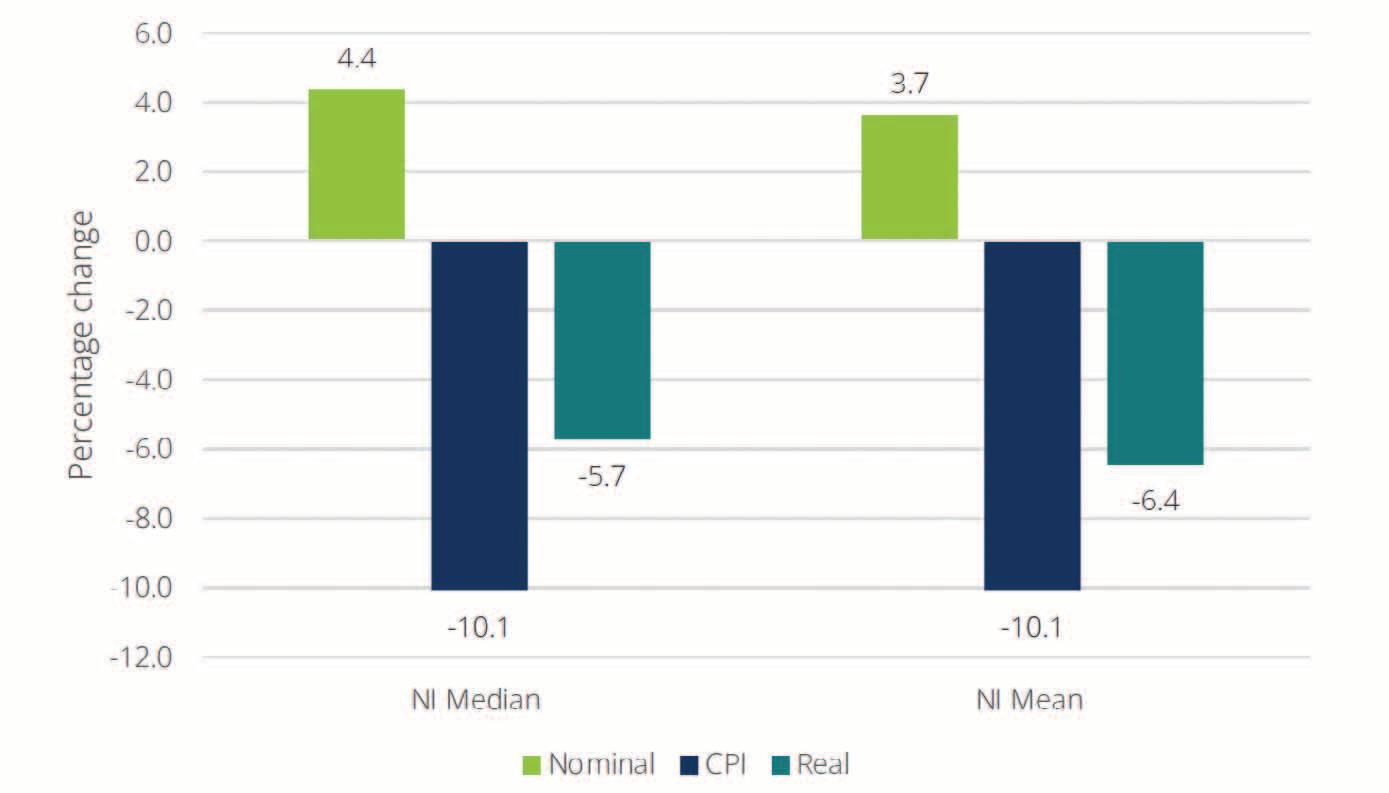
highest share of employee jobs across all regions of the UK with earnings below the real living wage.
The impact of inflation means that despite increases in median gross weekly earnings, real weekly earnings in Northern Ireland recorded the largest annual decrease on record (4.5 per cent) in 2022.

Beyond wages and job quality, Northern Ireland also has a recognised challenge in that it boasts the highest economic inactivity rate of any of the UK regions. The rate is based on those between the ages of 16 to 64 who are not active in the labour market. Northern Ireland’s 26.2 per cent rate is well above the UK average of 21.1 per cent. According to long-term data gathered by NISRA, while high economic inactivity is a long-standing issue, the underlying reason for this high figure has changed with a reduction in the proportion of those inactive due to family and home care reasons, but with long-term sickness now the largest contributor to inactivity.

In parallel with high levels of economic inactivity, Northern Ireland’s economy suffers from a ‘brain drain’ of its highest educated talent. The 2021 UUEPC skills barometer predicted an undersupply of 5,130 jobs annually over the next decade of National Qualifications Framework (NQF) levels 3 and above. This expected skills shortage of the future is underpinned by two main features. Firstly, Northern Ireland’s education disparity, highlighted by the fact that, in 2021, 44 per cent of students were educated to level 4 or above, yet Northern Ireland still has the highest proportion of individuals with low or no qualifications across the UK regions. In 2021, 12 per cent of working age adults in Northern Ireland had no qualifications, double the rate of the UK average. Similarly, Northern Ireland’s lifelong learning rate (18 per cent) has remained persistently lower than the UK average (25 per cent).
In terms of talent retention, 77 per cent of graduates in Northern Ireland in 2020/21 stayed in the region to study compared to 96 per cent for England and 94 per cent for Scotland. The region has the smallest inflow of students from the rest of the UK than any other region and has a low share of foreign students.
Recent budget announcements for Northern Ireland indicate a scaling back of spending on public services, which will have a knock-on effect on the private sector, and ultimately limit future expansion of the local economy. Many economists forecast that Northern Ireland will avoid a recession in 2023, with growth estimates ranging from between 0.1 to 0.3 per cent, providing there are no significant economic shocks.

From a broader perspective, recovery of Northern Ireland’s economy has just about returned to pre- financial crisis levels, essentially meaning an extension of what some economists branded the ‘lost decade’. The long-term structural problems that hinder economic growth in Northern Ireland are clearly identifiable, however, policy interventions have failed to make significant impact.
A beacon of hope for the Northern Ireland economy is the opportunity presented by the region’s size and geography within the global push towards decarbonisation. In the recent past, Northern Ireland was hailed as a leader in renewable energy, however, progress has stagnated, again related to the absence of concrete policy and decision-making. An opportunity for economic transformation exists if the region can act as a front-runner of the energy transition, however, current political appetite to seize such an opportunity appears absent.

Hall, McClay, and Biosciences buildings, and domestic applications in operation today, geothermal is very much an underutilised source of energy locally. Through this project, we aim to prove the potential for geothermal energy within Northern Ireland, allowing us to further explore the possibilities of harnessing this renewable energy source and, in turn, encourage future private sector investment in this important technology across the region. Geothermal energy brings with it a host of economic, environmental, and social benefits. Through GeoEnergy NI, we can help inform the development of policy and regulatory frameworks that support and promote a vibrant geothermal sector. With that comes the potential for high-value jobs and skills created through direct employment and spin-off industries. In Germany for example, where there is a growing geothermal industry, the sector has created around 22,000 jobs and provided an economic stimulus of €13.3 billion since 2000 (BMWi data). Geothermal can also significantly contribute to net zero goals by potentially delivering savings of between 2,400 to 14,000 tonnes of equivalent CO2 emissions per year (DSNZ white paper, July 2023).
The GeoEnergy NI project, involving a specialist contractor team led by Tetra Tech Europe, will conduct shallow and deep geothermal feasibility studies in two Northern Ireland locations – the Stormont Estate in Belfast and the College of Agriculture, Food and Rural Enterprise (CAFRE) Greenmount Campus near Antrim. Designed to ‘unearth the heat beneath our feet’, GeoEnergy NI is a strategic and exciting part of the DfE’s Energy Strategy Action Plan 2022, recognising the importance
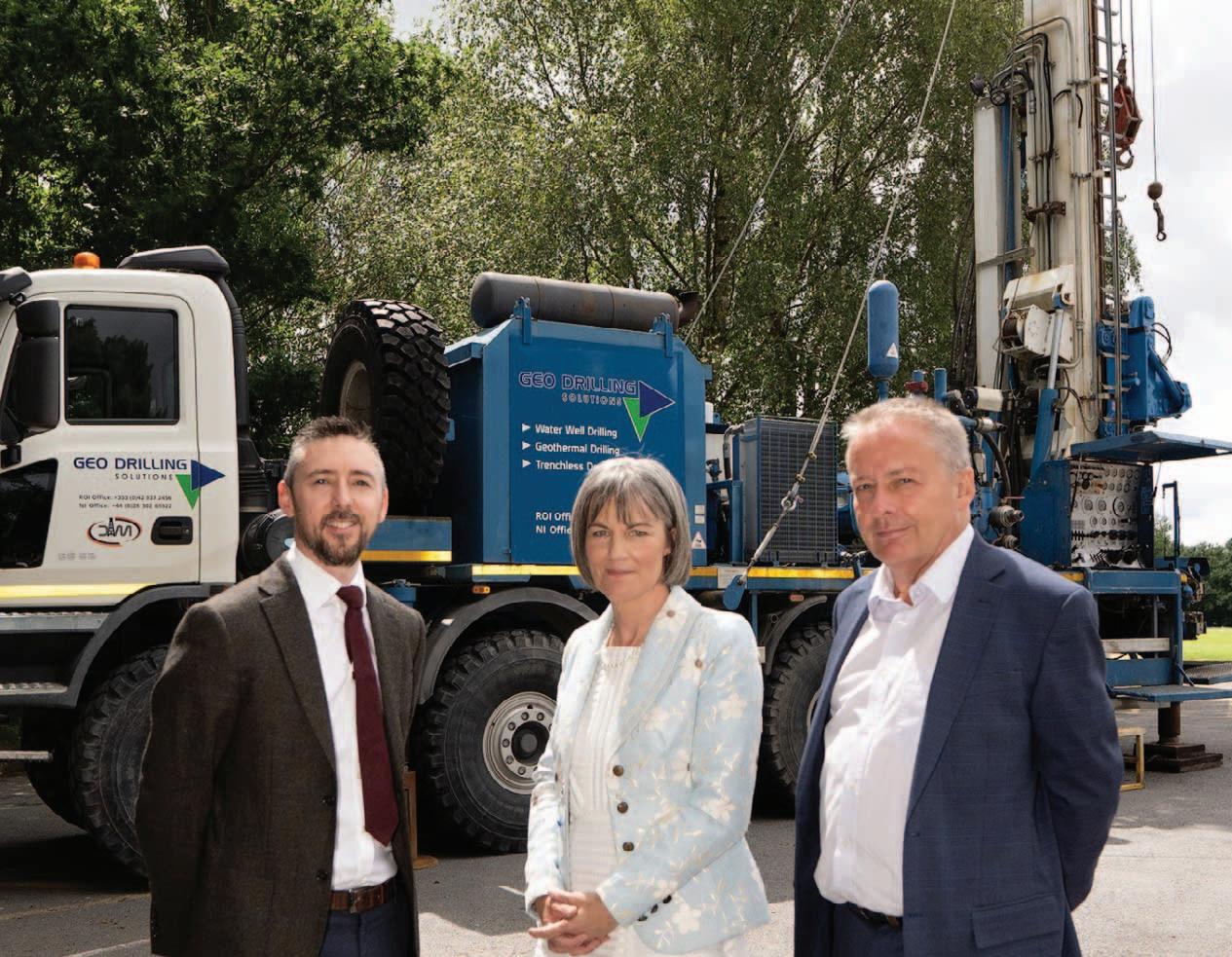
of having a secure, affordable, and low carbon energy source now and into the future, and a key element of the Path to Net Zero Energy strategy.
In Northern Ireland, we are fortunate to have such diverse geology, with significant untapped potential for geothermal energy. While there are a small number of innovative nondomestic installations such as the Queen’s University Belfast (QUB) Riddel
Having officially launched in June 2023, we are proud to report that the GeoEnergy NI project has progressed at pace and has already reached a significant number of key milestones.
A project website – GeoEnergyNI.org –has been established, packed full of useful information on geothermal energy, its benefits and project news. Those interested can also keep up to date through our Facebook, X, and LinkedIn social media channels.
Together with partners and private and public sector organisations, we created a series of videos and an animation to
This summer, the Department for the Economy (DfE), with scientific support from our team at the Geological Survey of Northern Ireland (GSNI), launched a multimillion-pound project to explore the potential for geothermal energy in Northern Ireland.
help demystify and explain geothermal energy, showcasing some places where it is already being utilised in Northern Ireland. We are grateful to the teams at Girdwood Community Hub, the Giant’s Causeway, and QUB Business School for explaining their geothermal energy building projects and bringing its benefits to life.
July 2023 was an exciting time for the project as we completed exploratory geophysical surveys around CAFRE. Working together with our subcontractor GeoPartner, we were on location for under two weeks and, in that time, we successfully completed a wide range of gravity, magnetotelluric, and seismic surveys to explore the potential for deep geothermal energy within County Antrim. We are incredibly grateful to local residents and landowners for their support, and to CAFRE for facilitating this survey activity and helping its smooth delivery.
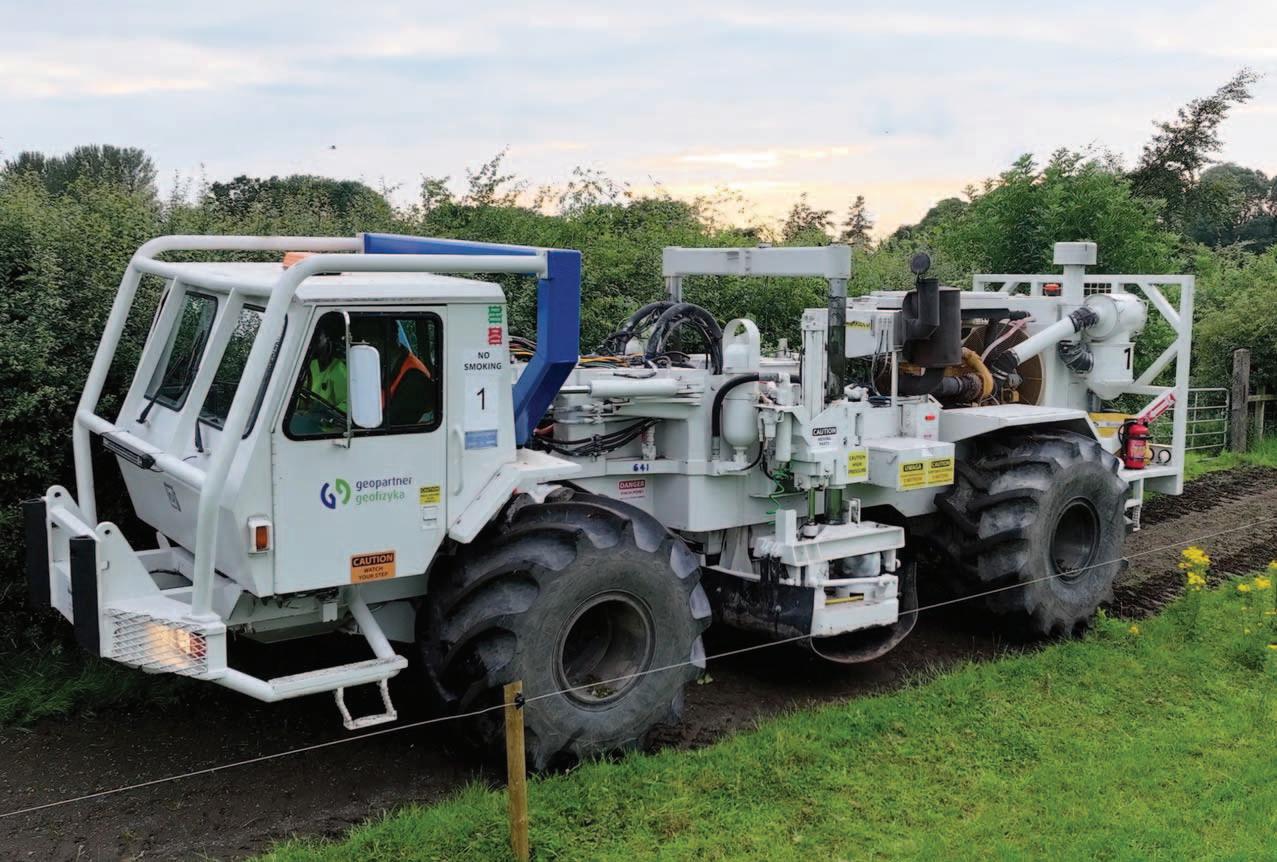
We will now move to the data processing and interpretation stage of this work, using the data collected to develop a 3D geological model of the underground geology to a depth of approximately 2 kilometres, providing us with valuable insight into the type of geology around County Antrim. This can then be used to assess the geothermal heat potential at the Greenmount Campus and provide information on the suitability for future low-carbon sustainable heat in the wider Antrim area, enabling the possibility of a geothermally powered district heating network.
Of course, this is only one part of the GeoEnergy NI project, and we will also be investigating potential drill sites on the Stormont Estate, Belfast. This aspect of the project aims to identify the most suitable geothermal solution to provide future heating and cooling for several pre-identified buildings on the Estate. Five locations for shallow boreholes have been identified within the Stormont Estate and it is hoped one borehole location will be accessible for public viewing for those who wish to learn more about geothermal energy.
Through GeoEnergy NI, we want to showcase geothermal energy to help increase public awareness and support, as well as encourage future investment opportunities. As part of this outreach, we will be opening a mobile visitor centre in the coming months, fully equipped with a range of educational resources including virtual reality headsets to help explain the geothermal energy. Initially, it will be situated on the Stormont Estate, and we plan to visit schools and locations across Northern Ireland in the months ahead. It is important to us to engage with local communities as well as our next generation of scientists and leaders who are critical on our journey towards netzero and beyond.
By unearthing the geothermal resources beneath our feet, GeoEnergy NI will help pave the way for a more sustainable energy future – a future powered by the planet itself. As we continue to gather data, results and roll out the project, we will fine-tune our understanding of the availability of geothermal energy and better utilise this locally available, cost-effective, renewable, and low-carbon resource for the benefit of all.
To find out more about geothermal energy and to keep up to date with the GeoEnergy NI project visit www.GeoEnergyNI.org
 A distinctive truck-based seismic vibrator, known as vibroseis, helped complete geophysical survey activity around the College of Agriculture, Food and Rural Enterprise (CAFRE) Greenmount Campus near Antrim as part of the GeoEnergy NI project.
A distinctive truck-based seismic vibrator, known as vibroseis, helped complete geophysical survey activity around the College of Agriculture, Food and Rural Enterprise (CAFRE) Greenmount Campus near Antrim as part of the GeoEnergy NI project.
Published in July 2023, in the absence of a minister, the 10X Delivery Plan 2023/24 is framed as a work schedule for the year ahead for the Department and partner organisations in what Permanent Secretary Mike Brennan describes as “administrative difficulties”.
Outlined as a “new way of business planning” for the Department, the delivery plan states the desire to bring greater transparency to policy delivery and the decision-making process in the absence of an Executive and Assembly.
In May 2021, then-Economy Minister Diane Dodds MLA published 10X Economy: An Economic Vision, for which delivery challenges have included Covid-19’s impact on staff resources and the absence of an originally envisaged multi-year budget, economic inflation, and the absence of the Northern Ireland Executive has seen the Secretary of State issue a restrictive budget. For the Department for the Economy, an allocation of £772 million Resource DEL (RDEL) and £246
million Capital DEL (CDEL) for 2023/24, represents a 1.3 per cent reduction against 2022/23.
The 10X Delivery Plan, in recognising the difficult budgetary position, aims to streamline investment towards those areas identified in the 10X economic strategy as priority sectors, due to their potential multiplying effect.
“We need to marry the economic opportunities to the economic problems we face,” the document states.
The region’s economic challenges are long-standing and identifiable. As well as possessing the UK’s highest rate of working-age economic inactivity for the past 30 years, Northern Ireland also boasts median wages of 8 per cent lower than the UK average (the lowest of the UK regions) and has the fewest people with third-level qualifications and more with no qualifications than the UK as a whole.


Perhaps most importantly, Northern Ireland’s productivity is one of the lowest of any UK regions, between 10
to 20 per cent below the UK average and some 40 per cent below that of the Republic of Ireland.
Highlighting that a significant proportion of the Department’s budget is directed towards Invest NI, as well as further and higher education institutions, the delivery plan calls for “major contributions from all three”. Already underway is the implementation of the recommendations of a critical independent review of Invest NI, work on a review of the further education delivery model, and the development of outcome agreements for higher education institutions.
“The need to evaluate and review existing activities and policies and develop new policies and activities will involve significant development work including public consultation, for example on priority sectors, clusters, and technologies where we have not had a policy previously.”
The delivery plan encompasses only the work that will most directly contribute towards the achievement of

10X objectives and is sectioned on the “triple bottom line” of innovation, inclusive growth, and sustainability. Beyond the outlined key objectives of the three key pillars outlined in Figure 1, the delivery plan outlines work across cross-cutting areas that will deliver against innovation, inclusive growth, and sustainability. Two new policy areas in the form of technologies, sectors and clusters and place are areas where the Department has not previously had a unified policy.
“10X highlights the need to focus on areas where Northern Ireland is, or can be, a global leader and a competitive small, advanced economy. These key clusters or sectors include life and health sciences, agri-tech, software and AI (including cyber), advanced manufacturing and engineering, low
• Increase total R&D expenditure by 55 per cent.
• Increase the number of R&D performing businesses by 450.
carbon, fintech/financial services, and screen industries (including virtual production).”



An additional focus is on addressing sub-regional differences, recognising that the Department has not previously directly applied a sub-regional policy focus to major policies and the need for a new strategic direction.
“Place provides us with the opportunity to create an approach which links regional 10X policy with sub-regional capital investment and local council economic development plans,” the plan states, pointing to actions of:
• a call for evidence to stakeholders with an ambition to consult on place policy during 2023/24;
• working with departmental policy colleagues and partner
organisations to consider how further investment around the four City and Growth Deals could accelerate innovative growth of existing business and support new businesses to emerge; and
• work with council and community partners to assess how the Department can support local area plans to maximise potential and develop inclusive and sustainable economic eco-systems.
Finally, alongside a tourism strategy set to be consulted on during 2023/24, the Department has outlined planned work with stakeholders and delivery partners to develop a draft entrepreneurship strategy, set to go to public consultation in 2024/25.
• Increase number of innovation active firms to 55 per cent of businesses.
• 10 per cent of businesses receiving Innovation Accreditation.

• Increase proportion of individuals leaving higher education institutions with first degrees and post-graduate qualifications in narrow STEM subjects from 24 per cent to 27 per cent.
• Increase Northern Ireland household disposable income above the SAE average while maintaining Northern Ireland as one of the top performing SAEs in relation to the Gini-coefficient (a measure of income equality).
• Close the employment gap between men and women; people with disabilities and people without; and the most deprived area and the least deprived area.
• Increase the proportion of the working age population with qualifications at level 3 and above from 57.2 per cent (2020) to between 70 per cent and 75 per cent.
• 80 per cent electricity consumption from renewable sources.
• Greenhouse gas emissions 48 per cent lower than baseline.
• Double the size of Northern Ireland’s low carbon and renewable energy economy to more than £2 billion turnover.
As Northern Ireland’s statutory consumer body, working to promote and protect the interests of consumers, the Consumer Council carries out a breadth of work in the financial services sector including consumer empowerment, education and research programmes to influence public policy.

Between May 2020 and January 2023, banks in Northern Ireland permanently closed 52 branches, meaning that in less than three years Northern Ireland had lost 27 per cent of its total bank branch network.
The Consumer Council conducted research in 2022 to quantify the impact of bank branch closures on consumers here.
Scott Kennerley, Director of Financial Services, Consumer Council of Northern Ireland.
Northern Ireland has a different banking market compared to the rest of the UK. We have different service providers, a lower level of access to cash, a greater reliance on physical cash, high levels of financial vulnerability, large rural communities, and greater dependency on benefit income.
Our research highlights the disproportionate impact that bank branch closures have on some consumers, particularly the most vulnerable, and the need for more tailored solutions.

According to the Financial Conduct Authority, 21 per cent of adults in the UK regularly use a physical bank branch, this figure increases to 29 per cent in Northern Ireland. Those most likely to regularly use a branch in the 12 months to May 2022 included digitally excluded consumers (42 per cent), those who were heavy users of cash (42 per cent), those with a household income of less than £15,000 a year (37 per cent), those
but
Scott Kennerley, Director of Financial Services at the Consumer Council for Northern Ireland explains the impact of bank branch closures in the region.
aged 75+ (35 per cent), and those in poor health (27 per cent) – particularly those who were blind or partially sighted (37 per cent).
Our research shows that bank branch closures have had a disproportionate negative impact on consumers with a disability, those on low incomes, older consumers, and those living in rural areas who are also more reliant on accessible banking services.
Over a third of Northern Ireland’s most disadvantaged consumers, who are those living in deprived areas with lower levels of employment, health, and access to services, live more than 1km away from a banking service. In addition, only 46 per cent of individuals with a disability and 44 per cent of people aged over 65 live within 1km of a banking service.
Almost a quarter of electoral wards in Northern Ireland do not have a bank branch. Over a third of people (36 per cent) in Northern Ireland live in rural areas. Of those in rural areas where their local bank closed, half of them said that it had a major impact on them and their local community.
The majority of businesses in Northern Ireland are small to micro, and challenges experienced by rural businesses are often the same as rural individuals.
The alternatives provided for consumers when a branch closes such as using the Post Office, mobile, or telephone banking, do not meet everyone’s needs.
Our research shows that consumers regularly use the Post Office for basic banking needs and find it a convenient solution. However, consumers also told us they had concerns around confidentiality when banking in a Post Office and the expertise of staff to help with complex banking queries. The sustainability of banking services at Post Offices is another concern; it is subject to a commercial agreement between the banks and the Post Office which is periodically reviewed meaning banking services could end if banks and the Post Office cannot reach agreement in the future.
When things go wrong, or people are unsure, they often want to talk to someone face to face. The current alternatives do not meet the more complex banking needs consumers have when they need advice and support. Therefore, the sector needs to step up and meet those consumer needs with a variety of solutions.
Online and mobile banking can be prohibitive for some consumers, particularly around the cost of appropriate equipment to access these services, the digital literacy required to use them, and perceived security concerns. More must be done to enable these consumers to use online services, including greater consumer protection against scams and education around online safety.
Commercial decisions to close bank branches must be transparent with equal priority given to assessing the impact on local communities versus changing banking behaviours.
This research highlights the impact of bank branch closures particularly for vulnerable and rural consumers in Northern Ireland, calling to attention the need for tailored solutions.
The Consumer Council wants to see the banking industry come together to meet the changing needs of its customers and
find inclusive solutions that best meet the needs of all consumers.
Work has commenced on developing banking hubs, in which customers of participating banks can visit a hub to carry out their banking needs. However, to date, only one banking hub has been announced for Northern Ireland (in Kilkeel) and it is yet to open.
Supporting consumers to become more confident using online banking solutions is one step and there are a range of projects that aim to help consumers become more confident using online services, as well as banking clinics operating at community venues at agreed times. Some of these solutions are already being developed or delivered and they require collaboration across the sector.
We know that bank branches are unlikely to return to high streets, but consumers should not be expected to change their banking behaviour without the appropriate consumer support and education needed to ensure that they can still access the banking services they need.
Consumers can contact the Consumer Council:

T: 028 9025 1600
E: contact@consumercouncil.org.uk
W: www.consumercouncil.org.uk
“29 per cent of adults in Northern Ireland regularly use a physical bank branch, (compared to 21 per cent for the UK).”
While the aim of getting Northern Ireland’s public finances onto a more sustainable path is a commendable and necessary one, questions have to be asked as to whether ending areas of policy divergence or instilling further revenue-raising powers is the right path.
One does not necessarily follow from the other, such as has been suggested by some lobby groups who on the back of Chris Heaton-Harris’ turn of focus to revenue raising, have again reinstated calls for the completion of the devolution of corporation tax. Within these calls, the central argument remains as reckless as it has always been. The central proposition goes as follows – investing in the lowering of corporation tax will lead to economic transformation – and with that, the woes of Northern Ireland’s public finances will no longer be. Sounds simple, does it not?
One of the most common jibes about Northern Ireland’s public finances is that it lives via the ‘begging bowl’ from the UK Government. This joke is commonplace and arises from the fact that Stormont does not really raise much cash on its own, and as a result much of its spending resources come from the UK Government.
Further fuel to this fire comes from the fact that per head public spending is considerably higher in Northern Ireland than in England, and that over the years a number of supplementary budget provisions have been occasioned on Northern Ireland, tied either to intergovernmental agreements or latterly to political agreements between parties.
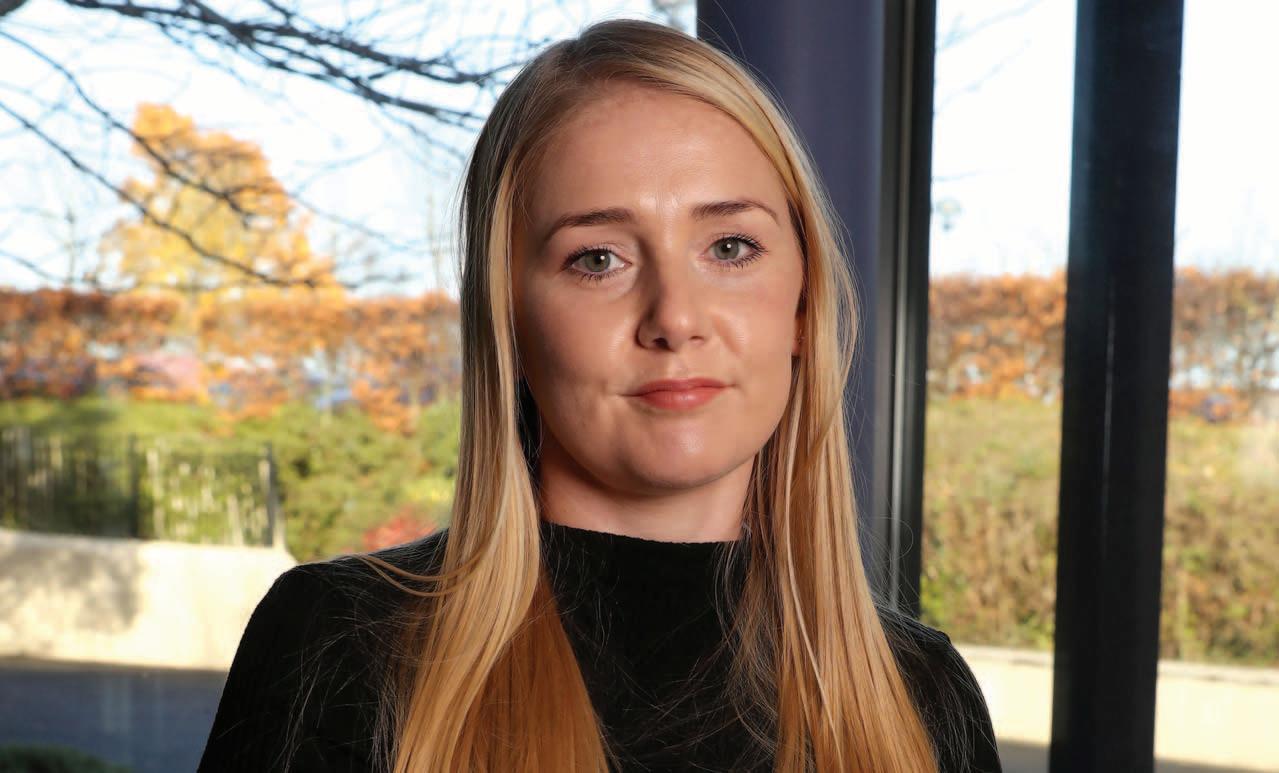
Recently, jibes that Northern Ireland is partying from a subsidy from the UK Government whilst not paying its fair share have again regained momentum. This has been driven by the Secretary of
State who has taken a particular interest in improving the sustainability of Northern Ireland’s public finances. He is seeking advice and information on areas in which Northern Ireland could raise additional revenue or reduce expenditure if policies matched other parts of the UK. In particular, attention is being given to so-called areas of ‘superparity’.

Super-parity refers to areas where Northern Ireland has made policy decisions to diverge and as such, forego certain streams of revenue or spend differently, compared to other parts of the UK. Areas of policy divergence include water charges, prescription charges, tuition fees, and others. Moving beyond issues of superparity, devolution of further revenueraising powers has been suggested as another route to help get Northern Ireland's public finances onto a more sustainable path.
Similar fudge is being thrown about when it comes to the issue of water charges, where it is spoken as though fact that sums between £345 million and £615 million would be raised if water charges were implemented. This is a stretch.
Let us clarify the issue of water charges first. Issues of super-parity are perhaps one of the most talked about, but misrepresented areas of public finances in Northern Ireland.
The Independent Fiscal Commission (of which I was a member) estimated that areas of ‘super-parity’ cost Northern Ireland around £600 to £700 million in 2020/21, or some 4 per cent of the Northern Ireland Budget. £345 million was the amount allocated to water charges as taken out of the Northern Ireland Executive budget to ‘pay’ for the fact that Northern Ireland residents do not pay water charges. Specifically, the Northern Ireland Executive has extended the power for the Department for Infrastructure to pay a subsidy to NI Water, in lieu of domestic water charging since 2007.
Lisa Wilson, senior economist at the Nevin Economic Research Institute (NERI), says that issues of super-parity are one of the most talked about, but misrepresented areas of public finances in Northern Ireland.
However, when calculating the ‘cost’ of super-parity measures, it is important to recognise that the amount estimated as foregone or spent does not necessarily equate to the amount that could be raised or saved. So, if water charges were implemented, it does not necessarily follow that we would raise £345 million. The amount that would be raised would ultimately depend on the final charging model that would be applied and would have to take into consideration the fact that many households in Northern Ireland would severely struggle or be unable to pay anything at all. Such are the dire straits under which many live.
Beyond this, a point which needs to be made is that super-parity is often presented as though Northern Ireland citizens and businesses receive superior or advantageous treatment, compared to our UK counterparts. This is a misrepresentation. Although it is the case that the Executive has made policy decisions to forego certain streams of revenue, or rather, spend differently compared to other parts of the UK on these areas of super-parity, Northern Ireland does not receive additional monies to fund these. They are funded from within our existing funding allocation. We are not partying with super-parity.
At the other end of the spectrum, we have ‘sub-parity’, where childcare stands out as an area that lags behind other parts of the UK. The Executive does receive a Barnett consequential as a result of UK Government spending on childcare provision which we receive through the block grant, but these monies are not currently being used to provide parity on these areas of policy. England offers 30 hours per week of free childcare, for 38 weeks of the year to all three- and four-year-olds to all eligible working parents’ children. By September 2025, the provision will be extended and will cover all children above the age of nine months. The same provision is not available in Northern Ireland.
Going back to the devolution of further revenue-raising powers as the key to our economic transformation. The Independent Fiscal Commission for Northern Ireland recommended that if the Northern Ireland Executive was to embark on further fiscal devolution, the
Northern Ireland, £5,440
Wales, £4,566
North East, £4,164
North West, £3,098
West Midlands, £2,928
Scotland, £2,800
Yorkshire and the Humber, £2,241
East Midlands, £1,479
South West, £1,100
United Kingdom, £863 East of England, -£568 England, £314
East, -£2,136
most appropriate place to seek to increase the revenue-raising powers of the Assembly would be via the devolution of (elements of) income tax, air passenger duty, stamp duty, and the apprenticeship levy.
However, the Independent Fiscal Commission cautioned of the risks involved in further devolution of taxraising powers. If taxes are devolved to the Northern Ireland Executive, then the Executive’s budget will, in part, be determined by how much revenue those taxes raise in Northern Ireland. That could well lead to a more volatile budget. It could lead to the budget rising or falling, relative to what it might have been in the absence of further devolution. Given the significant gap in performance between Northern Ireland’s economy and that of the UK

as a whole, these risks should be given careful consideration.
Furthermore, it does not follow that the further devolution of fiscal powers will automatically correct any of the weaknesses in the Northern Ireland economy. Devolution can assist with economic development, but the fundamental importance of the economic, social, and institutional geography of the place has to be of paramount importance.
Devolution of any tax will not act as a panacea to the economy. In this sense, it is important not to be taken in by the simplistic view that merely devolving greater fiscal powers will bring greater economic growth.
Such ‘silver bullet’ thinking is folly.
1.5 million? The number of tonnes of carbon that Belfast emits annually. And zero? That is where we need to get to. DAERA is currently developing a carbon budget for Northern Ireland through to 2027. Exceeding this budget would not only leave us exposed to legal challenge but destroy our global reputation – along with our international ambitions.
Belfast has a massive opportunity here – we have the natural resources, the technology, and the talent to make this a truly pioneering place; an exemplar to lead the race to net zero. Our modest scale is an advantage – enabling us to move fast and show how this small place can achieve big ambitions.
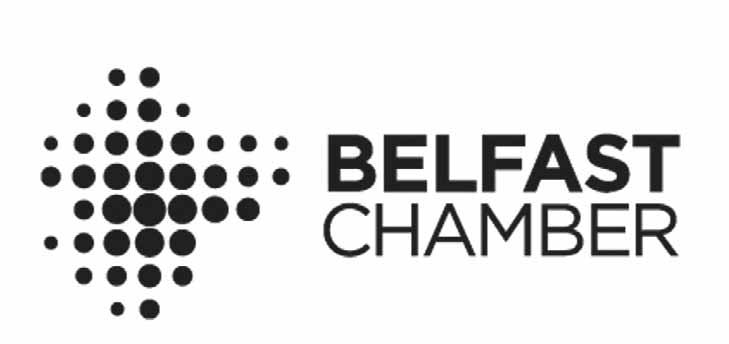
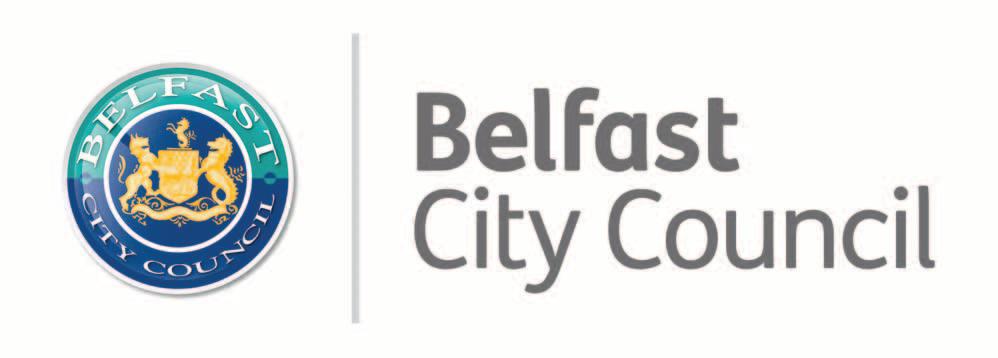

We are unique, and we have market access like no other place in Europe. Our abundance of wind and geothermal energy, combined with ground-breaking local technology,
can provide sustainable, reliable, and affordable green energy, and remove our reliance on imported fossil fuels.
In Northern Ireland, single institutions hold majority control across electricity, gas, water, and public transport. This means that, in theory at least, we can be swift and efficient making sweeping changes at scale.
That theory is already becoming a reality, with Translink on schedule to decarbonise its bus fleet. By 2025, half of all Belfast Metro services will be zero emission, with all Metro services planned to be net zero by 2030. This, coupled with attracting more people onto public transport, will help decarbonise the city’s transport. NI Water is also levering its assets to deliver green energy solutions, and the Housing Executive is retrofitting 300 of its houses with energy efficiency measures, low carbon heating, renewable power generation, and storage with improved
View over Belfast Harbour and Innovation District.When it comes to carbon, there are only two numbers that really matter – 1.5 million and zero, write Clare Guinness, Chief Executive, Belfast Chamber of Trade and Commerce and Debbie Caldwell, Climate Commissioner, Belfast City Council.
householder awareness. It also plans to deliver a wider programme at scale from 2026/27 to address the climate crisis and reduce fuel poverty.
The rest of the public sector will surely follow suit, and ideally at pace. By harnessing public assets, and public procurement, it can drive green growth across the region. The private sector will respond rapidly – we have a swathe of agile and talented SMEs that will quickly develop green supply chains.
Belfast’s tertiary education sector is second to none. Our world class universities and colleges are delivering world class talent pipelines. Further investment in apprenticeships and skills programmes, funded by a Northern Ireland investment zone for example, would ensure that we have the capacity to reach net zero, whilst also creating jobs and building prosperity in an inclusive way.
There are some stunning examples of how Northern Ireland companies are leading the way in green technology. Just look at recent developments in new hydrogen technologies (Catagen), net zero marine transport (Artemis Technologies), and permanent magnet recycling (Ionic Technologies). In addition to that capability, note also the capacity in Belfast Harbour, where single control over a huge landbank with multiple uses (residential, tourism, education, industry, port, and airport) provides an unrivalled ability to test, demonstrate, and commercialise green technologies across two regulatory markets.
Given that cities account for 70 per cent of global emissions, they must play a pivotal role. The Belfast Agenda (currently out for consultation) sets out a bold plan to tackle climate change. This includes bringing nature back into the city, making the food system more sustainable, creating a more circular and sustainable economy, and supporting innovation. This will require the expansion of our natural systems in areas where they are most needed –such as our inner city. It means transforming our throwaway economy into one where waste is eliminated, resources are circulated, and nature is regenerated and nurtured, and it means ramping up investment in advanced green solutions for energy, transport, and manufacturing.
Belfast’s Local Area Energy Plan (currently in development) applies a whole systems approach to net zero. This data-rich, spatial roadmap will unlock investment into the delivery of smart local energy systems across the city, decarbonising our buildings and transport systems in the most cost-effective way, whilst also looking for opportunities to develop skills. Leaving no one behind, we will maximise the social opportunities that the transition presents and reduce the risks, so that everyone benefits.
Innovation is key. Northern Ireland has a growing GreenTech sector which cuts across all elements of low carbon and green economy, with significant technology development and proven use.
A Net Zero Tech Park in Belfast’s Innovation District, dedicated to the development and deployment of green technologies, would support the growth of the green economy and achieve our net zero goals.
The aim is to expand an existing cluster of net zero technology companies to grow Northern Ireland’s GreenTech sector and help realise the objectives of the Green Growth Strategy. Situated within the Harbour Estate, with access to Queen’s University, Ulster University, and Belfast Metropolitan College, the park will provide the facilities to trial and unlock new high-growth technology for domestic use and export. Investment in the physical and digital infrastructure to
develop a GreenTech ecosystem will encourage innovation and collaboration amongst existing companies and startups to draw in further capital. By leveraging existing and planned assets and investment, the park could become an exemplar of a low carbon economy, creating opportunities for employment and green shoring.
Let’s change before we are forced to, through collective design and delivery, not disparate initiatives with bit part solutions.
Let’s build a portfolio of projects to attract private patient capital, gaining competitive advantage for our place and our people, putting Belfast and Northern Ireland top of the list for international investors.
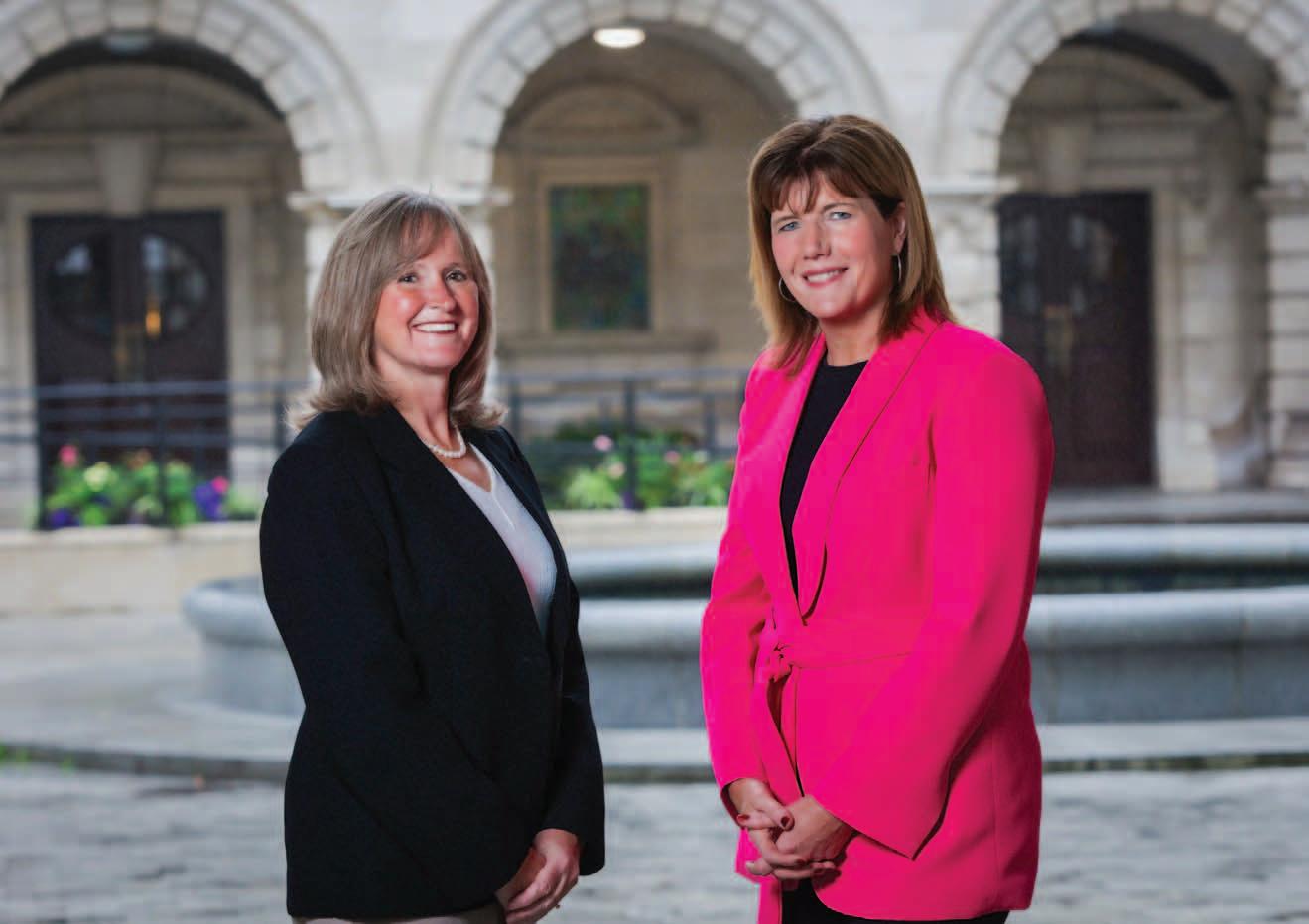
Let’s turn future adversity into current opportunity.
And together, let’s make our green region the envy of all, paving the way to a brighter, cleaner, more prosperous future.
Have your say on The Belfast Agenda: Draft Strategic Plan 2023 – 2027 | Your say Belfast (belfastcity.gov.uk) before 2 October 2023
E: caldwelld@belfastcity.gov.uk
W: www.belfastcity.gov.uk
(L:R): Debbie Caldwell (Climate Commissioner, Belfast City Council) and Clare Guinness (Chief Executive, Belfast Chamber of Trade and Commerce).The latest data shows that the number of payrolled employees in the region’s labour market has increased by 1.6 per cent over the year, with earnings 7.3 per cent higher than June 2022.


The employment rate of 72.4 per cent is the highest recorded since late 2019, and subsequently, the unemployment rate remains near a record low of 2.4 per cent.

The rate of economic inactivity fell to 25.8 per cent, the lowest rate since mid-2019, however, this decrease is in the context of Northern Ireland having the highest economic inactivity rate of all UK regions.
Despite a fall in economic inactivity, in June 2023, 3.8 per cent of the
Source: NISRA
workforce were in the claimant count, meaning the count remains almost 23 per cent higher than the pre-pandemic count in March 2020.
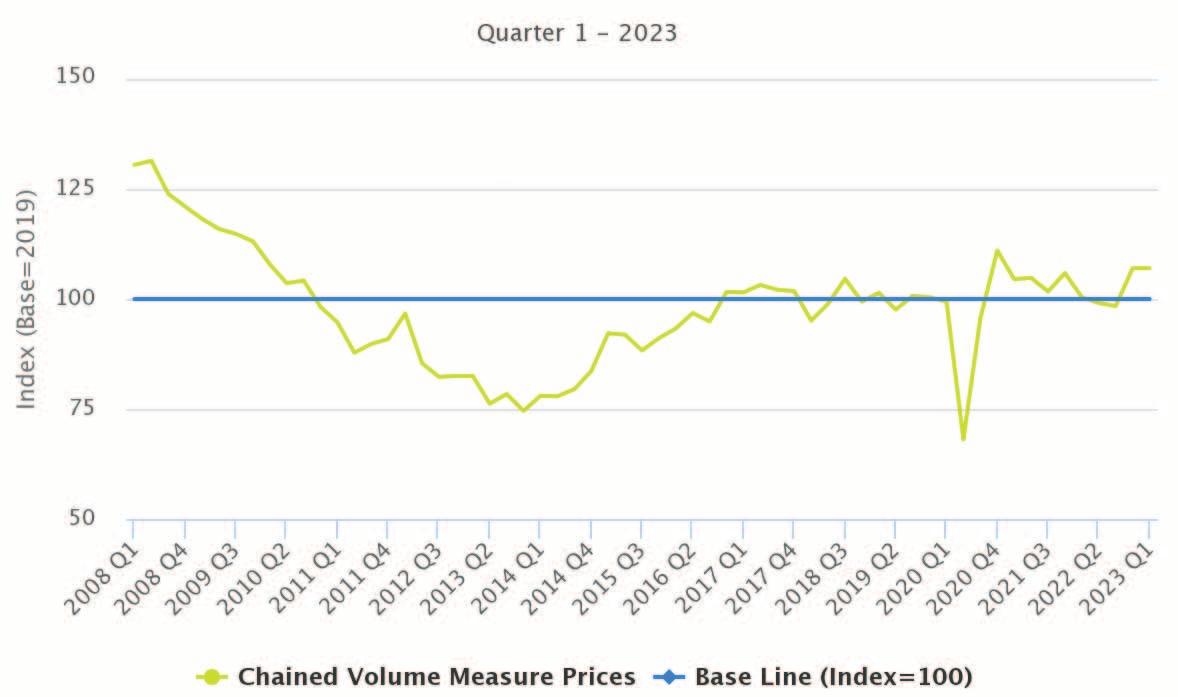

While the total number of hours worked in March-May 2023 had increased by 2.4 per cent on the previous year, the figure has still not returned to pre-pandemic levels and sits 0.3 per cent below the December-February 2020 figure.
However, the predicted slowdown is centred on the level of redundancies notified to the Department for the Economy. The figure is not truly reflective as employers here are only required to notify the Department for the Economy when planning to cut at least 20 jobs, despite more than 90 per cent of private sector companies in the region having less than 10 employees.
The Department was notified of 1,960 proposed redundancies in June 2023, which is the highest number proposed since June 2020. June’s notification brings the annual total to 4,150, the highest rolling 12-month total since September 2021 and almost double the figure for the previous year.
Northern Ireland’s services sector was the largest contributor to the 1.7 per cent Northern Ireland Composite Economic Index (NICEI) over the year to Q1 2023. Positive contributions from the services sector (1.2 pps), the construction sector (0.5 pps) and the public sector (0.3 pps), offset a negative contribution from the production sector (0.3 pps).

The services sector has also been the largest driver of pandemic recovery. The Northern Ireland economic output annualised increase of 1.1 per cent from pre-pandemic levels has been attributed to growth in the services sector (0.6 pps) and the public sector (0.5 pps). Contributions from the production and construction sectors are described as “negligible” over the period.
Analysis of the sub-sectors of the Index of Services for Q1 2023 shows that business services and finance had the largest increase over the year (8.7 per cent). Wholesale and retail trade (1.5 per cent) and other services (5.7 per cent) also saw annual increases. Transport, storage, information, and communication was the only sub-sector of the index of services to record an annual decrease (4.4 per cent).
Source: DfE
The Index of Production highlights that three out of four sub-sectors have experienced sizeable decreases over the year in the form of electricity, gas, steam, and air conditioning (15.3 per cent), mining and quarrying (11 per cent), and water supply, sewerage, and waste management (8.1 per cent). The manufacturing sector recorded a 0.4 per cent increase over the year.



At the first quarter of 2023, the volume of construction output increased by 6.5 per cent over the year, however, construction output decreased by 0.4 per cent on a rolling four-quarter basis. The volume increase was driven by an increase in the maintenance sector (15.2 per cent), despite a decrease in the new work sector (8.8 per cent).
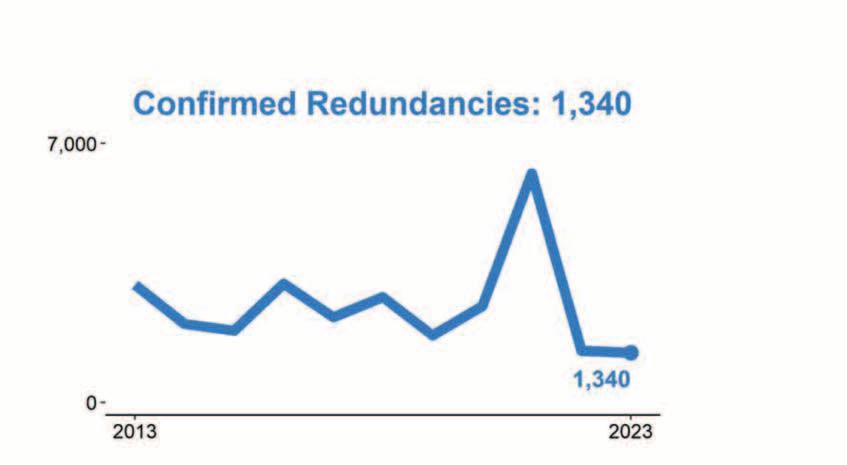




The Research paper on the future of tourism in Northern Ireland has been commissioned to present the added value of tourism in the context of Northern Irelands’s economic vision, to key challenges by 2030 and identify international best practice that could inform government policy.

The report makes 12 recommendations, based on international comparisons, which it believes can help enhance the competitiveness of the local tourism sector.
To improve the environmental resilience of Northern Ireland as a tourism destination, the paper states that there is a need to define and measure value added in tourism. It further states that there must be a plan which accounts for rising carbon prices in airplane tickets and investment into public transport for use by tourists visiting Northern Ireland. Additionally, it suggests that tourism sector leaders must undertake studies to understand and adapt to the tangible

consequences of climate change for hospitality and leisure businesses.
To maximise the economic impact of tourism in Northern Ireland, the report calls on leaders to continue measuring the economic impact of tourism in Northern Ireland. Complementary to this is putting digital and experiences at the core of its tourism offer to stay competitive at an international level. Furthermore, there is a need to leverage the power of business tourism and large-scale business events to position Northern Ireland as a world-class tech destination.
If the potential social impact of tourism in Northern Ireland is to be maximised, the report states a need to monitor the social impact of tourism on local populations on an ongoing basis, and to strengthen the attractiveness of tourism jobs and retain employees in the sector. To achieve this, there is a need to rethink training programmes to align them with the needs of companies and destinations.
In order to ensure that there is enough capacity for demand, the report emphasises the necessity to monitor and redirect tourism flows, monitor housing prices around tourism destinations, and to introduce pilot regulations for short-term rents and digital platforms in specific locations. The research paper reaches a vital conclusion, which is that the development of the tourism sector is “aligned with the 10X vision” and has been “delivering tangible results for several years”.
The paper states that, moving forward, substantial measures could be taken to ensure the “sustainable development of this value-added sector”. It adds: “Investing in the tourism product is key to ensuring its long-term competitiveness. This could be done in accordance with co-constructed objectives and regularly monitored key performance indicators (KPIs) considering the economic, social, and environmental impacts of tourism in Northern Ireland.”
the future of tourism in Northern Ireland, aiming to develop a tourism strategy which should take the region through to 2030.
Following the conclusion of a call for evidence on Place 10X in July 2023, the Department says that it is now working to create a body of information to inform policymakers and a future Minister in the Department for the Economy of what central interventions and support are needed or wanted, to address sub-regional economic inequality in Northern Ireland.

While Northern Ireland has a relatively new macroeconomic approach in the form of 10X Economy, and local councils have their own strategic approaches, it is recognised that no defined DfE sub-regional approach exists, nor does a strategic link between the three levels.
Acknowledging that the status quo “has not worked to date”, the call for evidence states that many areas will continue to show disparity “unless we change our approach”.
“There is also the chance to maximise opportunities in areas that are performing better and to examine if central government support can accelerate growth. It highlights there is a challenge for the Department to consider,” it states.
Analysing sub-regional disparities on the geographic model of the four City and Growth Deal regions as an evidence base, disparities highlighted by the report include:
Labour market: The Mid South West Region has the highest employment rate of the five regions identified, closely followed by Belfast, and so both sit above the Northern Ireland average of 70.2 per cent. Causeway Coast and Glens has a below regional average employment rate of 66.1 per cent, but is still significantly higher than the regional laggard, which is Derry City and Strabane at 62.5 per cent.
As expected, Derry and Strabane, with the lowest employment rates, also has the highest unemployment rates of 34.2 per cent, which is significantly higher than Mid South West’s regional low of 25.8 per cent.
Labour productivity: The Derry City Region ranks lowest in productivity measurement (75.8), again well below the Belfast City Region’s high of 89.5. Both the Causeway Coast and Glens (non-city region) and the rest of Northern Ireland (including the Causeway Coast and Glens city region), are below the Northern Ireland average.
Gross household disposable income: From 2011 (until 2020) Derry City and Strabane, Mid South West, and Causeway Coast and Glens have all experienced annual average growth in gross household disposable income of between 2 and 3 per cent. This figure, however, belies the significant gap that exists between the regions. Only Belfast sits above the Northern Ireland average of around £17,250, at £17,750. Again, Derry and Strabane is a significant laggard in this regard, with a gross household disposable income rate of just under £15,500, also comparing

Offcials in
(DfE) are preparing policy advice that aims to tackle sub-regional and local inequality.
unfavourably to Causeway Coast and Glens (over £17,000) and Mid South West (over £16,500).
Innovation active firms: Of the 11 council regions, Belfast is only ranked sixth, alongside Mid and East Antrim and Antrim and Newtownabbey, in the amount of innovation active firms as a percentage of total firms. The highestranking region is Ards and North Down (47 per cent), closely followed by Causeway Coast and Glens (45 per cent). There is a significant gap to the two regions with the lowest percentage in the form of Mid Ulster (37 per cent) and Newry, Mourne and Down (34 per cent).

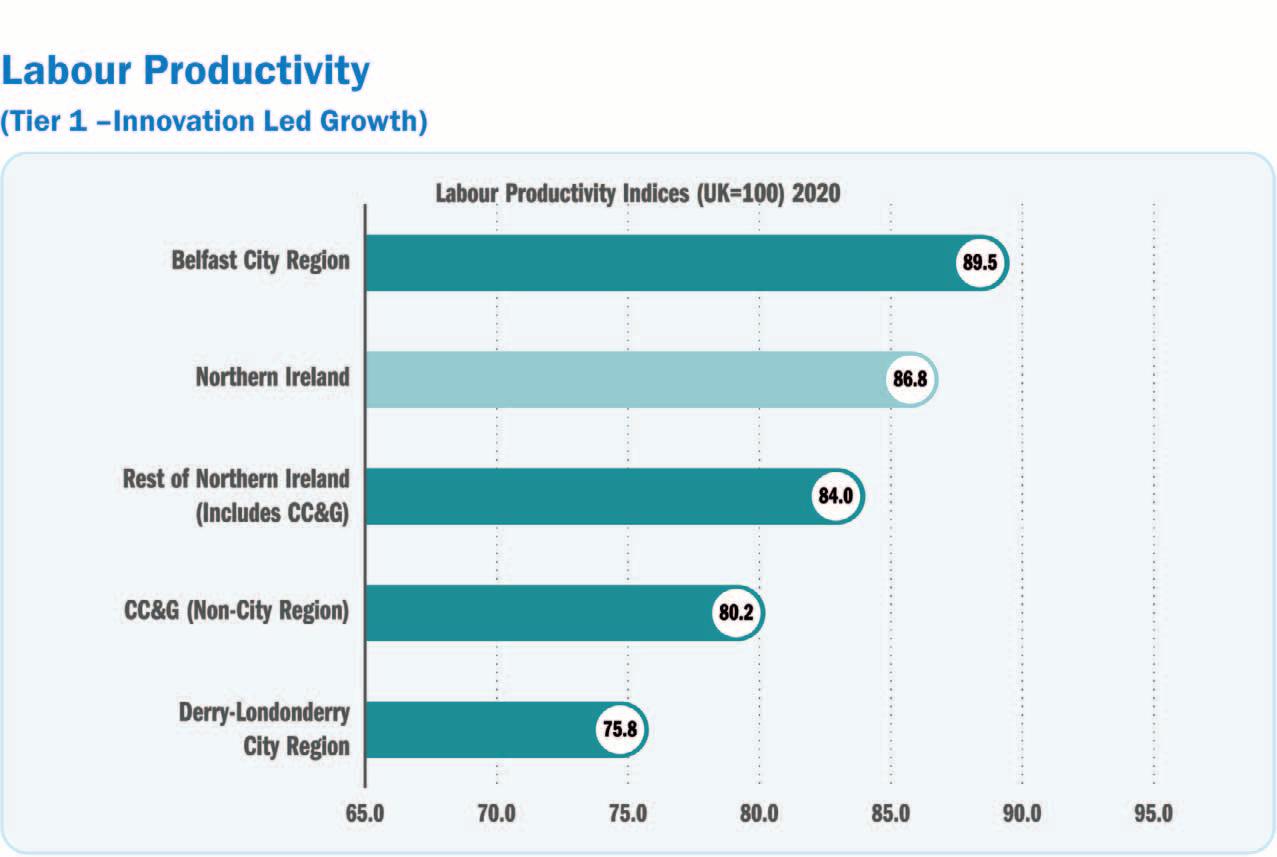
Early-stage entrepreneurship: Using a measurement of the propensity of individuals to be entrepreneurial to determine total early-stage entrepreneurship over a period of 2011 to 2020, Belfast is ranked lowest at 4.9 per cent, well below the Northern Ireland average of 6.29 per cent. Mid and East Antrim rank highest at 8.86 per cent.
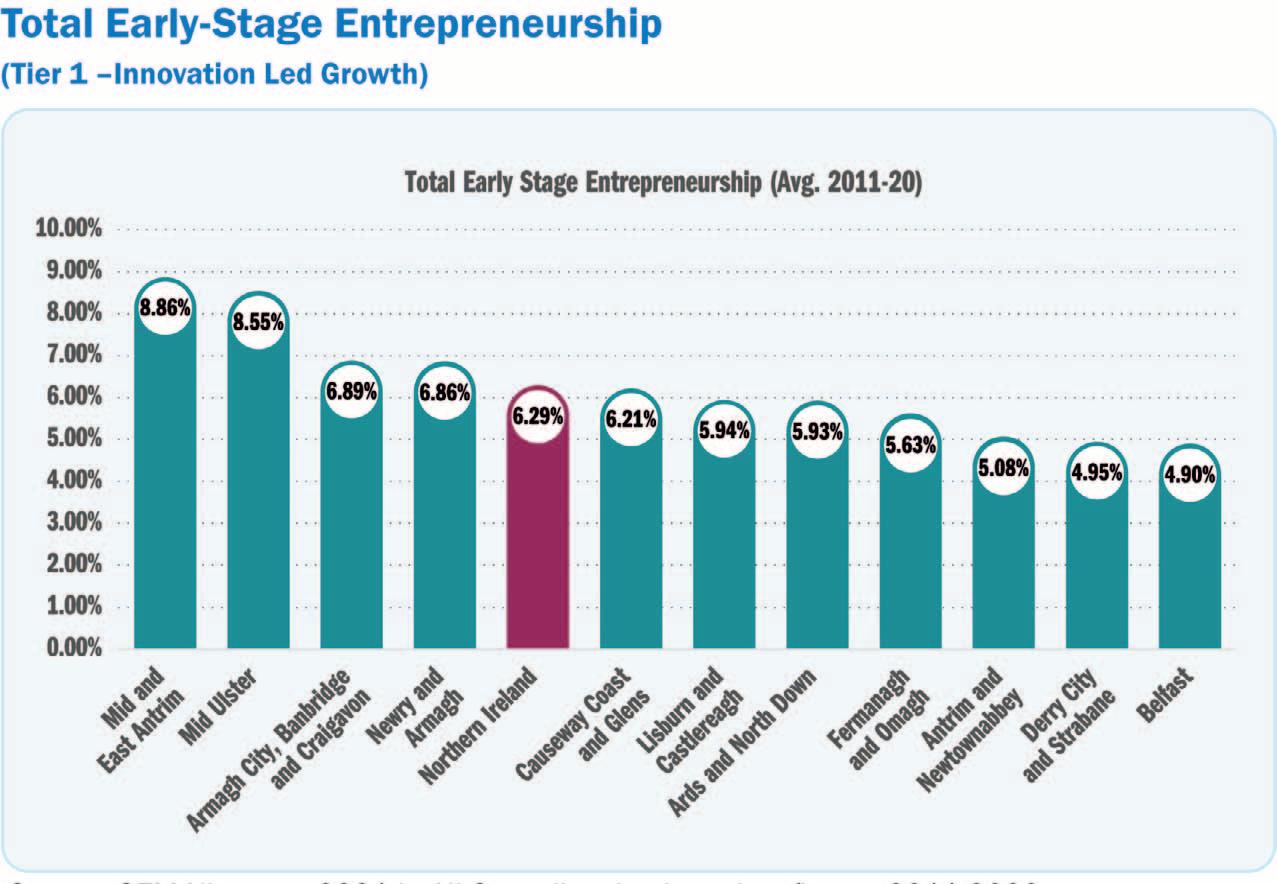
Defining the concept of ‘place’, the Department says that at its most general it encompasses three main components of location; locale; and sense of place. “Taken together it can be an idea of identity and belonging, both physically and culturally, and allows some to define the special quality of a place,” it adds.
The Department stresses that placebased interventions are not simply a local version of a macro approach, but instead aim to tackle inequality or disadvantage. “In this way place-based interventions can accelerate the development of a more robust local ecosystem, identifying and unlocking capability while removing systematic weaknesses.”
Interestingly, in seeking to define DfE’s sub-regional role, the call for evidence highlights the likelihood that the Department acts as a coordinator between local partners, rather than taking the lead of being the decisionmaker.
In asking the question ‘what interventions could occur’ the Department is not drawn on any particular actions but suggests that a
range of interventions are possible “from policy and legislative changes to enable greater focus on disparities and inequalities or to remove barriers to success, to funded programme interventions that are targeted rather than rolled out at regional level”.
However, it emphasises that prior to an intervention, “launching a Place 10X policy, building a place-based dataset, embedding the concept in DfE and its ALBs, and forming a network of stakeholders committed to this approach would be a step change”.
The Department defines Place 10X as: “Locally designed interventions to deliver innovative, inclusive, and
sustainable economic growth. Building on the existing strengths of a place to unlock potential, to empower communities, and to tackle sub regional and local inequality.”
Following the closure of the call for evidence in July 2023, the Department says that it is considering the responses and continues to engage with key partners on this work.
“The Department will produce a report summarising the findings, emerging key themes and actions planned. The report will also set out further detail on the next steps. The Department aims to publish the report in the autumn of 2023.”
Source: GEM NI report, 2021 by NI Council region based figures 2011-2020.In the Fortinet Work-from-Anywhere Global Study, 60 per cent of respondents report that they plan to continue accommodating employees who work from home and 55 per cent have a hybrid work strategy. But the reality is that security gaps arising from remote work, and these continue to be exploited by threat actors.
According to the FortiGuard Labs 1H 2023 Threat Landscape Report, there has been a rise in the frequency and complexity of ransomware, and breach attempts are becoming more sophisticated and targeted.
To prevent breaches, it is critical for security solutions to be integrated across all locations, both on-premises and in the cloud. A secure access service edge (SASE), or zero-trust edge (ZTE) architecture, converges networking and security to secure users no matter where they are located.
Well not exactly. SASE is rather a framework of technologies, that work together to provide controlled access, based on zero-trust principles, to company resources and services, whether those resources are within company data centres, in public cloud infrastructure, or being consumed via SaaS.
The concept is that no matter where those resources reside, no matter what user or device is connecting to them, no matter how the connection is made, the security controls should always remain the same.
Organisations may in fact already be using such technologies, and likely from a wide range of vendors. Endpoint protection, Remote VPN client, SD-WAN, Secure Web Gateway, NGFW, DLP, CASB – are of course nothing new. Few, however, have a unified SASE solution currently in place that allows those technologies to seamlessly work together – continuously examining user and device telemetry to ensure that access is granted only when specific criteria are met, and bringing together the threat intelligence into one place when they are not.
SASE approach Integrating SD-WAN and cloud-delivered security, Fortinet SingleVendor SASE delivers unified management using a single simplified console. Organisations can consistently apply enterprise-grade security across all network edges and secure users whether they are on the network or off the network at a branch location.

Fortinet Single-Vendor SASE uniquely brings together all the components needed to converge networking and security for zero implicit trust everywhere. It provides a full set of networking and security capabilities including secure web gateway, universal zero-trust network access, next-generation dual-mode cloud access security broker (CASB), Firewallas-a-Service, and Secure SD-WAN. Powered by FortiOS, FortiGuard AIPowered Security Services, unified management, and a unified agent drive operational efficiency and deliver consistent security everywhere.
FortiSASE offers several key benefits for organisations looking to secure a hybrid workforce.
FortiSASE provides a converged SDWAN and cloud-delivered security solution that is managed from a single console: FortiManager. It uses a unified agent (FortiClient), which helps organizations reduce their security vendor footprint. FortiClient is referred to as a unified agent because it provides features such as endpoint protection for vulnerability tracking, ZTNA, CASB, SWG, or VPN, which helps organisations unify the agents they may have deployed over multiple years.
When compared to other solutions, FortiSASE provides the simplest licensing model and compelling total cost of ownership. FortiSASE offers flat, userbased licensing with no feature-based tiering. This licensing model helps organizations better plan their SASE journey and keep their costs predictable. Fortinet also takes advantage of built-in FortiGuard artificial intelligence and machine learning, which give FortiSASE an edge compared to other solutions that must rely on outside solutions to OEM or deliver through partnerships.
Security is the same for users who are working on-premises, at a branch, or remotely. With FortiSASE, organisations
Despite some recent high-profile moves to encourage a return to the office, it is fair to say hybrid work is here to stay, writes Fortinet’s Graham King.
have a uniform solution across all environments. It provides flexibility for microbranches that need security for their LAN/WLAN.
With FortiSASE, organisations can gain full visibility into their networking and security for secure internet access, secure private access, and secure SaaS access everywhere.
For any further information about FortiSASE, or any of the other range of Fortinet products, please contact Gking@fortinet.com
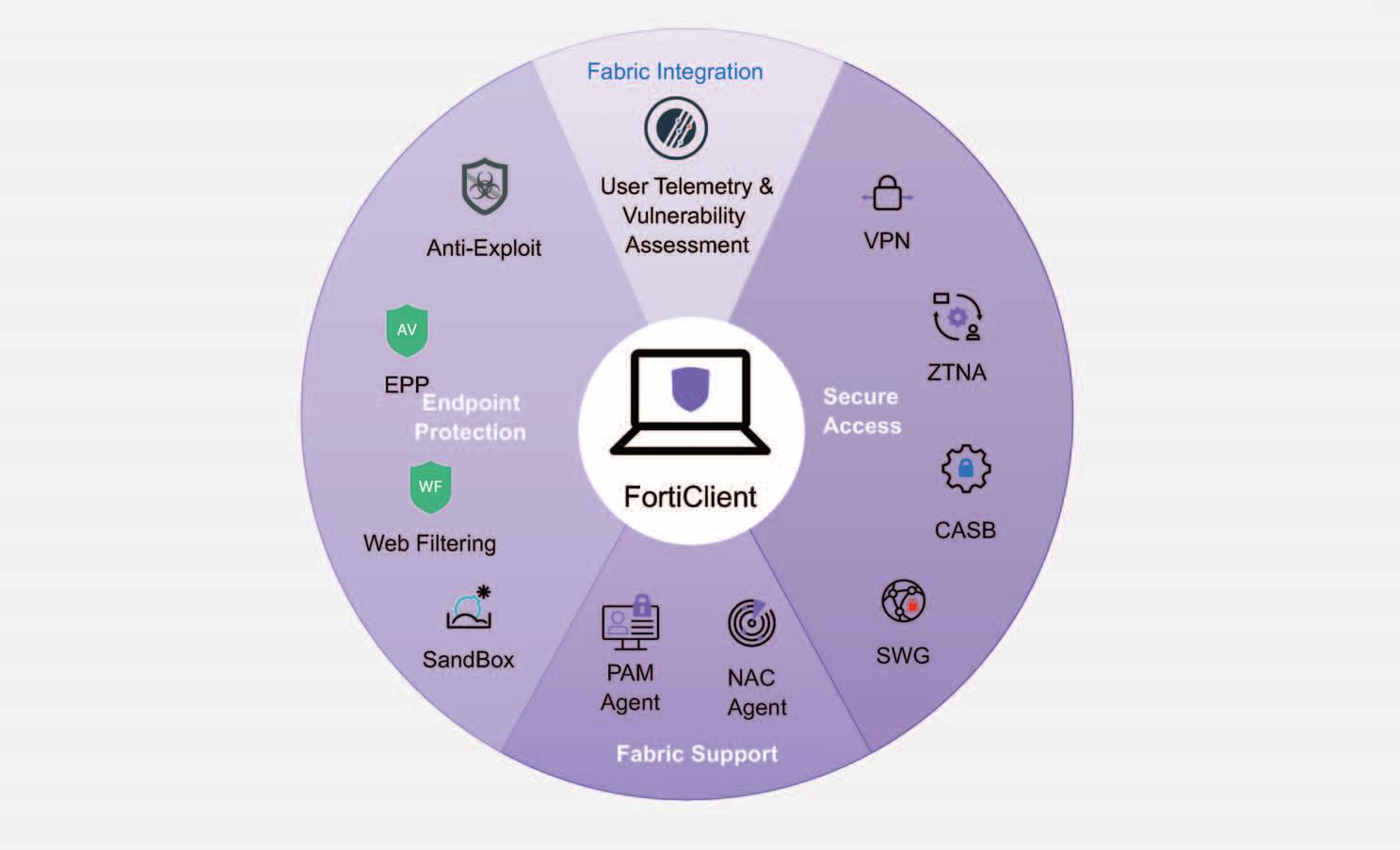


Fortinet is a driving force in the evolution of cybersecurity and the convergence of networking and security. Our mission is to secure people, devices, and data everywhere, and today we deliver cybersecurity everywhere you need it with the largest integrated portfolio of over 50 enterprise-grade products. Well over half a million customers trust Fortinet's solutions, which are among the most deployed, most patented, and most validated in the industry. The Fortinet Training Institute, one of the largest and broadest training programs in the industry, is dedicated to making cybersecurity training and new career opportunities available to everyone. FortiGuard Labs, Fortinet’s elite threat intelligence and research organization, develops and utilises leading-edge machine learning and AI technologies to provide customers with timely and consistently top-rated protection and actionable threat intelligence.
Learn more at https://www.fortinet.com, the Fortinet Blog, and FortiGuard Labs. https://www.fortinet.com/corporate/about-us/about-us
Graham has worked in a variety of cyber-security roles for almost 25 years, providing consultancy and implementation services to UK central and local government agencies, financial institutions, and some of the world's best-known brands during that time. He has spent the last nine years at Fortinet in both technical and commercial positions.

L: www.linkedin.com/in/graham-king-a727801
E: Gking@fortinet.com
The Fortinet team in Northern Ireland is led by Graham King.

Economist Paul Gosling argues that failure to make Northern Ireland an attractive place to live and work for young people means that the region will continue to miss out on the opportunity to rebalance foreign direct investment on the island.
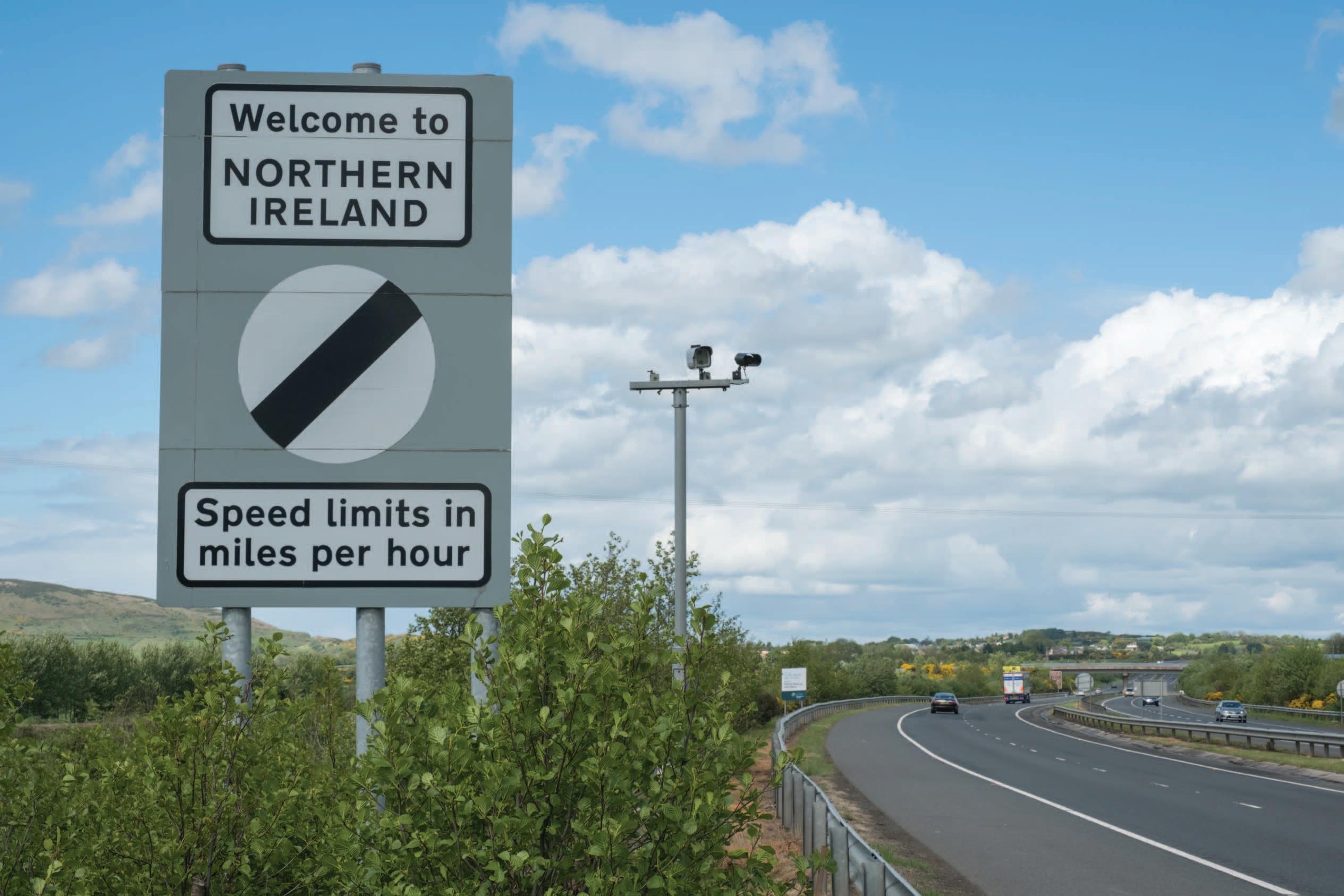
In 1998, the Good Friday Agreement (GFA) brought our society an expectation of much improved times. I moved to Northern Ireland the following year, carried over from Britain on a tide of optimism. It was exciting, but what has happened since is disappointing.
Yes, the violent conflict is over. Communal murders are few, though drugs-related criminality cloaked in paramilitary trappings remains widespread. But it is our failure to achieve a better quality of life for our citizens that represents failure. Too many of our jobs are low skilled and low paid, while our employment rate of 72 per cent is low.
An illustration of what that means to our young adults was expressed in a survey conducted recently by the Pivotal think-tank. Over 40 per cent of young people intend to move away, rising to over 45 per cent of those who are currently in work. And that jumps even further to nearly 60 per cent of people who do not define themselves within the traditional nationalist and unionist divisions.
Yet this should be a moment of enormous opportunity for us. Despite the difficult economic context, our neighbours to the South are doing well – in a sense, too well. Wages and salaries in the Republic are much higher than in Northern Ireland (exactly how much depends on which pay figures are compared – but employee pay is at least 24 per cent higher in the Republic of Ireland), but so is the cost of living. Average rents in the Republic are more than twice those in Northern Ireland.

These statistics should help us attract inward investment.
Yet our success is limited, for obvious reasons. If so many of our young adults, including the best qualified, want to leave, what does this say to businesses considering locating here? Political instability and continued intercommunity tensions are a negative factor both for our young adults and opportunistic investment.
Since the GFA, our political institutions of government have been down for over 40 per cent of the time. At present, departments are making cuts that deeply damage the fabric of our society and hit hardest those poorest families least able to cope. Programmes in schools that support children from the most deprived backgrounds to catch up with their more privileged peers are being destroyed. That serves as a metaphor for what is happening across ‘government’.
There is now no expectation that a lasting fix can be found to the mutual contempt so clearly expressed by the major parties. Not only will we continue to have either an insecure government or no government, but this fails to provide the example of reconciliation and partnership that our society clearly needs.
How will parties that literally hate working together agree the programme of reform so clearly needed, not least to attract those businesses attracted to this island yet put off by Dublin’s costs? While health always heads the need-to-reform list, it is not alone. Health is an economy issue as well as one of life and wellbeing. Long waiting times for treatment leave employers without key staff for often years at a time unless employer or employee pays privately for treatment.
Former BBC Chair Michael Lyons’s recent review of Invest NI made clear the agency

needs to up its game and change its focus. Yet, instead, funding to our primary economic development agency has been cut by 15 per cent. One of Lyons’s core criticisms was that Invest NI had overlooked opportunities created by the need to plan and invest for a low carbon economy. There is a comparable picture across much of society. Our energy and water infrastructure is out of date, needing massive investment. It is the same with rail and roads. Our schooling system perpetuates division, not just between pupils from different community and religious backgrounds, but also based on academic selection. This leads to early disengagement for many pupils and lifelong underachievement. (ESRI’s excellent paper Education Across the Island of Ireland is recommended as background to this.)

There is a much wider reform agenda that needs to be addressed. We have too few university places for the needs of employers, provoking a brain drain of talent. We have too little of the high-level technical skills that are widespread within our most successful competitor economies, and while we should be investing substantially in childcare to enable more parents to work, we instead underfund it compared to the rest of the UK.
Of course, it is necessary to be positive and to plot a way out of this dire situation. The British Government and the EU thought they had achieved that with the Windsor Framework, but the continued blocking of devolved government raises questions about whether we will ever get stable political leadership. If we do, the challenges really begin. That long list of necessary reforms has to be addressed urgently and seriously. If our political leaders did that, we would be in a great place to hoover up more of the investment coming to this island.
Since its foundation in 2012, Social Enterprise NI (SENI) has operated as the representative and membership body for the sector and as they embark on another decade, are encouraged by the level of interest and awareness being shown in the work of the sector. There has been continual growth over many years in terms of the number of new start-ups, and the number of organisations from outside the sector who are keen to partner and collaborate. Indeed, the recognition which SENI has received over recent years is clear evidence of the increasing awareness of their work to promote the sector and the impact which it can have across the Northern Ireland economy. Invitations to take part as members of the High Street Taskforce, Circular Economy Coalition and a council member of the NI Chamber

of Commerce have all helped to raise the profile of the work and impact of the sector. Furthermore, the invitation from the Minister of Finance to join the reconstituted Procurement Board exposed the topic of social value and provided a forum to promote the sector and the need for this to be recognised in procurement. The issuance of the Public Procurement Note (PPN) 01/21 which mandates central government to allocate 10 per cent of a tender score to the inclusion of social value was a success, and a step along the way to legislation to align Northern Ireland with other parts of the UK.
PPN 01/21 allows for the potential to increase the scoring of social value in central government contracts from 10 per cent to 20 per cent, subject to an assessment of its usage and how it is
managed, however due to the lack of an Executive, this decision has been deferred. There remains a degree of uncertainty on how social value is scored and its overall understanding, with any increase in scoring likely to be next year. There is no doubt that businesses are being challenged on how they can create social value and meet the criteria of recently issued tender documents. Colin Jess, CEO of Social Enterprise NI comments: “SENI are being approached by private sector bodies for guidance on several aspects of tenders and it is clear that a degree of uncertainty exists, in respect of how to respond to tenders, understanding the scoring within the tender, and the inclusion of appropriate clauses to match the desired outcomes of the contract. We believe that organisations should be encouraged to

The social economy sector in Northern Ireland plays a vital role at the heart of the economy, trading as businesses that generate real profit with purpose and making an impact for those in greatest need in society. Profits created through the sale of goods and services are reinvested back into the individual organisations social mission rather than distributed to shareholders as in an SME.
be innovative in their responses rather than answering questions which are in fact social clauses, however it is appreciated that this in itself creates issues. How do we score these on a consistent basis to ensure fairness? Who is responsible for the contract management once the winning tender has been appointed?
“But more importantly how do you as a private or public sector organisation meet the current requirements to score social value and in a meaningful way and how do you set yourself apart from your competitors? Social value is not just about including social enterprises within your supply chain, though we fully support and encourage this. It is also about how you can add value to a social enterprise through the transfer of skills of your staff. How can your organisation build a relationship with a social enterprise and create a social partnership, which would hopefully be a long-lasting relationship and one which would create significant benefit for both parties. Imagine the strength that a private organisation and a social enterprise could bring to completing a public sector contract through establishing a social partnership.”
To assist in this process, SENI, are soon to launch a brokerage service with access to an interactive directory of all social enterprises in Northern Ireland, currently standing at almost 800. Access to this will be available to all corporate members of SENI, also known as Social Partners. Additionally, via the formation of a Social Value Advisory Taskforce Group consisting of representatives of members, we will be collating feedback on tenders and relaying this to our central government partners to help support future tender documents.
SENI are partnering with Ulster University Business School in developing a programme to support commissioners within the public sector on the options available to them to deliver outcomes, perhaps not necessary via procurement. A pilot is expected to be launched in the autumn of 2023. More details to follow on this shortly.
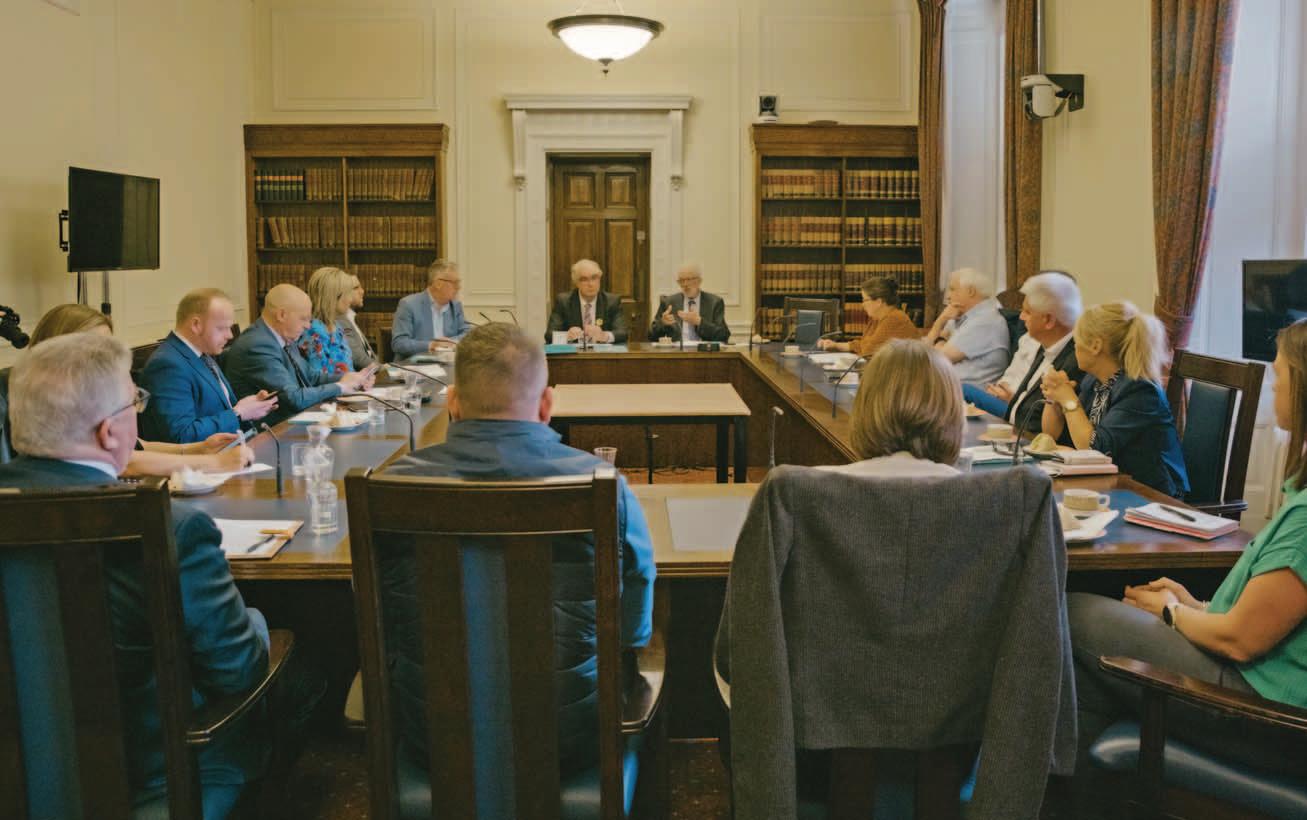
SENI will be playing a pivotal role in supporting the government departments to connect and partner with social enterprises who can deliver the

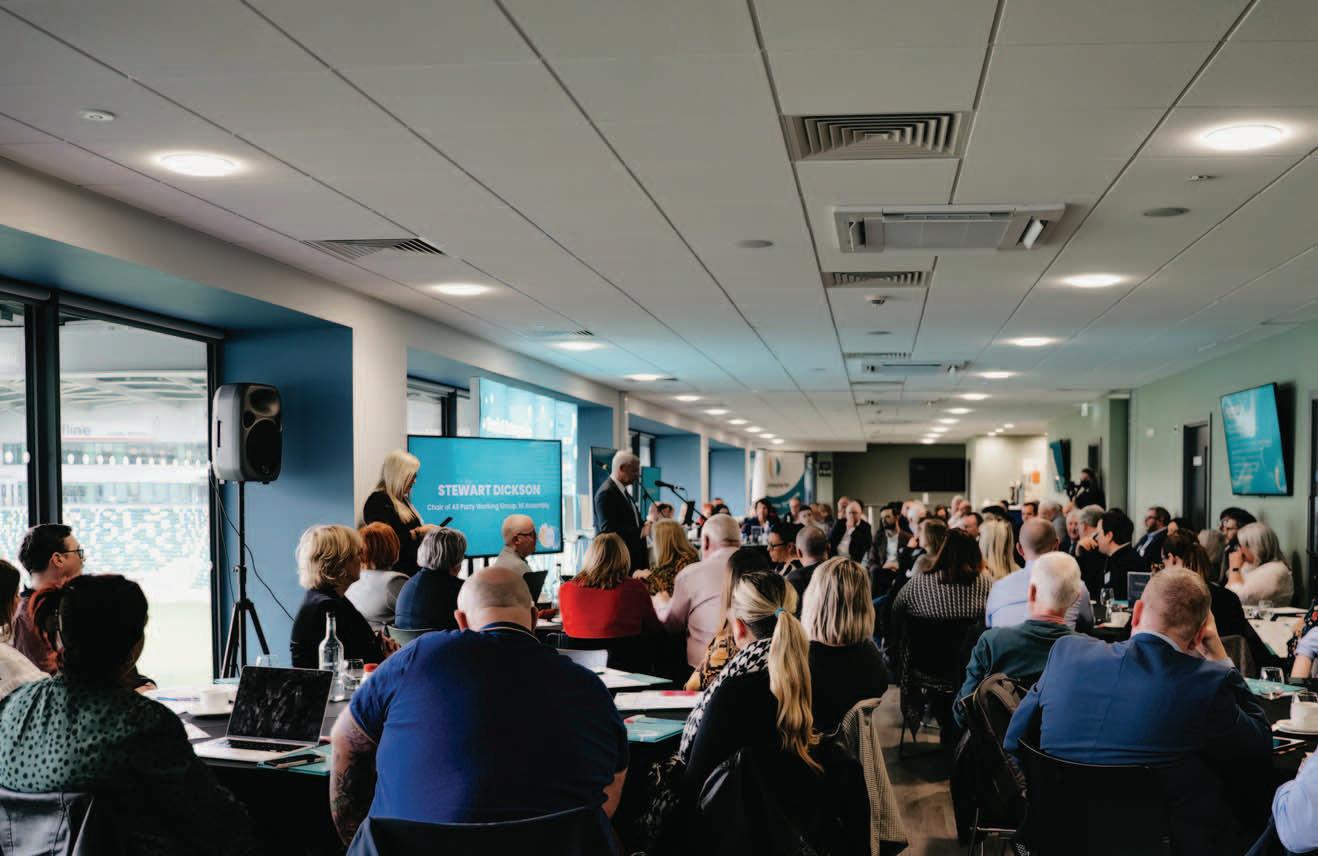

economic growth of the community wealth building agenda, with the support of the All-Party Group of MLAs.
In conclusion, SENI would encourage you to sign up as a social partner and join the increasing number of organisations who recognise the need to explore how to include social enterprise in their supply chains and who they could partner with. The database of organisations will be an essential tool. Joining will also provide access to conferences, business breakfast events,
and virtual sessions to provide you with the opportunity to learn more and to promote your own work.
Join us as a social partner and help create real profit with purpose. Get in touch today and sign up to our mailing list.
E: colin@socialenterpriseni.org
W: www.socialenterpriseni.org
Founded in March 2016, The Hummingbird Project has grown from “small beginnings” to now playing a collaborative role in ensuring mental health support in some of Northern Ireland’s largest corporations.

CEO and founder, Leigh Carey, who was awarded Social Enterprise Leader of the Year in 2019, explains her inspiration for starting a social enterprise, which aims to change the culture around mental health in Northern Ireland’s workplaces.
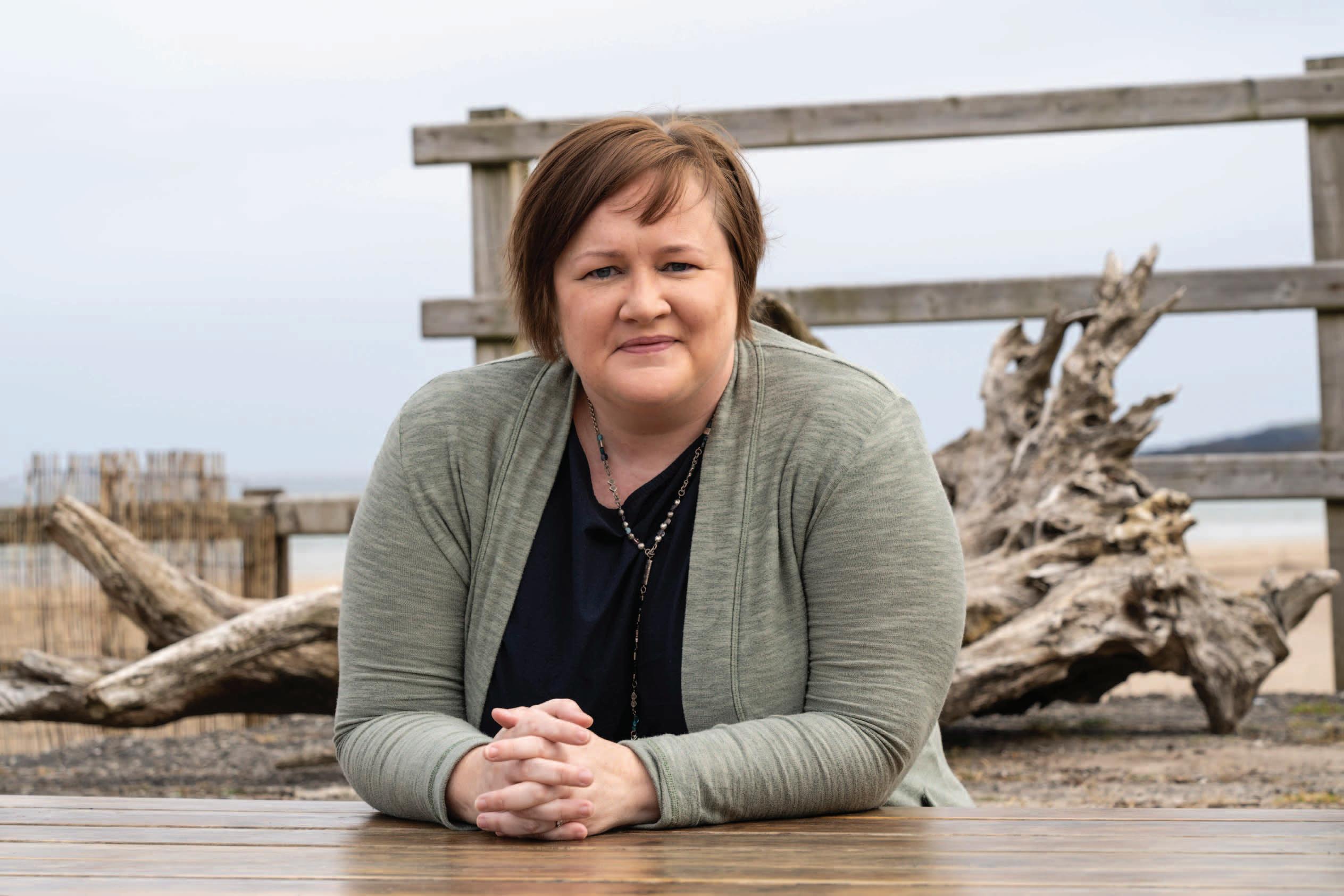
“The reason I thought this needed to be done was that a lot of the mainstream mental health charities were looking at a cure for mental health challenges, rather than a prevention which is what I believe in,” she says.
Carey further contextualises that her own personal challenges give her a unique perspective in empathising with her clients and patients. “I had always been healthy and never struggled with my own mental health, but after a very serious medical negligence case when I was aged 33, I could not have any more children and I was subsequently diagnosed with PTSD.
“Through my own experiences, I have been able to directly empathise with the people I help and I was able to help people and engage with them personally.”
She further explains how this experience, along with her philosophy on mental health, has shaped the approach taken to the provision of mental health services by The Hummingbird Project.
“We are all about ensuring that people who need our help are able to come in, be treated with respect, and work with us collaboratively, rather than the traditional methods of sticking to a by-the-book, procedural means where it is almost like the person is being talked down to. That has been the mission from the start.”
Being a social enterprise, according to Carey, has allowed The Hummingbird Project to work with “people in that space of the spectrum outside those who are already unwell with other corporations to make their staff healthier and their organisation healthier as a result”.

Leigh Carey, CEO of The Hummingbird Project, tells Joshua Murray about the organisation’s role as a thought leader in the mental health space, the challenges of operating a social enterprise in Northern Ireland, and her ambitions for growth.
She also states the benefit of the model as meaning that The Hummingbird Project is not reliant on government funding.
“The way in which government asks and allocates funding can come down to a numbers game. What we wanted to do was quality work; using the social enterprise model meant we were not forced to adapt our projects to fit the needs of funders,” Carey says. “That piece of work is worth doing. We would rather be able to selffund. The model allows us to make money for ourselves to ultimately be self-sustainable.”
Articulating her belief that there is not enough government support to foster the growth of the social economy, Carey says: “The social enterprise space and the social economy is lagging in Northern Ireland behind the rest of the UK. Work needs to be done there so that we can clearly outline what social impact is and its benefits for organisations.”
Central to the outlook of mental health support for The Hummingbird Project, Carey explains, is covering “the whole spectrum of mental health”. She emphasises the importance of The Hummingbird Project’s 3U-Model©, which she explains allows people to “change and embed their lived experience in that idea, developing a collaborative relationship with either a group of people or an individual to work on their own recovery”.
“A lot of organisations only work with people who are unwell, but what we see is that if you are only working with people who are unwell and getting to the point where they’re getting a bit better, you are not addressing the issue.
“You need to work, yes, with those who are unwell, but also work with organisations in partnership and with people who have gone through things in their lives which make them more vulnerable to becoming mentally unwell and working with them to increase resilience,” she says.

“A lot of the work we do is about empowering people to be aware of their own circumstances and understand how they can stay well, do work with corporates and train with managers in order for them to be able to look after themselves and be able to better engage with their staff and get at this early rather than waiting until they are off sick. It is about trying to cover that spectrum of services to enhance early prevention and work with those who are unwell and get them back into recovery space.”

Concluding, Carey calls on decision-makers to update their models for mental health services in Northern Ireland.
“Our role has always been around accountability. Do not make decisions for people if you have not been on that journey. You need to involve people who are at the mercy of the decisions you are making if they are to work on the ground.”
Continuing the accountability theme, Carey adds; “With every piece of work we do, an evaluation is done because we need to be able to show that whether it is private or public money, that the work made a difference. There is no point in investing in systems that you have no idea whether it will work or not.”
we have found goodwill and understanding around the policy. There is growing awareness of the full benefits, with contracting authorities keen to deliver meaningful social outcomes that tackle local problems and act as a catalyst for action from all stakeholders. These combined efforts can align to help contracting authorities achieve their environmental, social and governance (ESG) aims.
Northern Ireland may have arrived at the social value agenda later than the rest of the UK, from a policy point of view, but we stand to benefit from the key asset of lessons learned elsewhere. Certainly, at Faithful+Gould we have spent over 10 years embedding social value into our own business strategy and helping clients do the same, learning a great deal in the process. Managing social value is the next critical step in achieving intended outcomes. This next phase, for all contracting authorities, local councils, and other public sector bodies, is therefore a time of learning how to manage social value and suppliers effectively.
It is over a year since mandatory social value scoring became applicable to public procurement contracts. Government tenders must now allocate at least 10 per cent of total award criteria to social value, where Public Contract Regulations apply.

When we consider that the Northern Ireland Executive spends circa £3 billion a year on goods, services, and essential construction and engineering projects, we now have a great opportunity to use
that public spend for the common good –making a real difference to individuals, communities, and small businesses.
There is a general consensus that the social value policy has landed as smoothly as could have been expected, embedding neatly into the procurement process. Taking the temperature among Faithful+Gould’s public sector client base here in Northern Ireland, where we support clients with the management of construction and infrastructure projects,

Building ethical and resilient supply chains is one of the four key scoring themes and there is work still to be done on this. Northern Ireland’s 840 social enterprises, like many SMEs and microbusinesses, need support to tailor and market their social value offering. By doing so, smaller businesses have the potential to win reserved contracts and become a supply chain partner for public contracts.
Smaller businesses can help established supply chains to diversify and innovate around new ways of contract delivery, bringing fresh ideas and efficiencies, addressing supply chain risk, and
Contracting authorities understand and want the benefits of social value through public procurement. To achieve this, the focus must shift to managing and measuring the process, writes Brendan Gallagher, Social Value Manager at Faithful+Gould.
availing of emerging opportunities. Supporting lead bidders in their delivery of public contracts, in a more social, economic, and environmentally efficient way, is a great way to build new business partnerships, thus removing one of the barriers to smaller businesses’ full participation in the market. Our team is building a collaborative partnership with Social Enterprise NI to help the social enterprise sector maximise these opportunities.
Managing and measuring social value makes the public spend work harder for local communities, but management and measurement skills are still maturing. The overriding challenge now is for contracting authorities to build, manage, and measure social value strategies that achieve the most impactful outcomes from their procurement and subsequent contract delivery activities.
Authorities should consider social value as early as possible, to identify which themes, initiatives, and intended outcomes are most relevant. If early community engagement and pre-market engagement are not carried out at the early stages of public procurement, it is all too likely that social value delivery will become a tick-box exercise, where supply chain commitments are disparate, uncoordinated, unmeasured, and short-term. All suppliers generally want to fulfil their social value obligations (as well as being legally contracted to do so), but they perhaps lack the experience, resource, and time to deliver meaningfully.
Yet with a more strategic approach and proper management, innovative, and long-term outcomes are possible. The innovation often derives from collaboration, potentially among all delivery partners, contracting authorities, local agencies, voluntary, community and social enterprise organisations (VCSEs), local residents and business stakeholders. Authorities are typically time-pressured when it comes to bringing those partners together, but investing time in this can result in a network of trusted brokers and an informed pipeline of beneficiaries.
While innovation is both needed and welcome, applying more flexibility around the recommended
themes and guidance potentially runs the risk of subsequent challenges post award. We often see this when social value requirements are contractually agreed before there is clear understanding of local beneficiary needs and supplier capability. Interpreting the guidance, to allow both compliance and necessary flexibility, is a skill which must be mastered to produce successful solutions, such as we've seen in other jurisdictions.
Social value, applied correctly, is a ‘win, win’ scenario for all, as so many positive outcomes can be achieved. However, the journey from procurement to social value delivery takes time, learning, collaboration, and resource. Our social value advisory service in Northern Ireland manages social value delivery in a way that identifies appropriate social value opportunities through procurement and aids meaningful outcomes for the contracting authority. Not only does this assist local communities and economies, it also ensures contracting authorities’ statutory compliance, reinforces their ESG, and facilitates future business cases and funding bids. This is our chance for public contracts to play a more strategic role in solving the social challenges of our time – let’s make it work.
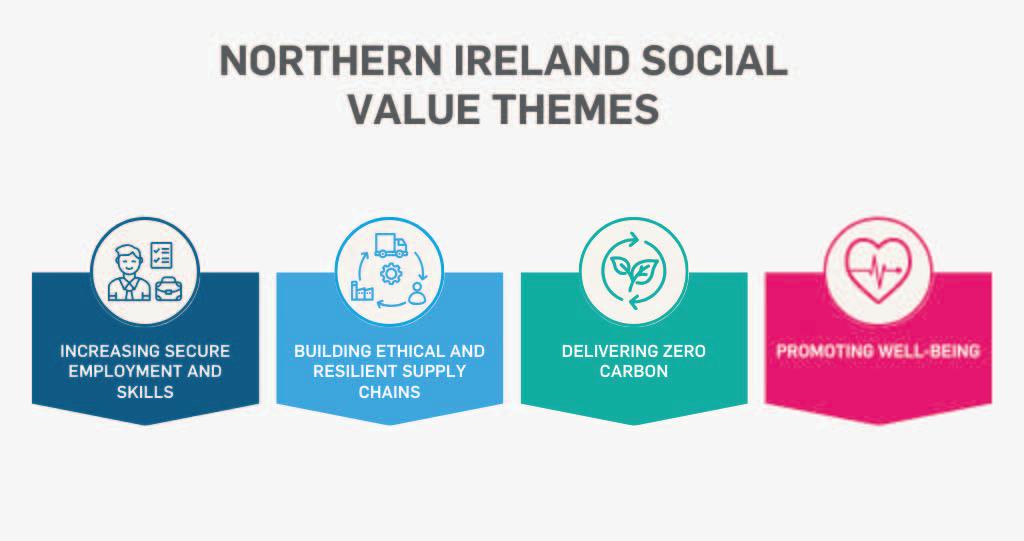
T: 074 4246 3319
E: brendan.gallagher@fgould.com

W: www.fgould.com
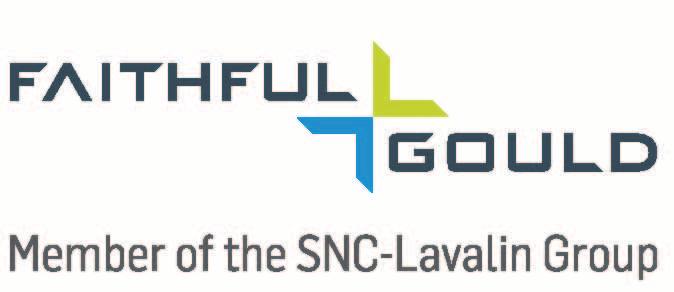 Brendan Gallagher, Social Value Manager, Faithful+Gould.
Brendan Gallagher, Social Value Manager, Faithful+Gould.
The establishment of an all-island social enterprise forum could help consolidate collaboration and enhance the alignment of data collection exercises, according to the Irish Government’s national advisory body on social and economic issues.

Whilst the report acknowledges that there is a reasonably strong level of cross-border collaboration in Ireland, the National Economic and Social Council (NESC) states that the establishment of the forum could greatly enhance the level of collaboration.
It is recommended that any such forum would include the national social enterprise networks Social Enterprise Republic of Ireland (SERI), Irish Social Enterprise Network (ISEN), and Social Enterprise NI (SENI).
“An all-island forum would help to consolidate collaboration and provide opportunities for additional activities and supports to social enterprises operating on an all-island basis,” it states.

Another area identified for potential for expansion is increasing cross-border alignment of data collection exercises. The last survey of social enterprises in Northern Ireland took place in 2018 (and reported in 2019) and the only national survey of social enterprises in the Republic took place in 2022 (due to be reported in 2023).
The report asserts: “In future, it would be useful for these two exercises to coincide and to collect comparable data to inform an all-island picture of the scale and nature of social enterprises across the island.”
There is an opportunity to develop a co-ordination framework for greater cohesion on the development of social enterprise on the island of Ireland, according to an Irish Government advisory body.Credit photo: Paul Lindsay
The report was part of NESC’s work for the Shared Island Unit in the Department of the Taoiseach, with social enterprise being one of a number of areas considered in the Irish Government’s Shared Island Initiative.

Explaining that the role of social enterprises is growing both on the island of Ireland and internationally, the NESC report states that developing a cross-border social enterprise framework “would assist in bringing greater awareness and understanding to the role and potential of social enterprise”.
“The development of a co-ordinating framework would bring a cross-government perspective and would set out the main stakeholders and supports for social enterprise, yet allow some self-definition within the framework to encapsulate the diversity of social enterprises.”
In order to develop said framework, the NESC report outlines that there is still a need for clarity on the definition of social enterprise, explaining that the most productive solution is to retain the definition set out by the Irish Government’s National Social Enterprise Policy, but that there is a need to “set out clearly how it will be interpreted in practice, and how social enterprise sits within the broader social economy”.
As a relatively fledgling sector across the sector, the NESC asserts that “funding and financial support are critical to social enterprises for startup, scaling, sustainability, and in some cases for viability”. Currently, various sources of funding are available, from grants and loans, from the Irish Government, from social enterprise funders, from
the European Union, and from philanthropists and trusts. The report states that the introduction of a “catalogue setting out the roles of the various funders and what is available would be helpful”.
Another goal which would be worked towards by the prospective co-ordination framework would be ensuring that there is support for volunteers. “Volunteers,” the report explains, “are an integral part of social enterprises, both for governance and for activities within enterprises.
“Attention needs to be given to recruiting, supporting and retaining volunteers to enable social enterprises to function effectively.”

The NESC states that various measures need to be taken to build on current initiatives and to progress new areas ripe for development. “The support of public organisations, the private sector and the third sector, including social enterprises themselves, will be required to achieve this,” the report says.
According to the NESC, there needs to be a stronger focus on enterprise, with the report stating that “there is a general sense that the enterprise side of social enterprise could be further developed”.
With an acknowledgement that the Irish Government’s White Paper on Enterprise recognises social enterprise as an integral part of Ireland’s broad enterprise landscape, the NESC report states that “additional mechanisms and approaches are required from the enterprise sector to support social enterprises, through organisations such as Enterprise Ireland and the LEOs, where there is a need for greater consistency across the country”.

interplay between construction, society, and the environment, contractors can elevate social value to a fundamental facet of modern construction practices. Established to modernise and improve the way public sector construction projects are procured and delivered, the SCAPE construction framework presents a strategic approach that delivers exceptional value across every aspect of construction. At its core, the framework is committed to fostering local economic growth and generating community benefits. By implementing essential projects at the utmost level of quality, the framework also focuses on a crucial principle: ensuring that the financial resources allocated to these projects remain within the local economy. One of the standout features of the SCAPE framework is its emphasis on creating a positive impact on the communities where projects are executed. This is not solely about completing projects efficiently; it is about maximising the positive ripple effects within the local area. By sourcing materials, services, and expertise from local businesses, the framework bolsters economic growth and empowers nearby businesses, social enterprises, and people.
It plays a pivotal role in enhancing the sustainability and success of the projects themselves.
Social value in construction through the use of the SCAPE construction framework and the merits of adopting a
comprehensive perspective when approaching infrastructure projects enables these projects to yield outcomes that surpass mere monetary value.
By harnessing the full potential of social value and acknowledging the intricate
Furthermore, the SCAPE framework prioritises a strong connection with the local community. This involves engaging with the local community, understanding their needs, and tailoring projects to align with their aspirations. By integrating local insights and perspectives, the framework ensures that projects are not just built, but are woven into the fabric of the community, contributing to its overall wellbeing.
A distinctive hallmark of this approach is its unwavering commitment to fairness
Incorporating social value into construction projects offers advantages beyond the function of the construction project providing economic value to communities and stakeholders involved, writes Chris Boyle, Framework Director at McLaughlin & Harvey.
and inclusivity. Recognising the significance of small and medium-sized enterprises (SMEs) within the local economy, the framework is dedicated to supporting these businesses. This involves not only fair payment terms but also active engagement and investment in local SMEs, helping them thrive.
In essence, the SCAPE framework represents a holistic strategy that exceeds the traditional metrics of time, cost, and quality. It encapsulates a comprehensive vision that integrates economic growth, community enhancement, and equitable engagement. By channelling resources back into the local economy, collaborating closely with the community, and ensuring fairness for all stakeholders, the framework sets a commendable standard for the construction industry.
The SCAPE framework uses the national Themes, Outcomes and Measures (TOMs) framework to measure and report on social value outcomes. This emphasis on social value outcomes as a key component of overall project success reinforces the importance placed on the work by SCAPE, us, and our clients.
As an active partner within the SCAPE Scotland and Northern Ireland construction frameworks, McLaughlin & Harvey's commitment to social value is integral to its operations and is at the heart of our approach to these projects. To date, we have completed 10 projects with five more currently on-site. These include projects in healthcare, higher education, and schools, to name a few.


Our dedication to social value extends to communities and the broader economic landscape of our project areas. We prioritise utilising local subcontractors who hire local talent, thereby reinvesting in regional economies. This dual approach generates both individual economic activity and community growth.
Engaging with locally based suppliers for building materials contributes to bolstering local economies, ensuring the benefit remains within the communities we work in.
McLaughlin & Harvey commits to spending 0.2 per cent of the contract
value on social enterprises. This allocation supports organisations engaged in community-centric or charitable work. An exemplar of this commitment is our partnership with a social enterprise that employs disabled and vulnerable individuals in high-quality manufacturing of bespoke doors and furniture.
Our efforts extend beyond economic support to charitable initiatives. For example, we collaborate with organisations that aid women's reintegration into the workforce after incarceration and champion the fight against modern slavery. The scope of our social enterprise engagement showcases our multifaceted approach to social value.
Recently, in collaboration with students at Abertay University, we created an
interactive game using Revit models to aid children with additional support needs (ASN) transition to a newly built school. Additionally, we organise regular visits to our construction sites for school children, fostering educational and experiential engagement.
By intricately weaving social enhancement into our SCAPE projects, we ensure our footprint leaves behind a positive community impact while driving economic growth and inclusivity.
For more information about McLaughlin & Harvey or to discuss a project, visit:
www.mclh.co.uk/scape-constructionframework
King’s Buildings Nucleus, The University of Edinburgh.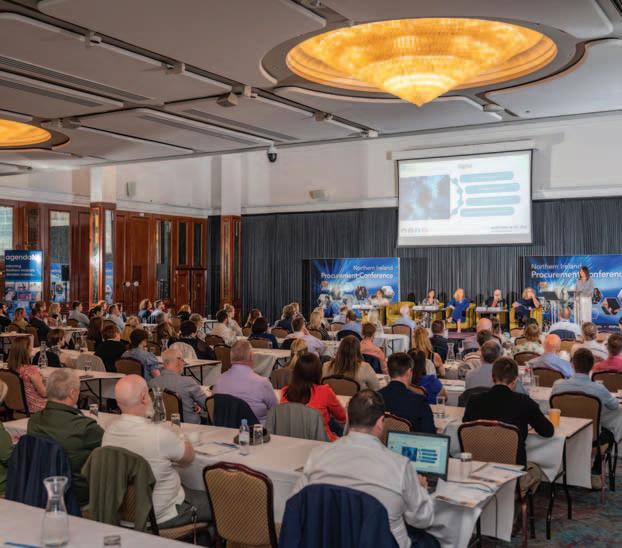



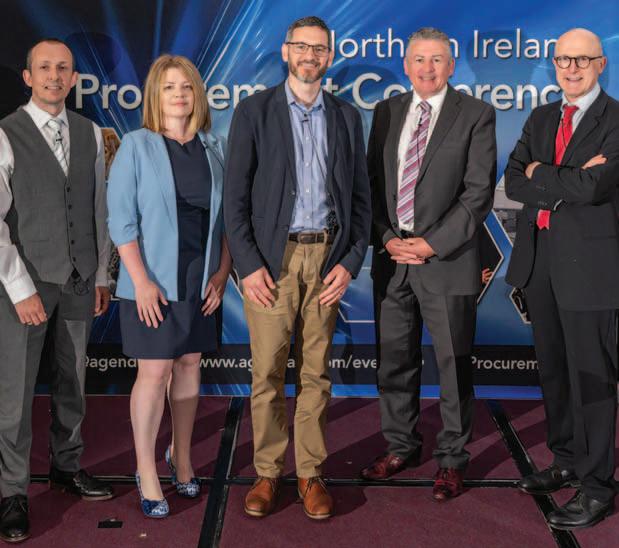
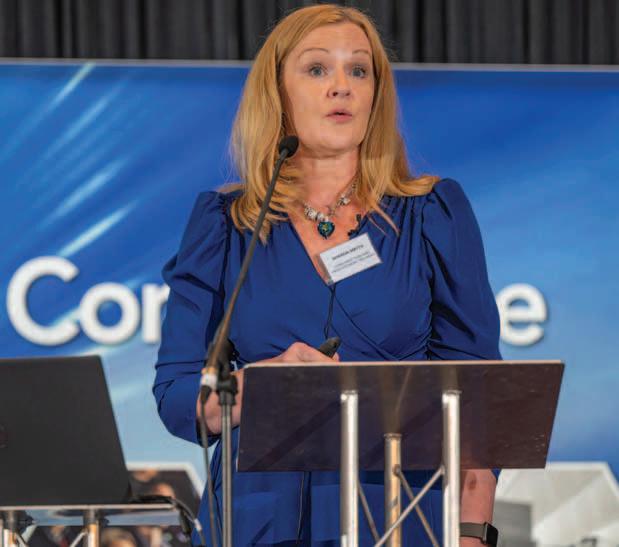

The Northern Ireland Procurement Conference took place in the Europa Hotel, Belfast on Wednesday 7 June. The event brought together over 150 procurement professionals who gained an insight into what effective public procurement means for organisations in Northern Ireland. Expert speakers included Sharon Smyth, Construction and Procurement Delivery (CPD); Eilis Kelly, Northern Ireland Water; Nikki Archer, Scottish Government; and David Russell, Northern Ireland Human Rights Commission. A massive thank you to our conference exhibitors, speakers and delegates who joined us and made the conference a huge success.
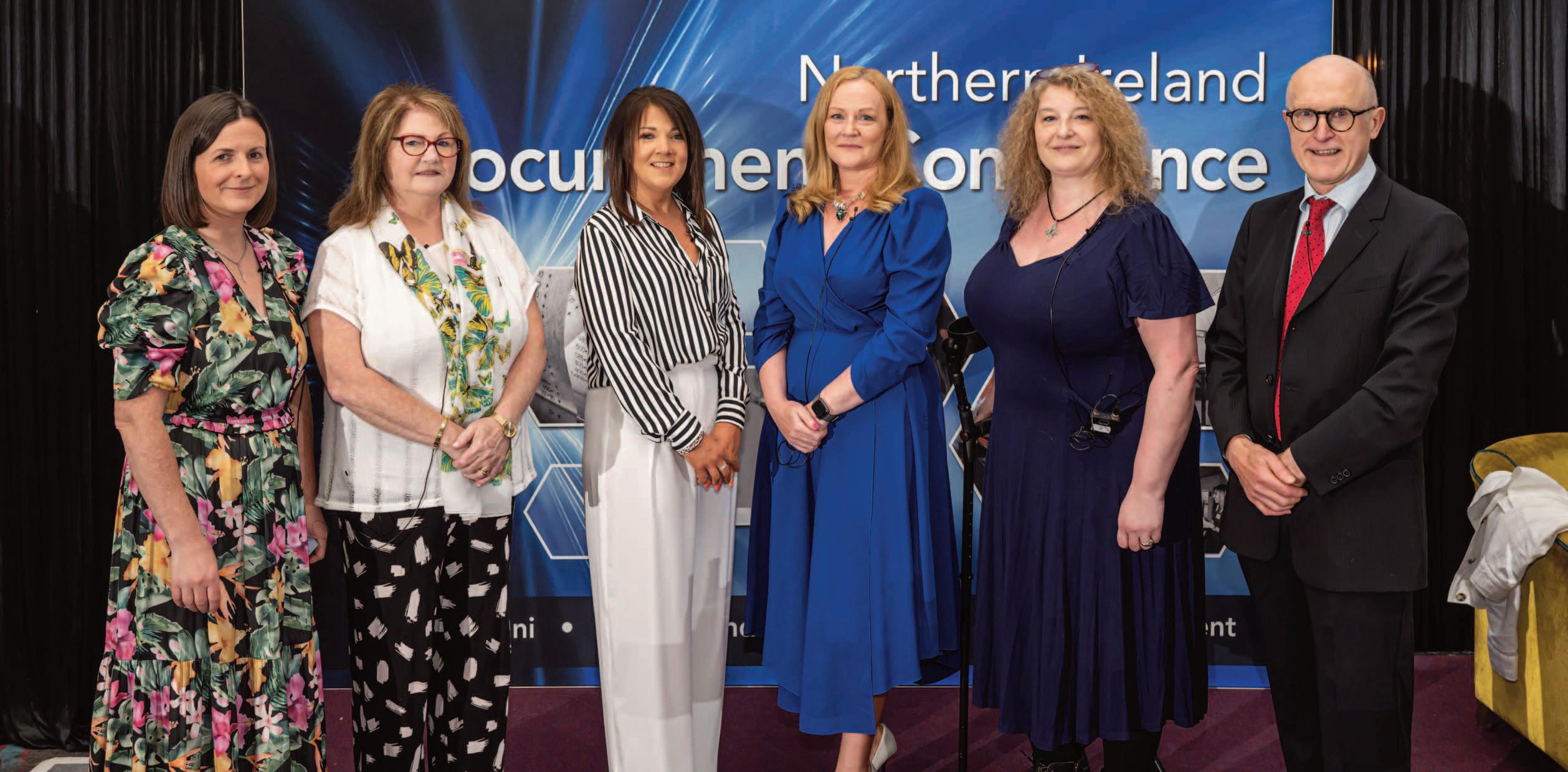 Lisa Beers, Strategic Investment Board; Frances Meehan, Education Authority; Linda O’Hare, Business Services Organisation; Sharon Smyth, Construction and Procurement Delivery (CPD); Nikki Archer, Scottish Government; and Jamie Delargy, Business Broadcaster.
Sharon Smyth, CPD addresses delegates.
Barry Neilson, CITB NI and Lisa Beers, Strategic Investment Board.
David Russell, Northern Ireland Human Rights Commission; Zöe Vennard, Armagh City, Banbridge and Craigavon Borough Council; Richard Good, The Turnaround Project; John Coyne, Welsh Government; and Jamie Delargy, Business Broadcaster.
Lorcan Perry, PwC and Frances Meehan, Education Authority.
Northern Ireland Procurement crowd.
Lisa Beers, Strategic Investment Board; Frances Meehan, Education Authority; Linda O’Hare, Business Services Organisation; Sharon Smyth, Construction and Procurement Delivery (CPD); Nikki Archer, Scottish Government; and Jamie Delargy, Business Broadcaster.
Sharon Smyth, CPD addresses delegates.
Barry Neilson, CITB NI and Lisa Beers, Strategic Investment Board.
David Russell, Northern Ireland Human Rights Commission; Zöe Vennard, Armagh City, Banbridge and Craigavon Borough Council; Richard Good, The Turnaround Project; John Coyne, Welsh Government; and Jamie Delargy, Business Broadcaster.
Lorcan Perry, PwC and Frances Meehan, Education Authority.
Northern Ireland Procurement crowd.
Seamless, reliable supplier relationships. That is usually the main aim for businesses and authorities looking to partner with external providers. But what if those relationships went further than contract delivery and brought added value to communities and those in society who need extra support?
The advantage of external contractors is of course to bring in expertise and specialist support to deliver. idverde is well known for landscaping and grounds maintenance support across the UK and Europe and has been supporting the Northern Ireland Housing Executive since 2016. Since 2017, we have also been known for our contribution to Northern Ireland’s social enterprise agenda.
“It started six years ago with Enviro Care, a social enterprise based in west Belfast. They provide a vital service within their community, supporting participants who have no experience of employment to try outdoor work as a gateway to changing their lives,” explains Gemma Fawcett, idverde’s Sustainability Manager.
“We quickly realised idverde is perfectly placed to provide work, skills, and training to those who, for whatever reason, have struggled to get work elsewhere.”


That was the catalyst to team up with Social Enterprise Northern Ireland (SENI) who signposted Fawcett and her team to many other local social enterprises. These groups have since become embedded within idverde’s supply chain, bringing more value and opportunity than had been first realised.
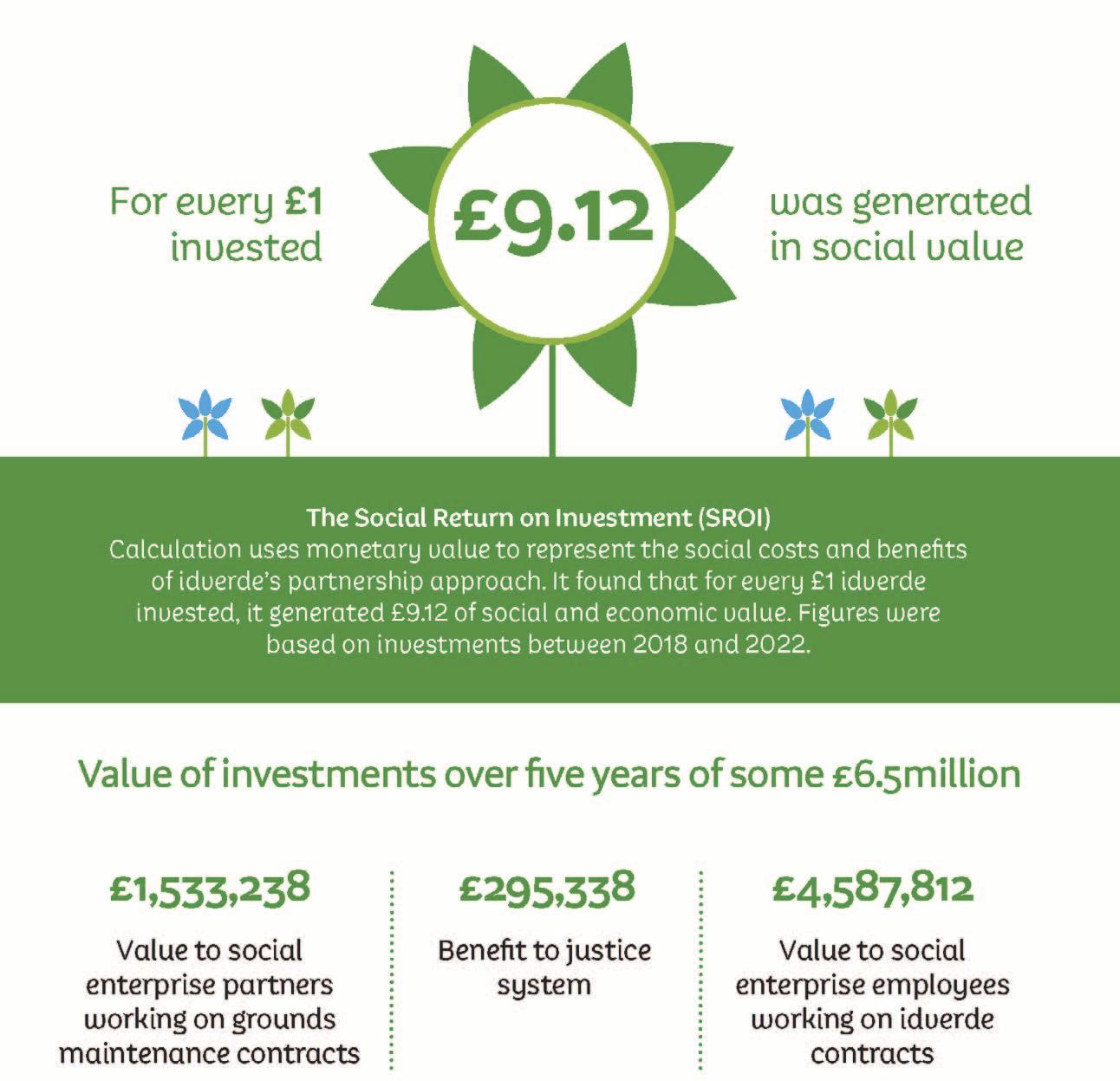
“We realised that because grounds maintenance has a relatively low barrier to entry, we could reach those with varying challenges who are often excluded from the workplace. With the added benefits of working outside on
mental health, we realised that if we provided strong support, we could help more people back into work”, continues Fawcett.
Groups like the Turnaround Project, who help ex-offenders back into work, Orchardville, who support people with learning difficulties and autism, and The Resurgam Trust, who support communities facing deprivation, have all benefited from partnering with idverde.
Bronagh Vallely, idverde’s Commercial Director for Northern Ireland is quick to reflect on the joint value. “It is fair to say we have benefited from the diversity of colleagues in our teams. We learn something all the time. In fact, now when we have a procurement decision, we first look for a social enterprise who can provide the service or solve the problem.”
Gauge Impact social enterprise, has evaluated the impact of the partnership with idverde. It makes compelling reading and cements idverde as a firm asset in the community, delivering far beyond expectations.

While idverde is well positioned to develop these links, there is potential for all contracting opportunities. Imagine the impact if all supplier and contractor partnerships went beyond the expected.
For more ideas and an insight into our work, speak to idverde before your next tender opportunity. www.idverde.co.uk


Gemma.fawcett@idverde.co.uk


Mind Skills Training hosted a round table discussions with stakeholders from across the mental health sector to discuss how the system is coping with the current crisis and assess what needs to be done to improve services and prevent suicide.
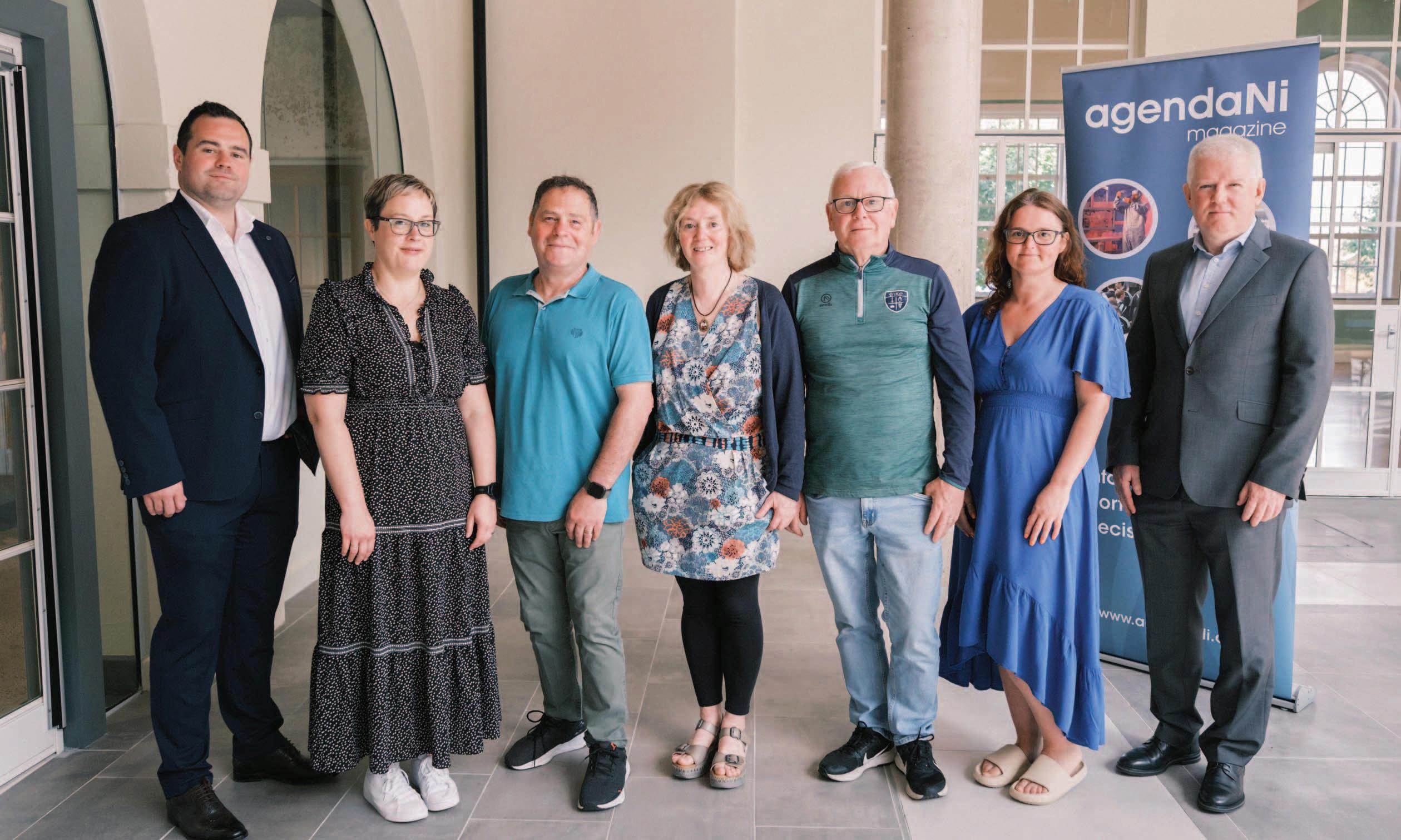
What is the social and economic impact of poor mental health in our society?
Jake Mac Siacais
I believe the impact occurs across three levels. The first is the large financial cost to society, with the Mental Health Foundation’s latest report conservatively estimating that to be £3.4 billion per annum. The second, and larger impact, is the human cost. That human cost accelerates and deepens the more an area slips into deprivation and distress, as the poorest in society are often least capable of dealing with crises. The third is the impact on the values of society as a whole. Historically, we were a
collective, caring, and family-orientated society but that is no longer the case. Social and human distress is evident when walking through this city and crisis levels of poor mental health are impacting on our collective values.
Karen Hall
That £3.4 billion per annum economic cost was flagged by the author to be conservative but it is a staggering figure which we have used to make the argument for a greater focus on preventative services. In economic terms, that cost can be broken down into things like lost productivity, or the cost of care, but ultimately, it is about the impact on the individual and then
the ripple effect on their family, community, and wider society, much of which is impossible to gauge. The evidence shows that targeted investment in prevention can have huge economic and social returns.
Sara Boyce
PPR’s ‘New Script’ for mental health campaign aims to flip this question on its head by looking at what is driving our enduring and permanent mental health crisis, rather than what the cost of it is. At a time when there is much debate around the 25th anniversary of the Good Friday Agreement, the evidence is incontrovertible that little has changed in relation to the geography of deep levels of inequality. International research highlights that inequality, and poverty linked to inequality, are large drivers of poor mental health. However, existing policies, such as the Mental Health Strategy and the Suicide Prevention Strategy, take a one-size-fits-all approach. That focus on areas of deprivation is lacking in the analysis.
Philip McTaggart
Mental health provision is drastically underfunded and as a result individuals, families, and communities have borne the impact. The implementation plan for the Mental Health Strategy outlined a funding requirement of £1.2 billion over 10 years, which has not yet been secured. However, even if available, given that the annual health budget is in the region of £6 billion per annum, it means that funding for mental health will only account for around 2 per cent of the overall health budget over the next decade. When you consider that for England and Wales, that figure is about 13 per cent, you can see that the scale and impact of the mental health crisis is not being reflected in the resources available to tackle it. Failing to adequately provide mental health services has a ripple effect economically and socially, which goes far beyond the individual.
Karen McMillan
The economic impact of poor mental health is far-reaching. Evidence shows that the cost of treating someone who becomes unwell from mental health can exceed treating physical ailments. However, the social cost is even greater, a feature which is especially prominent in areas of high inequality. Poor mental health can be transgenerational, as shown by the fact that we have young people who never lived through ‘the Troubles’ and yet still suffer its traumatising effects. In mental health services, we aim to deliver care in a biopsychosocial model. However, I believe there are opportunities for more effective, efficient, and creative models, combining our services so they are more accessible and holistic. That has to begin with education, consistent messaging, and the development of our social understanding of illness, prevention, and treatment.

Philip McTaggart
you would highlight?
It is very difficult to judge capacity on a regional basis because the reality is that there is a postcode lottery for services, and the longest waiting times tend to be in the most deprived areas. You are three times more likely to die by suicide in areas of high deprivation than an affluent area. We need the services to improve in the areas where we know the problems are. That is the gap. A GP in west Belfast, one of the most deprived areas in the North, recently spoke of how the sizeable waiting lists for talking therapies for his patients meant that he felt compelled to prescribe medication, because it was the only near-term treatment option available.
Sara Boyce
More often than not, the conversation around gaps in mental health services focuses on funding, which is understandable given the derisory budget allocation. However, there are evident gaps that exist beyond capacity. All too often, we are hearing from service deliverers and those using services that people are being failed by the system. Potentially underpinning the reason why, the recent Northern Ireland Audit Office report on mental
Sara Boyce
Sara Boyce is a Mental Health Rights Organiser for Participation and the Practice of Rights (PPR), a human rights NGO. Prior to joining PPR in 2016, Sara worked on both sides of the Irish border with a range of community and human rights organisations, including with Traveller groups and children and young people’s organisations.
Karen Hall
Karen Hall was appointed Head of Northern Ireland at Mental Health Foundation in March 2022. She has over 20 years of experience working in social justice, disability, and human rights in Northern Ireland.



Jake Mac Siacais
Jake Mac Siacais is Director of Forbairt Feirste and a community activist who has spoken openly about his experiences of depression. He was previously a Deputy Editor for the Belfast Media Group.
Karen McMillan
Karen McMillan is the Towards Zero Suicide Service Improvement Manager at the South Eastern Health and Social Care Trust.
Philip McTaggart
Philip McTaggart is the founder of suicide prevention charity PIPS and manager of Mind Skills Training. He is a professional training facilitator and Life Coach and was the founder of one of Northern Ireland’s first suicide awareness organisations following the loss of his son to suicide in 2003.


health services came to a shocking conclusion that the data was not available to evaluate the effectiveness of services in improving people’s mental health, and in particular to provide evidence on what works. It added that the Department and the trusts remain ‘unsighted’ as to whether the services provided represent value for money, which raises the question as to what the direction of travel set out in the decade-
long Mental Health Strategy is based on. Add to that the recent revelation that there has been no oversight of community mental health services since 2009 and you can see that there are serious gaps that go beyond the challenges of finance and waiting lists.
Jake Mac Siacais
The Audit Office report was shocking and essentially said we have bean counters counting the wrong beans. Any data that does exist is being viewed through a system without any qualitative data surrounding it. When the reality on the ground is that people are struggling to access services and where prescription drugs are being traded illegally, it is nothing short of a scandal
that public money is being spent in a way that the public authorities cannot determine whether services are improving mental health.
Karen Hall
Transparency is a massive gap. For the community and voluntary sector, getting funding to deliver vital mental health services is a constant battle. Funding is often centralised within the health system, but why, if we have no transparency on what is working? I think the solution requires a transformation away from the medical model we have and towards community response. Someone seeking support is far more likely to approach a local service than attend A&E, so it is time to have the conversation about how we shift that money into areas where the drivers of poor mental health, such as unemployment and poverty, are recognised and can be best addressed.
Karen McMillan
In the South Eastern Trust, we collect quantitative and qualitative data, which includes service user feedback and engagement. This information helps us with service planning and delivery at a local level. Take our Mental Health Wellbeing Hub as an example of talking therapies. By way of example, an individual referred from a GP is seen within three weeks currently, getting six sessions with a counsellor provided within the community and voluntary sector. Across the region, Trusts are looking at an outcomes and accountability framework that involves service users. I believe that one of the best ways of knowing that a service is working is by hearing feedback from those availing of the service.
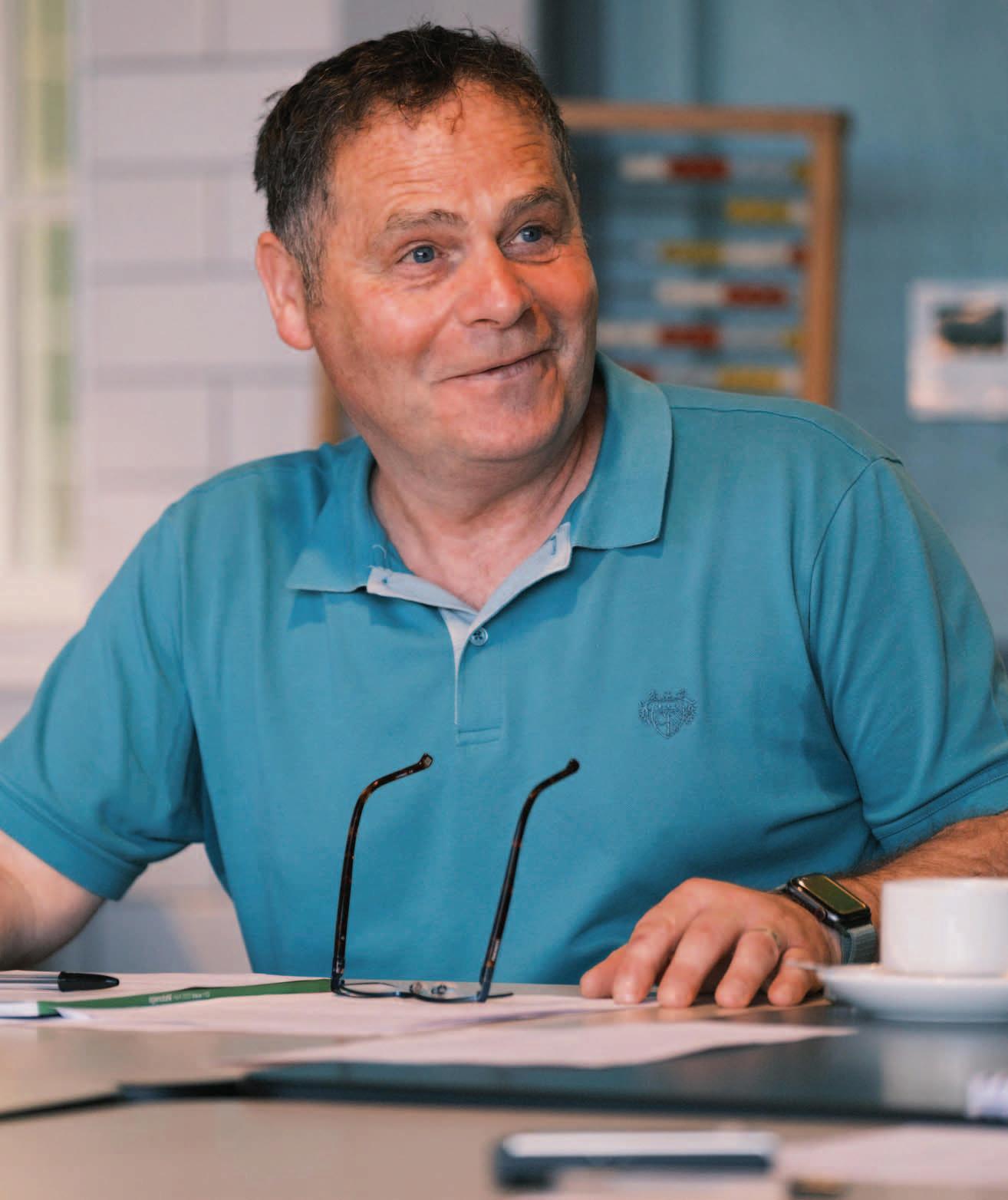

Jake Mac Siacais
I had a mental health crisis in 2016 and my personal experience was that I was given medication that did not work and put on a waiting list that made support unattainable. I was forced to go privately, which is not an option available to most people, especially given the link between poor mental health and areas of deprivation. One of the things I noticed when talking about my situation was the sheer volume of others who felt similarly and how widespread the problem was. Their experience tended to be an unending roundabout of stop-gap measures with no incentive to get off and
“It is very difficult to judge capacity on a regional basis because the reality is that there is a postcode lottery for services, and the longest waiting times tend to be in the most deprived areas.” Philip McTaggart
no community support network to encourage that. There is an epidemic of poor mental health in these communities and the services are not meeting the needs.
Philip McTaggart
The phrase I use is smiling depression. In my own experience of poor mental health, I remember questioning why I was the only one feeling like this while looking at others around me. It was only after hearing other people’s experiences that I realised the sheer volume of people suffering in silence and masking their feelings. In terms of access, it is very obvious that we have a system that is not tailored to individual needs. A model that sets out the amount of counselling sessions an individual will get even before they have been assessed is not needs-based. Similarly, a system that sees an individual have to re-tell their issues to different counsellors
every time is not trauma informed. When the system works, it works well, but it is not designed to meet the volume and diversity of current need.
Sara BoyceAll too often the approach is a medical one, be that anti-depressants or a waiting list, and not enough attention is paid to the fundamental importance of human connection, of building relationships and trust. The number of anti-depressant prescription items dispensed in Northern Ireland has increased fourfold from 2001 to 2022, at a cost of around £13 million annually. Could some of that money be better spent in community services? Our New Script campaign has gathered over 200 testimonies of people’s experiences with services and an over-riding theme of those testimonies is that people want choice. They want a say in their own care, rather than to be simply put into a
system, where the dominant medicalised approach will dictate how they are treated. It is important to note that capacity is not a workforce problem, at least not in relation to counsellors. It is about where we choose to invest our resources.


Karan McMillan
By the time people access mental health services they may have been receiving treatment from their GP. Often their depression is situational, meaning that the medication will have had limited impact because the underlying causes such as adverse childhood experiences or trauma have never been effectively addressed. My experience on the frontline is that the best outcomes are often when services work well together; but all too often our community partners often have to compete for monies to continue to deliver their vital services. 4
“As part of an overall plan, investment in resources in the community will support early intervention.” Karen McMillan
There is a requirement to continue to work in a more person-centred approach, one which has full recognition of all services, statutory community and voluntary that are available and are delivered on a daily basis.
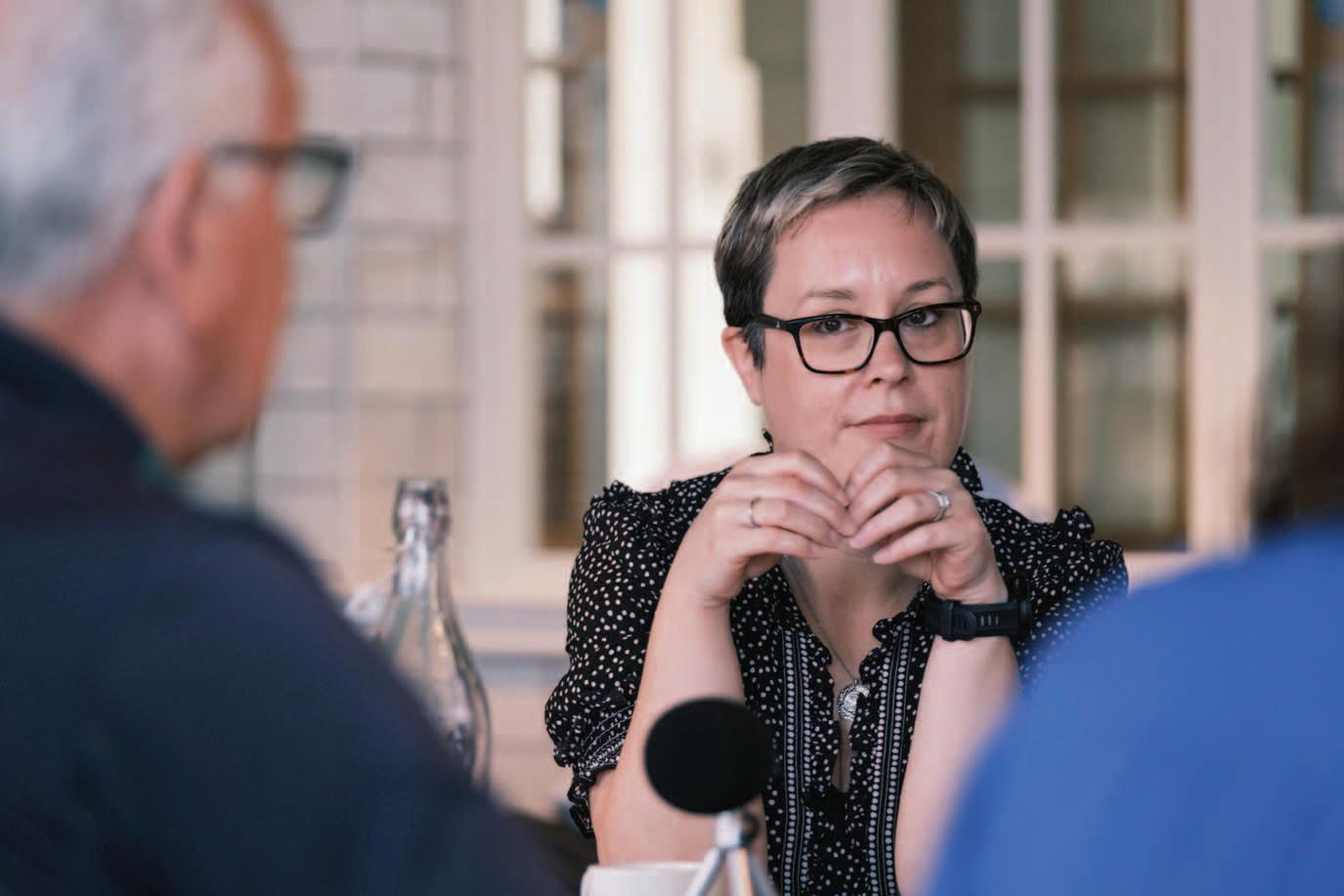


Suicide numbers have been at crisis level for some time. What needs to be done to reduce the numbers of people taking their own lives?
Karen McMillan
Seventy per cent of people who lose their life to suicide have not been in contact with mental health services. Communities need to be supported as there are people who are vulnerable and in need of help and support, which is easily accessible in the community. I have worked in the community with people experiencing mental health crises and those who have severe and enduring mental illness, working collaboratively with their families. Some of these people have to attend A&E as this is often the only accessible service out of hours. I believe there is an opportunity to
improve early access by developing concepts such as crisis café models or the further role out of MATT (Multi Agency Triage Team), which supports people in the community. As part of an overall plan, investment in resources in the community will support early intervention. Helping reduce the stigma around mental health and having those
brave conversations will support people to realise that although their circumstances are difficult, not every mental health crisis is a sign of mental illness. We also need to equip young people with the necessary social and psychological skills, to be able to identify and voice their emotions. Advocating the right service at the right time, educating
“We really need to focus on the drivers of poor mental health, such as poverty and unemployment. This is not just an individual problem but a societal problem.” Karen Hall
“We need to take human wellbeing out of a medicalised context and out into the community, where statutory medical services are interfaced with community support.”
Jake Mac Siacais
people about mental health inpatient care, home treatment, and community services will support peoples’ understanding that not every crisis requires an acute hospital admission and that alternative services provide a similar level of care at home, keeping them connected to their community. There is a clear need for statutory services, but we need to develop more prevention services that can intervene early.
 Jake Mac Siacais
Jake Mac Siacais
The number of health trusts we have for 1.9 million people is incredible. The systemised silos that have been created mitigate against delivering effective services. There needs to be political will and some moral courage to address that. We need to take human wellbeing out of a medicalised context and out into the community, where statutory medical services are interfaced with community support. GP services, community services, and trust services should be coordinated.
Karen HallWe are working with Healthy Living Centres at the moment and one of the key things identified is the number of people on waiting lists for treatment for physical health conditions. We hear a lot about waiting lists for physical treatment but nothing about waiting lists for mental health services. They are often related. We also talk a lot about individual trauma but there is also community trauma. Trauma will not go away and often becomes intergenerational. We really need to focus on the drivers of poor mental health, such as poverty and unemployment. This is not just an individual problem but a societal problem.
Sara BoyceWe need the political will to skew resources into those areas in need, which have three times the suicide rate and five times the drug-related death rate. We need to empower communities and take lessons from those instances where communities have taken leadership. For example, the Divis bridge over the Westlink in Belfast is a known suicide risk. Reducing access to means of suicide is an effective preventative measure. In 2017, the ‘New Script’ campaign worked with a local mental health group and commissioned a report with Queen’s University Belfast Science Shop, who came up with three different design modifications for the bridge. An inter-agency working group was established, but it is 2023 and the bridge still has not been modified. That is symptomatic of the lack of political will around suicide prevention. We cannot fix the existing system, which is not
working, even with more resources. We need to do something different. Communities are coming together to do things themselves as people are dying and communities are in pain.
Philip McTaggartSeventy per cent of people who take their own life are not known to the system but are known to the community. Not everyone needs to see a counsellor. Someone who can listen and show a bit of empathy, concern, and be nonjudgmental can be very effective. We all have bad days in terms of mental health. I deliver training courses, and everyone says that the first point of contact should be the GP. We need to have a different way of education in schools to build resilience. We need to build resilience in our children and help them overcome challenges.
What one service or policy improvement would you like to see implemented?

Karen McMillan
While all of the mental health policies have merit, from a suicide prevention viewpoint, implementing ‘Protect Life 2 strategy’ will underpin everything. Our ‘Towards Zero Suicide’ project should also continue to be embedded. Toward Zero Suicide needs to be delivered in partnership with the community. ‘Protect Life2’ will make a phenomenal difference if implemented fully, but it will need the resources to succeed.
Jake Mac Siacais
Education and awareness training around mental health for GPs. Also, early education programmes within schools.
Karen Hall
We need to address the drivers of poor mental health, such as poverty. We cannot treat our way out of the mental health crisis by looking only at symptoms.
Sara Boyce
Flip the script, away from a focus on chemical imbalance to a focus on power imbalance, at all levels of society. We need to move to a ‘New Script on Mental Health’ that is trauma-informed and human rights based.
Philip McTaggart
The vast majority of people who have died by suicide have gave an indication to someone in the year before they died. Education is power. If we can pick up what that person is trying to tell us; that is the first step in getting that person some help.
“We need the political will to skew resources into those areas in need, which have three times the suicide rate and five times the drug-related death rate.” Sara Boyce






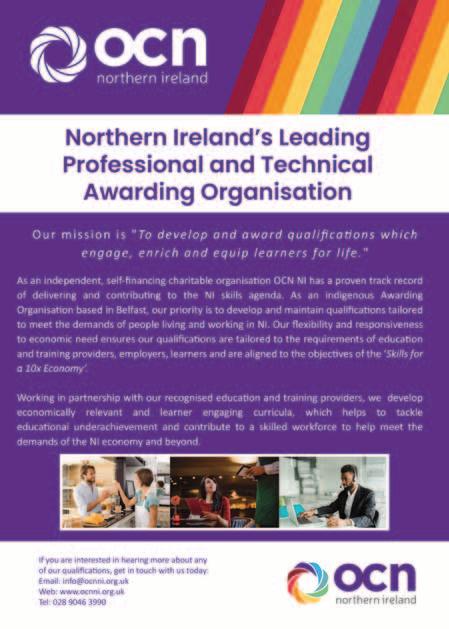




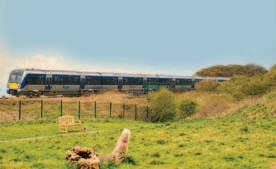




Sponsored by


Northern Ireland is a society that continues its transition to a peaceful, modern, outward-looking community. Ambitious programmes to catalyse economic growth, meet our net carbon targets and create a united community, are all important routes on the roadmap to prosperity and resilience. Matching these with a comparably ambitious education agenda is critical.
We have much to celebrate in terms of our education system in Northern Ireland. Our children continue to achieve a very high standard in comparative international studies. Our young people perform higher at both GCSE and A-level than their peers
across the UK, whilst our teaching workforce is widely recognised for its skill and expertise.
Our children get one chance at childhood and the Department of Education can help shape life chances and opportunities from their earliest years in life to young adulthood. This is a tremendous privilege but comes with significant responsibility to ensure that learning experiences and outcomes are of the highest quality for all children.
We have set out a vision that all our children will be happy, learning and
Permanent Secretary for the Department of Education, Mark Browne, discusses planned transformation in a difficult financial climate, and emphasises the importance of education investment in economic growth.
succeeding. This applies to each and every child regardless of their background, experience, or ability.
However, it is unquestionably more difficult to deliver on this vision in the current financial context. Over the last 10 years, funding per pupil in Northern Ireland has reduced by over 10 per cent in real terms, to the lowest level in the UK. This has put increasing pressure on our schools and reduced the support they can provide to our young people. It has prevented teacher pay increases for the last three years, leading to industrial action and deteriorating industrial relations. The Engage programme to support recovery after Covid and the Healthy Happy Minds Programme to promote emotional and mental wellbeing have had to be closed. School holiday food grants to feed disadvantaged children over school holidays have been ended. The capital programme to improve school premises and support delivery of the curriculum has been severely curtailed.
We need to recognise that education spending is not a cost but an investment. It is an investment in our children in the here and now and in our economy and wider society for tomorrow and beyond.
The children in our system today will be those who enter the workforce in future years and it is vital that our education system prepares them as individuals, active citizens, and economic contributors.
Evidence also tells us that investing in the learning experiences and outcomes of our children and young people recoups immeasurable benefits for society in terms of improved outcomes in health, justice, and community cohesion.
We know that targeting investment in the earliest stages of a child’s life reaps longer-term benefits for society. We are developing an ambitious Early Learning and Childcare Strategy which, if funded, would create the ecosystem necessary to give every child the best start in life.
Through the End-to-End Review on Special Educational Needs (SEN), we will refine our policy on inclusive education and redesign support models to ensure our children with SEN receive appropriate support at the earliest point possible. The focus of the review will be on
developing a high-quality, cost-effective system that is responsive to the needs of children, ensures their voices are heard, empowers our education workforce and builds the confidence of parents and families.
Increasingly, we recognise that meeting the emotional health and wellbeing needs of our children and young people is crucial to enabling them to engage fully in learning. With that in mind, we have commissioned an evaluation of the Healthy Happy Minds pilot and will draw on its findings and our learning from the rollout of the Emotional Health and Wellbeing Framework to develop a strategic approach to building the resilience of our children and young people.
We are resetting our focus around school improvement – balancing the needs of the learner with the learning experience. This will involve refreshing the current curriculum delivery model and ensuring our curriculum is relevant and fit for the needs of a changing world.
Accompanying this will be a targeted workstream on teacher professional learning that recognises the value of our teaching workforce, invests in their learning and aligns with the needs of a 21st century classroom.
We will take forward a programme of qualifications reform that will ensure that the qualifications taught in our schools are fit for a modern economy and society, and support learners on their chosen pathway.
For our 14 to 19 year-old cohort, we are pursuing a transformative agenda to ensure that young people have seamless pathways and relevant and accurate information to make good educational choices.
Setting and delivering a vision for education is both an exciting and a daunting task. There is no doubt that the current budget settlement will have a significant impact on the quality of our education services and will have the greatest detrimental effect on our most vulnerable children.
So, the Department will be focusing on shaping a strong, coherent narrative on the cross-cutting benefits and value of education and the potential costs to society if we do not invest in the right things and in a sustainable way.
I hope there will be greater recognition of the fundamental value and importance of education for our economy and society and that this will be evidenced through significant and sustained investment. This is the future that our children and young people need and deserve.
Offering once-in-a-lifetime opportunities for Northern Ireland students
Students from Northern Ireland schools, colleges and universities are set to benefit from over £10 million of funding to explore international study and skills development opportunities for a third consecutive year.
This is part of the Turing Scheme, the UK Government’s programme to provide UK schools, colleges, universities and training providers with funding for international opportunities in education and training.
The Turing Scheme unlocks the opportunity for UK schools, colleges, universities, and training providers to offer experiences across the world for their students, learners, and pupils, including the development of new skills, gaining vital international experience, and boosting their employability. They

can also develop a wide range of soft skills, language skills, and gain a better understanding of other cultures.

Applications opened for the 2023 to 2024 scheme in February 2023, with an eight-week window to submit via an online application process. This year saw a significant increase in the number of applications from all sectors and an increase particularly from Northern Ireland organisations – where for the first-time schools have been successful in the application process, along with every further education college and both the University of Ulster and Queen’s University Belfast.
Canada, Japan and the United States
Northern Ireland and the Turing Scheme
• £1.5 million funding awarded in 2021 to 2022
• £2.6 million funding awarded in 2022 to 2023
• £2.9 million funding awarded in 2023 to 2024
• More than 2000 students participating across three years
are among more than 160 international destinations where Northern Ireland students will be funded to take up work and study placements, alongside popular European destinations like Spain and France.
Locally based Capita was appointed in December 2021 to promote and administer the scheme. This involved designing and building a bespoke digital platform that could manage the end-toend application and management process. It needed to be scalable and flexible to respond to demand throughout the application window.
Drawing on in-house expertise gained from many years of work in the education sector and with government departments, Capita quickly mobilised project management, operations, digital, customer service and communications teams to deliver the programme for the 2021 to 2022 academic year and following years of the scheme.
An advisory board of key stakeholders was also established, and a partnership agreement was entered into with the Association of Commonwealth Universities (ACU) to deliver an assessment of all applications to the scheme, drawing on the ACU’s track record in assessment, delivery and evaluation of global mobility schemes.
An email-based service centre offers support and guidance to applicants and beneficiaries, with funded organisations being allocated a dedicated grant manager. There is also a range of online guidance materials, FAQs, demo videos and case studies published to support the scheme’s applicants.
This year the application process attracted more than 600 applications with over 470 being successfully awarded funding from a pot of £105 million, following an independent
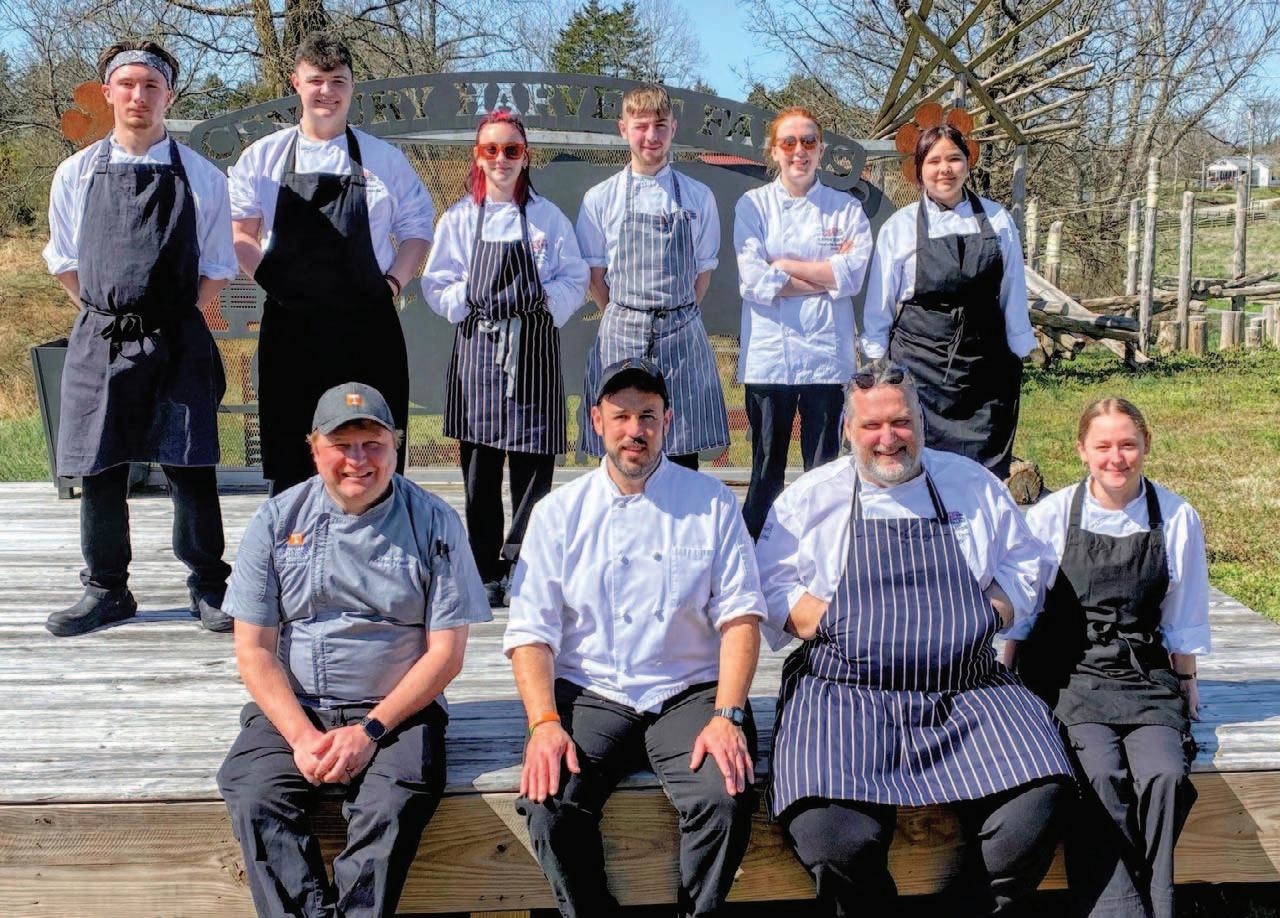
Six catering students from South Eastern Regional College (SERC) in Northern Ireland cooked up a storm after getting the chance to hone their skills with a trip to Tennessee following the college being successful in their application for Turing Scheme funding in 2022.
The party travelled to Nashville on a two-week work experience and cultural visit, designed to developed their professional cookery skills. The group spent their first week in the United States working at Dream Hotels in Nashville, before heading to Knoxville to work in the local community alongside students and staff at the University of Tennessee. The trip was the first experience outside of Europe for all the participating students and enabled the students to gain hands-on cooking experience which was limited during the pandemic.
Lecturer Brian Magill, one of the SERC team who accompanied the students, explained: “This was a fantastic opportunity for our students to immerse themselves in professional cookery in another country. Besides learning about Appalachian cuisine through essential hands-on experience in local restaurants and resorts, the students had the chance to show off some of their homegrown repertoire during festivities organised for St Patrick’s Day celebrations and to enjoy a host of US cultural activities.”
“We are very proud to support the Department for Education in delivering the Turing Scheme and delighted that, yet again, applications for funding significantly increased this year. Widening access to opportunities to study and work abroad is a key aspect of the scheme and to see that approved funding for those from disadvantaged backgrounds has also increased is particularly pleasing.
The Enniskillen-based college with 22,000 full and part-time learners has a strong focus on sustainability, both in the way it is managed, and the courses offered. Turing Scheme funding supported the college to participate in the Global Learning Opportunities Boosts Employability (GLOBE) project which enabled 16 Level 3 students on exchanges to undertake the globally recognised Passivhaus Tradesperson course.
Passivhaus is a voluntary standard for energy efficiency in building which originated in Germany 30 years ago and is now widely adopted around the world.
Eight students from SWC’s School of Built Environment undertook a three-week placement in Pittsburgh at Pennsylvania State University (PSU) which delivers a ‘Green Building’ programme and is a United Nations International Centre of Excellence for high-performance buildings. SWC students who visited PSU benefitted from access to the Global Building Network, specialising in highperformance building research and education, attended on site visits to the Frick Environmental Centre, Pittsburgh’s world-class centre for environmental education.
“The college’s core vision is to develop people and achieve potential. The Turing Scheme is a vehicle for fulfilling this vision by growing international mobility opportunities. This has supported our young people to develop personally, professionally and academically, and encouraged them to achieve their educational and professional potential,” explained Barry McCarron, Head of Business Development at SWC.
A further eight students travelled to Toronto, Canada, to participate in Humber College’s 2022 Global Passivhaus Construction Programme. They also studied the Passivhaus Tradesperson course while advancing their knowledge of green building initiatives in the country. The course centered around an in-depth study of Building NX, a retrofit of an existing building, one of Canada’s most sustainable buildings. Both partner universities are renowned for their innovative approaches to the green economy and opened international synergies with SWC students in the field of renewable energy and sustainable construction.
One participating student from SWC said: “This programme has been incredible for my self-confidence which has been noticed by my employer. As someone coming on to the high-performance building course with no background in construction, this course has shown me that my professional skills are transferable while also giving me a wider perspective of engineering within construction. Following this experience, I am considering a period of international work as it has shown me the opportunities available.”
“It is marvellous to see grants being used to offer the chance to those who might not otherwise get the opportunity to take up these exciting opportunities all over the world ”

ACU. This has been the highest number of applications in the lifetime of the scheme. More than 40,000 students, learners and pupils from across the UK are expected to get the transformational opportunity to study or work abroad from September 2023.
One of the key government objectives of the scheme is widening participation, and this has resulted in 60 per cent of overall participants across the UK and being from a disadvantaged background. In Northern Ireland more than half of the participants expected to benefit are from a disadvantaged background, offering students from Northern Ireland with an opportunity they may otherwise not get to experience.

For more information on the Turing Scheme visit:
W: www.turing-scheme.org.uk
Recognising that better skills matching would provide a significant boost to economic output, the Closing the Skills Gap report, commissioned by the Department for the Economy and carried out by Work+, has suggested that government departments with a skills responsibility should allocate skills budget based on closing the productive capacity gap and providing skills balance.
“In Northern Ireland, jobs are concentrated in small and micro businesses, with only 2 per cent of employers having more than 50 staff,” the report explains.
Drawing on policy and practice from six small, advanced economies and primary research with both supply and demand sides of the Northern Ireland skills system, the report explains that there is a need for “greater support for small and medium-sized enterprises

(SMEs) in growth sectors like FinTech and life and health sciences (LHS) to connect with career explorers of all ages”.
The report continues: “Career explorers struggle to make informed decisions and SMEs find it hard to recruit and retain talent. The Department for the Economy (DfE) should continue to develop the Northern Ireland careers marketplace with SMEs in mind, to ensure that it is relevant for both sides of the market. Employers in both sectors recognise the need to aggregate their demand with others –even competitors – to make their sector more visible.
“They are keen to build collaborative networks, initiate academies and apprenticeships but often do not know how to do this. Initiatives like The FinTech Academy should be built upon, helping to bring employers, educators,
and local authorities together to provide promotional campaigns and employment opportunities in the sector.”
DfE should, the report asserts, consider how careers services can best support economic growth whilst maintaining impartial careers advice. The Department has reported that, by March 2024, it will develop a set of common quality standards for the delivery of careers guidance in all settings.
With the increasing digitalisation of human resources and job roles specifications, there is an opportunity to better communicate jobs in term of transversal skills and aptitude, rather than generic terms and qualifications. Skills mapping of job roles could support career explorers in managing their careers and identifying the roles that are best suited to their skills and aptitude.

billion additional gross value added (GVA) by 2030 and an increase in wages and people with higher qualifications, a study has found.
Following the Secretary of State’s April 2023 Budget, the Department of Education is facing the highest real-terms spending cuts out of all devolved departments. The Department has received a funding cut of £64.3 million, which equates to around 2.6 per cent of its annual budget for the previous financial year.
Currently, the Department is undergoing a consultations process which is formally conclude in autumn 2023. The Department states that it is undergoing “the most challenging overall budget in recent history,” in which “the Department of Education, its arm’s length bodies, and third-party organisations face unprecedented funding challenges and cuts in 2023/24”.

“For the Department, the 2023/24 Budget allocation results in a funding gap in excess of £300m for 2023-24. Managing resource shortfalls of this magnitude will undoubtedly have a significant and adverse impact on the Department’s ability to deliver educational services in 2023-24,” the Department states.

A group of researchers from Ulster University, Newcastle University, Queen’s University Belfast, and Stranmillis University College have warned that the poorest children in Northern Ireland will be the most affected being brought forward.
In the absence of devolved government, Secretary of State Chris Heaton-Harris MP’s carrot and stick approach to the 2023/24 budget has seen the Department of Education bear the brunt of cuts, with the Department currently considering how best to allocate its reduced funds.
In a report entitled The consequences of the cuts to education for children and young people in Northern Ireland, researchers argue that any cost savings made in the current education Budget “will be dwarfed by the costs of poverty, deprivation, and mental health issues in the longer run”.
The researchers argue that the cuts being made in the Budget “will disproportionately impact the most disadvantaged children and young people in our communities,” and outline the set of programmes which will either be disadvantaged or ended as a consequence.
• An end to Happy Healthy Minds
• An end to Engage
• An end to the Digital Devices scheme
• An end to the Baby Book scheme
• A pause on capital development
• 28 new school projects paused
• A 40 per cent cut to Free Period Products budget
• A 50 per cent cut to the Shared Education budget
• A reduction in Nurture funding from £70 million to £62 million
• An end to schools coaching programme run by Irish Football Association (IFA) and Gaelic Athletic Association (GAA)
• An end to funding available to Young Enterprise NI
• A pause on a cashless scheme for schools
• A depletion of funding available to Extended Schools
• A significant shortfall in resource for pupils with SEN
• A pause on the recruitment of school crossing patrols
The researchers have called on the Secretary of State to “provide guidance on proposed cuts on a departmental level, in light of consultation with the Irish Government, which should respond to full public consultation on these proposals”.

“These should precede any significant changes to open-ended programmes being run by the Department of Education.”
The researchers also state that, in assessing the impact of funding reductions, “the Department of Education should take account of the high levels of disadvantage among particular minority ethnic and migrant groups and the disproportionate effects that cuts to services are likely to have on these groups”. “The Department should also recognise the interlinkages between these programmes and the risk that cuts to one area of service may affect families’ ability to access and engage with other services.”
Diane Dodds MLA, the DUP’s education spokesperson has outlined her belief that the Secretary of State’s Budget “does absolutely nothing to reverse and address the chronic underfunding of education across Northern Ireland,” further stating that “the baseline budget in recent years has been entirely incapable of meeting demand”.
Dodds further asserted: “The Special Educational Needs budget has doubled locally in the last eight years and without a corresponding uplift in the baseline there is a hole in the overall budget as a result. This proves that the current funding model is preventing public servants from proactively respond[ing] to emerging demand in our classrooms. It also curtails the Department’s ability to deliver a fair pay award to our dedicated and talented staff.”
SDLP spokesperson Daniel McCrossan MLA stated: “No amount of budgetary pressures can justify taking holiday hunger payments away from families who are struggling, counselling from children who need support with their mental health, or failing to provide the right environment for children with special educational needs. It is absolutely disgraceful that it is children who already face the biggest challenges in their young lives who are bearing the brunt of these cuts.”
With an ageing population and increasing global competition, combined with a need for Northern Ireland to reach net zero, many experts believe that people need to be encouraged to work for longer, particularly in sectors such as housing, with retrofit requirements demanding a significant output from this sector with an average workforce age above the age of 50.
More than one-third of the population of Northern Ireland is over the age of 50, with the 50+ demographic accounting for slightly below 700,000 people, which is just under 37 per cent of the population of Northern Ireland.
According to NISRA’s most recent population projection, published in 2021, the number of older people is expected to increase year-onyear. NISRA predicts that the 50+ population
will rise by roughly 208,000 people (30.3 per cent) by 2070. This increase will mainly be shown in the 65+ age group as people are living longer.
The Department for the Economy’s Older People Inequalities in the Northern Ireland Skills System report outlines four challenges to ensuring that Northern Ireland can successfully integrate older people into the workforce and thus ensure a more stable labour market for the Northern Ireland economy:
Upskilling: “As people are living longer, this increases the percentage of the workforce aged 50 and over. Companies will have to adjust to this ageing workforce. They will need to adjust how they attract, manage, and


Studies by the Department for the Economy have highlighted the need to upskill older workers and ensure that younger workers are attracted into the labour market in the aftermath of Covid-19.
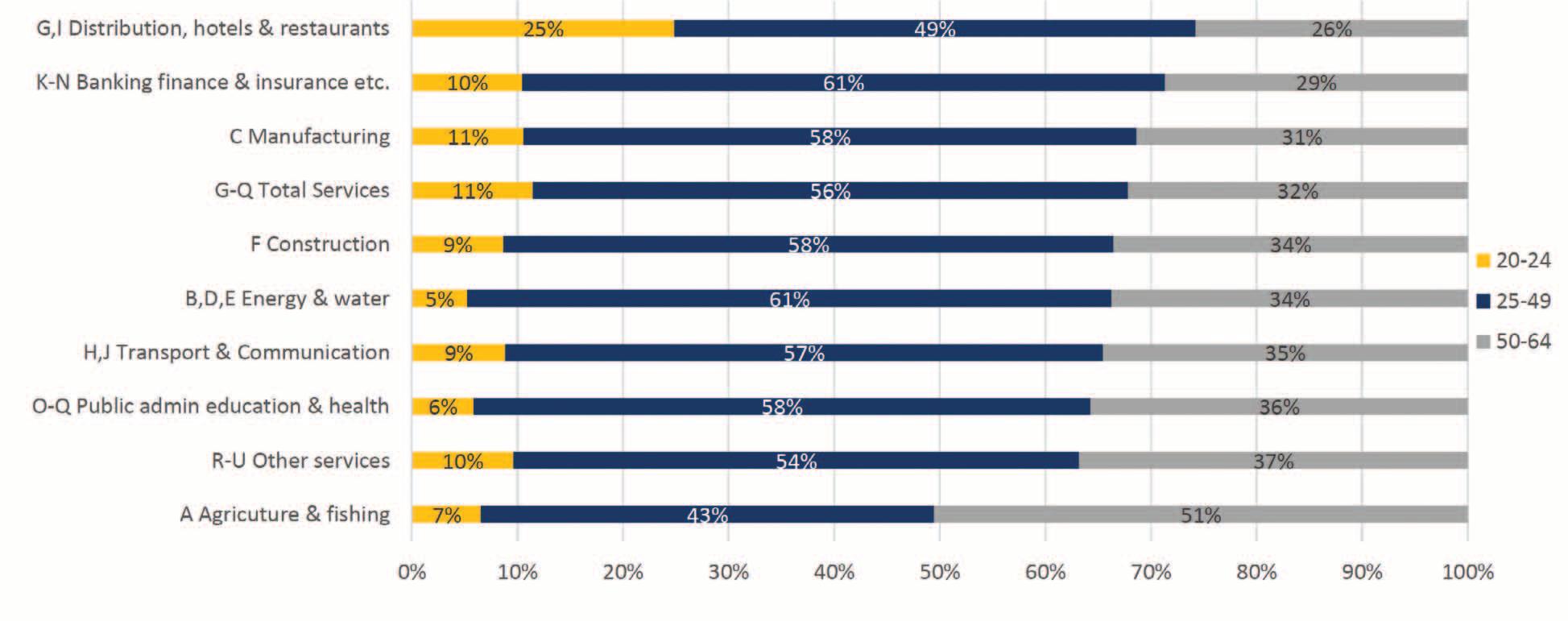
develop workers. With the constant advancements in technology, training, and upskilling has never been as important to make sure staff have the required skills to keep up with these advancements.”
Reskilling: “Some workers will also have to consider changing careers due to automation as well as moving away from manual labour jobs to less physical jobs.”
Flexible working: “Changes needed to working patterns, either reducing to part-time hours, offering alternate working patterns outside of 9-5, and hybrid or home working.”
Support for health and wellbeing: “Employers to offer better support for health and wellbeing to all employees but will be needed more in 50 and over age group.”
A further problem highlighted in the Department’s report is that employers in Northern Ireland are less likely to employ someone aged 50 or above. Additionally, the report states a correlation between larger companies and an increased likelihood of recruiting a worker aged 50 or above. Only 42 per cent of employers surveyed were open to a large extent to hiring somebody aged 50-64. DfE also reports that even fewer companies are open to hiring anybody aged over 65 (30 per cent), with almost one-fifth (18 per cent) of these organisations not open to the idea at all.
On the other hand, Northern Ireland has the highest rate of early entrepreneurship out of the four UK regions and nations, with 8 per cent of those in the 55-64 demographic in Northern Ireland involved in early-stage entrepreneurship activity as of 2021.
If older people are to be encouraged to remain in the labour market in Northern Ireland, the key to unlocking this will be to ensure that there is a strong level of training, with workers being equipped with a skillset which is dynamic enough to meet the evolving needs of the Northern Ireland economy.
The Department for the Economy’s Young People Inequalities in Northern Ireland report explains the differing set of circumstances facing Northern Ireland’s young people compared with the challenges being faced in equipping older workers.
Whilst the challenge in integrating older people into the workforce lies in upskilling, there are a number of multi-faceted factors which are influencing the successful integration of young people into the Northern Ireland labour market. Additionally, there is a wide discrepancy in workers being paid the living wage. Whilst every age demographic from the age 25 and above is paid a real living wage at a rate of 85 per cent and above, only 58 per cent of workers aged between 18 and 24 are paid a real living wage.
“For young [people] that work, wages are lower. For those available to work, unemployment is higher,” the report states.
The report also hints at potential alienation for young males, with wide gaps in educational attainment between male and female students in all school settings. However, although female students are getting better A-level results than
4
their male counterparts, there remains a wide gap in those studying narrow STEM subjects at higher education level, with 49 per cent of male students studying narrow STEM subjects compared to 19.6 per cent off females.
The NISRA population projection, published in 2021, estimates that, in 2032, the 18-24 demographic will reach of a peak of comprising around 13 per cent of the population of Northern Ireland, before subsequently entering long-term decline. Currently, said demographic accounts for around 10 per cent of the population of Northern Ireland.
The report examines the psychological impact of the Covid-19 pandemic on young people’s hopes and aspirations. Worryingly, the report states that a majority (51 per cent) of people in the 18-24 age demographic “feel their aspirations are lower due to global events since 2020”. Additionally, 33 per cent of young people feel that they “will no longer achieve their career goals”, and 36 per cent feel that their “job prospects will never recover from Covid”.
The report additionally makes use of a survey by The Prince’s Trust, which further emphasises an apparent sense of hopelessness which is engulfing many young people of working age. Only 43 per cent of participants in the study believe that their education has equipped them with the skills they need to get the job they want.
Furthermore, almost two-thirds (64 per cent) say it is “not easy to get a good job these days” and 29 per cent report that they have struggled to get interviews. In addition, 19 per cent of young adults say there are not the jobs available in their local area. Looking at attitudes to work, 13 per cent of respondents the study state that they are currently unemployed, with a further 3 per cent economically inactive. Additionally, 9 per cent of those unemployed (around 1.2 per cent of young people) say they never intend to start working.
The results from the report show that there are different behaviour factors to take into account when considering how best to integrate young people into the labour market. Based on the results of the Department for the Economy’s report, there is an apparent sense of hopelessness among young people outlined in The Prince’s Trust report, in addition to the 42 per cent of people working aged 18-24 who do not earn a real living wage.
Decision-makers face important choices in terms of how to equalise these discrepancies and ensure that more women work in STEM, as Northern Ireland becomes more reliant on this sector in the effort to ensure net zero in line with its climate change commitments.

The independent review, carried out by Ipsos, finds that the SEN system needs to be realigned and reformed to move from a processsystem driven to a child-centred approach which meets the needs of children with SEN.
Providing early support to children with a SEN statement is “almost impossible” due to the pressure placed on teachers and staff in schools, the review states, further highlighting the limits of classroom assistants, a role which it recommends undergoes reform to meet the needs of SEN pupils.

Calling for a “rethink of the role” of classroom assistants, the review states that those children who are most in need of additional support, i.e., pupils with a SEN statement, “should have greater interaction with teachers, not less”.
Exactly what reforms should be undertaken to either upskill the role of the classroom assistant, or divert funding from classroom assistants in favour of more teachers, is not stated in the report. However, the report does state that there is a growing body of evidence that classroom assistants can be deployed in ways that enhance student learning and facilitate teachers in carrying out their professional roles.
The review outlines that certain conditions must be met for this to happen, in particular, wellstructured settings where teachers and classroom assistants work closely together, have time for planning and review, and where classroom assistants receive appropriate professional development as a matter of course.
DUP education spokesperson, Diane Dodds MLA, has stated her view that the role of
An independent review into the needs of pupils with a statement of special educational needs (SEN) has recommended a fundamental overhaul of the role and remit of classroom assistants.
classroom assistant should be “professionalised and made more attractive as a long-term option for staff”.
“A more highly-skilled workforce, benefitting from continuing training, will be necessary for us to achieve the best outcomes. Earlier intervention is crucial, and fundamental reform will be required to establish a fit for purpose SEN service for our young people,” Dodds commented.
The review explains how the number of pupils in Northern Ireland schools has been growing steadily since 2017, with almost 341,000 pupils registered in the previous academic year in primary, post-primary, and special schools.
In addition to this, the number of pupils with a statement of Special Educational Needs (SEN) has also increased steadily over the past number of years, for example in 2021/22 there were 21,956 (6.4 per cent) children on stage 3 of the SEN register compared to 17,709 (5.4 per cent) in 2017/18. Most children with SEN are educated within mainstream education (70.8 per cent).
In a letter to heads and governors in May 2023, the Education Authority (EA) stated that there is a 15 per cent rise in the number of children with a statement of special educational needs (SEN) seeking a school place in the next academic year.
An Education Authority committee meeting on 6 April 2023 was told that that meant a need for 853 additional pupil places in special schools and 400 places in specialist classes in mainstream schools. To cope with those numbers, it is estimated that special schools will need an additional 76 classrooms by September 2023.
The review states that accountability within the Department and the Education Authority is needed to drive the change needed. “The strengthening of [the Department’s] governance and oversight in relation to SEN is key to leading, implementing and driving change within the EA and the wider SEN system,” the report states.
In order to drive change, the report recommends that, by May 2024, the Department sets in place “a plan that will set out the actions that will be delivered to implement transformational change to SEN and the wider education system within reasonable timescales”.
“The plan should be led by a senior civil servant who is directly accountable to the Minister and who will give annual reports to Northern Ireland Assembly through the Education Committee of the Assembly.”
Permanent Secretary of the Department of Education Mark Browne commented: “This report indicates that systemic reform is critical to ensure the delivery of high quality, childcentred provision through earlier intervention, a highly skilled and trained workforce and pupil support services that are flexible, timely and responsive as children’s needs emerge.
“There are a number of recommendations contained in this review, some of which will challenge how things are currently done, however, I am confident that in collaboration with key partners we can drive forward change at pace to improve the lives of all children with special educational needs.”
The Department, in a statement released on 8 June 2023, claims that Permanent Secretary Mark Browne has “taken the first decisions in relation to development proposals (DPs) following new statutory duties arising from the new Integrated Education Act 2022”.

Three of these decisions, the Department claims, will result in the establishment of 26 part-time places in pre-school provision at Enniskillen Integrated Primary School, as well as a statutory nursery unit at both Rowandale and Drumlins integrated primary schools.

Announcing his decisions, Browne explains: “These are the first decisions to be taken within the context of statutory duties arising from the new Integrated Education Act 2022 which extends the current duty on the Department to
Education.”
The Integrated Education Act states that support for integrated education involves providing sufficient places in integrated schools to aim to meet the demand for integrated education within the context of area planning and the overall sustainability of the school estate.
The Permanent Secretary has also decided that a development proposal to transform St Anne’s Primary School, Donaghadee to become a controlled integrated primary school should not be approved and has given approval to a separate DP which proposes to discontinue the school, claiming that “insufficient evidence that the continuation of the school would result in the delivery of sustainable provision for pupils”.
The Department of Education’s most senior civil servant has outlined the actions being undertaken to implement of the Integrated Education Act.
Browne adds: “In relation to St Anne’s Primary School, Donaghadee, schools proposing to transform to become integrated must be able to demonstrate that they can be sustainable under the criteria of the Sustainable Schools Policy.”
Brought forward by Kellie Armstrong MLA prior to the dissolution of the last Assembly, the Integrated Education Act places an onus on the Education Authority to “encourage and facilitate, in line with the powers conferred upon it, the transition for schools into an integrated or ‘shared education’ model”.
A further key aspect of the Act is section 8, which stipulates that “education bodies must consider integrated education when planning the establishment of a new school”.
Crucially, the Act defines an integrated school as: “A school which; (a) intentionally supports, protects, and advances an ethos of diversity, respect, and understanding between those of different cultures and religious beliefs and of none, between those of different socioeconomic backgrounds and between those of different abilities, and (b) has acquired: (1) grant-maintained integrated status; or (2) controlled integrated status under the Education Reform Order.”
This definition, along with a definition of integrated education and the apparent lack of distinction between the terms ‘integrated education’ and ‘shared education’ have led some to criticise the Act, in spite of support for the legislation, with SDLP MLA Daniel McCrossan stating that the legislation “has a lot of problems”.
McCrossan’s colleagues in the SDLP, along with Alliance, Sinn Féin, the Green Party, and People Before Profit, all supported the legislation. All unionist MLAs opposed the passage of the legislation, although the Ulster Unionist Party did not join the DUP and TUV in use of the petition of concern, thus allowing the then-Bill to pass with a simple majority.
The Integrated Education Strategy, released in April 2023, has been critiqued for not setting targets for growth of pupil or school numbers, as well as a failure to specify how much money the Department will spend on growing integrated education.
The strategy document states that, between April 2022 and March 2023 the Department created an additional 95 places for pupils in integrated schools through temporary variation.
It further sets out 15 actions that the Department of Education will undertake, including assessing demand for integrated education, publishing data on said demand, and updated information and guidance for parents.
However, the strategy does not specify the amount of pupils or schools it aims to have in an integrated education setting, nor does it state the amount of money to be allocated to integrated education in the Department of Education’s spending.
What is known is that in the 2022/23 fiscal year, £111 million was spent on integrated education in Northern Ireland, which was roughly 8 per cent of the budget for the Department of Education. The strategy document states that “a budget allocation has been identified to support implementation of this initial strategy”, although no figure is attributed within the strategy.
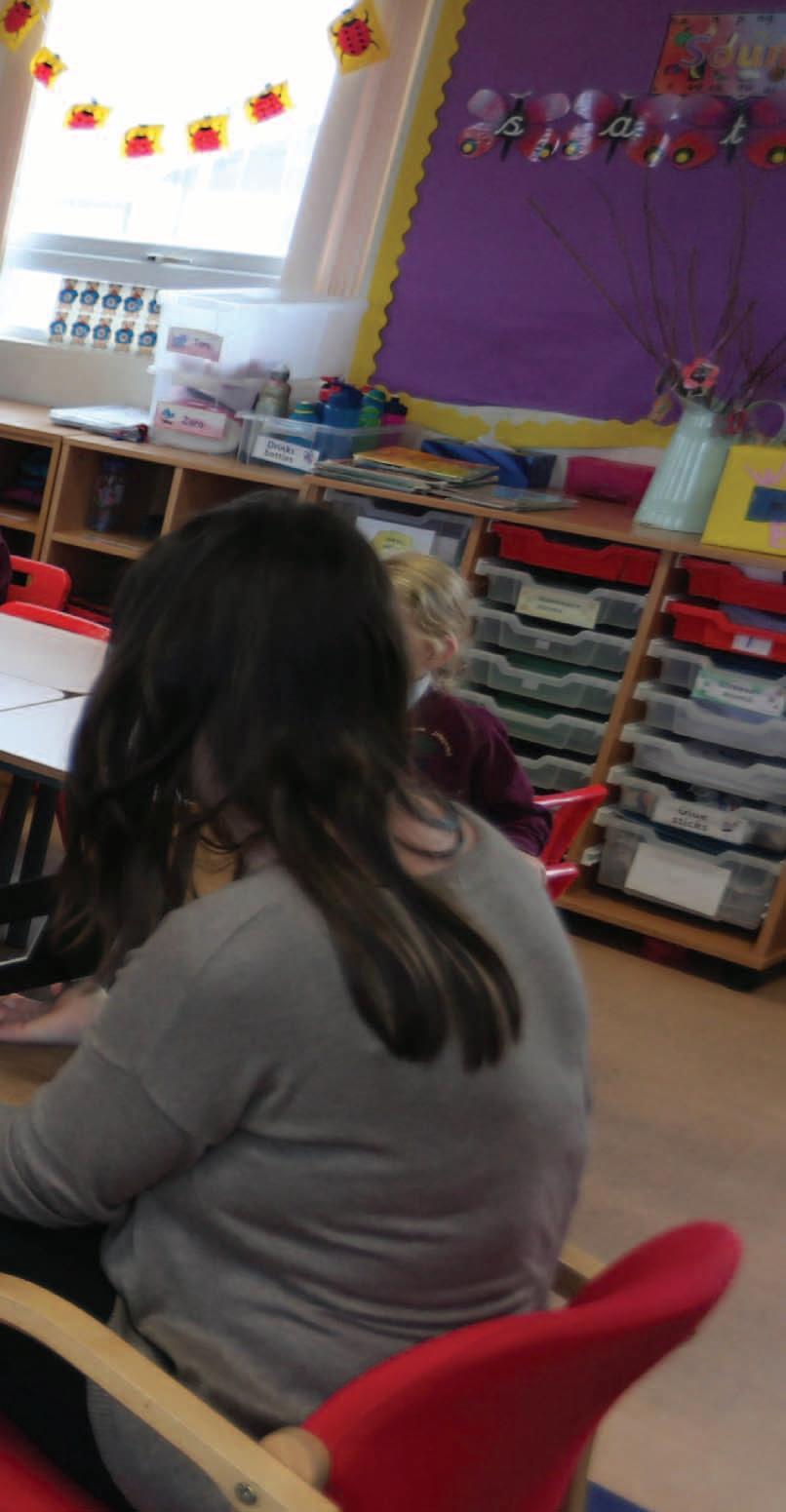
Adam McGibbon from Integrated AlumNI, a representative group for former integrated education students, believes that the strategy as aiming to grow integrated education at a “snail’s pace”. “Prime Minister Rishi Sunak MP suggested that integrated education ‘should be the norm, not the exception’, but this paperthin strategy ensures that for many Northern Ireland parents and kids, they still will not even have the choice of an integrated school,” McGibbon said.
The Department of Education opened out a public consultation on the action plan on 31 August and it will run until 31 October 2013.

targeted promotion and, potentially, incentives to ensure that the intended market is being reached. Furthermore, funding should be secured to allow these programmes to continue and expand as required.”
• Apprenticeships: “Apprenticeships are very well regarded by industry. However, sectoral partnerships should be tasked with reviewing what is currently available both in terms of range and content. In relation to the circular economy, all framework content should be reviewed to ensure sustainability and the materials lifecycle is a central theme. Furthermore, consideration should be given as to the remit of sectoral partnerships in terms of influencing all education and skills provision relating to their industry (e.g. Skill Up, traineeships, further education and higher education).”
With the energy sector to play an increasingly vital role as Northern Ireland transitions to a net zero economy, the Department for the Economy (DfE) has released a skills audit analysing the skills requirements in the Northern Ireland labour market to meet the needs of the energy sector.
In existing education, the report queries whether skills and training provision are sufficient and relevant to allow for a successful transition to existing and new jobs in the energy sector.
“Effective pathways to competency are needed at all levels of the workforce –from entry level (level 2) through to higher skills levels; while the largest volume of skills demands will be at levels three and four in the education ladder,” the report asserts.
The report outlines the four key sectors within education and how they can all
play their respective roles in upskilling the future labour market for the energy sector:
• Entry-level opportunities: “Programmes such as traineeships and the Skill Up programme offer a wide range entry level routes into selected industries and occupations and are crucial to ensuring that people of all capabilities and circumstances have the opportunity to enter meaningful employment. The reach of these programmes needs to be widened through
• Further education: “The six further education colleges are highly regarded by employers in the green industries, but there is a view that current provision has a bias towards introductory/awareness courses rather than delivering a technically competent workforce.”
• Higher education: “The two main universities in Northern Ireland deliver a range of courses that fit well with the green industries. However, the concern that graduates lack industry experience is often cited and more needs to be done to facilitate this during their studies. Furthermore, few graduates actually enter employment in the green industries – whether this is due to graduates choosing other industries or due to a lack of demand from employers needs further investigation.”
also benefit local employers by providing them with a pool of skilled professionals who are equipped to meet the demands of the modern workplace. As an awarding body, OCN adheres to rigorous quality standards, ensuring that every qualification awarded is a testament to the learner’s competence and proficiency. The organisation remains dedicated to continuous improvement, guided by feedback from learners, educators, and employers.
The six further education colleges, meanwhile, have commended all their students on their results this year.
Open College Network Northern Ireland (OCN NI) Chief Executive Martin Flynn says that the recent award of a record 46,000 vocational qualifications demonstrates the organisation’s commitment to providing accessible and high-quality education opportunities to learners across Northern Ireland.
With thousands of vocational qualifications awarded in August 2023, on the same day as A-level results, Flynn believes that announcing both sets of results on the same day represents a “significant step towards parity of treatment” between A-levels and Level 3 vocational learners”.
“Our team at OCN is immensely proud to have reached this significant milestone,” says the CEO. “We believe in the power of education to transform lives and open doors to countless opportunities. Awarding 46,000 vocational qualifications to learners this summer is a reflection of our dedication to fostering a skilled and competent workforce that contributes to the growth and prosperity of Northern Ireland.
“This summer is also the first year that Qualifications Regulators have taken a significant step towards parity of treatment between A-levels and Level 3 vocational learners. Every August, thousands of learners receive their general qualification results, however, this year learners that completed vocational qualifications and intend to continue in education, including further and higher education, or intend moving
into training or employment, received their results on the same day.”
As Northern Ireland’s leading professional and technical awarding body, OCN has been steadfast in its mission to ‘develop and award qualifications that engage, enrich and equip learners for life’.

Over the years, OCN has collaborated with a wide network of education and training providers, which include, schools, further education colleges, community organisations, employers and private training organisations, and has now established itself as a recognised and trusted awarding body.
The 46,000 vocational qualifications awarded this summer encompass a diverse range of subject areas, reflecting the varied interests and career aspirations of learners. These qualifications have been meticulously designed to meet the evolving needs of the job market and equip learners with the practical skills and knowledge required to progress in further education and into employment.
In addition to empowering individual learners, OCN’s vocational qualifications
Leo Murphy, Chairperson of the Further Education Colleges Principals’ Group says: “Congratulations to the OCN on reaching this historic milestone. Further education colleges across Northern Ireland are proud to partner with this trusted awarding body as we work together to provide learners with the opportunity to develop their knowledge, understanding and skills.
“We look forward to seeing the impact of these skills on our economy and across our local communities. Making the decision to enrol on a course and learn a skill continues to enrich the lives and careers of thousands of people across the region. We look forward to seeing similar success in the future.”
OCN remains committed to its vision of ‘a successful, inclusive society where every learner matters’ and this milestone is just the beginning of our commitment to working closely with employers, educational institutions, and other stakeholders to deliver high-quality qualifications and services that meet the changing needs of learners and employers.
For more information about Open College Network Northern Ireland and its vocational qualifications, please visit www.ocnni.org.uk

Transformation Project Report, which was published in November 2022.
The report states that the project aims to root out the factors behind the discrepancy in the relative increase in health outcomes and economic prosperity over the last decade with the relatively static levels of unattendance at schools compared to other regions of the United Kingdom.
Currently in Northern Ireland, attendance at school is supported through the service provided by the Education Authority’s Education Welfare Service (EWS).

Central to the Education Welfare Service Transformation Project is a ‘reengineered’ EWS. The Transformation Project, therefore, will establish a Business Plan alongside an Implementation Plan, with an identified Implementation Team to take forward delivery of the new model. The EA says that this Implementation Plan “must also consider how best to reduce the current waiting list”.
The EA states that geographical differences in school attendance have previously been connected to levels of social deprivation, although the EA reports that this assertion “is not a complete picture,” with some schools in deprived areas showing better attendance rates than others.
The report was developed in response to prior reports from the Northern Ireland Audit Office (2004 and 2014) and the Public Accounts Committee (2014), which concluded that there was a need for efficiency and effectiveness across the Education Welfare Service (EWS) as well as the implementation of a consistent model of delivery.
Recommendations based on the findings of these reports were initially worked upon in a phased approach.
The EA states that The Transformation Project “represents the completion of the fundamental review of the service
called for in the PAC Report and initiated by the Education Authority in 2017, following the move from the five Education and Library Boards to the single authority”.
In developing the new service, the EA says that it has an effective evidence base for the need and requirements in the delivery of the new service model. “Although there was variance in some feedback with areas of need dependent on the service user, and the experience of the service, there was consistency across feedback for the key themes identified above,” the EA says.
The EA adds that it will use information it has gathered to make recommendations on the new service delivery model “to provide an efficient and effective service that meets the needs of children and young people, families, and educational settings in areas of attendance in 2022 and into the future”.
With submissions to the consultation having closed in April 2023, the EA is currently developing the policy, although the EA concedes that establishment of the project will “not be operational overnight” and that it will take “several years”.
With the aim of tackling socioeconomic educational attainment imbalance, the Education Authority has completed a consultation on the Education Welfare Service
Rathmore Primary School and Nursery Unit in Bangor, Bangor Academy and Sixth Form College (the largest post primary school in Northern Ireland), and Downshire Nursery School in Banbridge.

The 25th anniversary of the Good Friday Agreement heralded a significant milestone in the history of Northern Ireland, an agreement which contained a specific commitment to ‘encourage and facilitate integrated education’. In marking the occasion, the IEF was proud to partner with several community organisations, in particular Youth Action, in a special Peace Summit, organised by the John and Pat Hume Foundation and Community Dialogue. Entitled ‘The Unfinished Business of Peace and Reconciliation’, the IEF helped to ensure the voices of young people from several integrated schools were heard as part of an extensive five-month long engagement process involving some 600 young people.
Since 2019, some 21 schools across Northern Ireland have held a positive democratic ballot of their parents on transforming to integrated status and six schools have since reopened as integrated. This progress has been made despite the impact of a pandemic and the absence of a devolved Assembly since May 2022.
In 2023, the Department of Education (DE) published its first ever Strategy for Integrated Education following the passing of the Integrated Education Act (2022). In the words of the Act’s sponsor, Kellie Armstrong MLA: “I think it is a start to something we all have been looking for. Now we have to keep pressure on to ensure it is delivered.”
The Integrated Education Fund (IEF) has welcomed the Strategy, whilst expressing disappointment and concern that it is yet to fully meet the requirements of the Act, such as

meaningful target setting and concrete plans for delivery, which is something it will continue to push hard for.
Further encouraging news is that public support for more integrated education remains as strong as ever. In May 2023, LucidTalk revealed the results of their Northern Ireland-wide attitudinal poll. Two thirds of respondents agreed that integrated education should be the main model for our education system and 65 per cent indicated that they would support their local school transforming to integrated status.
Back on the ground, more parents and schools continue to engage with the IEF and the Council for Integrated Education (NICIE). In 2023 to date, four schools have already held successful parental ballots on transformation. These schools demonstrate the continued growth in demand for integrated education and include; Ballymena Nursery School,
Integrated education was also celebrated by Secretary of State, Chris HeatonHarris MP and Tánaiste, Micheál Martin TD, who held a joint reception with the IEF and NICIE at W5 in Belfast. The event was arranged to demonstrate the shared commitment of the UK and Irish governments to the Agreement and the importance of the integrated education, sentiments that were echoed throughout the Agreement 25 Conference hosted by Queen’s University Belfast.
There are lots of successes to build on and no doubt there will be many challenges ahead, there always are, but thanks to the continued support of all our donors and friends, the IEF is proud to support the continued development of integrated education.
E: jill@ief.org.uk2023 is proving to be another year of significant progress for the integrated schools movement in Northern Ireland. More parents and schools than ever before are showing interest in integrated education.
The Education Across the Island of Ireland report, published by the Economic and Social Research Institute (ESRI) in March 2023, states that “it is reasonable to conclude that the continued use of academic selection in Northern Ireland is likely to be a contributory factor limiting the extent to which the Northern Irish educational system facilitates intergenerational mobility”.

The report further explains that 29 per cent of young people in Northern Ireland are able to attain a higher level of education than their parents, compared to a figure of 38 per cent in the Republic. A figure which will cause concern for those in the Northern Ireland education sector as the rate of students leaving education early in Northern Ireland is 14.1 per cent, more than double the rate in the Republic, which has an early school leaving rate of 5.6 per cent.
The ESRI states that it can measure the relative

impact of social mobility more formally by use of a model that regresses student educational outcomes on parental education. The marginal effect of the impact of low parental education on the probability of a child having a poor educational outcome is about twice as large in Northern Ireland as is the case in the Republic.
With regard to early school leaving, an individual in Northern Ireland whose parents have a “low education” is 27 per cent more likely than their peers whose parents have higher educational attainment to be an early school leaver. The same marginal effect, the report asserts, equates to only 13 per cent in the Republic.
The report also examines educational mobility based on parents’ level of education in the two jurisdictions which it states is based on the educational level of the parent with higher attainment. The report makes it clear that
selection is leading to a much lower rate of intergenerational mobility compared to that in the Republic of Ireland, a report has found.
educational mobility is much more prevalent in the Republic of Ireland than it is in Northern Ireland for those whose parents at the lowest levels of parental educational attainment, 77 per cent of young people in Ireland educationally upgrade compared to 58 per cent in Northern Ireland.
At the other end of the spectrum, when parents have high levels of educational attainment, educational downgrading is also stated as being “somewhat more likely” in the Republic of Ireland. However, the report adds that it is “likely that the grouping of parents’ education into three categories and in particular the grouping together of upper secondary and post-secondary may be hiding some upward mobility”.

“Given that post-secondary qualifications are much more common in [the Republic of] Ireland than in Northern Ireland, we believe there to be more educational upward mobility in [the Republic of] Ireland than can be clearly distinguished [in this report],” the report explains.
With respect to patterns of educational attainment, the ESRI finds that substantial divergence has occurred over time, with educational attainment improving more rapidly in the Republic relative to Northern Ireland in the last 15 years.
In 2019, the proportion of people aged between 25 and 29 with low levels of educational attainment was approximately 11 per cent higher in Northern Ireland than in the Republic, whilst the proportion of people in said age category with high levels of educational attainment was approximately 9 per cent lower in Northern Ireland
The ESRI report said differences were not evident in 2005, meaning that Northern Ireland’s pattern of lagging behind neighbouring regions is fairly recent. The report confirms that, in addition to lagging considerably behind the Republic of Ireland, Northern Ireland is performing unfavourably compared to the United Kingdom’s constituent countries, particularly Scotland.
Northern Ireland, the report asserts, currently has the highest rate in the UK or Ireland of people with low qualifications, and Wales is the only
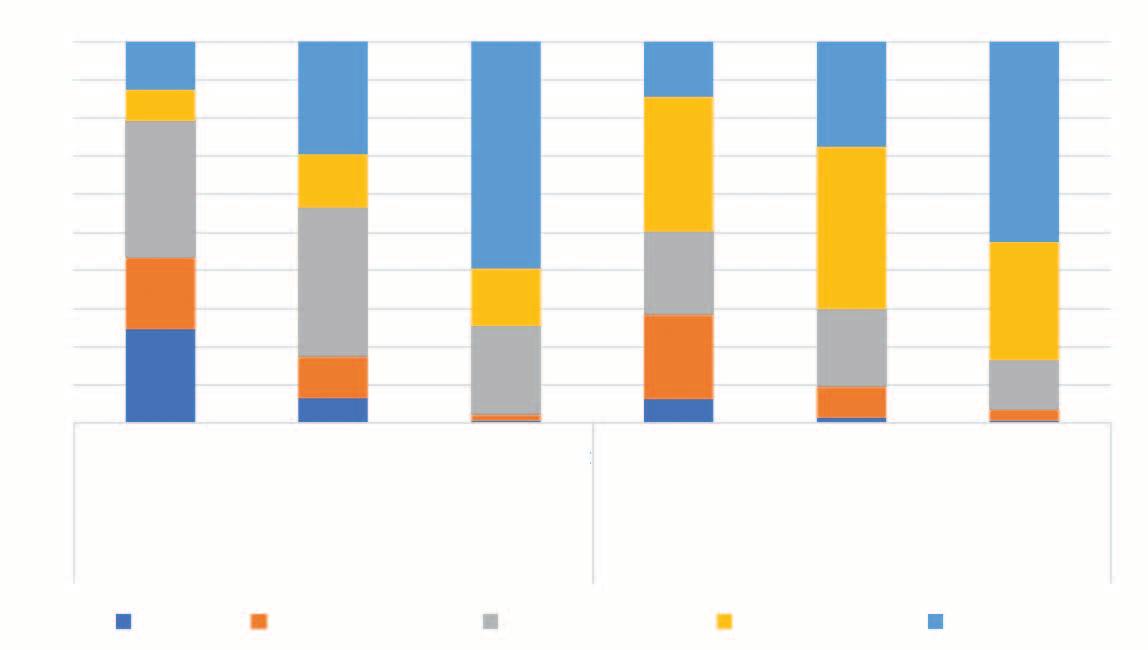
region in the area with a lower proportion of people with higher-level qualifications.
To solve Northern Ireland’s educational attainment decline, the ESRI has recommended that the targets for what should be the minimum level of educational attainment expected as the norm in Northern Ireland changes over time.
Currently, the ESRI asserts, the ability to retain children to the point of completing an upper secondary education is seen as a key objective in both the Republic of Ireland and Northern Ireland.
“Early school leaving is particularly important as the long-term ramifications for individuals in terms of their labour market outcomes but also of their
overall wellbeing are well documented. Adopting the OECD definition of early school leaving, we find that it is more than twice as prevalent in Northern Ireland as it is in [the Republic of] Ireland (14.1 per cent compared to 5.6 per cent),” the report states.
“Furthermore, while coming from a more disadvantaged background is a significant predictor of educational failure in both jurisdictions, the impact was more pronounced in Northern Ireland. The marginal effect of the impact of low parental education on the probability of a child having a poor educational outcome is about twice as large in Northern Ireland as is the case in Ireland.”



talks to Owen McQuade about the unique and wide-ranging collection at the Ulster Museum and the challenges of managing and developing the collection in a post-conflict society.
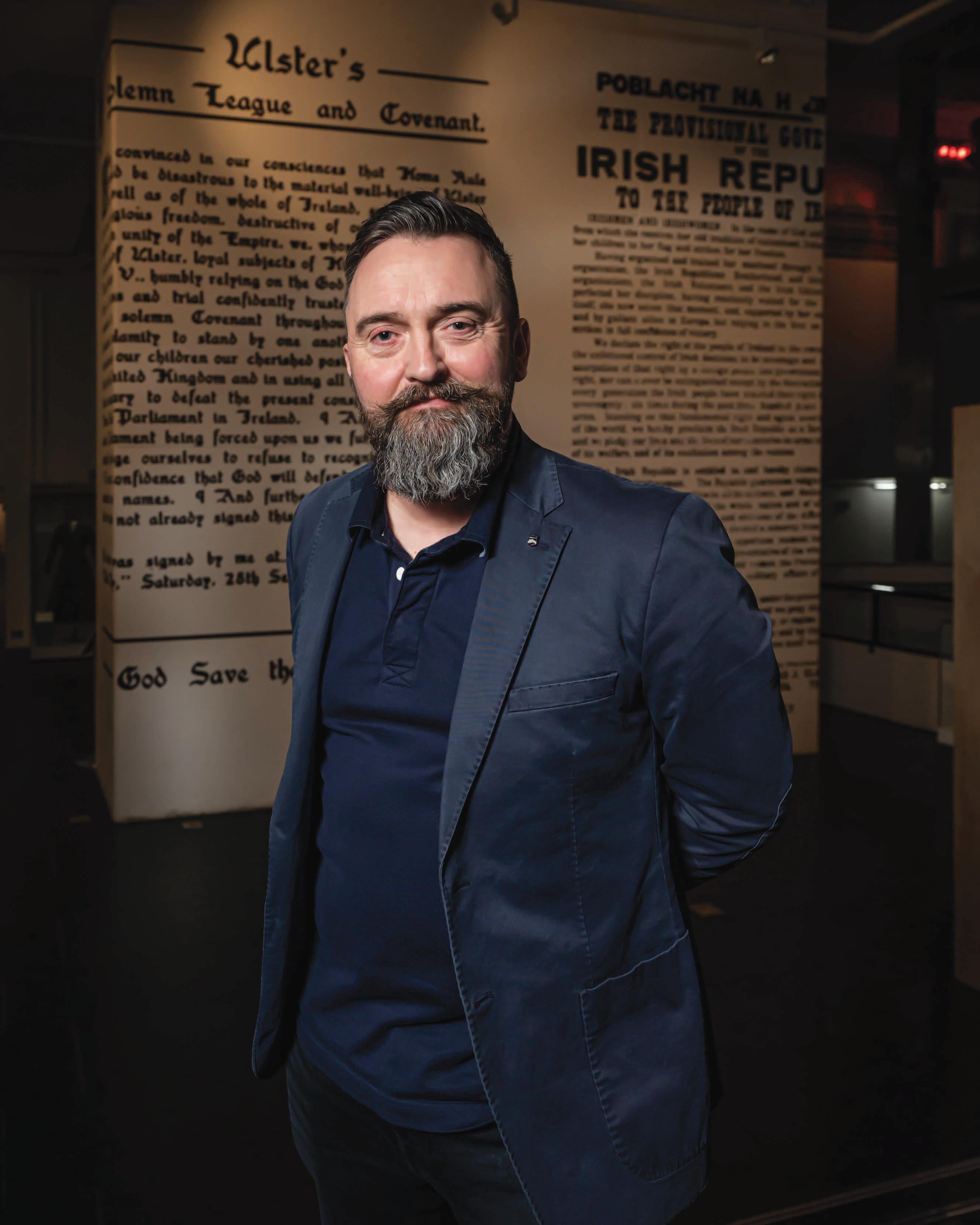
The Ulster Museum on Belfast’s Stranmillis Road has been 200 years in the making. It has its origins in the Belfast Natural History and Philosophical Society in the late 1830s and relocated from the city centre to its current location in Botanic Gardens in the 1920s.
The partition of Ireland gave impetus to its development with the foundation of the new entity of Northern Ireland keen to strengthen its status.
The Ulster Museum as we know it today came about in the 1960s when legislation transferred its ownership from the municipal authority to central government with a board of trustees which is still the model of governance of today. The museum also developed physically over this period, with the new modern extension to the neo-classical building opened in 1972. Terence O’Neill was the driving force behind the museum’s development, initially as Finance Minister and then as Prime Minister.
“Although O’Neill’s tenure is contested in terms of effectiveness and authority, his most enduring legacy is setting up the Ulster Museum and Ulster Folk Museum,” says Blair. “Whilst his liberal reform agenda was seen by many as ‘too little, too late’, the museums he helped to establish are ‘here for good’; the
backbone of our cultural infrastructure, enjoying an international reputation.”
A central feature of these museums is history. “Our history is very much alive in Northern Ireland. It continues to manifest itself in the present and to shape our identity. Museums are not simply about housing the past – that is a misconception – they are very much about the present and where we might be going. Museums, at their best, open perspectives on the emerging future. That is where museums become relevant; supporting engagement and dialogue around who we are today, where we are going and what kind of society we want to create together,” he explains.
In 2009, Blair joined the Ulster Museum with the “ambitious” job title of Head of Human History. Six years later, he became Director of Collections which was “much more meaningful” and saw him take on a much broader remit across curatorial, collection services, and audience development. A core part of his current role is the strategic management and development of a collection that spans art, history, and natural sciences.

“The scale and diversity of the collection makes us a museum of national and international significance,” he adds.
When Blair took up his post, he wrote a

paper on ‘Unlocking the potential of the collection’, “which still encapsulates the fundamental challenge and opportunity; it is an incredibly diverse collection and, importantly, a huge learning resource”. Blair believes that it is a body of evidence and source of inspiration “that has so much to contribute to society not just in how we face our local challenges but our global challenges”.
Blair highlights the Ulster Museum’s art collection, saying “art collections open a window on human experience; the artists’ response to the world around them”. In Northern Ireland, the Ulster Museum also serves as a national gallery, collecting both historic and contemporary art. The collection is not geographically confined and can stretch to what is relevant internationally “as many of our challenges are now global”. For example, some recent acquisitions reflect the Black Lives Matter movement; a global movement that has reverberated in Northern Ireland. Another example of the international aspect of the collection is the natural science collection that holds data on biodiversity, which is of interest to scientists locally and globally. “By holding specimens, we can see what has changed, what used to be here and what is not here now. It allows us to map what is happening to our natural world and identify strategies to help address environmental change and biodiversity loss.”
In 2022, the Ulster Museum marked its fiftieth birthday in its current form. Blair sees the building itself as a powerful metaphor, with the neo-classical traditional idea of what museums are; a centre of authority, with its ionic columns. “The Ulster Museum takes that and moves it on, combining it with the modern extension. In many aspects, it could not be a better combination and that mix gives the Ulster Museum its
Museums, at their best, open perspectives on the emerging future.The ‘Dungiven costume’ had been preserved by peatland for 400 years before being discovered by a farmer.
identity – a place for bold new perspectives, just like the building, where you can explore the past and debate the future. It is also a bit like a Tardis; under one roof you have art, history and natural sciences. An à la carte menu for any particular visitor. You can go back in time to the Big Bang, to understand how our planet and solar system has evolved over millions of years.
“At the same time, our Troubles and Beyond gallery – which focuses on our recent past and where we are now – holds a mirror up to who we are today. Northern Ireland today is a fascinating place; a society that is constantly evolving and changing, but one where traditions still matter. Inevitably there is much suppressed trauma in this society, that is an inevitable legacy of the hurt and injury caused by the conflict,” he states.
The big challenge for Blair is keeping pace with change: “Understandably, we have spent considerable time and effort in understanding and interpreting our traditional divisions. But this society has become much more diverse, especially over the past 10 years or so. That is very enriching for all of us, but it presents new challenges for the museum in effectively representing that growing diversity in our collections, exhibitions and programmes.”
This shades into the agenda of ‘decolonisation of the museum’. Blair explains that decolonisation of the museum can be a misleading or confusing term. Instead, National Museums NI frames its work around the concept of ‘Inclusive Global Histories’. He comments: “That is more positive and meaningful. It expresses more clearly our approach. Our World Cultures collection is not particularly large, but it is undoubtedly important. It inevitably reflects the history of colonisation, with material from around the world. For example, it includes and collection of around 500 items from Africa, but as our society includes people of African descent living in Northern Ireland, it is not just about repatriating. It is also about how we involve diverse communities in decision-making, what to do with the material, and how we interpret the collection here in Belfast.” Blair acknowledges
that repatriation is an important element of the work “but many people think it is the entirely of the process, and that is simply not the case. We can also achieve positive outcomes through transparent and meaningful local engagement”.


“Ultimately the test is one of ethics,” the Director of Collections says, indicating that the Ulster Museum responds to any request with a sense of urgency and purpose. For example, the museum recently repatriated some important cultural religious objects and ancestral human remains to native Hawaiians. In most instances, Blair says the issue is clear cut; if it involves human remains, items of religious significance, or indeed, any items collected unethically in the past, then he believes museums must do the right thing by the indigenous communities from where they emanated.
“The issues can be complex, but making the right decision creates opportunities to build new relationships and a collection that facilitates greater mutual understanding and respect for cultures. Our programme ‘Inclusive Global Histories’ proactively seeks to work with representatives from source and diaspora communities who can then be part of the conversation on how we use and interpret these collections. And how we promote in a positive way the respect for cultures that created those objects.
“If those objects could speak, they would not say ‘I am a colonial object and I do not know how I got to Belfast’. They would introduce themselves on the basis of the cultures that created them and their actual meaning and cultural significance. Then they might explain how they got to Belfast, and their desire to return home (or stay).”
National Museums NI has an ethics policy that gives it a clear reference point that guides its decision-making. It manages the collection of 1.4 million specimens in line with its collection development policy which includes not just acquisitions but also the process for the transfer, reuse and disposal of collections. This is a
“It is important to view history in that broader sense. Visitors have their own interpretation of events based on their personal experience, and we must give them enough touch points that they feel that their perspective is included.”
carefully considered process because museums must maintain public trust.
The Ulster Museum’s work around conflict and legacy is primarily delivered through a programme called ‘The Troubles and Beyond’. “The challenge is what to collect, how to collect it, and how to display it, as well as determining what stories to tell through the collection. Clearly, there are sensitivities given the diversity of perspectives on the conflict. Our recent past is complicated and within the living memory of most people. We all have the truth of our own lived experience and that must be respected. We see our work in this area as an open-ended conversation.
“It is a learning journey and we deliberately asked visitors to ‘The Troubles and Beyond’ exhibition in the Ulster Museum what they think is missing. Can they help us tell this story better? It is an open-ended process and the gallery is continually evolving and being refreshed with new objects.”
Overall, visitor feedback has been very positive. Blair sees the gallery as a “conversational space”, that does not focus solely on political history but also seeks to look at the wider economic, social, and cultural changes in society. “It is important to view history in that broader sense. Visitors have their own interpretation of events based on their personal experience, and we must give them enough touch points that they feel that their perspective is included.”

Inclusivity is a big challenge for museums. Blair says that people can be surprisingly tolerant and accepting
of hearing other people’s political perspectives providing they do not feel excluded themselves. “As people move through the galleries, they will see the Ulster Covenant juxtaposed with the Proclamation of the Irish Republic. They are both 18 feet tall. We have never had any objection or graffiti. That is positive and everyone recognises that both documents are important and both are cornerstones of the story of 20th century Ireland,” he says.
The collection also reflects different aspects of identity, its origins and how our identities have evolved over time. The ‘Dungiven costume’ came into the collection in the late 1950s. It was found by a farmer in peatland at Dungiven, County Derry, which had helped preserve it for 400 years. The checked trousers, or ‘trews’, show a connection with Scotland. The doublet, or jacket, is an English garment and the mantle, or cloak, is quintessentially Irish. “In the one suit of clothes you have the DNA of early modern Ulster, reflecting the mix in our society. It is a cultural fusion with distinct elements that still resonate today,” Blair remarks.
“It is a real privilege to work with a collection of this size and significance, and to be able to work across the wide spectrum of this society. Whatever challenges we have, I remain optimistic. In my dealings with people, I am always struck by the qualities of people here – their openness, warmth and resilience, especially given what we have gone through during the Troubles. As John Hume used to say, ‘we have far more in common than we have to divide us’.
“The creativity, diversity, and openness that is a feature of post-conflict Northern Ireland undoubtedly provides a basis to build a better future together. I would not want to work anywhere else; it is challenging but very rewarding,” he concludes.
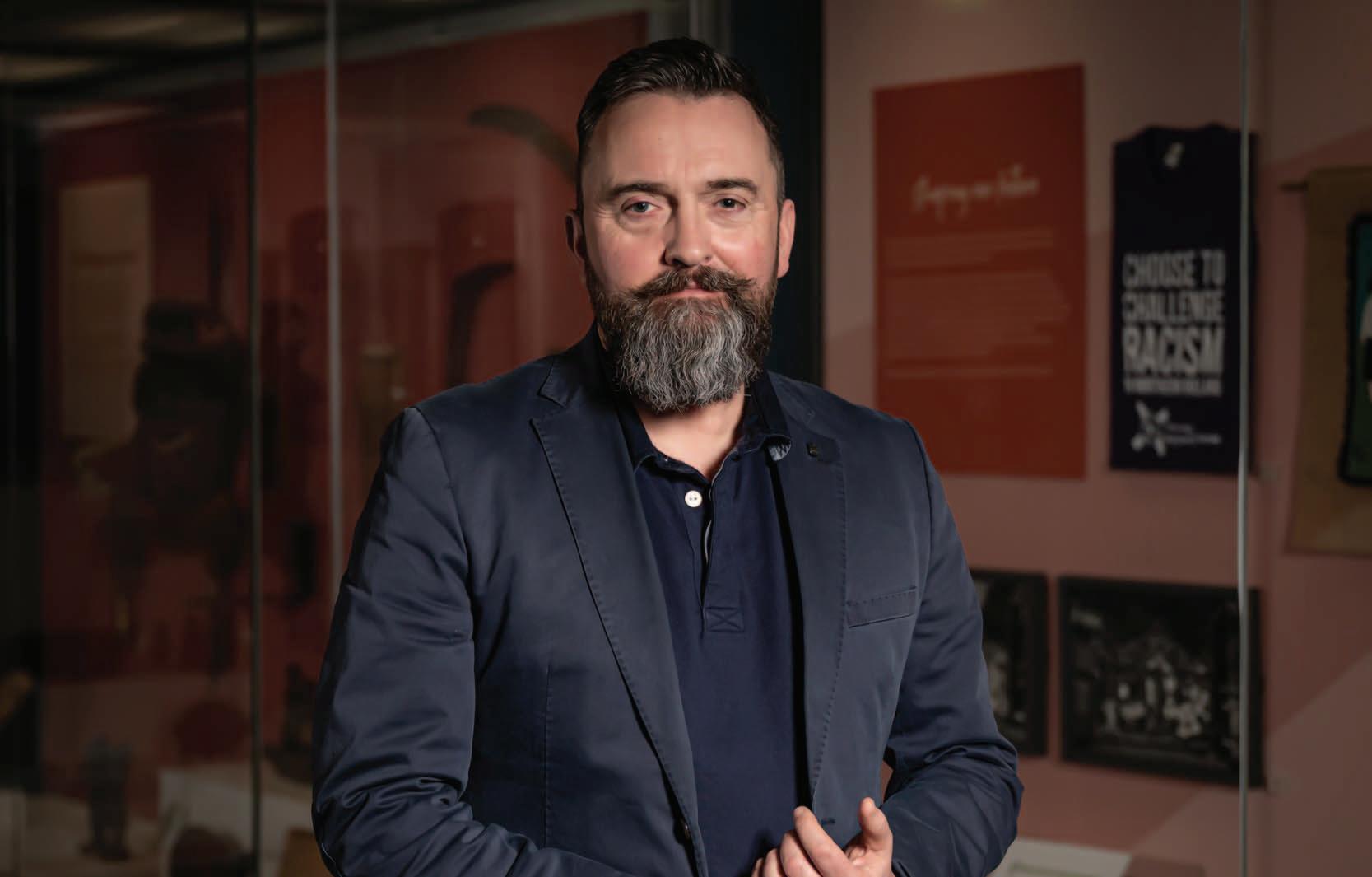

The final review, published at the end of June 2023, has recommended that the constituency of Belfast South be abolished, with the area to be re-shaped into a new constituency of Belfast South and Mid Down. The changes are likely to be in effect before the next UK general election, which is expected to take place in autumn 2024.
The proposed changes will also apply to elections to the Northern Ireland Assembly, as Section 33 of the Northern Ireland Act 1998 provides that Assembly members shall be returned for the parliamentary constituencies in Northern Ireland.
Originally, the Boundary Commission

released a report in October 2021 which recommended dramatic changes to Northern Ireland’s constituencies, including a reduction from the current total of 18 down to 17, with the Commission stating at the time that 11 of Northern Ireland’s 18 constituencies were either too big or too small.
In October 2022, the Boundary Commission, following an eight-week consultation for the initial proposal in 2021, dropped the renaming of various constituencies including Strangford and Upper Bann, and further dropped the proposal to reduce the number of constituencies in Northern Ireland. With the consultation now complete from
the October 2022 proposals, the current report makes it clear that the number of constituencies in Northern Ireland will remain the same, but which did re-shape a number of constituencies, including Strangford and Upper Bann, as well as the renaming of the Belfast South constituency.
By far the most dramatic development of the boundary review is the renaming and reshaping of the Belfast South constituency. The new Belfast South and Mid Down constituency will encompass most of the current Belfast South
A review by the Boundary Commission means that all of Northern Ireland’s parliamentary constituencies will be revised, with one to be renamed.
constituency, along with parts of the current manifestations of the constituencies of Belfast East, Strangford, and South Down.
The proposal for the changes to the current Belfast South constituency will have an undoubted change in the political makeup of the constituency at the next election due to demographic changes which will occur as a result, although it is unclear as to which party will benefit as a result.
The new proposals also mean that County Down will be split into seven different constituencies. These are: North Down, Strangford, Belfast East, Belfast South and Mid Down, Newry and Armagh, Upper Bann, and South Down. The majority of these constituencies also contain parts of other counties.
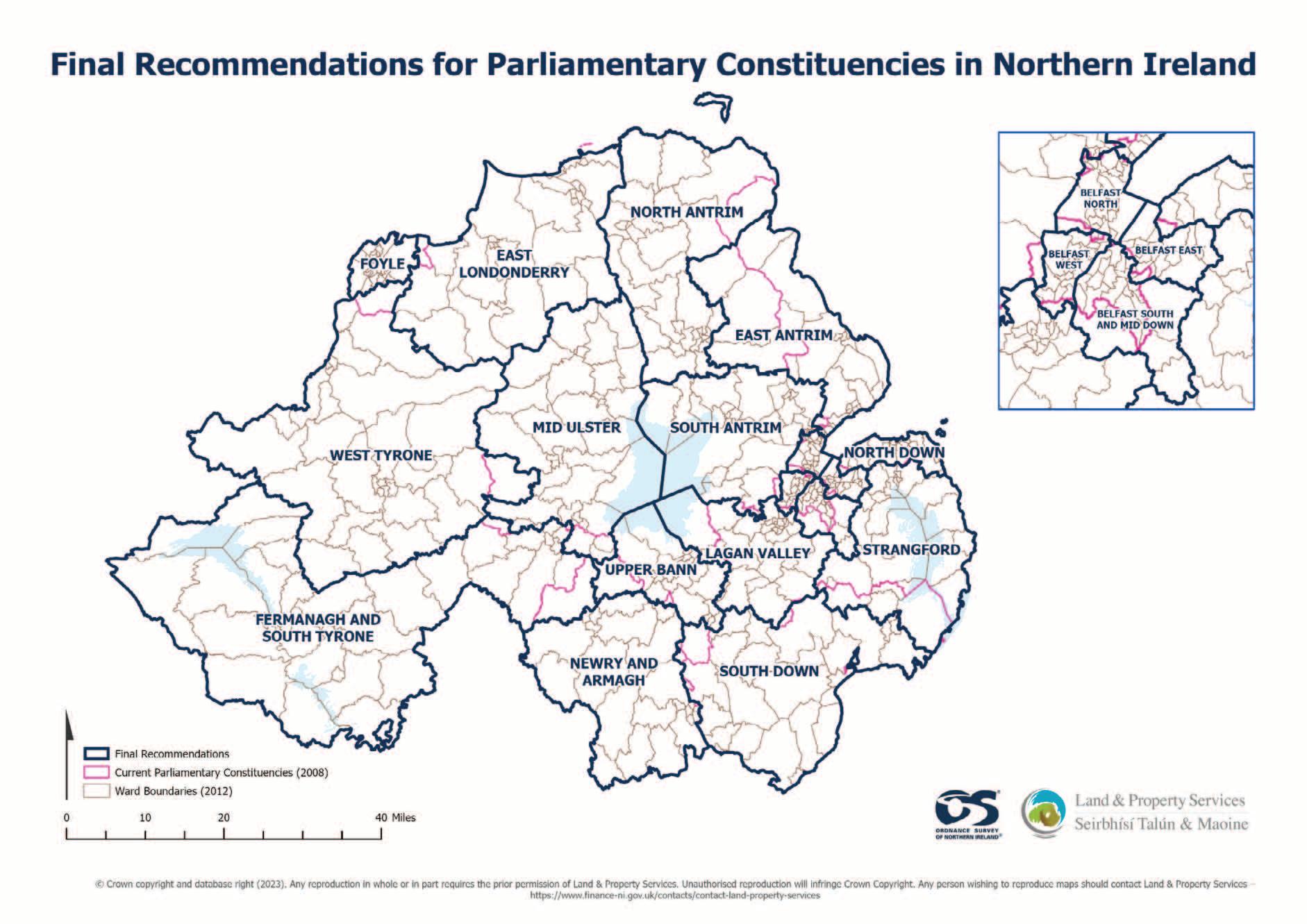
Additionally notable is the reshaping of the constituencies of East Antrim and Strangford. Although both of these constituencies will retain their current names, the change in their boundaries –with wards just outside Downpatrick now forming part of Strangford rather than South Down – will forge likely demographic changes which may change the political outcomes from the voters of these constituencies.

The UK Boundary Commission carries out reviews of constituencies for elections to the House of Commons every 10 years. Previously, dramatic changes have occurred in Scotland, where in 2005, the number of constituencies was reduced from 72 in the 2001 general election to 59 in the 2005 election.
Following the formation of the Conservative-Liberal Democrat coalition in 2010, then-Prime Minister David Cameron outlined plans to reduce the number of seats in the House of Commons to 600, down from 650, as an anti-politics sentiment gripped the British public amid the expenses scandal and the austerity policies being pursued by the coalition government.
The British parliament passed the Parliamentary Voting System and Constituencies Act 2011, which legally obliged the House of Commons to be fixed at 600 MPs. However, the passage of the Electoral Registration and Administration Act 2013 delayed the publication of the Boundary Commission’s report, which would have implemented the size reduction, with Section 6 of the Act postponing the Sixth
Periodic Review until “not before 1 October 2018”. Therefore, the 2017 and 2019 general elections were also contested without the changes recommended by the Cameron government.
The current government, when Boris Johnson was the Prime Minister, subsequently dropped the reform agenda and cancelled many of the reforms proposed under the coalition government with the passage of the Parliamentary Constituencies Act 2020. This measure cancelled the proposal to reduce the number of MPs, and also ended the Fixed-term Parliaments Act 2011, allowing the House of Commons to be reduced with a simple majority and the advice and consent of the monarch of the UK.
Having been presented to Parliament by the Speaker of the House of Commons in accordance with the Parliamentary Constituencies Act 1986 (as amended), the Government must now submit a draft order in council within four months, giving effect to the recommendations in the report. The proposal is expected to be passed by MPs and come into effect on 1 November 2023.
Although celebrations have been muted as the Assembly has been inactive now for more than one year, noteworthy is how the powers and functions of the Assembly have evolved in the years since the British Government restored local representation to Northern Ireland. In 1998, the electorate, fresh from having passed the Belfast Agreement via a referendum, elected 108 MLAs, although the Assembly had a vastly different political composition to what it plays host to in 2023.
Originally formed with a five-party mandatory coalition and 108 MLAs, the
nature of the Assembly has evolved since the original shadow period between 1998 and 1999, including the formal mechanism to create an official opposition, as well as the devolution of policing and justice powers in 2010. Despite this degree of meaningful progress, Northern Ireland remains far from a typical western democracy, as can be exemplified by the fact that the Assembly has spent 10 of its 25 years without a functioning Executive.
Furthermore, the requirement for MLAs to designate as unionist, nationalist, or other remains a source of contention for
a large section of MLAs, particularly the Alliance Party, which may not be able to nominate for the role of deputy First Minister if it were to find itself as the second largest party.

The Assembly, in its current form, was established on 25 June 1998 under the terms of the Northern Ireland (Elections) Act 1998. It was called the ‘New Northern Ireland Assembly’ to distinguish it from the Northern Ireland Assembly for which legislative provision remained at that time under the Northern Ireland Constitution Act 1973.

Although the Northern Ireland Assembly has spent almost 10 of its 25 years in suspension, there has been meaningful progress including the increase of female MLAs, and the formation of a formal opposition.
The Northern Ireland Act 1998 stated that the Assembly would be known as the ‘New Northern Ireland Assembly’ in the pre-devolution or ‘shadow’ period and that at the date of devolution it would be called the Northern Ireland Assembly.

The Assembly operated as a ‘shadow Assembly’ until the British Government formally restored devolution to Northern Ireland as the Secretary of State introduced the Northern Ireland Act 1998 (Commencement Order No 5), resulting in the devolution of powers to the Northern Ireland Assembly from 2 December 1999.
Although devolution has been heralded as bring decision-making powers closer to the people of Northern Ireland, societal divisions have nonetheless manifested in the form of multiple collapses of the Assembly, including the current DUP boycott.
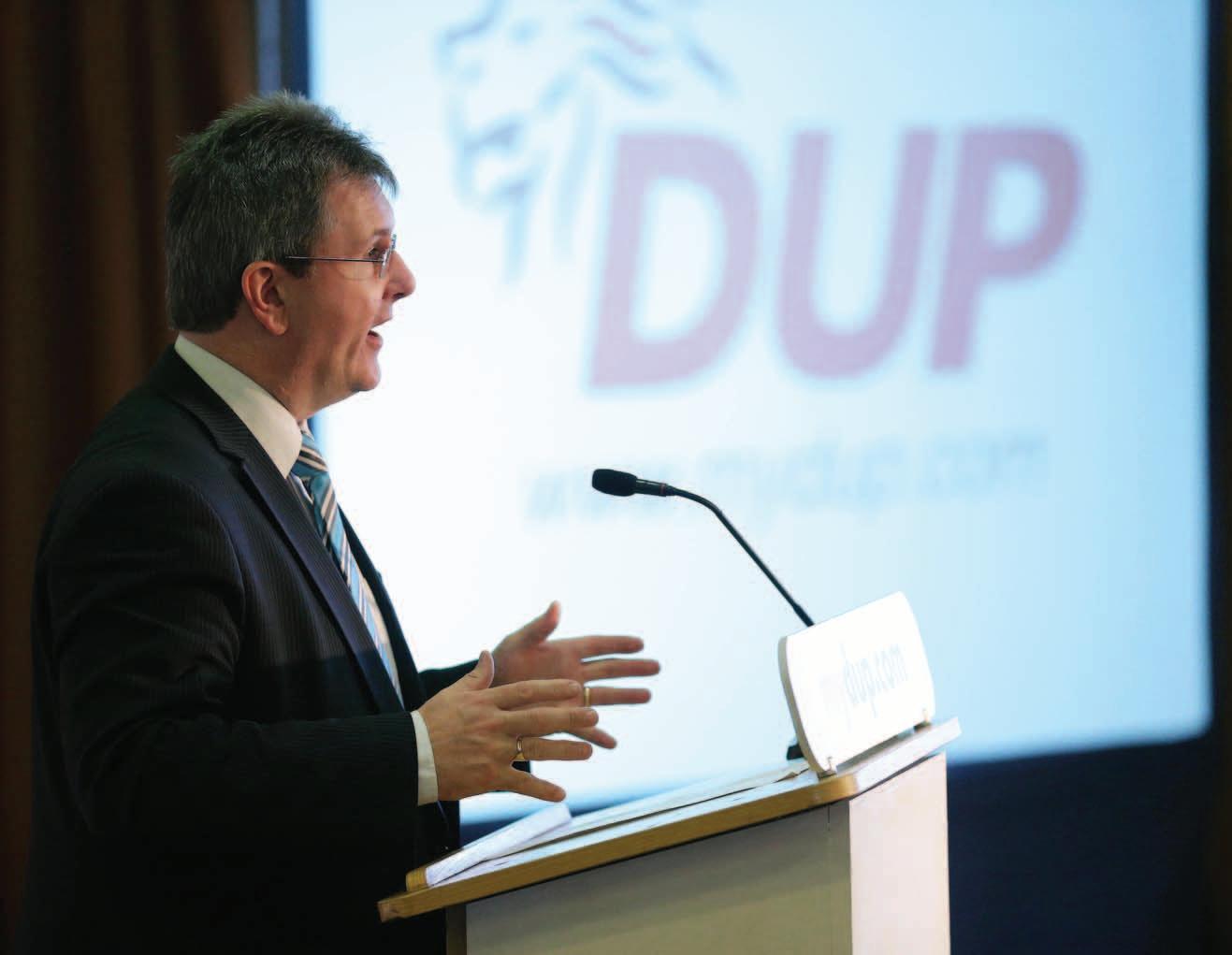
On 11 February 2000, following reports from the International Commission on Decommissioning that it had “received no information from the IRA as to when decommissioning will start”, the thenSecretary of State, Peter Mandelson, under powers derived from the Northern Ireland Act 2000, suspended the Executive and restored direct rule. An agreement was subsequently reached that allowed the restoration of devolution with effect from 30 May 2000.
On 8 October 2002, the Assembly debated a DUP motion expressing concern at the implications of a search of the Sinn Féin offices at Parliament Buildings on 4 October 2002 and the subsequent arrest of three Sinn Féin party members on spying charges. This led directly to another suspension of the Assembly on 14 October 2002.
Following the defenestration of the Ulster Unionist Party in the 2003 election and its usurpation by the DUP, the Assembly remained inoperative through the entirety of the 2003-2007 term, and the British Government continued direct rule.
Following the St Andrews Agreement in 2007, Ian Paisley and Martin McGuinness formed an Executive which remained functional for eight years.
However, in 2015, following a PSNI assertion that the Provisional IRA had involvement in the killing of a Belfast republican, Paisley’s successor, Peter Robinson, utilised the vagaries of procedure to resign as First Minister without formally collapsing the institutions, by nominating a First Minister every seven days before immediately resigning.
In October 2015, following an assessment of paramilitary organisations commissioned by the UK Government, the DUP returned to its Executive posts, with Peter Robinson resuming his role as First Minister. At the same time, talks began around implementing the Stormont House Agreement.
Although the Executive was restored and reformed following the 2016 election, Martin McGuinness’s resignation in January 2017 over then-First Minister Arlene Foster’s refusal to temporarily step aside for the duration of an inquiry into the RHI scandal led to three years of Executive and Assembly collapse. Although the Assembly was reestablished in January 2020 following the New Decade, New Approach agreement, the DUP collapsed it again in March 2022, in what it claims is a protest against the Northern Ireland Protocol.
Although reform of the designation system is a favoured topic for many in Northern Ireland’s political classes, and is spearheaded by the Alliance Party, there is seemingly no immediate prospect of the designation system changing.
One bright spot has been the increase in the representation of women in the Assembly, with the first Assembly in 1998, comprised of 108 MLAs, only containing 14 women. Now, however, 35 out of the 90 MLAs are women, with one of the large parties, Sinn Féin, even containing a majority of female MLAs and a female leadership. Four of the five largest parties have had female leaders since the formation of the Assembly in 1998.
Although there is now a formal mechanism to form an official opposition in the Assembly, the fruits of this potential have yet to be realised due to the ongoing collapse. However, upon the future formation of an Executive, it is possible that the Assembly will come closer to resembling a normal western legislature.
The procedure, which has taken effect from 1 July 2023, has been introduced by the Northern Ireland Public Services Ombudsman (NIPSO). NIPSO states that this procedural revision is the latest stage in a project which will see all public bodies in Northern Ireland follow the same complaints handling standards, so that “regardless of whether the complaint is about a school, a hospital, or a government department, there is consistency across the public sector”. Although the ambition is for all complaints to be dealt with within five working days, NIPSO says that, in some cases, the investigation procedure will be extended to a period of just under three weeks.
“Because not all complaints can be dealt with quickly, the procedures say that more complicated ones should be passed to a second investigation stage. This should take the public body no more than 20 working days to complete,” the report says.
NIPSO states that, in reducing the investigative timeframe, it is “responding to people’s concerns,” adding: “We want to change the culture in organisations so that complaints are taken more seriously. We are working with senior leaders to help them understand why complaints matter, showing that by acting as an early warning system, complaints should be welcomed rather than feared.”
The organisation further outlines that it is developing training
programmes to support the changes outlined in the report, including advice on how complaints should be investigated and how best to communicate with complainants, and says that it will “continue to work closely with the local government sector as the new system beds in”.
In addition to the processes in local government, NIPSO says that it is beginning the process of introducing standardised complaints handling across all of Northern Ireland’s health trusts.
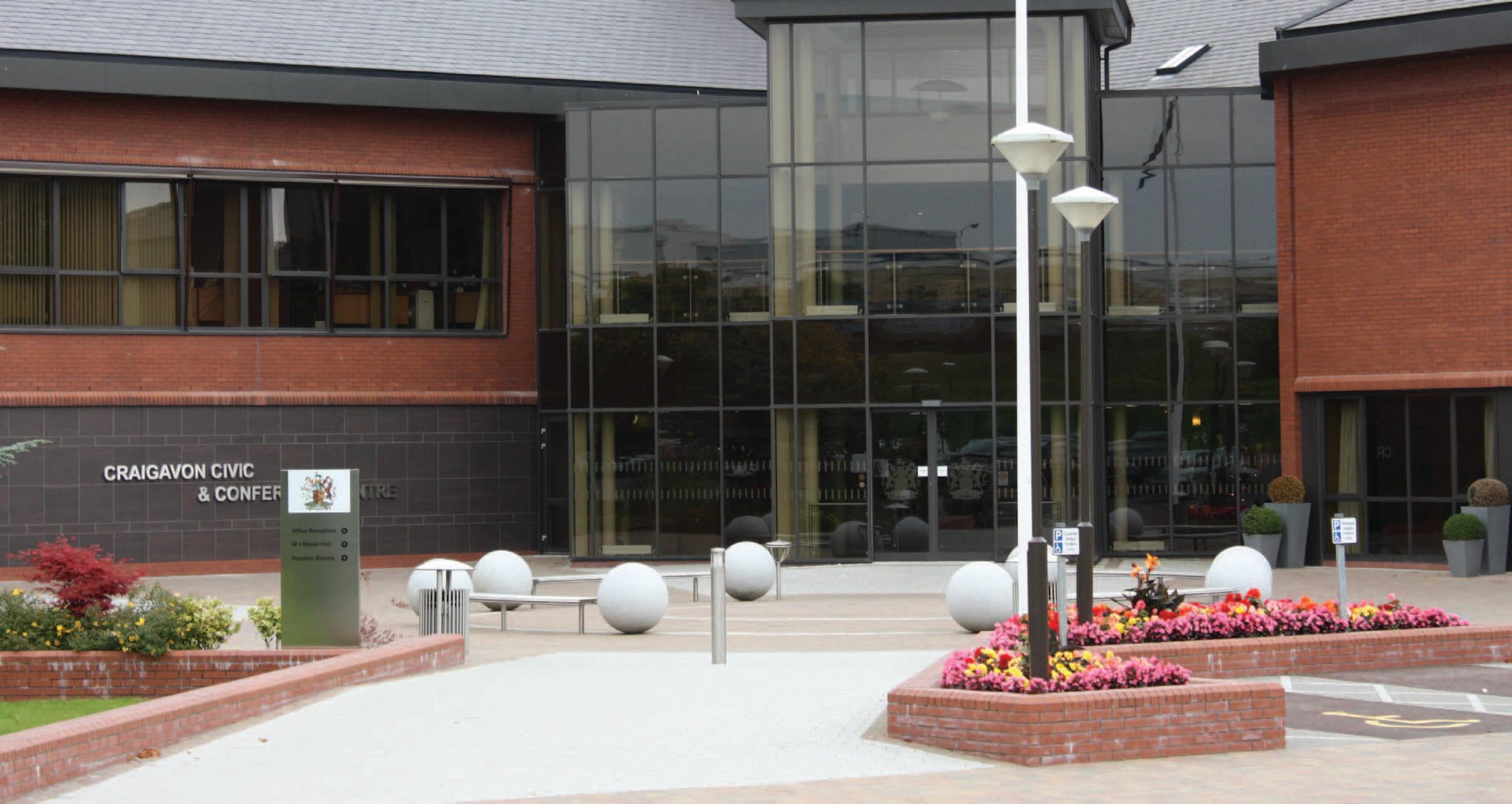
“We believe these exciting changes have the potential to transform the level of customer service in the public sector to the benefit of all concerned,” NIPSO states.

Ombudsman Mary Kelly says: “For public bodies, this is a real opportunity to change their complaints process and their complaints approach. When someone complains to a public body, it is an opportunity for them to build trust with the people using their services. We are going to support this by working with all of the public sector bodies over time to have a complaints system that looks broadly the same.”
She adds: “It is about a culture change in complaints in public bodies. So, it is about those who lead public bodies welcoming complaints and making it easy for complainants to actually tell them what is wrong and then working with their teams and to ensure that the response is the same.”
Local authorities in Northern Ireland are now obliged to follow a new procedure ensuring complaints are dealt with within five working days.Credit: Ardfern
Austerity in the name of fiscal responsibility has been proven not to work in the past but is still being pursued in the present, writes the ICTU’s John O’Farrell. The UK Covid Inquiry presents an opportunity to examine the state of our state and the health of our society and democracy.
The UK Covid Inquiry opened its doors in June 2023, and who should breeze in but David Cameron and ‘George’ Osborne, airily dismissing evidence that the consequences of the decade of austerity they unleashed had “depleted health and social care capacity and rising inequality in the UK”.
On the contrary, sneered Gideon (Osborne): “If we had not done that Britain would have been more exposed, not just to future things like the coronavirus pandemic, but indeed to the fiscal crisis which very rapidly followed in countries across Europe.”
This is the point where we pause and remind ourselves that UK public sector debt increased from 62.4 per cent of GDP in the 2009/10 financial year to 95.5 per cent of GDP in the 2021/22 financial year.
Regardless of that, the Government is determined to enshrine ‘Austerity 2.0’ by tackling inflation caused by Russian imperialism and energy prices, Brexit’s impact on imports, corporate profiteering and the necessary spending during the pandemic, by addressing none of the above and focusing on public servants as the source of price hikes.

And here, in Northern Ireland, we are seeing that magnified by a Secretary of State who is punishing workers and service users while acting as if he is taking on a recalcitrant political class who refuse to take responsibility themselves in Stormont. As ever, what is notable about ‘posh populism’ is loudly declaring itself as kicking out at the elites, while actually kicking down the social hierarchy.
While those at the lower rungs of the ladder may complain to those they have elected, they are the ones feeling most of the pain, leaving it ironically easier for the local political class to blame heartless Tories in London.
What was true about the damage caused by ‘Austerity 1.0’ to state capacity is still true during its revival. What hindsight offers us now is the bigger picture, as detailed by ICTU’s Gerry Murphy to the Covid Inquiry: “In the 10 years between 2010 and 2020, the grant for Resource DEL was £177 million below what it was in 2009/10, a 1.6 per cent reduction while public expenditure on health continued to increase by around 6 per cent annually. By 2020, current spending pressures, including health, were estimated to be in the region of £500 million per annum.
“There was a boost to capital spending in 2019/20 which brought the total spend to within £10 million of the 2009/10 spend. However, capital spending fell back in cash terms in 2020/21 and was £137 million or 9.2 per cent below where it was in 2019/10 in real terms.
“The cumulative loss in capital spending in the 10 years to 2020 was £4.2 billion. It was estimated in 2020 that the Northern Ireland Executive has a backlog of capital expenditure projects totalling £5 billion, and this is likely to have increased substantially in the years since.”

Every single day brings some petty act of penny pinching in the name of fiscal responsibility: ‘Patients waiting for days in Emergency Department’; ‘No money for health staff pay rises in Northern Ireland’;
‘Funding for primary school nurture classes being cut’; ‘Top civil servant says departments have reached cuts limit’; ‘Energy bills in Northern Ireland to rise as government discount ends’; ‘Dramatic cuts to education in Northern Ireland must be reversed, say experts’; ‘One in six people face hunger in Northern Ireland’.
Like the Bourbons, our reluctant direct rulers have forgotten nothing, and learnt nothing. The Covid Inquiry is an opportunity to examine across six modules, the state of our state and the health of our society and democracy.
Module 1 is looking at preparedness and resilience. We have been found wanting. The next series of modules (outlined below) will shine light on the slowburning issues which tend not to make headline ‘news’, but which could write a renewed narrative for a progressive response to the vandalism and looting of the public realm over the past decade.
1. Resilience and preparedness.
2. Core UK decision-making and political governance.
3. Impact of Covid-19 pandemic on healthcare systems in the four nations of the UK.
4. Vaccines and therapeutics.
5. Government procurement.
6. Care sector.

I was born in Limavady and schooled at Limavady Central Primary, Limavady High School, and Limavady College.
Having a love of art at school, it was inevitable that I would take up a career in an art and design department in a local printing firm. Unfortunately, that 10-year career was cut short having been injured in a road traffic collision in Cyprus.
Following my recovery, I took up a series of posts in retail before becoming a civil servant at the Department of Agriculture. When a position became available at Gregory Campbell MP’s office in Limavady town centre, this was the catapult into the world of frontline politics.
The work within the office gave me a taster of public life. I was encouraged to stand for and was subsequently elected to Limavady Borough Council in 2005, serving there and into the merger with the Causeway Coast and Glens Borough Council up until 2022, when I became an MLA. It is no secret that I thoroughly enjoyed council and I dearly miss what was the most enjoyable and most rewarding role of my working life.

Alan Robinson MLA followed in his father’s footsteps, becoming an MLA in the constituency of East Londonderry in 2022. The DUP man tells agendaNi about his political heroes, how he misses being a local councillor, and his passion for underground dance music.
My father, George, served as a councillor, alderman, mayor, and an MLA for over 37 years; therefore the inspiration to be a champion for local people was borne from him. My father was very much a working-class grassroots politician. He never courted the big headlines; just flew under the radar but always was front and centre of the bread and butter issues that were a concern to the local people he served. He typified a decent, honest, hard-working, and likeable public representative who held the respect of both communities right across the Roe Valley and beyond.
I admire Jim Shannon, MP for Strangford. Jim is in the same mould as my father. Their loyalty to the people they serve is unrivalled and they are unafraid to express their emotions in a very public way.
My family were drawn to the democratic unionist family having been intimidated from our home in the very early 1980s during the height of ‘the Troubles’. The DUP was the only political party who we contacted which did anything practical to help. The party representatives at that time assisted with temporary accommodation and a subsequent permanent home, in which my parents still live to this day. Both of my parents joined the DUP in the weeks after receiving tremendous help and support and remain active members 43 years later. I joined the party 25 years ago as the DUP was the only local party which was championing the many causes of the local community.
My constituency is no different to others where there are huge housing, healthcare,
and education crises amongst many others. There is nothing more rewarding in public life than successfully assisting a family with an affordable home. The ability to do so has become ever more difficult due to the lack of new social housing.

I have varied interests beyond public life but I suppose the challenge is getting the time to pursue them fully. I am a lifelong fan of Irish league football, particularly the NIFL Premiership where I hold a season ticket for Coleraine FC.
This may not fit with the stereotypical mindset of a DUP public representative, but I am a huge fan of underground dance music, specifically melodic house music. I was once a dance music DJ in various night clubs and the love of that genre is as strong now in my 50s as it was in my early 20s. My home is filled with music every morning. I am also a Northern Ireland football fan, which has seen me travel to various countries throughout Europe as part of the ‘green and white army’.
I like the simple things in life and therefore my greatest pleasure and love is spending quality time with my nine-year-old daughter, Sienna and my devoted wife, Tracy. When the seas are rocky, it is they who always bring the calm.
It is no secret that I thoroughly enjoyed council and I dearly miss what was the most enjoyable and most rewarding role of my working life.
Alan Robinson MLA
A hot, humid early evening in June 2023 and we find ourselves standing at the front of Belfast City Hall, again. Another woman had been murdered in Northern Ireland, and Women’s Aid was attending a vigil in her memory. Across the crowds attending, we can recognise many faces of families and friends of the many other women who have sadly lost their lives. Every other month, a woman in Northern Ireland is murdered. This needs to stop; our sisters, nieces, aunts, friends, mothers, and grandmothers need to be safe.
The PSNI attends a domestic abuse incident every 16 minutes of every day, an astounding statistic. As the lead agency tackling domestic abuse, Women’s Aid services supported nearly 8,000 women last year, 250 of these women were pregnant whilst accessing this support and 6,300 children and young people were supported whilst their mother accessed support. These are not statistics to be proud of, a full refuge provision is a flaw in society, not an achievement, and this is why we need an effective violence against women and girls strategy in Northern Ireland.
When we talk about violence against women and girls in Northern Ireland in the context of gender-based violence, we are talking about crimes that are
disproportionately more likely to affect women and girls, simply because they are women and girls, including sexual assault, rape, and domestic abuse. Every day we see how it is affecting the lives of women and girls, wherever they learn, live, and work. Women and girls have the right to feel safe.
On 9 March 2021, Women’s Aid launched a petition calling for a violence against women and girls strategy in Northern Ireland. At this time, we were the only part of the United Kingdom that did not have a specific strategy dedicated to tackling gender-based violence, which means that women and girls living in Northern Ireland were being let down, simply because of where they live.
This call for action garnered major public support and success with The Executive Office committing to consult on the introduction of a violence against women and girls strategy in Northern Ireland.


Women’s Aid welcomed this and was pleased that it was placed within The Executive Office rather than one government department, as in many other western countries they have adopted a co-ordinated all government approach, mandating all-government departments to play their part to bring about societal change to tackle gender-based violence. VAWG is everyone’s business and we
need a joined-up approach across all of society to address this issue and impact change, from government, the public, statutory agencies, and preventative education to name but a few.
The announcement of the public consultation on the Executive Office’s ending violence against women and girls strategy in July 2023 was greatly welcomed by Women’s Aid. This is the culmination of months of meaningful codesign between all sectors of society facilitated by a dedicated team in The Executive Office. Women’s Aid was fully committed to this process, with extensive internal consultation taking place with the staff, women, children, and young people across all of Women’s Aid, ensuring the lived experience shaped the process.
Full implementation of this strategy requires brave government leadership, with prioritised, adequate funding. The ultimate challenge is that this strategy brings generational change and the sooner we begin that change, the sooner we will see a safer Northern Ireland for everyone. We cannot waste this opportunity.
Following the launch of a consultation on a strategic framework to end violence against women and girls (VAWG), Women’s Aid
Federation NI’s CEO Sarah Mason discusses the need for an effective strategy in Northern Ireland.



































“Our business is entering into a new and exciting chapter of our remarkable journey. The evolution of our brand is yet another key milestone that recognises the important role our business plays in delivering sustainable energy solutions to local homes, businesses and communities, in the years ahead.”
www.phoenixenergyni.com
Kailash Chada, Chief Executive Officer